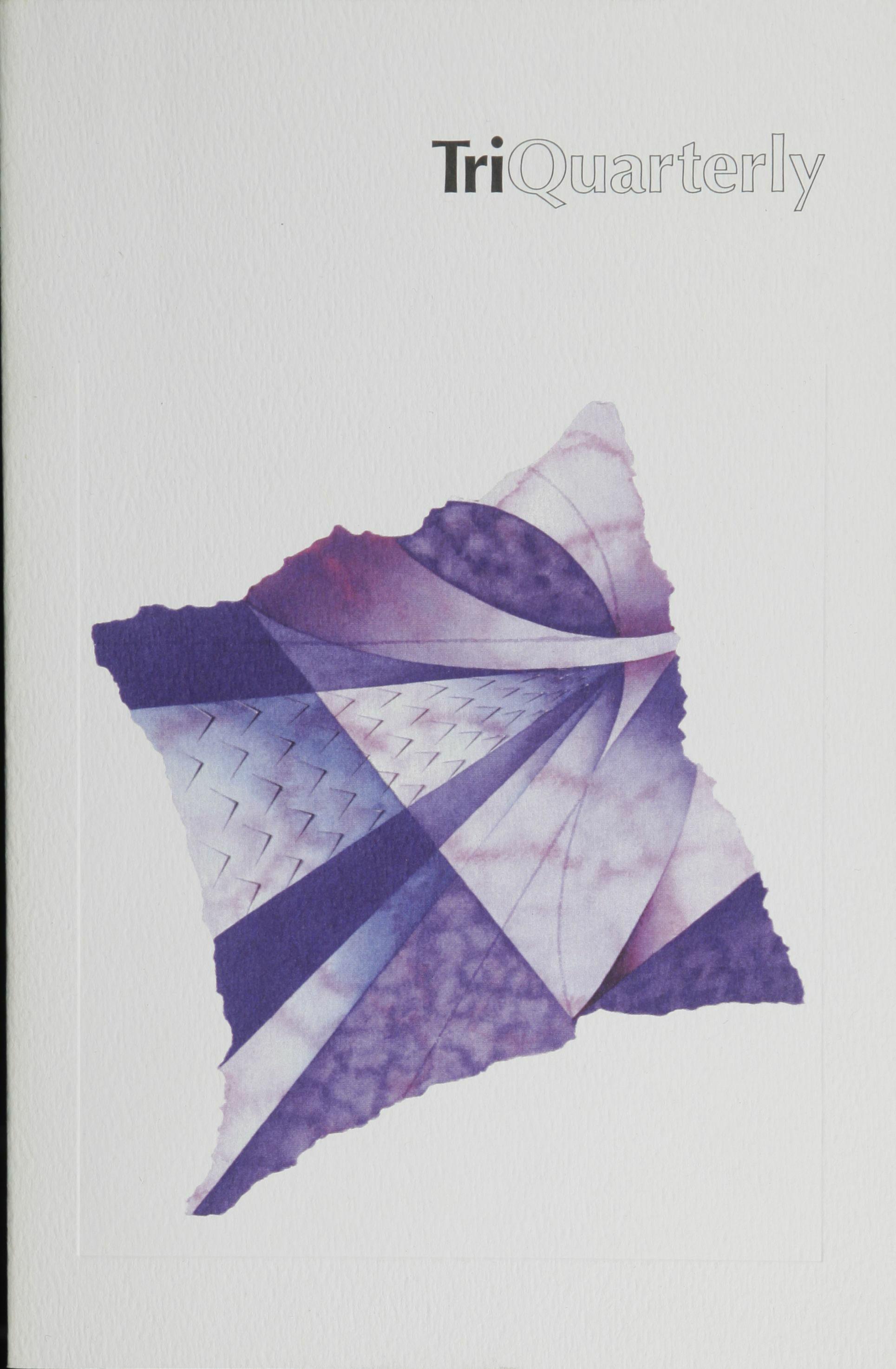

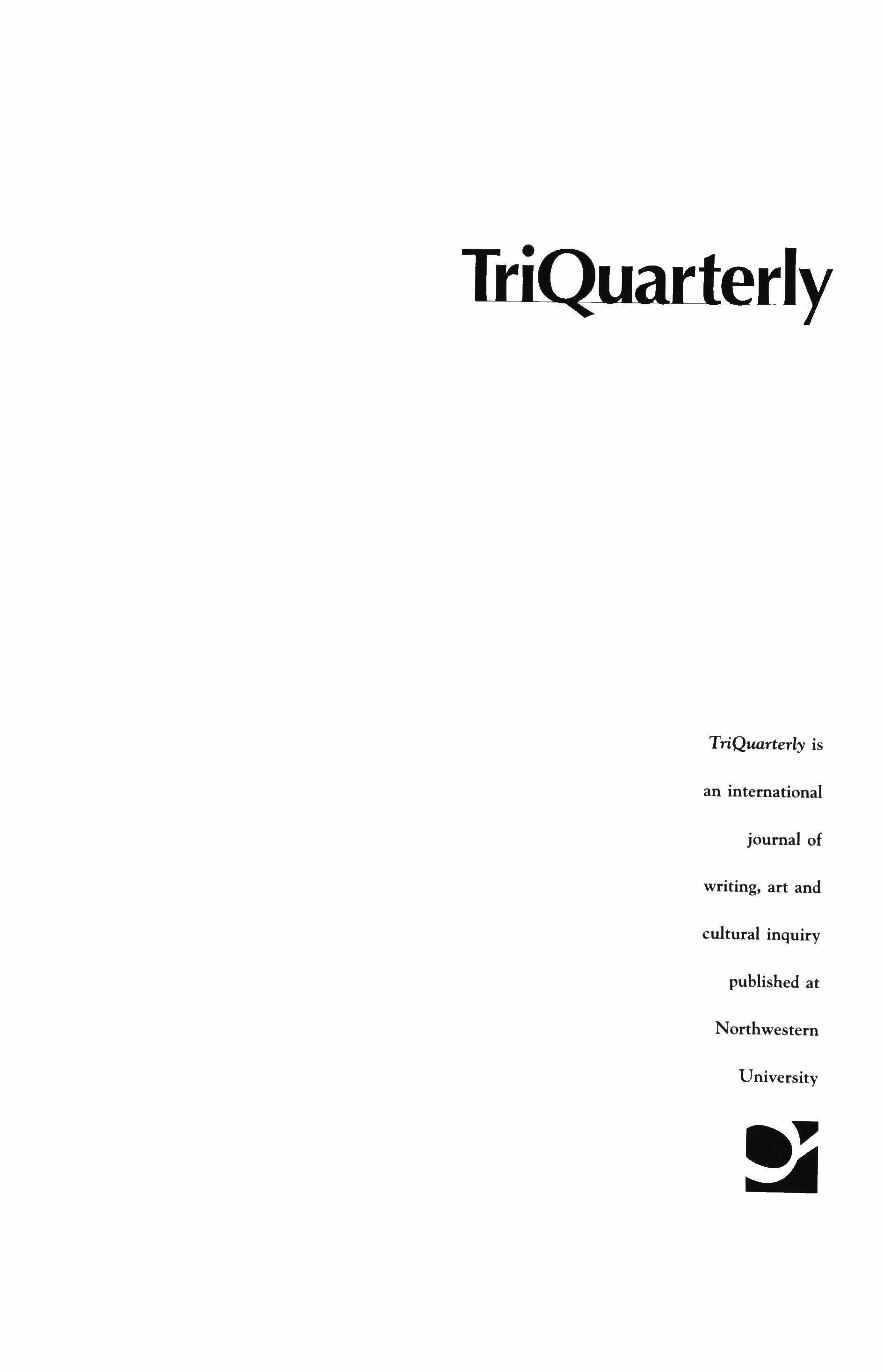
TriQuarterly is an international journal of writing, art and cultural inquiry published at Northwestern University
TriQuarterly

IriQuarterly
Editor
Susan Firestone Hahn
Associate Editor
Ian Morris
Operations Coordinator
Kirstie Felland
Production Manager
Bruce Frausto
Production Editor
Vincent Chung
Cover Design
Gini Kondziolka
Assistant Editor
Eric LeMay
Editorial Assistant
Cara Moultrup
TriQuarterly Fellow
Ryan Friedman
Business Projects Manager
Michael Workman
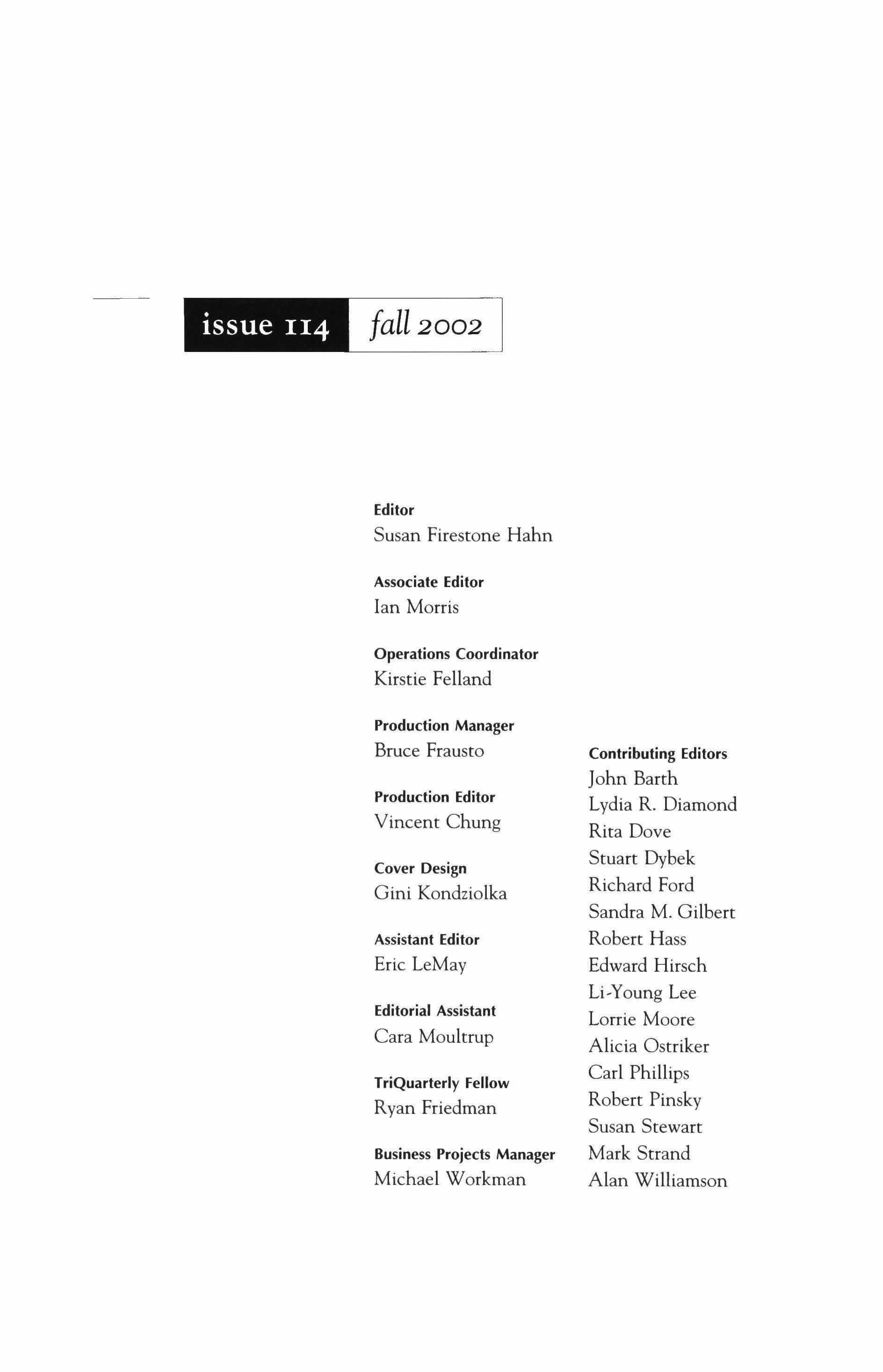
Contributing Editors
John Barth
Lydia R. Diamond
Rita Dove
Stuart Dybek
Richard Ford
Sandra M. Gilbert
Robert Hass
Edward Hirsch
Li-Young Lee
Lorrie Moore
Alicia Ostriker
Carl Phillips
Robert Pinsky
Susan Stewart
Mark Strand
Alan Williamson
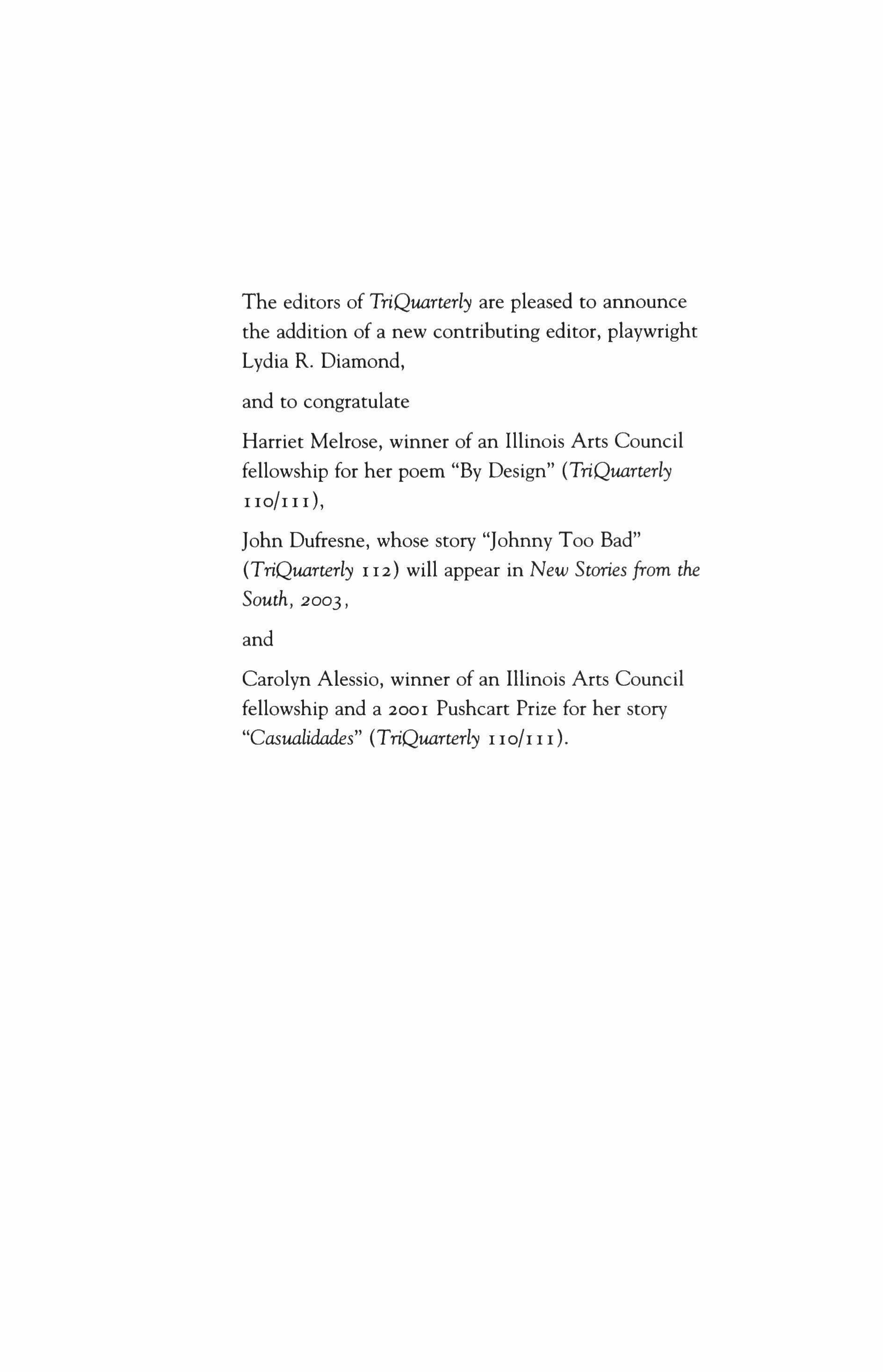
The editors of TriQuarterly are pleased to announce the addition of a new contributing editor, playwright Lydia R. Diamond, and to congratulate Harriet Melrose, winner of an Illinois Arts Council fellowship for her poem "By Design" (TriQuarterly IIO/II 1), John Dufresne, whose story "Johnny Too Bad" (TriQuarterly II2) will appear in New Stories from the South,2003, and Carolyn Alessio, winner of an Illinois Arts Council fellowship and a 2001 Pushcart Prize for her story "Casualidades" (TriQuarterly 1 to]: 1 1).

FOR THE GIFT OF THE MAN AND HIS WORK
CHAIM rorox
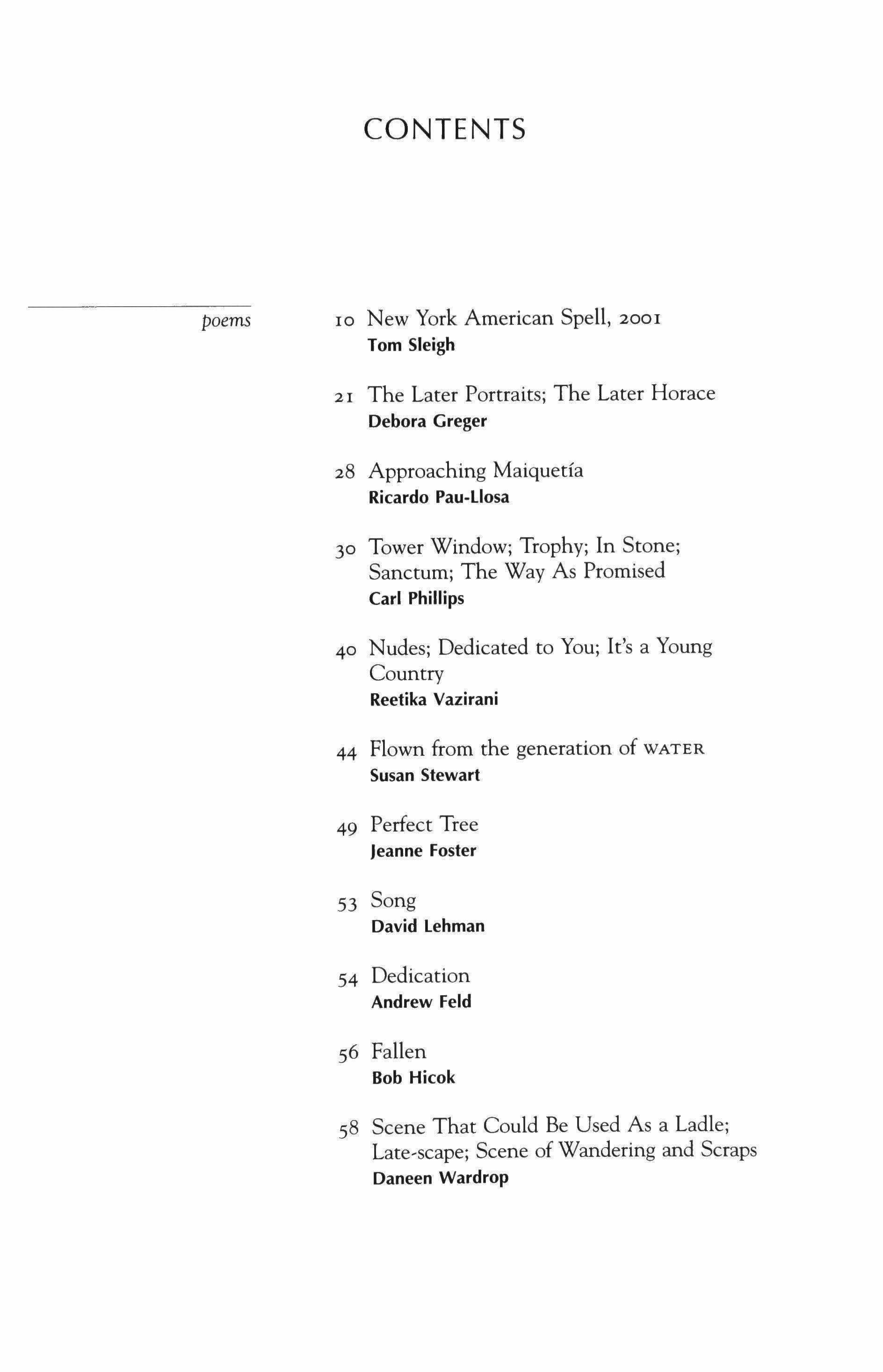
CONTENTS poems 10 New York American Spell, 2001 Tom Sleigh 21 The Later Portraits; The Later Horace Debora Greger 28 Approaching Maiquetia Ricardo Pau-Llosa 30 Tower Window; Trophy; In Stone; Sanctum; The Way As Promised Carl Phillips 40 Nudes; Dedicated to You; It's a Young Country Reetika Vazirani 44 Flown from the generation of WATER Susan Stewart 49 Perfect Tree Jeanne Foster 53 Song David Lehman 54 Dedication Andrew Feld 56 Fallen Bob Hicok 58 Scene That Could Be Used As a Ladle; Late-scape: Scene of Wandering and Scraps Daneen Wardrop
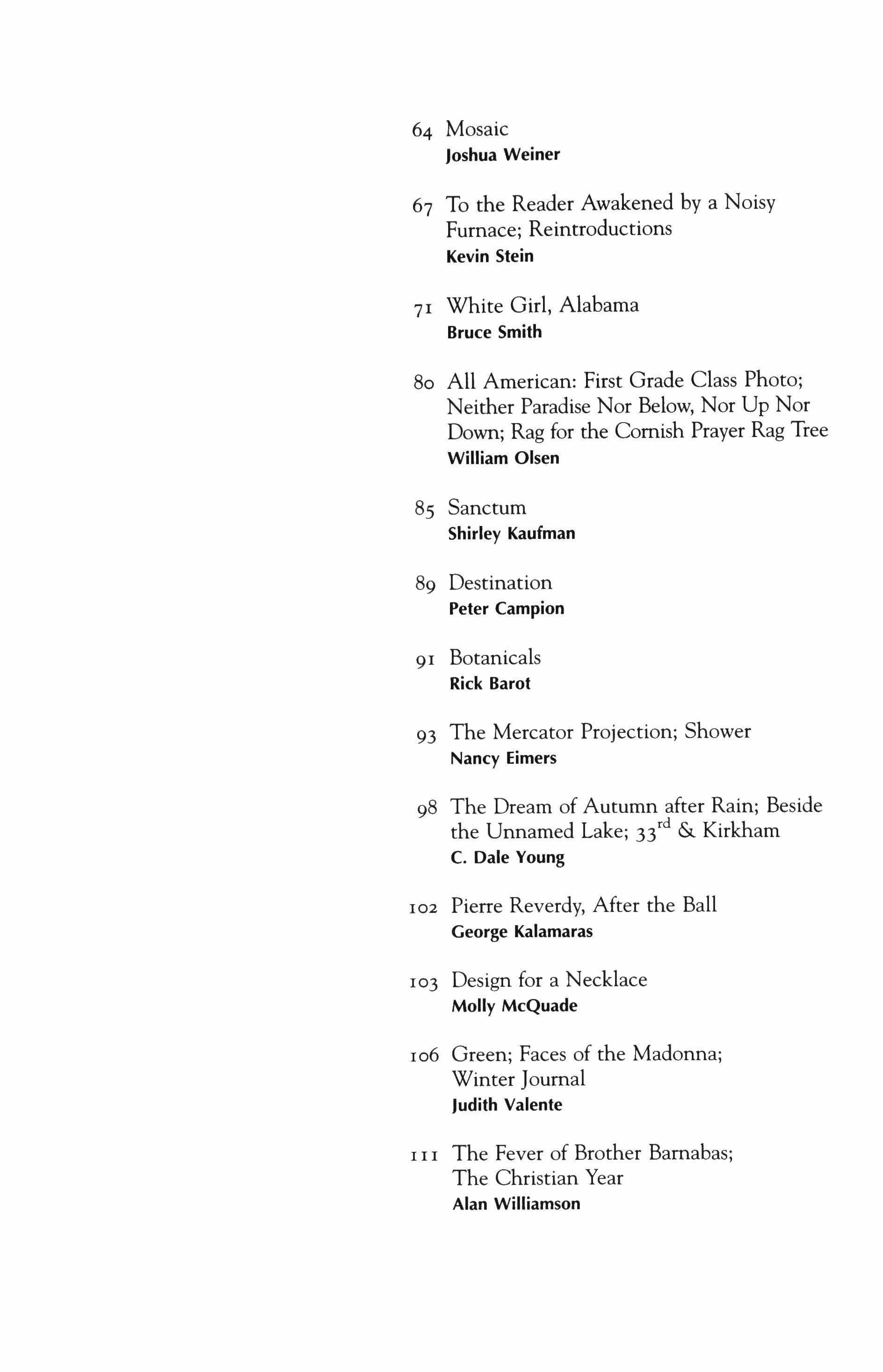
64 Mosaic Joshua Weiner 67 To the Reader Awakened by a Noisy Furnace; Reintroductions Kevin Stein 7 I White Girl, Alabama Bruce Smith 80 All American: First Grade Class Photo; Neither Paradise Nor Below, Nor Up Nor Down; Rag for the Cornish
Tree William Olsen 85 Sanctum Shirley Kaufman 89 Destination Peter Campion 91 Botanicals Rick Barot 93 The Mercator Projection; Shower Nancy Eimers 98 The Dream of Autumn after Rain; Beside the Unnamed Lake; 33rd & Kirkham C. Dale Young 102 Pierre Reverdy, After the Ball George Kalamaras 103 Design for a Necklace Molly McQuade 106 Green; Faces of the Madonna; Winter Journal Judith Valente I I I The Fever of Brother Barnabas; The Christian Year Alan Williamson
Prayer Rag
interview
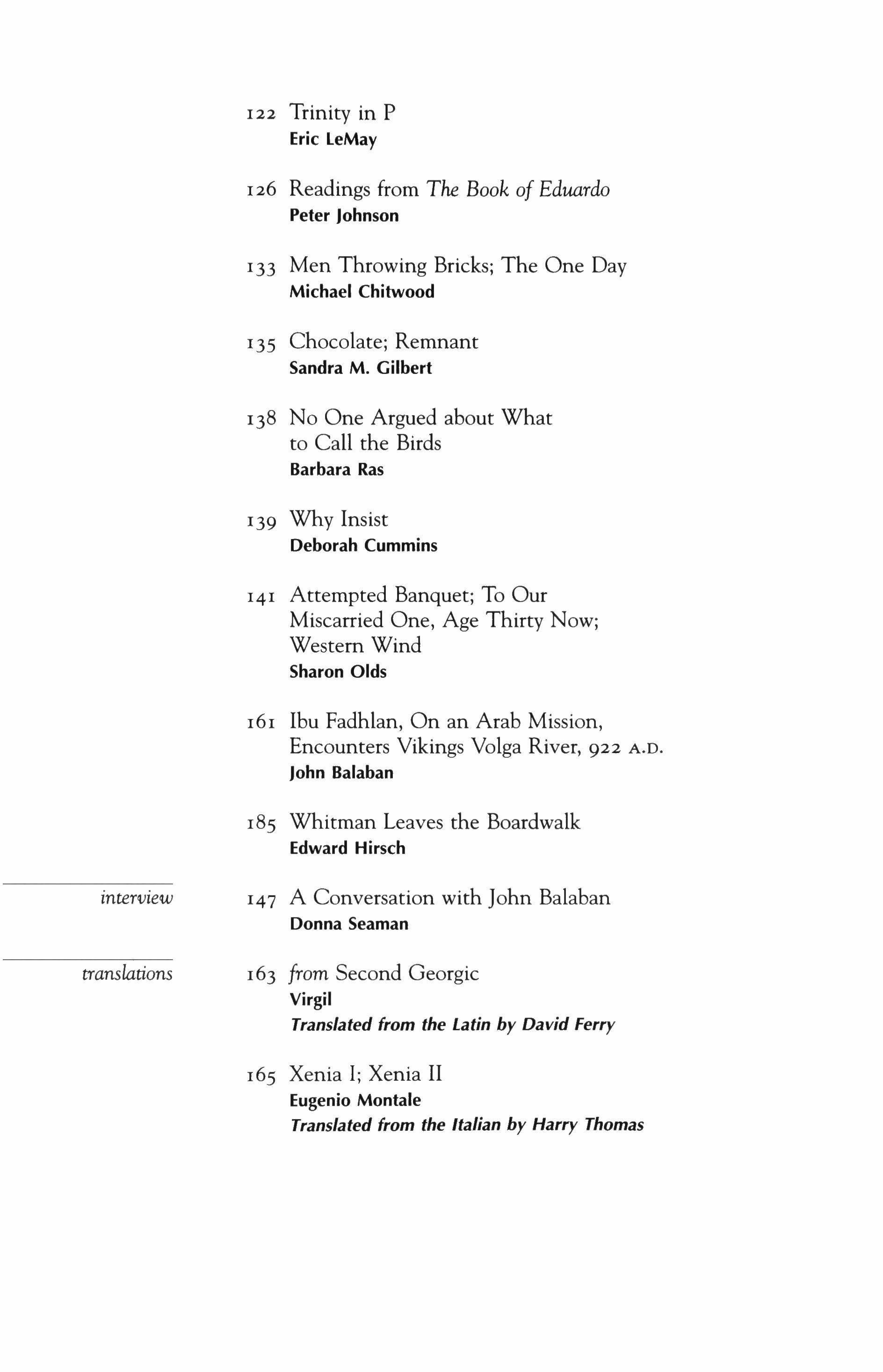
translations
122 Trinity in P
Eric LeMay
126 Readings from The Book of Eduardo
Peter Johnson
133 Men Throwing Bricks; The One Day
Michael Chitwood
135 Chocolate; Remnant
Sandra M. Gilbert
138 No One Argued about What to Call the Birds
Barbara Ras
139 Why Insist
Deborah Cummins
141 Attempted Banquet; To Our Miscarried One, Age Thirty Now; Western Wind
Sharon Olds
161 Ibu Fadhlan, On an Arab Mission, Encounters Vikings Volga River, 922 A.D.
John Balaban
185 Whitman Leaves the Boardwalk
Edward Hirsch
147 A Conversation with John Balaban
Donna Seaman
163 from Second Georgie
Virgil
Translated from the Latin by David Ferry
165 Xenia I; Xenia II
Eugenio Montale
Translated from the Italian by Harry Thomas
176 To Stay; Candles; King Dimitrios; The Horses of Achilles
c. P. Cavafy
Translated from the Greek by Aliki Barnstone
180 In Memory of W. H. Auden; Poet in Groningen
Guy GeoffeHe
Translated from the French by Marilyn Hacker
186 Contributors
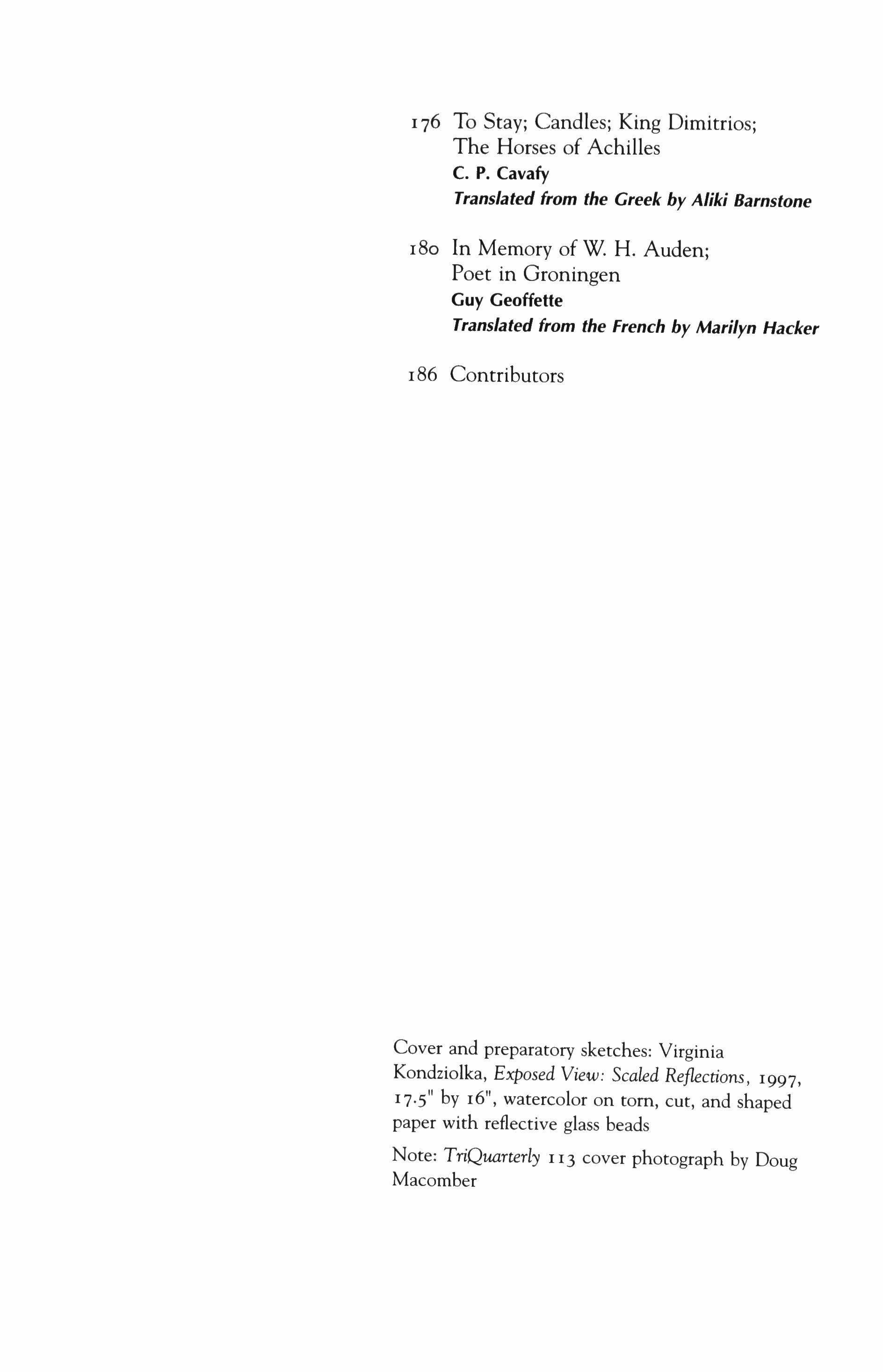
Cover and preparatory sketches: Virginia Kondziolka, Exposed View: Scaled Reflections, 1997, 17.5" by 16", watercolor on tom, cut, and shaped paper with reflective glass beads
Note: TriQuarterly 113 cover photograph by Doug Macomber
Tom Sleigh
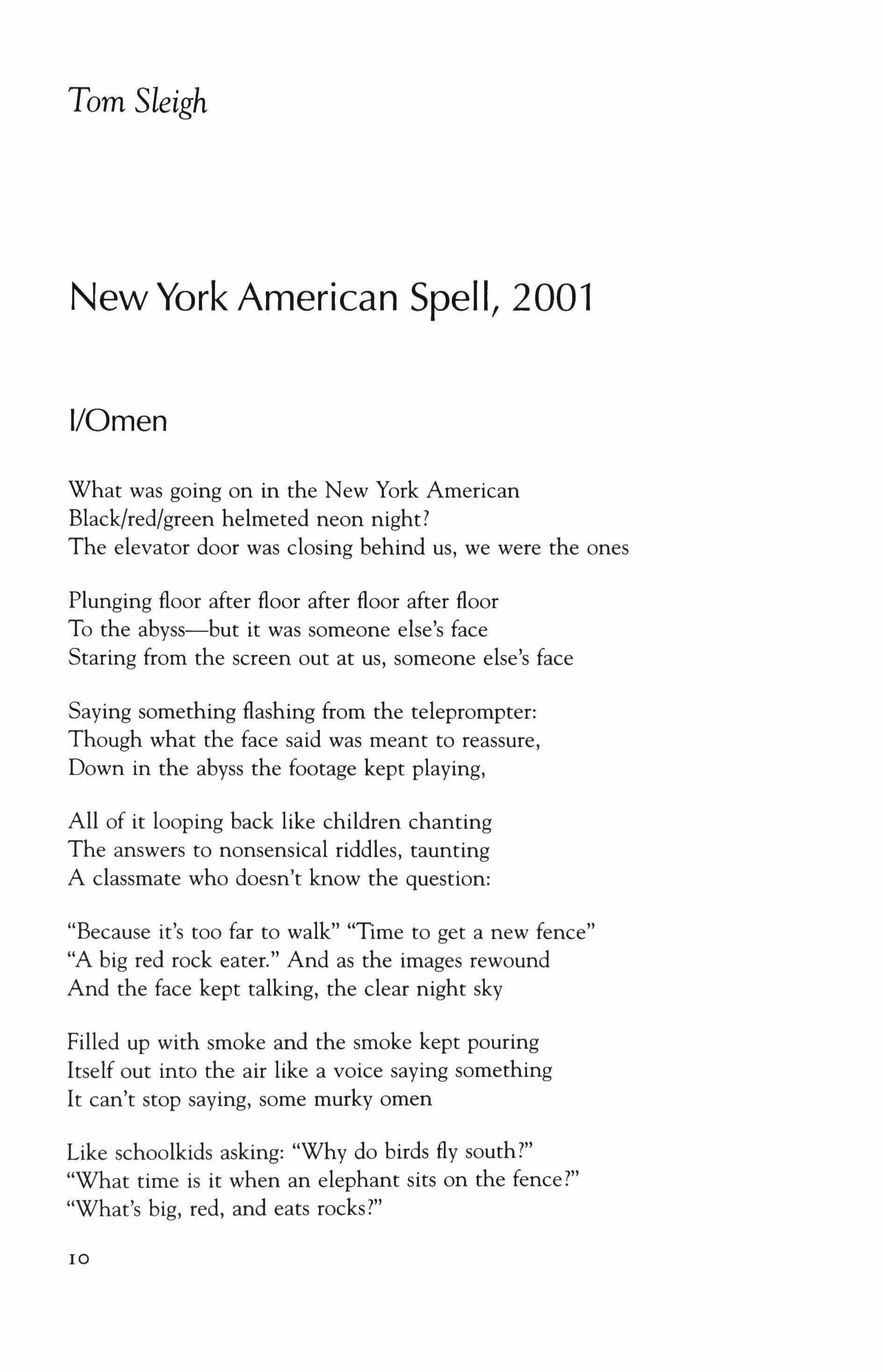
New York American Spell, 2001
I/Omen
What was going on in the New York American Black/red/green helmeted neon night?
The elevator door was closing behind us, we were the ones
Plunging floor after floor after floor after floor
To the abyss-but it was someone else's face Staring from the screen out at us, someone else's face
Saying something flashing from the teleprompter: Though what the face said was meant to reassure, Down in the abyss the footage kept playing,
All of it looping back like children chanting The answers to nonsensical riddles, taunting A classmate who doesn't know the question:
"Because it's too far to walk" "Time to get a new fence" "A big red rock eater." And as the images rewound And the face kept talking, the clear night sky
Filled up with smoke and the smoke kept pouring Itself out into the air like a voice saying something It can't stop saying, some murky omen
Like schoolkids asking: "Why do birds fly south?"
"What time is it when an elephant sits on the fence?"
"What's big, red, and eats rocks?"
10
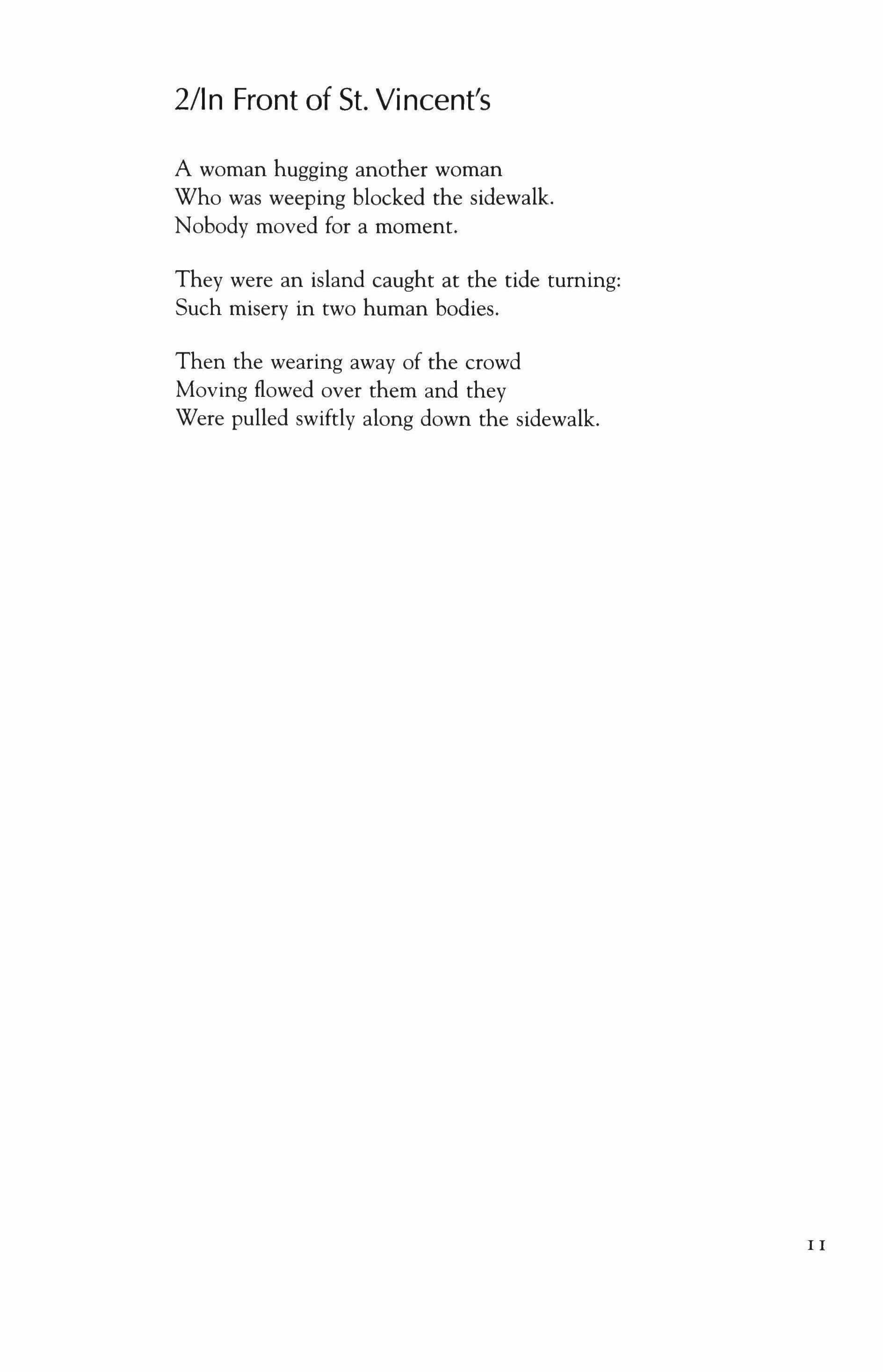
2/1 n Front of St. Vincent's
A woman hugging another woman Who was weeping blocked the sidewalk. Nobody moved for a moment.
They were an island caught at the tide turning: Such misery in two human bodies.
Then the wearing away of the crowd Moving flowed over them and they Were pulled swiftly along down the sidewalk.
I I
3/Joke
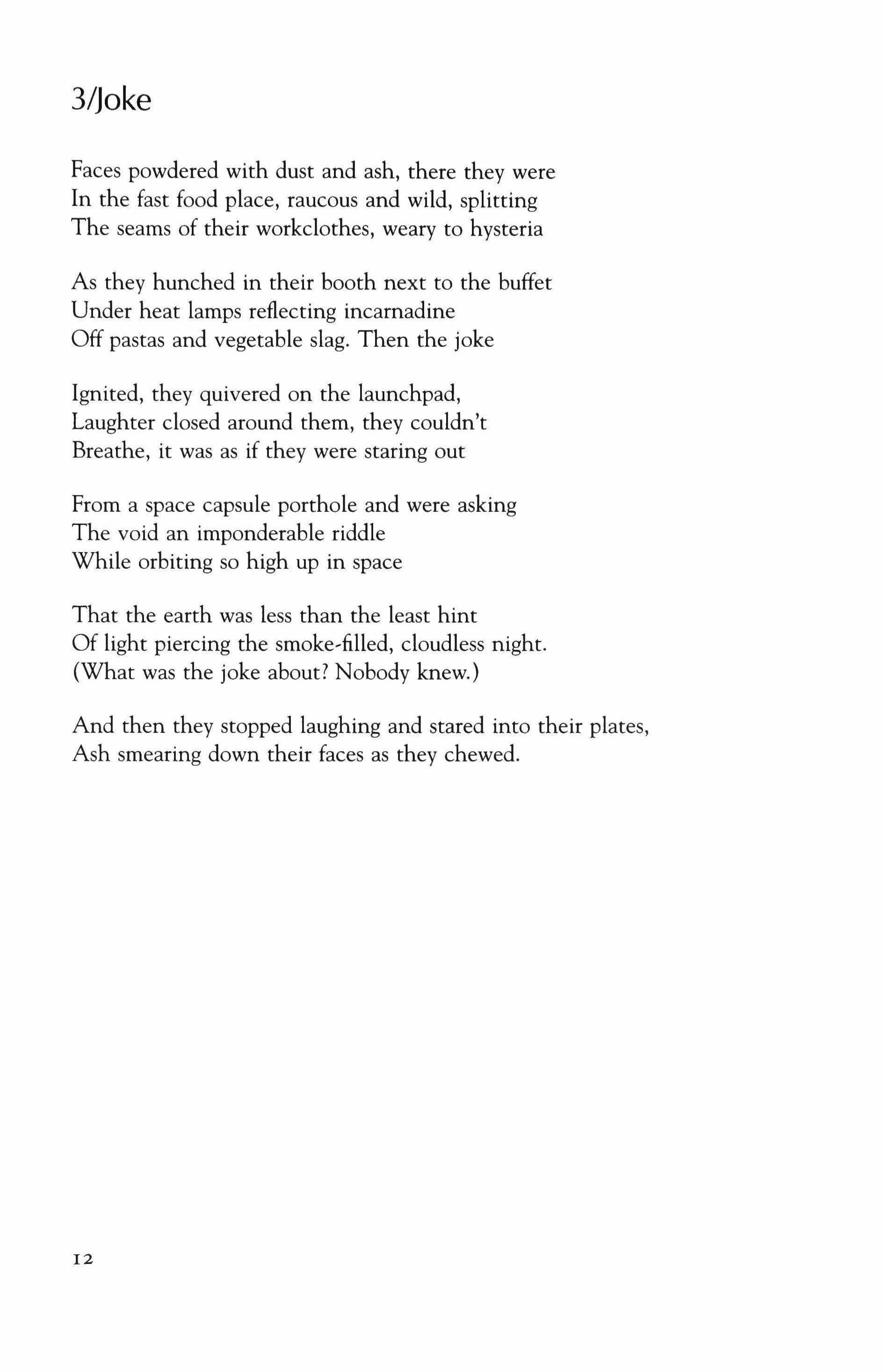
Faces powdered with dust and ash, there they were In the fast food place, raucous and wild, splitting The seams of their workclothes, weary to hysteria
As they hunched in their booth next to the buffet Under heat lamps reflecting incarnadine Off pastas and vegetable slag. Then the joke
Ignited, they quivered on the launchpad, Laughter closed around them, they couldn't Breathe, it was as if they were staring out
From a space capsule porthole and were asking The void an imponderable riddle While orbiting so high up in space
That the earth was less than the least hint Of light piercing the smoke-filled, cloudless night. (What was the joke about? Nobody knew.)
And then they stopped laughing and stared into their plates, Ash smearing down their faces as they chewed.
12
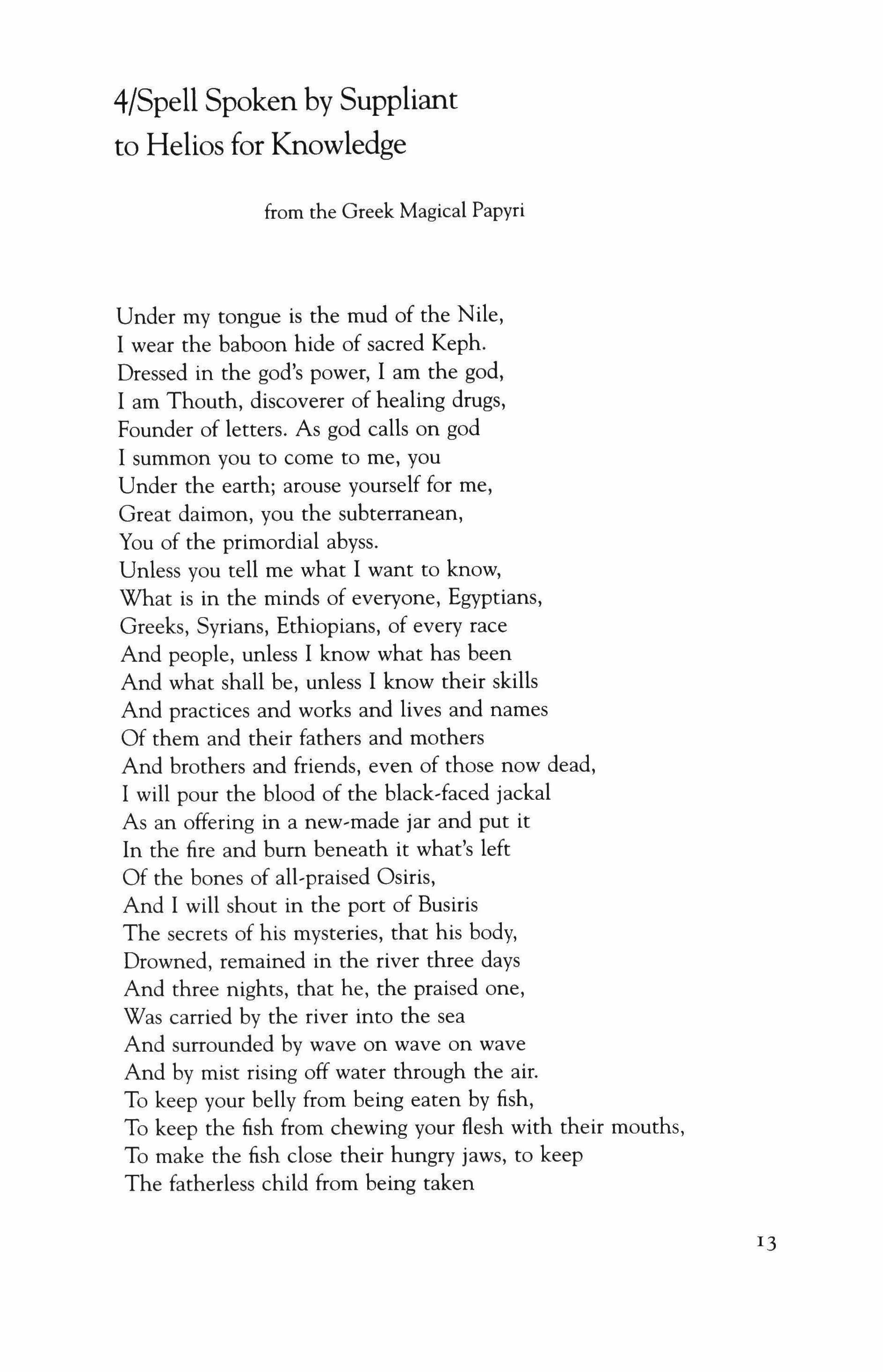
4/Spell Spokenby Suppliant
to Helios for Knowledge
from the Greek Magical Papyri
Under my tongue is the mud of the Nile, I wear the baboon hide of sacred Keph.
Dressed in the god's power, I am the god, I am Thouth, discoverer of healing drugs, Founder of letters. As god calls on god
I summon you to come to me, you
Under the earth; arouse yourself for me, Great daimon, you the subterranean, You of the primordial abyss.
Unless you tell me what I want to know, What is in the minds of everyone, Egyptians, Greeks, Syrians, Ethiopians, of every race
And people, unless I know what has been And what shall be, unless I know their skills
And practices and works and lives and names
Of them and their fathers and mothers
And brothers and friends, even of those now dead, I will pour the blood of the black-faced jackal
As an offering in a new-made jar and put it
In the fire and bum beneath it what's left
Of the bones of all-praised Osiris,
And I will shout in the port of Busiris
The secrets of his mysteries, that his body, Drowned, remained in the river three days
And three nights, that he, the praised one, Was carried by the river into the sea
And surrounded by wave on wave on wave
And by mist rising off water through the air.
To keep your belly from being eaten by fish, To keep the fish from chewing your flesh with their mouths,
To make the fish close their hungry jaws, to keep The fatherless child from being taken
13
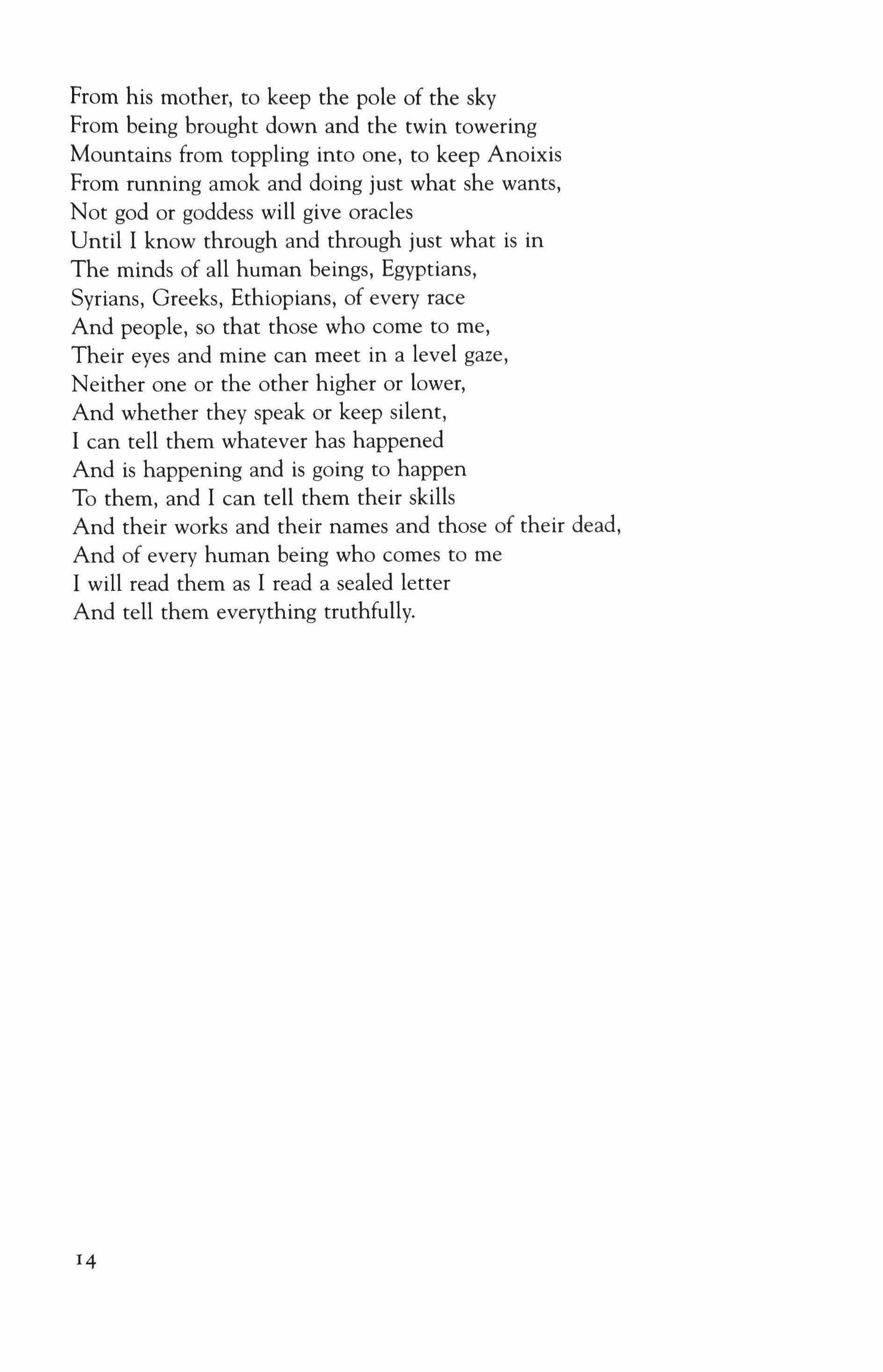
From his mother, to keep the pole of the sky
From being brought down and the twin towering Mountains from toppling into one, to keep Anoixis
From running amok and doing just what she wants, Not god or goddess will give oracles
Until I know through and through just what is in The minds of all human beings, Egyptians, Syrians, Greeks, Ethiopians, of every race
And people, so that those who come to me, Their eyes and mine can meet in a level gaze, Neither one or the other higher or lower, And whether they speak or keep silent, I can tell them whatever has happened And is happening and is going to happen
To them, and I can tell them their skills
And their works and their names and those of their dead, And of every human being who comes to me
I will read them as I read a sealed letter And tell them everything truthfully.
14
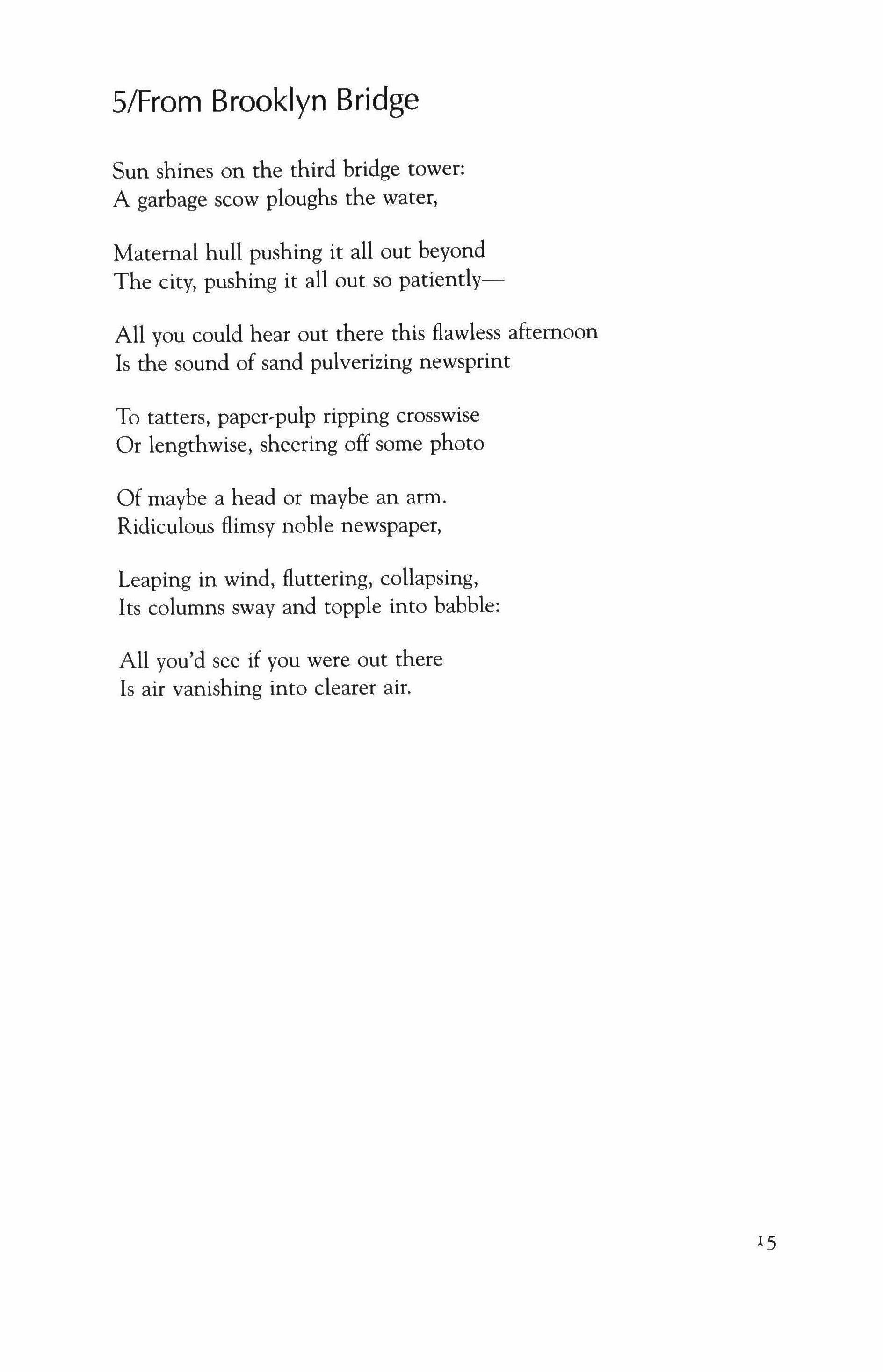
5/From Brooklyn Bridge
Sun shines on the third bridge tower: A garbage scow ploughs the water,
Maternal hull pushing it all out beyond The city, pushing it all out so patiently-
All you could hear out there this flawless afternoon Is the sound of sand pulverizing newsprint
To tatters, paper-pulp ripping crosswise Or lengthwise, sheering off some photo
Of maybe a head or maybe an arm.
Ridiculous flimsy noble newspaper,
Leaping in wind, fluttering, collapsing, Its columns sway and topple into babble:
All you'd see if you were out there Is air vanishing into clearer air.
IS
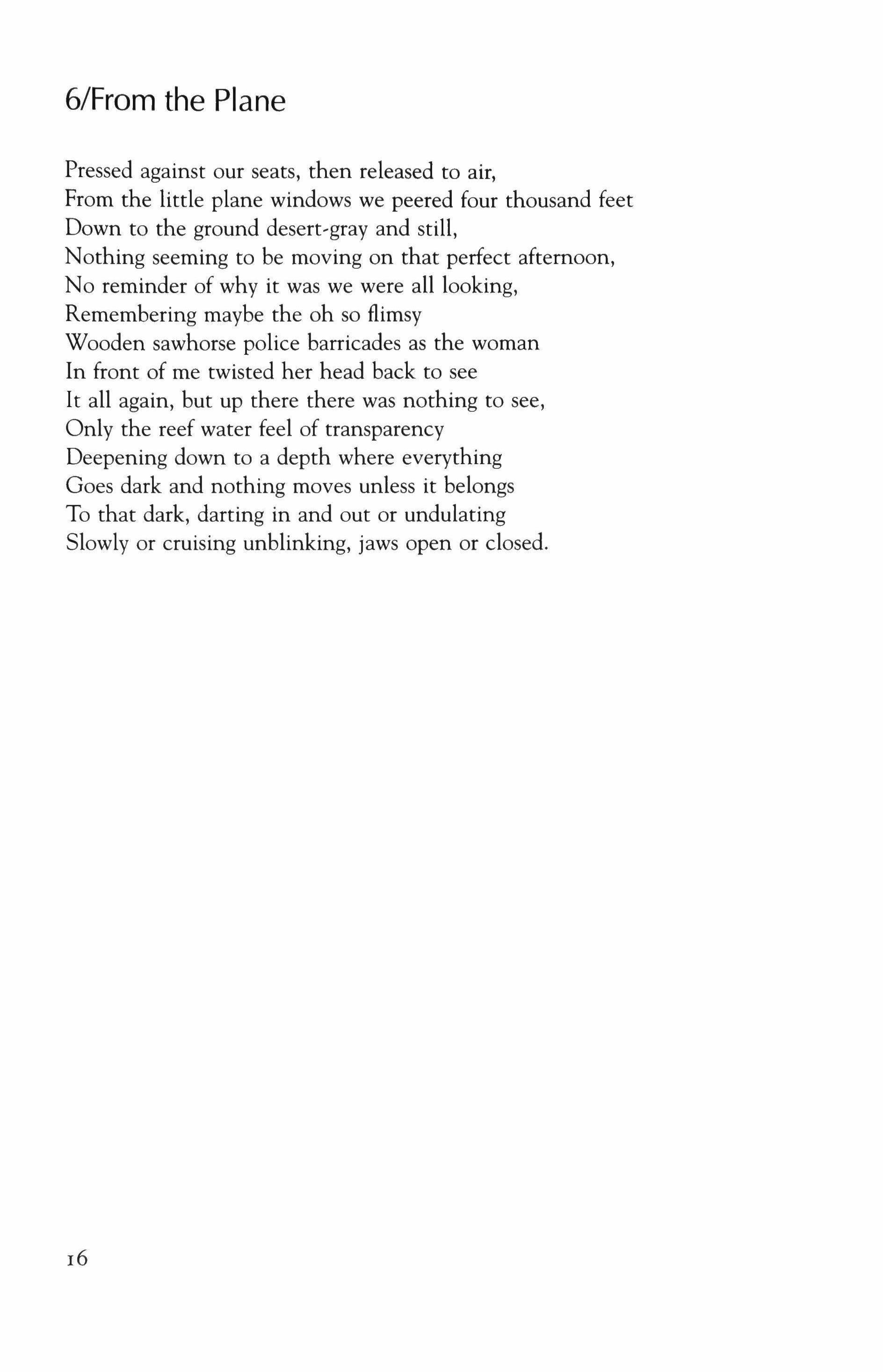
Pressed against our seats, then released to air, From the little plane windows we peered four thousand feet
Down to the ground desert-gray and still, Nothing seeming to be moving on that perfect afternoon, No reminder of why it was we were all looking, Remembering maybe the oh so flimsy
Wooden sawhorse police barricades as the woman
In front of me twisted her head back to see
It all again, but up there there was nothing to see, Only the reef water feel of transparency
Deepening down to a depth where everything Goes dark and nothing moves unless it belongs
To that dark, darting in and out or undulating
Slowly or cruising unblinking, jaws open or closed.
6/From the Plane
7/Spell Spoken by Suppliant
to Helios for Protection
from the Greek Magical Papyri
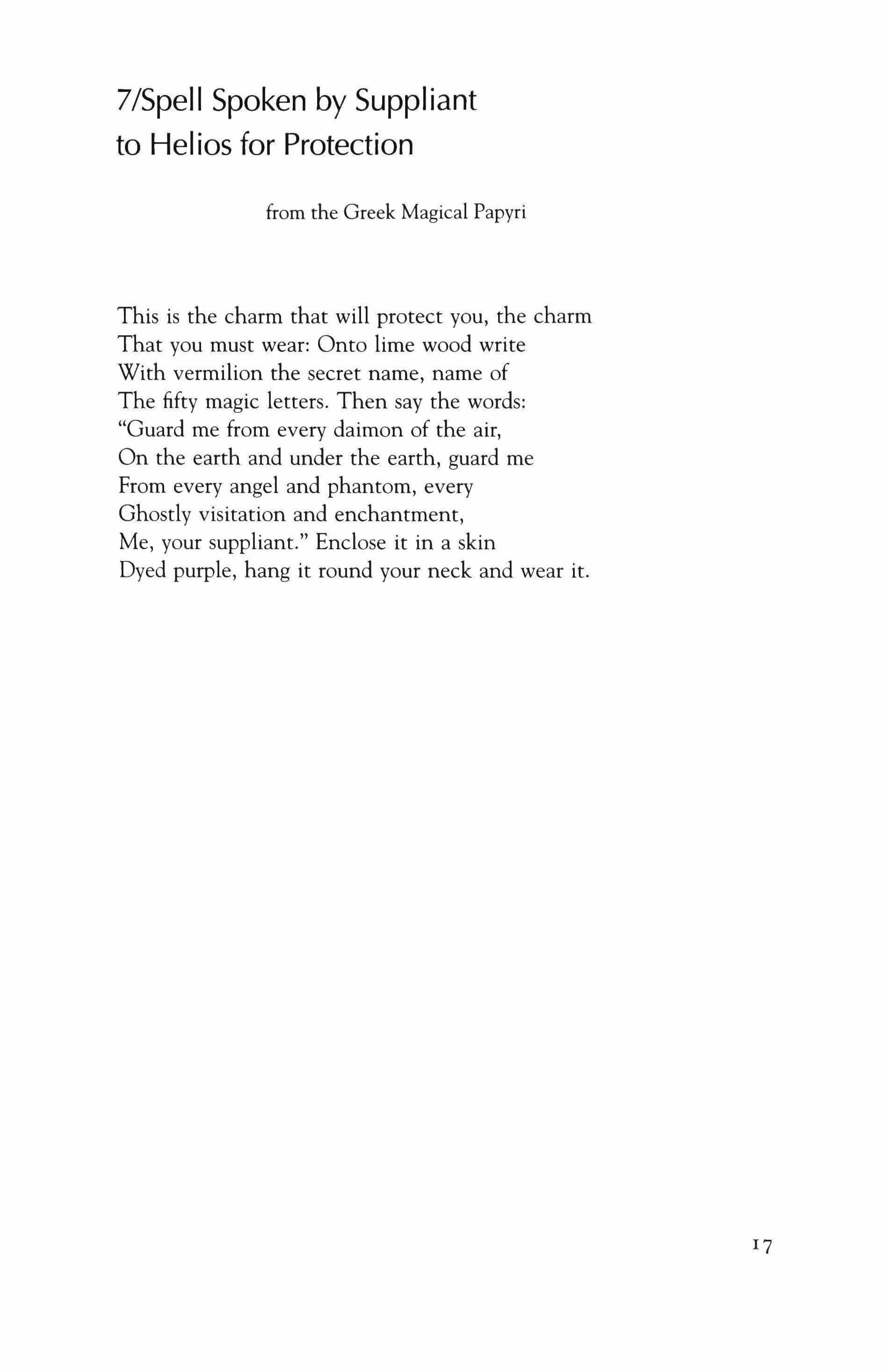
This is the charm that will protect you, the charm That you must wear: Onto lime wood write With vermilion the secret name, name of The fifty magic letters. Then say the words: "Guard me from every daimon of the air, On the earth and under the earth, guard me
From every angel and phantom, every Ghostly visitation and enchantment, Me, your suppliant." Enclose it in a skin
Dyed purple, hang it round your neck and wear it.
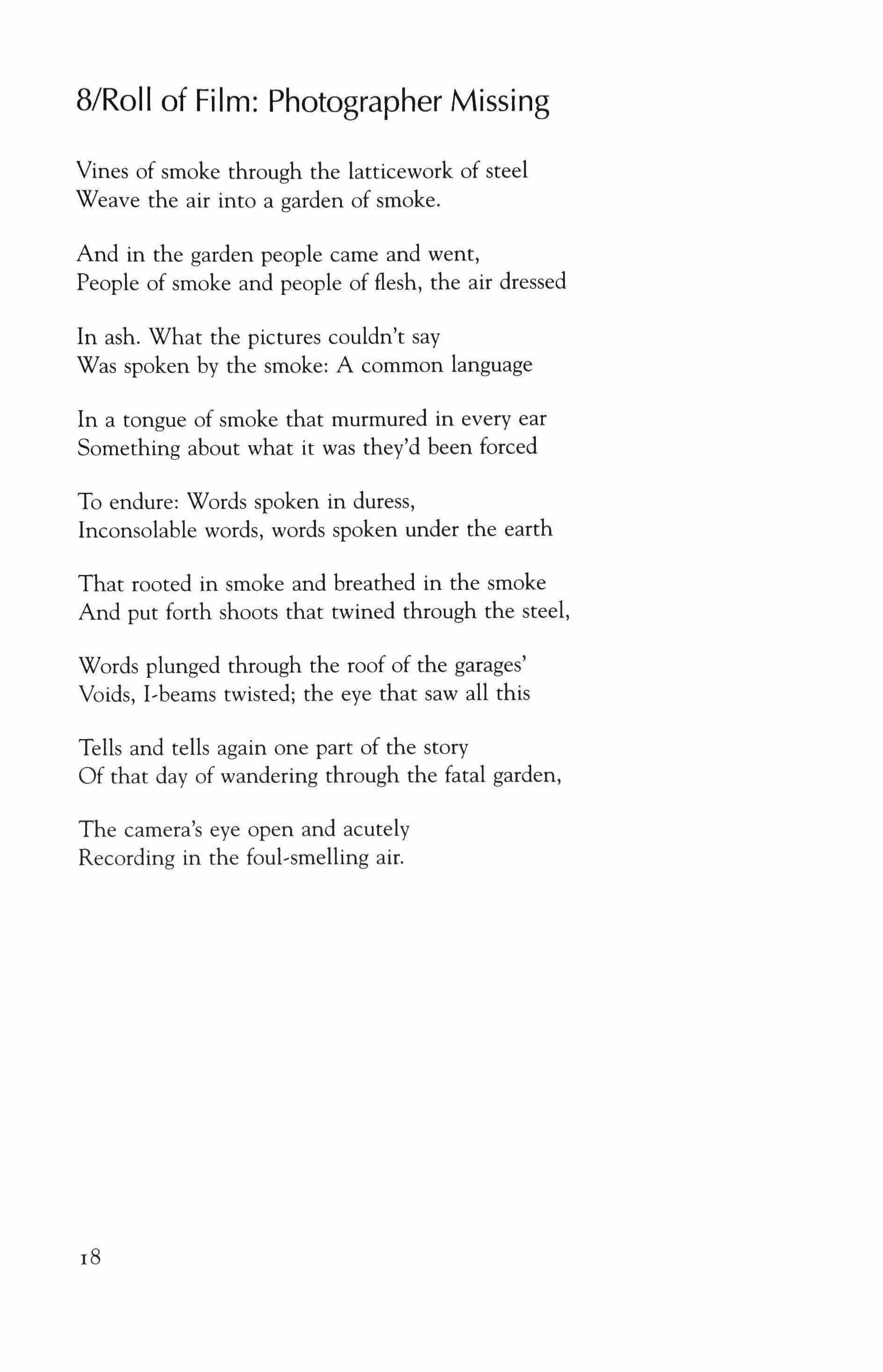
8/Roll of Film: Photographer Missing
Vines of smoke through the latticework of steel Weave the air into a garden of smoke.
And in the garden people came and went, People of smoke and people of flesh, the air dressed
In ash. What the pictures couldn't say Was spoken by the smoke: A common language
In a tongue of smoke that murmured in every ear Something about what it was they'd been forced
To endure: Words spoken in duress, Inconsolable words, words spoken under the earth
That rooted in smoke and breathed in the smoke And put forth shoots that twined through the steel,
Words plunged through the roof of the garages' Voids, l-beams twisted; the eye that sawall this
Tells and tells again one part of the story Of that day of wandering through the fatal garden,
The camera's eye open and acutely Recording in the foul-smelling air.
from a Sumerian spell, 2000 B.C.
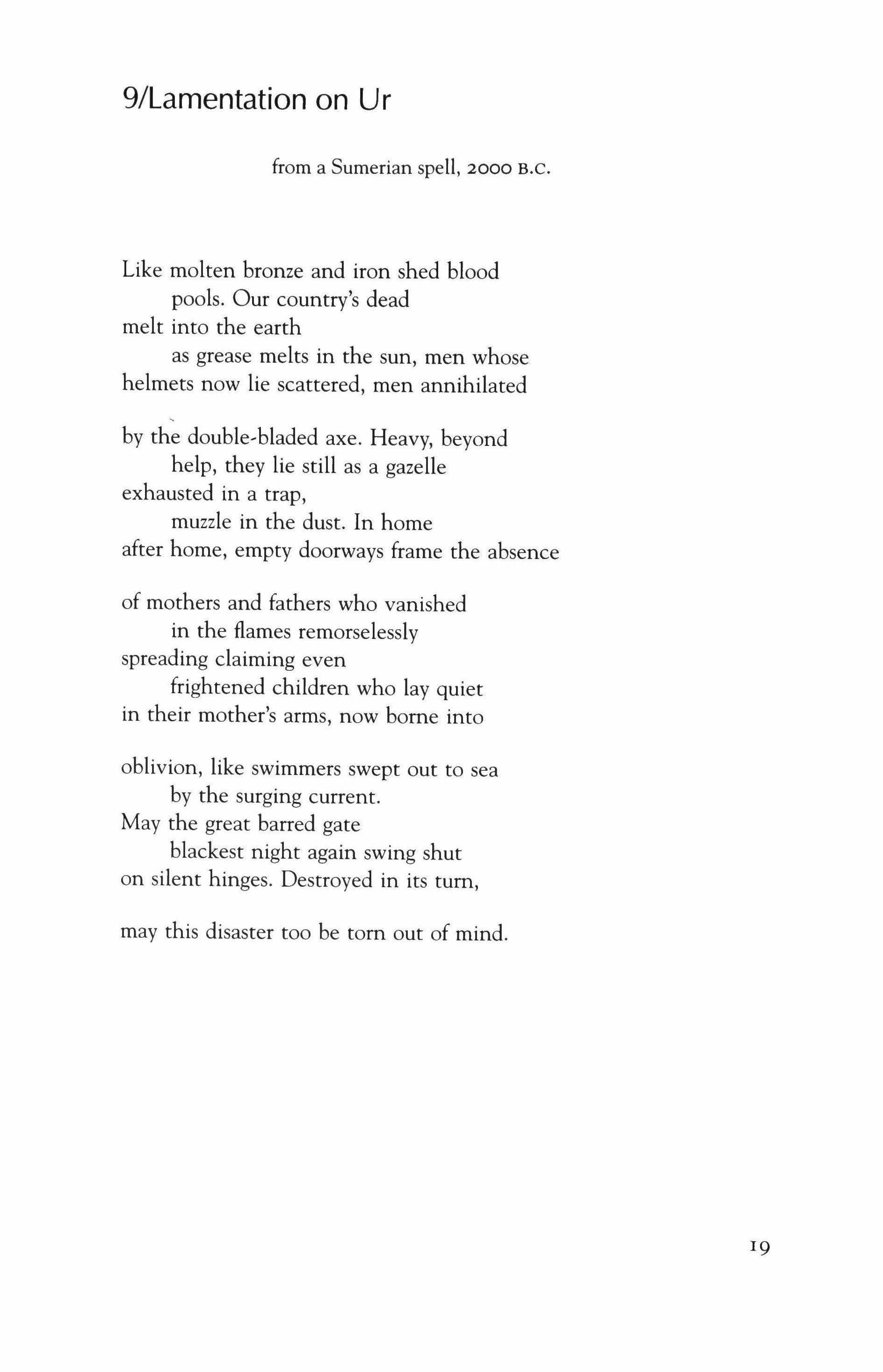
Like molten bronze and iron shed blood pools. Our country's dead melt into the earth as grease melts in the sun, men whose helmets now lie scattered, men annihilated by the double-bladed axe. Heavy, beyond help, they lie still as a gazelle exhausted in a trap, muzzle in the dust. In home after home, empty doorways frame the absence of mothers and fathers who vanished in the flames remorselessly spreading claiming even frightened children who lay quiet in their mother's arms, now borne into
oblivion, like swimmers swept out to sea by the surging current. May the great barred gate blackest night again swing shut on silent hinges. Destroyed in its tum, may this disaster too be tom out of mind.
9/Lamentation on U r
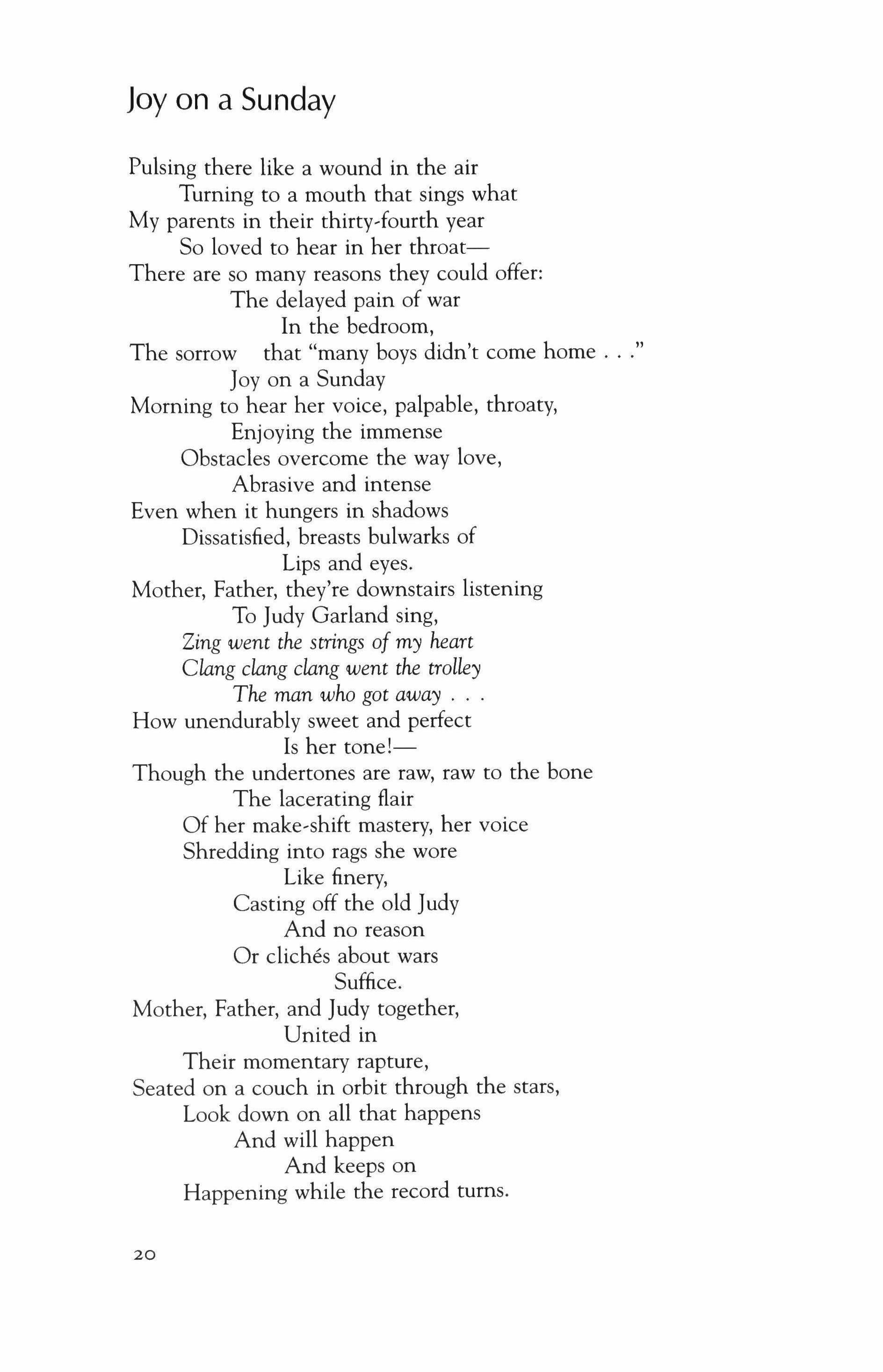
Joy on a Sunday
Pulsing there like a wound in the air
Turning to a mouth that sings what
My parents in their thirty-fourth year
So loved to hear in her throat
There are so many reasons they could offer: The delayed pain of war In the bedroom,
The sorrow that "many boys didn't come home
Joy on a Sunday
Morning to hear her voice, palpable, throaty, Enjoying the immense
Obstacles overcome the way love, Abrasive and intense
Even when it hungers in shadows
Dissatisfied, breasts bulwarks of Lips and eyes.
Mother, Father, they're downstairs listening
To Judy Garland sing, Zing went the strings of my heart
Clang clang clang went the trolley
The man who got away
How unendurably sweet and perfect Is her tone!-
Though the undertones are raw, raw to the bone
The lacerating flair
Of her make-shift mastery, her voice
Shredding into rags she wore
Like finery, Casting off the old Judy
And no reason Or cliches about wars
Suffice.
Mother, Father, and Judy together, United in
Their momentary rapture,
Seated on a couch in orbit through the stars, Look down on all that happens And will happen
And keeps on
Happening while the record turns.
20
Debora Greger
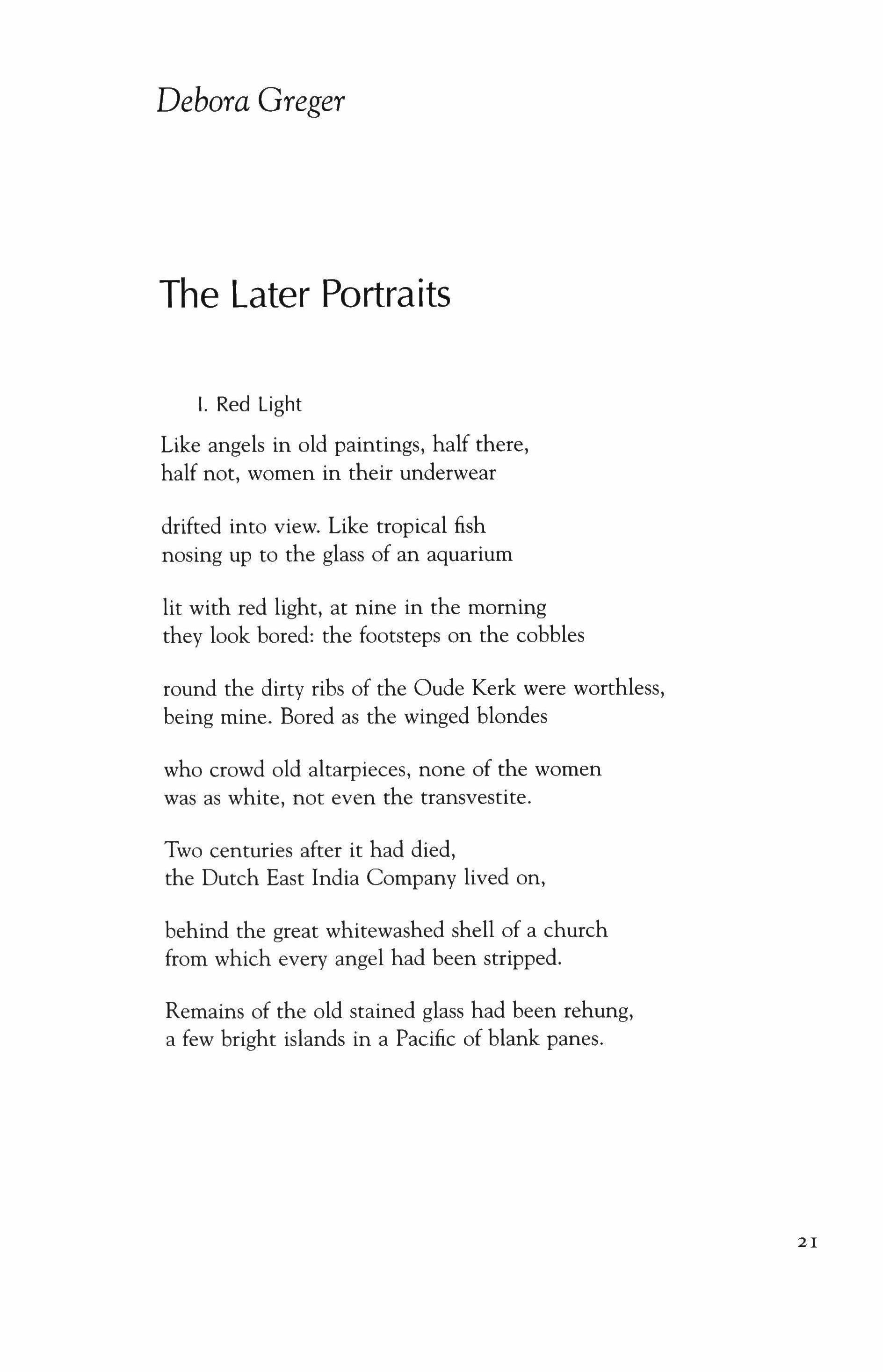
The Later Portraits
I. Red Light
Like angels in old paintings, half there, half not, women in their underwear
drifted into view. Like tropical fish nosing up to the glass of an aquarium
lit with red light, at nine in the morning they look bored: the footsteps on the cobbles
round the dirty ribs of the Oude Kerk were worthless, being mine. Bored as the winged blondes
who crowd old altarpieces, none of the women was as white, not even the transvestite.
Two centuries after it had died, the Dutch East India Company lived on, behind the great whitewashed shell of a church from which every angel had been stripped.
Remains of the old stained glass had been rehung, a few bright islands in a Pacific of blank panes.
2I
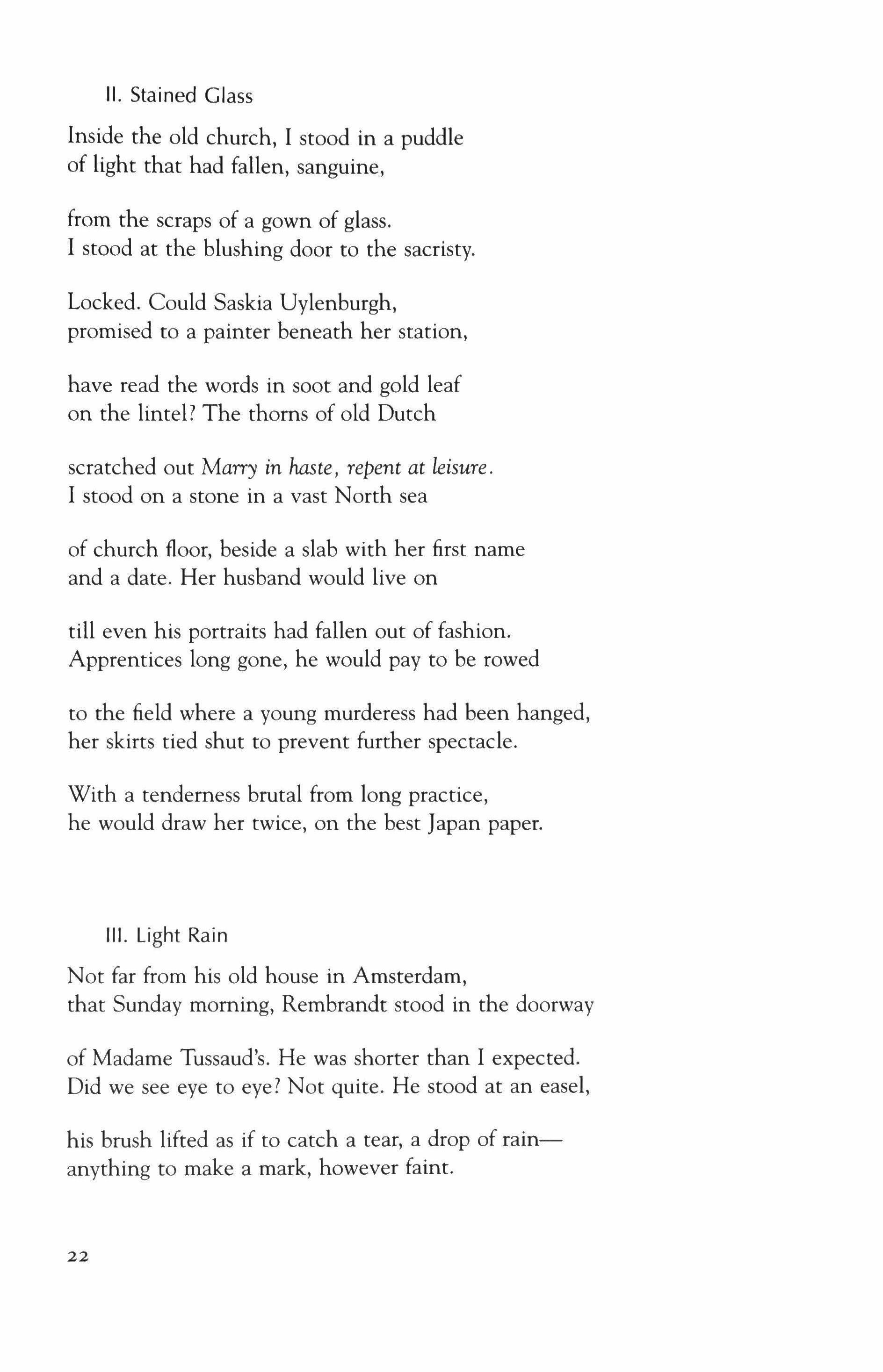
II. Stained Glass
Inside the old church, I stood in a puddle of light that had fallen, sanguine, from the scraps of a gown of glass. I stood at the blushing door to the sacristy.
Locked. Could Saskia Uylenburgh, promised to a painter beneath her station, have read the words in soot and gold leaf on the lintel? The thorns of old Dutch scratched out Marry in haste, repent at leisure. I stood on a stone in a vast North sea of church floor, beside a slab with her first name and a date. Her husband would live on till even his portraits had fallen out of fashion. Apprentices long gone, he would pay to be rowed to the field where a young murderess had been hanged, her skirts tied shut to prevent further spectacle.
With a tenderness brutal from long practice, he would draw her twice, on the best Japan paper.
III. Light Rain
Not far from his old house in Amsterdam, that Sunday morning, Rembrandt stood in the doorway of Madame Tussaud's. He was shorter than I expected. Did we see eye to eye? Not quite. He stood at an easel, his brush lifted as if to catch a tear, a drop of rainanything to make a mark, however faint.
22
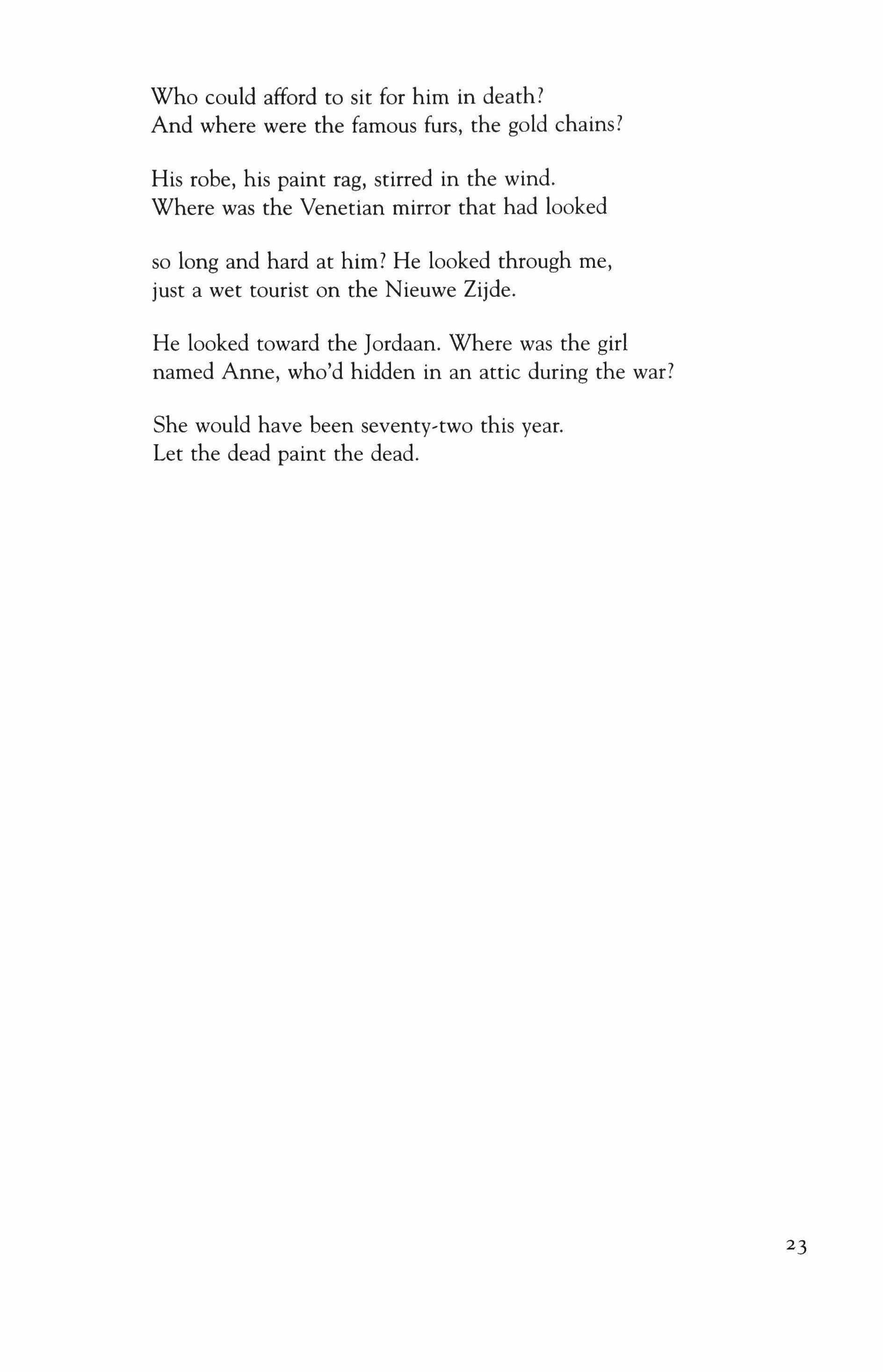
Who could afford to sit for him in death? And where were the famous furs, the gold chains?
His robe, his paint rag, stirred in the wind. Where was the Venetian mirror that had looked
so long and hard at him? He looked through me, just a wet tourist on the Nieuwe Zijde.
He looked toward the Jordaan. Where was the girl named Anne, who'd hidden in an attic during the war?
She would have been seventy,two this year. Let the dead paint the dead.
23
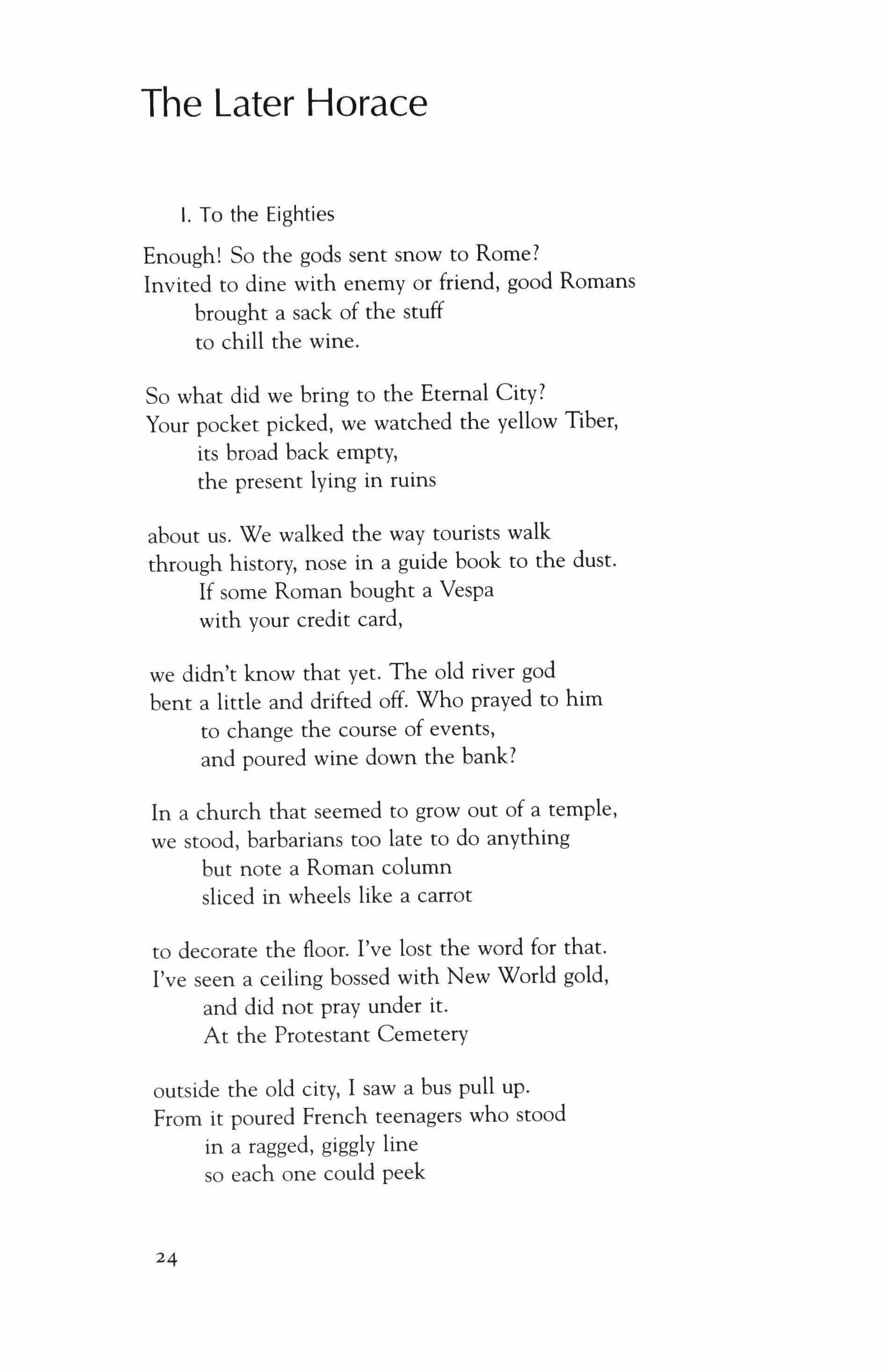
The Later Horace
I. To the Eighties
Enough! So the gods sent snow to Rome? Invited to dine with enemy or friend, good Romans brought a sack of the stuff to chill the wine.
So what did we bring to the Eternal City? Your pocket picked, we watched the yellow Tiber, its broad back empty, the present lying in ruins
about us. We walked the way tourists walk through history, nose in a guide book to the dust.
If some Roman bought a Vespa with your credit card,
we didn't know that yet. The old river god bent a little and drifted off. Who prayed to him to change the course of events, and poured wine down the bank?
In a church that seemed to grow out of a temple, we stood, barbarians too late to do anything but note a Roman column sliced in wheels like a carrot
to decorate the floor. I've lost the word for that. I've seen a ceiling bossed with New World gold, and did not pray under it.
At the Protestant Cemetery
outside the old city, I saw a bus pull up. From it poured French teenagers who stood in a ragged, giggly line so each one could peek
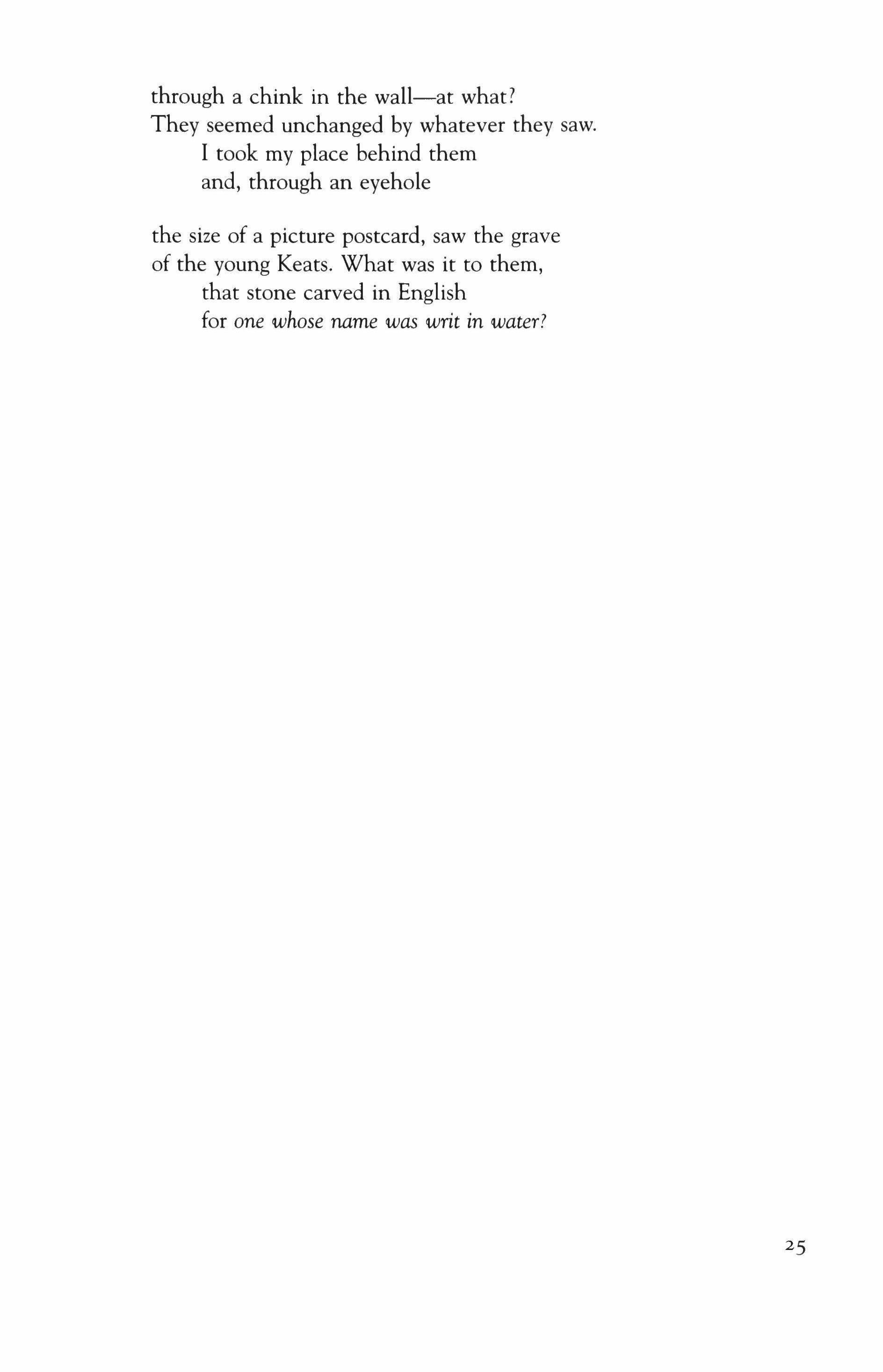
through a chink in the wall-at what? They seemed unchanged by whatever they saw. I took my place behind them and, through an eyehole
the size of a picture postcard, saw the grave of the young Keats. What was it to them, that stone carved in English for one whose name was writ in water?
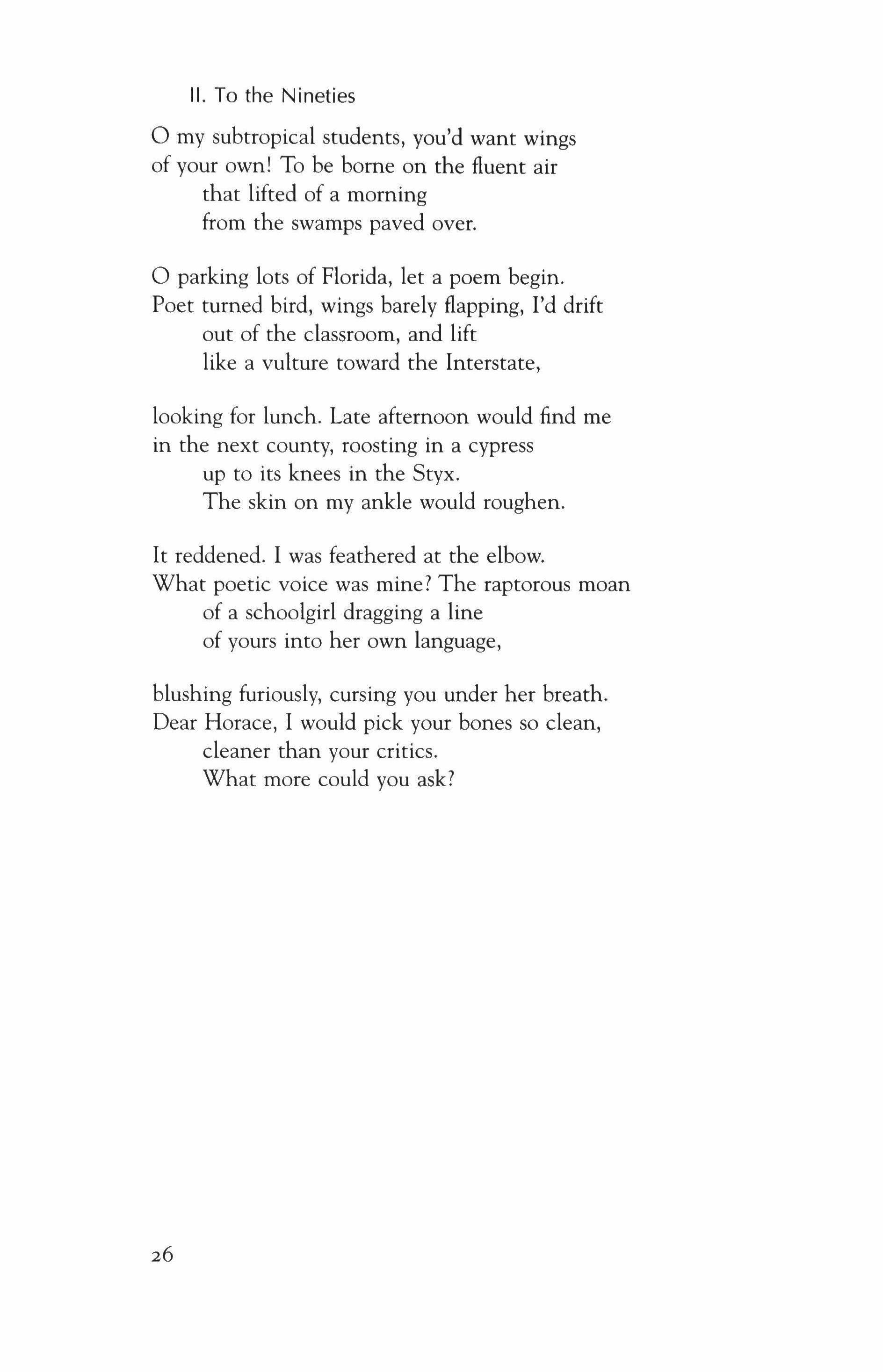
II. To the Nineties
o my subtropical students, you'd want wings of your own! To be borne on the fluent air that lifted of a morning from the swamps paved over.
o parking lots of Florida, let a poem begin. Poet turned bird, wings barely flapping, I'd drift out of the classroom, and lift like a vulture toward the Interstate,
looking for lunch. Late afternoon would find me in the next county, roosting in a cypress up to its knees in the Styx. The skin on my ankle would roughen.
It reddened. I was feathered at the elbow. What poetic voice was mine? The raptorous moan of a schoolgirl dragging a line of yours into her own language,
blushing furiously, cursing you under her breath. Dear Horace, I would pick your bones so clean, cleaner than your critics. What more could you ask?
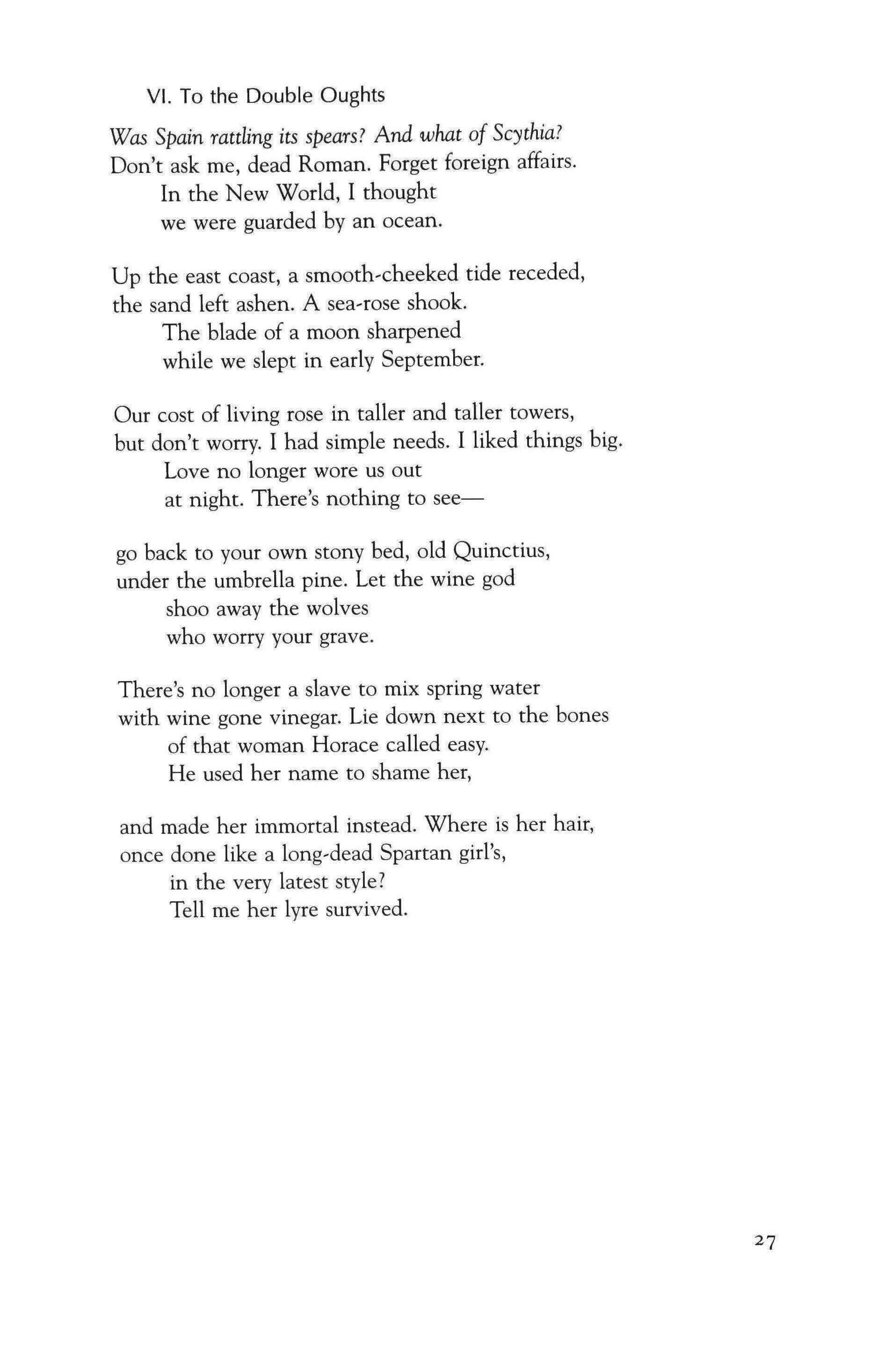
VI. To the Double Oughts
Was Spain rattling its spears? And what of Scythia? Don't ask me, dead Roman. Forget foreign affairs. In the New World, I thought we were guarded by an ocean.
Up the east coast, a smooth-cheeked tide receded, the sand left ashen. A sea-rose shook. The blade of a moon sharpened while we slept in early September.
Our cost of living rose in taller and taller towers, but don't worry. I had simple needs. I liked things big. Love no longer wore us out at night. There's nothing to see-
go back to your own stony bed, old Quinctius, under the umbrella pine. Let the wine god shoo away the wolves who worry your grave.
There's no longer a slave to mix spring water with wine gone vinegar. Lie down next to the bones of that woman Horace called easy. He used her name to shame her, and made her immortal instead. Where is her hair, once done like a long-dead Spartan girl's, in the very latest style? Tell me her lyre survived.
Ricardo Pau Llosa
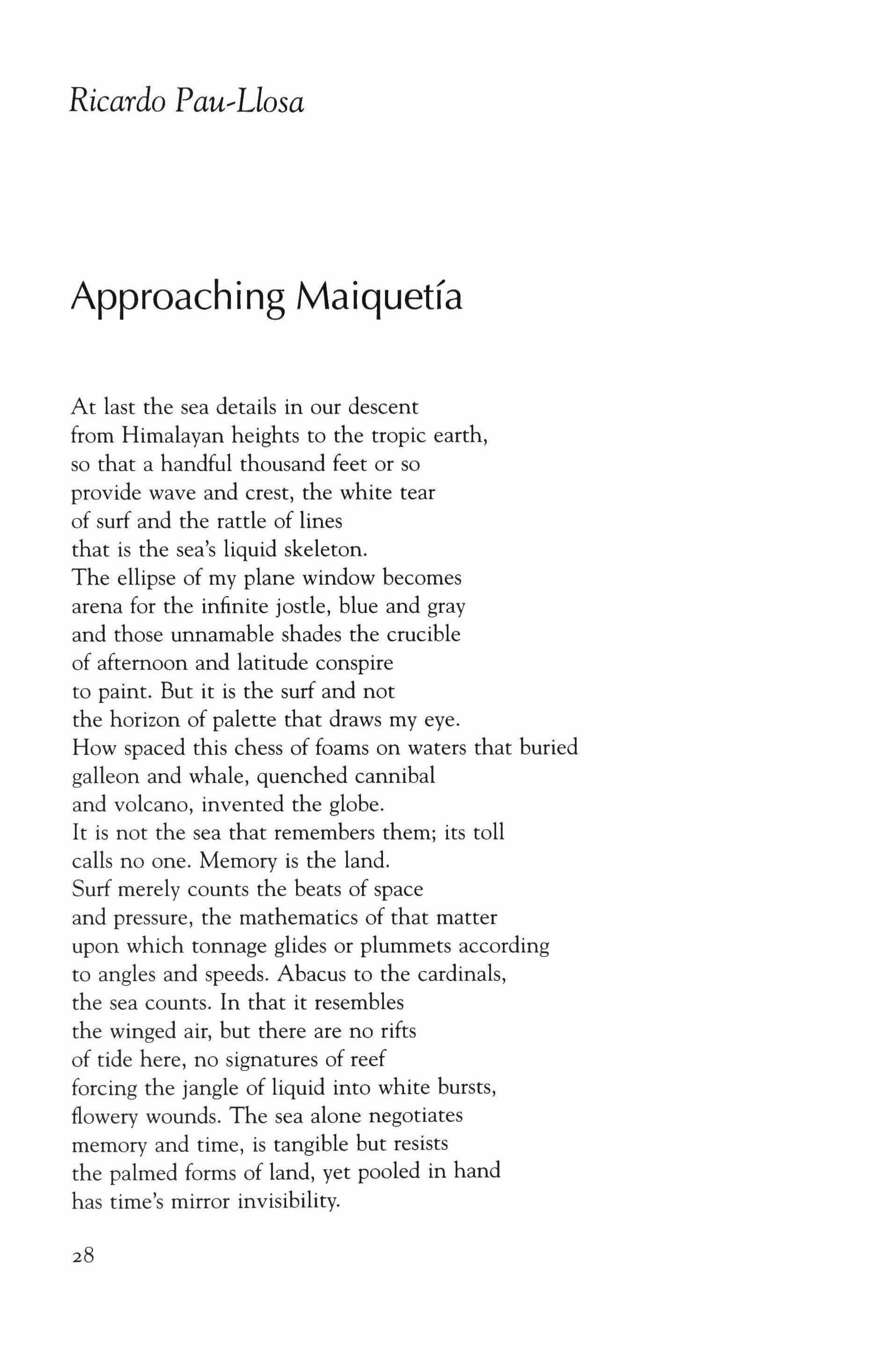
Approaching Maiquetfa
At last the sea details in our descent from Himalayan heights to the tropic earth, so that a handful thousand feet or so provide wave and crest, the white tear of surf and the rattle of lines that is the sea's liquid skeleton. The ellipse of my plane window becomes arena for the infinite jostle, blue and gray and those unnamable shades the crucible of afternoon and latitude conspire to paint. But it is the surf and not the horizon of palette that draws my eye. How spaced this chess of foams on waters that buried galleon and whale, quenched cannibal and volcano, invented the globe. It is not the sea that remembers them; its toll calls no one. Memory is the land. Surf merely counts the beats of space and pressure, the mathematics of that matter upon which tonnage glides or plummets according to angles and speeds. Abacus to the cardinals, the sea counts. In that it resembles the winged air, but there are no rifts of tide here, no signatures of reef forcing the jangle of liquid into white bursts, flowery wounds. The sea alone negotiates memory and time, is tangible but resists the palmed forms of land, yet pooled in hand has time's mirror invisibility.
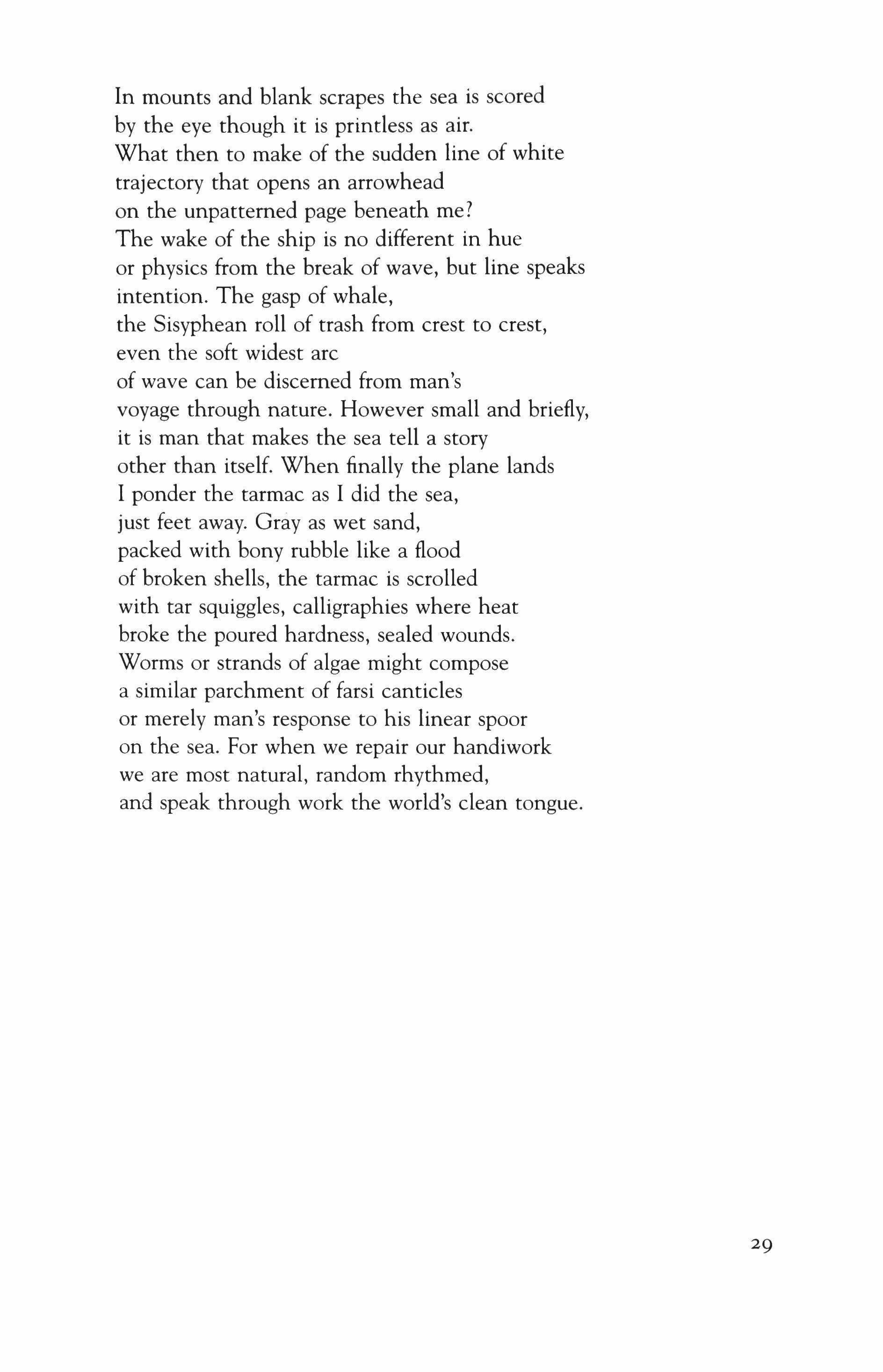
In mounts and blank scrapes the sea is scored by the eye though it is printless as air. What then to make of the sudden line of white trajectory that opens an arrowhead on the unpatterned page beneath me? The wake of the ship is no different in hue or physics from the break of wave, but line speaks intention. The gasp of whale, the Sisyphean roll of trash from crest to crest, even the soft widest arc of wave can be discerned from man's voyage through nature. However small and briefly, it is man that makes the sea tell a story other than itself. When finally the plane lands I ponder the tarmac as I did the sea, just feet away. Gray as wet sand, packed with bony rubble like a flood of broken shells, the tarmac is scrolled with tar squiggles, calligraphies where heat broke the poured hardness, sealed wounds. Worms or strands of algae might compose a similar parchment of farsi canticles or merely man's response to his linear spoor on the sea. For when we repair our handiwork we are most natural, random rhythmed, and speak through work the world's clean tongue.
29
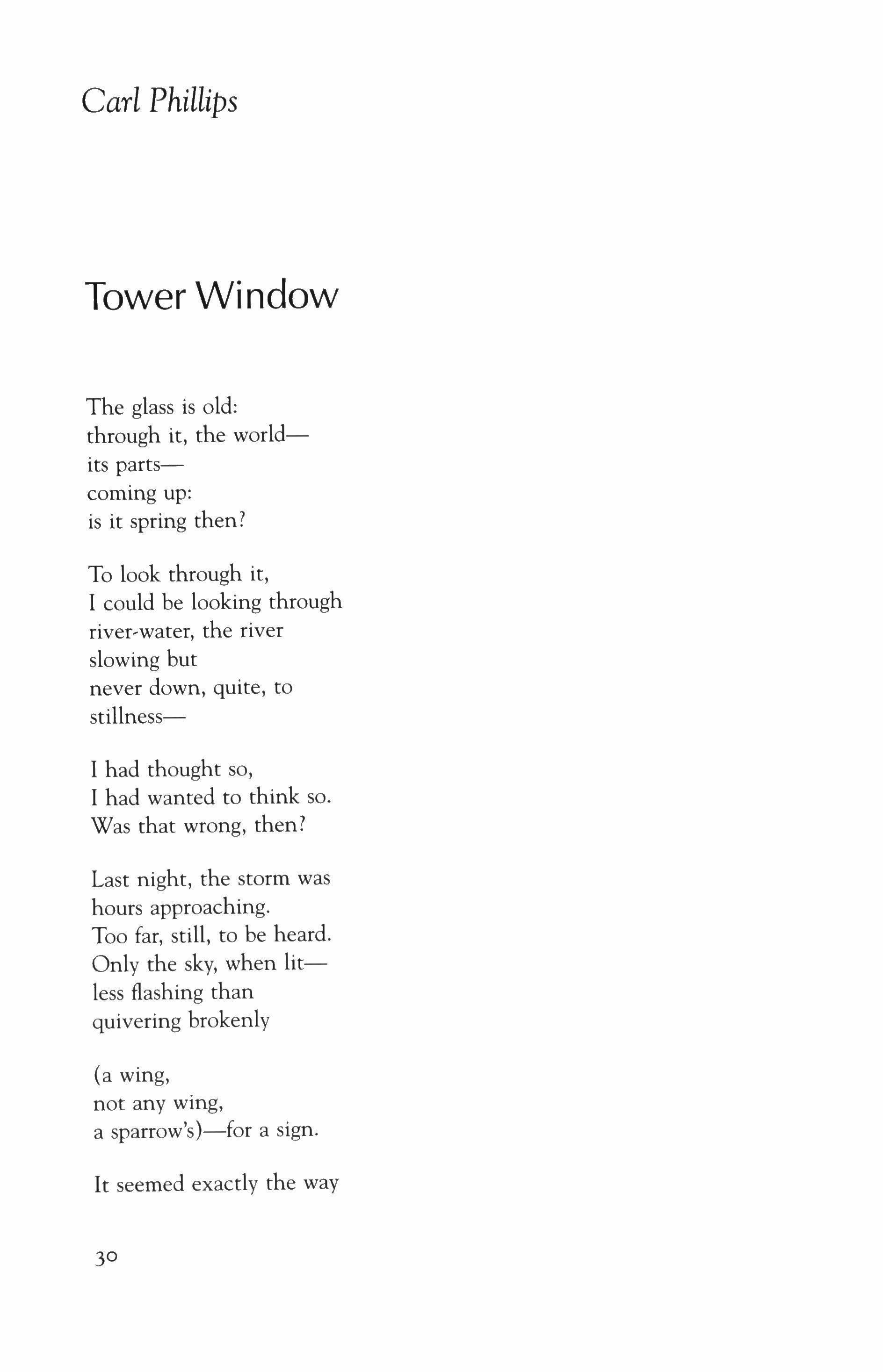
Carl Phillips Tower
Window
The glass is old: through it, the worldits partscoming up: is it spring then?
To look through it, I could be looking through river-water, the river slowing but never down, quite, to stillness-
I had thought so, I had wanted to think so. Was that wrong, then?
Last night, the storm was hours approaching. Too far, still, to be heard. Only the sky, when litless flashing than quivering brokenly (a wing, not any wing, a sparrow's)-for a sign.
It seemed exactly the way
30
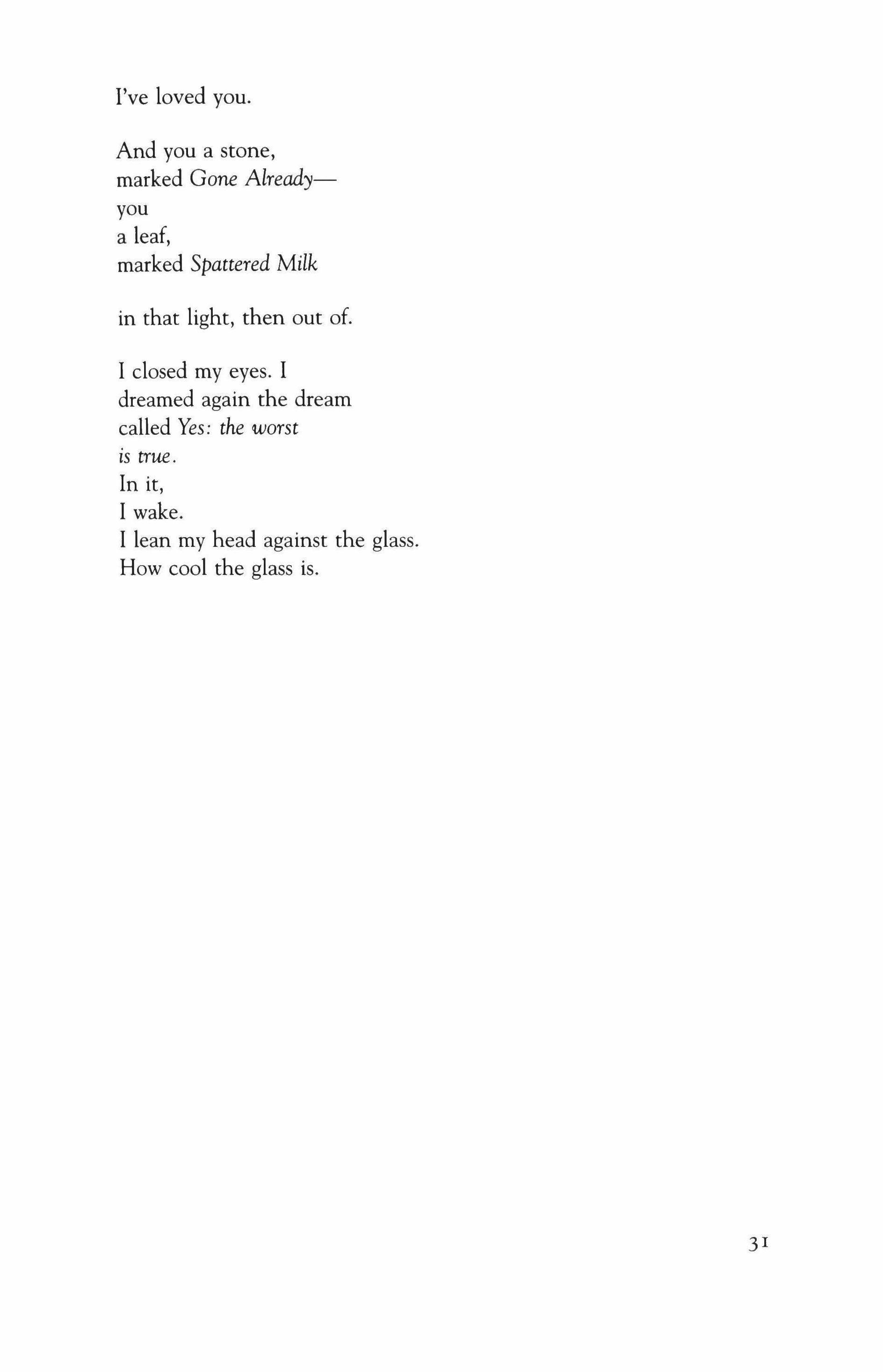
I've loved you.
And you a stone, marked Gone Alreadyyou a leaf, marked Spattered Milk in that light, then out of.
I closed my eyes. I dreamed again the dream called Yes: the worst is true. In it, I wake.
I lean my head against the glass. How cool the glass is.
31
Trophy
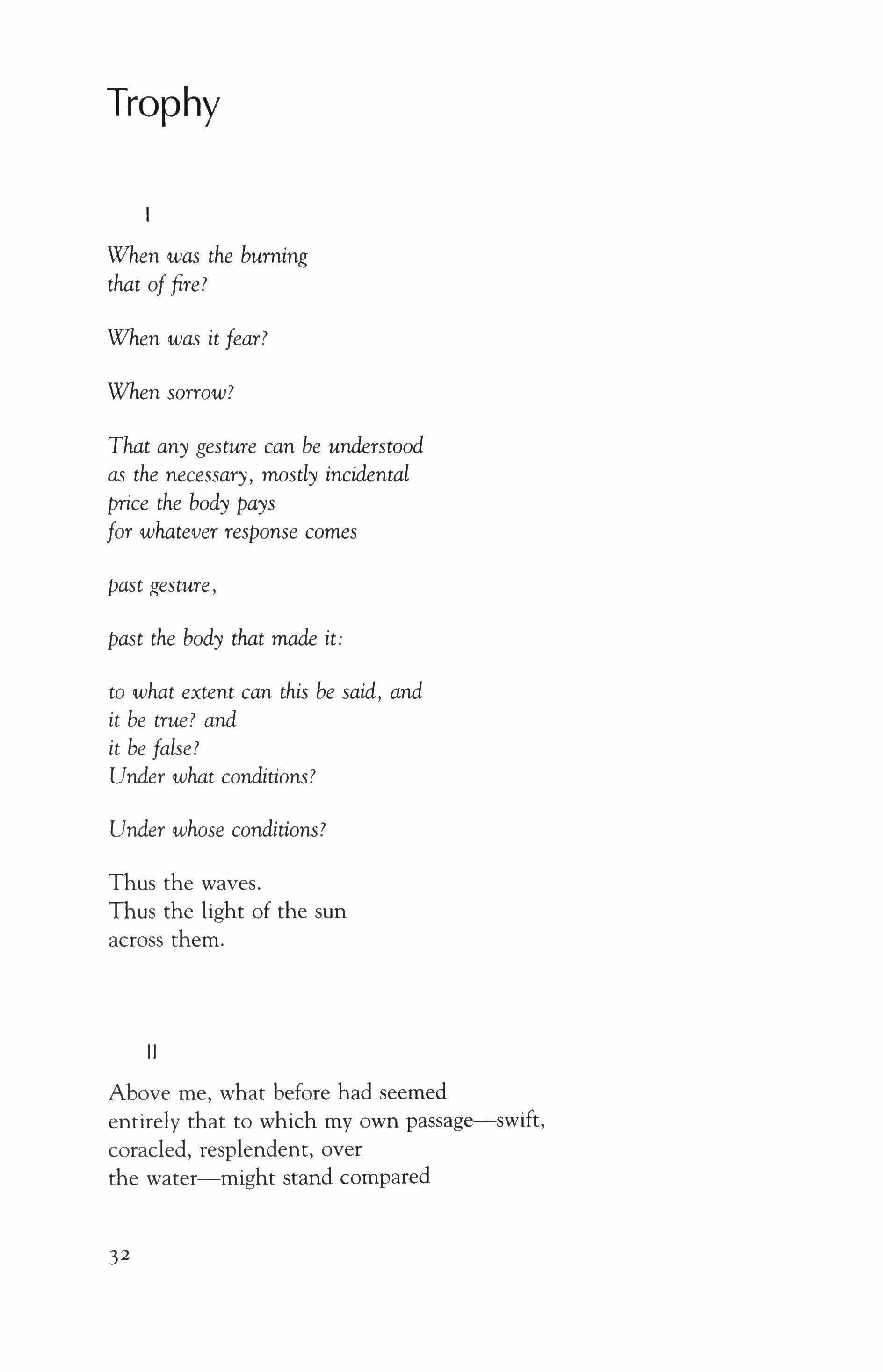
When was the burning that offire?
When was it fear?
When sorrow?
That any gesture can be understood as the necessary, mostly incidental price the body pays for whatever response comes past gesture, past the body that made it:
to what extent can this be said, and it be true? and it be false?
Under what conditions?
Under whose conditions?
Thus the waves. Thus the light of the sun across them.
Above me, what before had seemed entirely that to which my own passage-swift, coracled, resplendent, over the water-might stand compared
II
32
are clouds now, now interruption, the way that water is interruption, the land only ending apparently,
there, where not so long ago I pushed off from it, it does not end It seems I am rowing, it seems to the rhythm of a song there's nothing left of except the rhythm, no notes, a broken line, the words, to -guessing-sing to, No, sing No, I'll have no other-
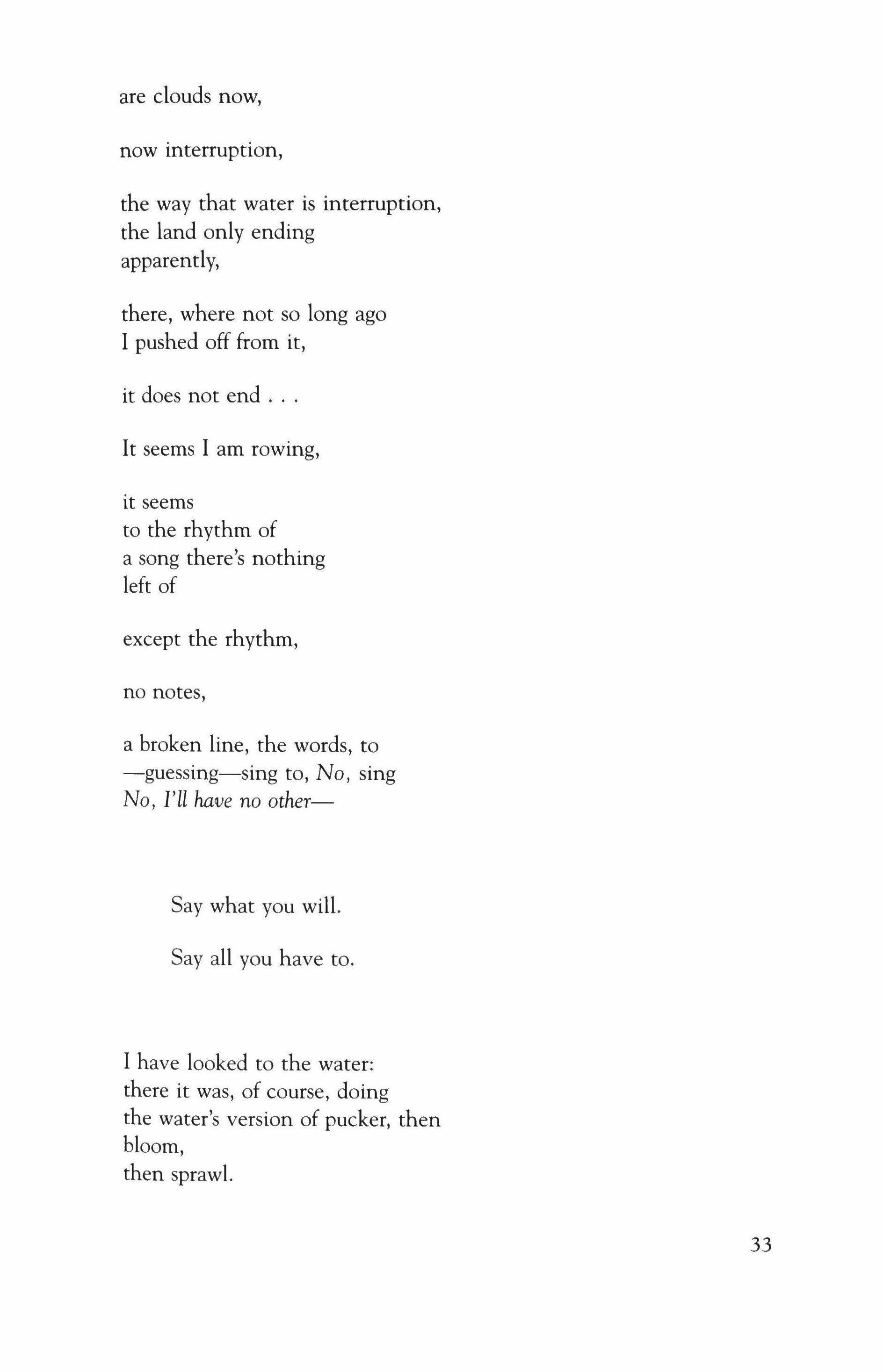
Say what you will.
Say all you have to.
I have looked to the water: there it was, of course, doing the water's version of pucker, then bloom, then sprawL
33
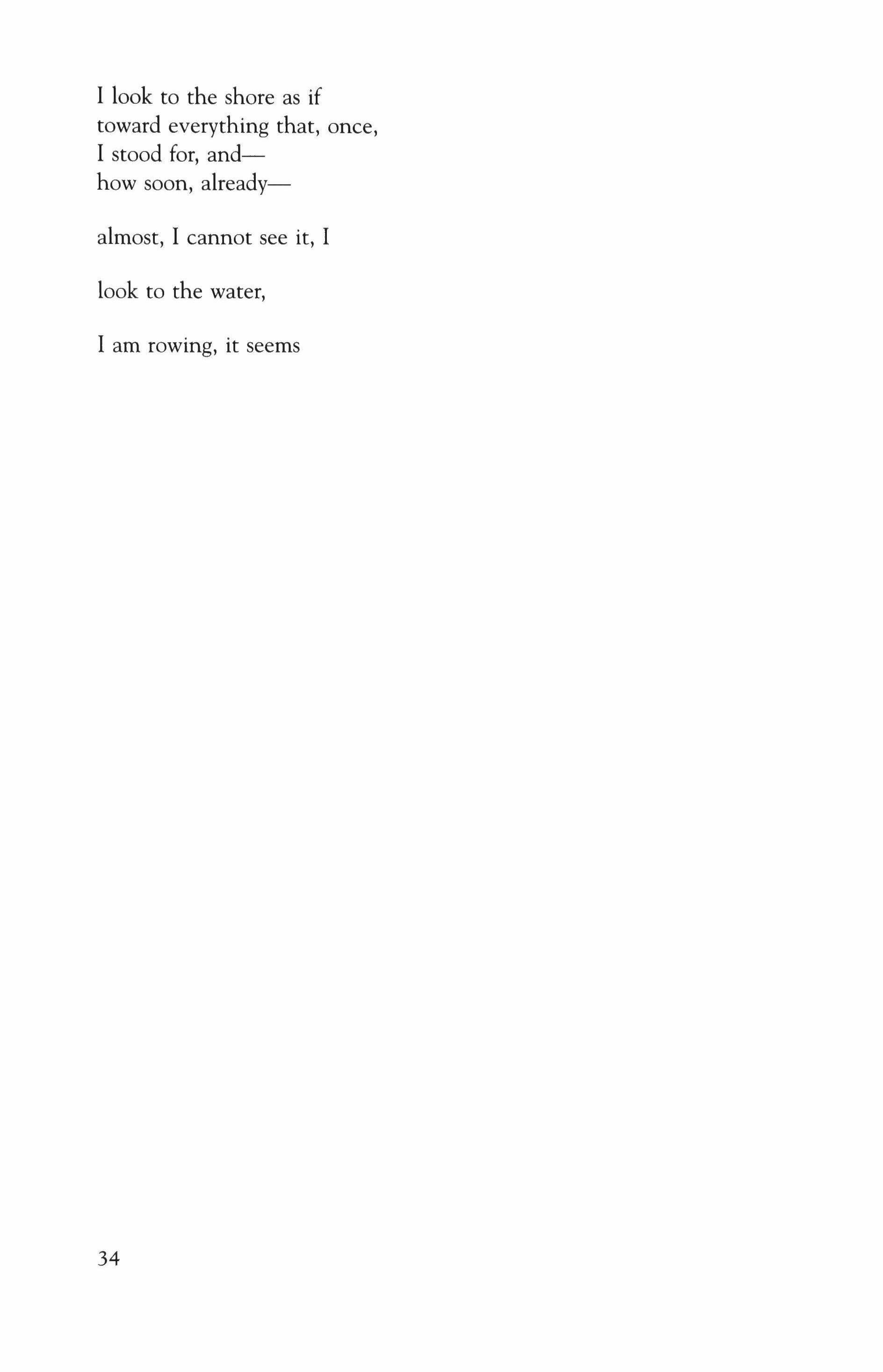
I look to the shore as if toward everything that, once, I stood for, andhow soon, already-
almost, I cannot see it, I look to the water, I am rowing, it seems
34
In Stone
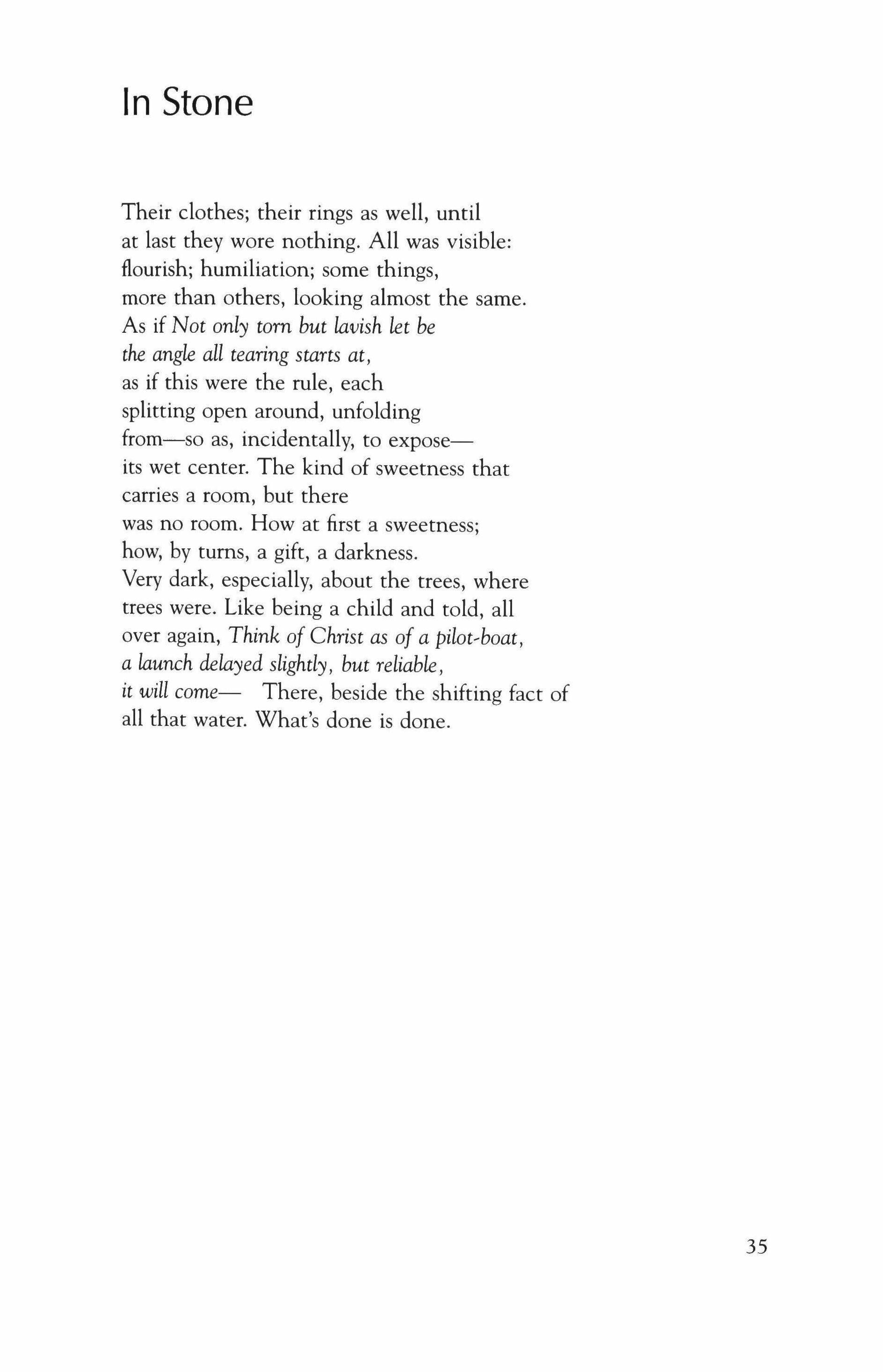
Their clothes; their rings as well, until at last they wore nothing. All was visible: flourish; humiliation; some things, more than others, looking almost the same. As if Not only tom but lavish let be the angle all tearing starts at, as if this were the rule, each splitting open around, unfolding from-so as, incidentally, to exposeits wet center. The kind of sweetness that carries a room, but there was no room. Howat first a sweetness; how, by turns, a gift, a darkness. Very dark, especially, about the trees, where trees were. Like being a child and told, all over again, Think of Christ as of a pilot�boat, a launch delayed slightly, but reliable, it will come- There, beside the shifting fact of all that water. What's done is done.
35
Sanctum
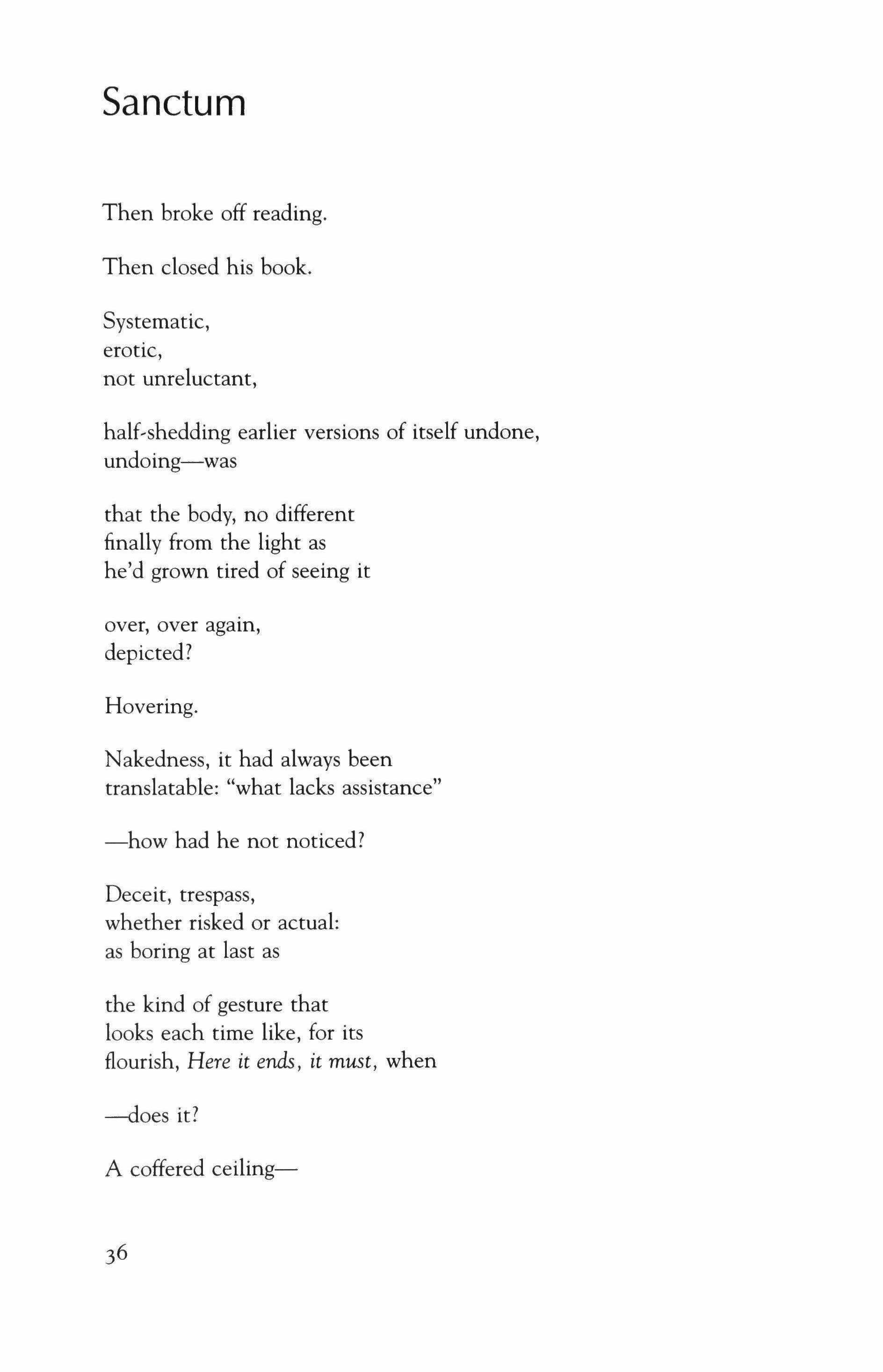
Then broke off reading.
Then closed his book.
Systematic, erotic, not unreluctant, half-shedding earlier versions of itself undone, undoing-was that the body, no different finally from the light as he'd grown tired of seeing it over, over again, depicted?
Hovering.
Nakedness, it had always been translatable: "what lacks assistance" -how had he not noticed?
Deceit, trespass, whether risked or actual: as boring at last as the kind of gesture that looks each time like, for its flourish, Here it ends, it must, when --does it?
A coffered ceiling-s-
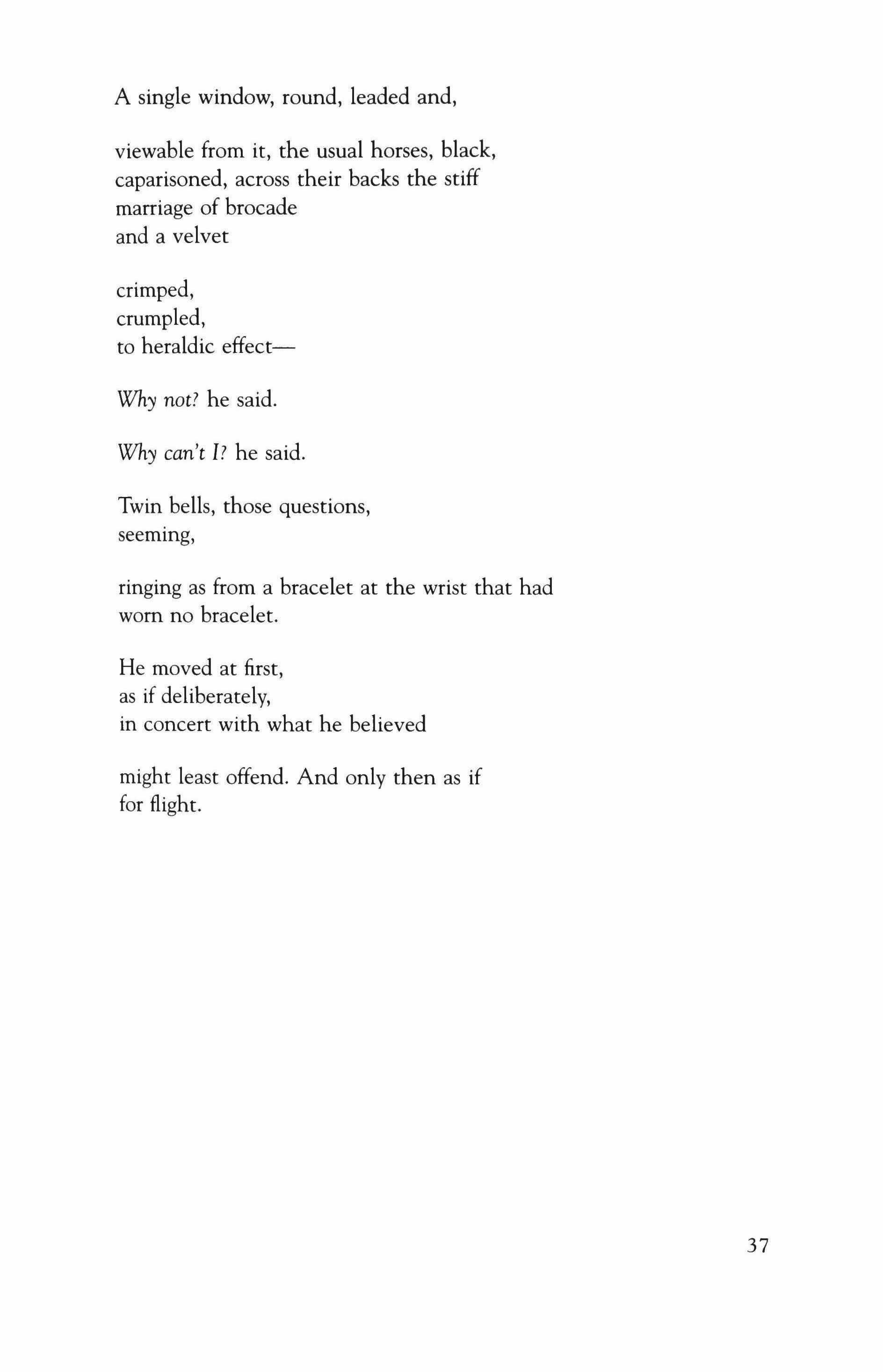
A single window, round, leaded and,
viewable from it, the usual horses, black, caparisoned, across their backs the stiff marriage of brocade and a velvet crimped, crumpled, to heraldic effect-
Why not? he said.
Why can't l? he said.
Twin bells, those questions, seeming, ringing as from a bracelet at the wrist that had worn no bracelet.
He moved at first, as if deliberately, in concert with what he believed
might least offend. And only then as if for flight.
37
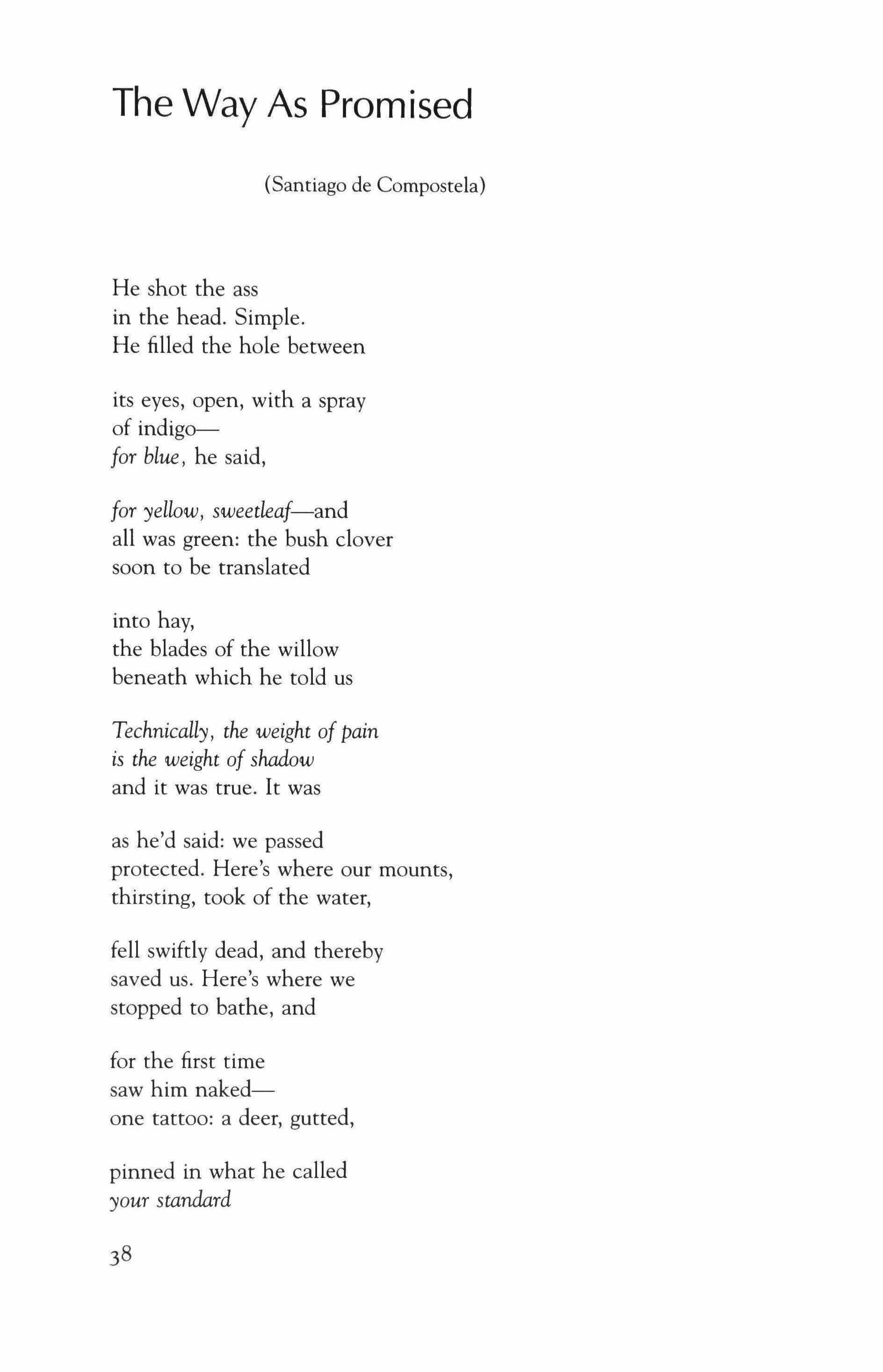
The Way As Promised
(Santiago de Compostela)
He shot the ass in the head. Simple. He filled the hole between its eyes, open, with a spray of indigofor blue, he said, for yellow, sweetleaf-and all was green: the bush clover soon to be translated into hay, the blades of the willow beneath which he told us
Technically, the weight of pain is the weight of shadow and it was true. It was as he'd said: we passed protected. Here's where our mounts, thirsting, took of the water, fell swiftly dead, and thereby saved us. Here's where we stopped to bathe, and for the first time saw him nakedone tattoo: a deer, gutted, pinned in what he called your standard
Chrisr-on-rhe-cross position, by which, it seems now, he meant in no way a thing unholy. Here he is, taking my handfirst to his chest, then his mouth, saying, as if toward someone who has not read as much already, This road goes far. And herepast that-saying Listen, what makes the truth so difficult is also what draws us to it: how clear it is.
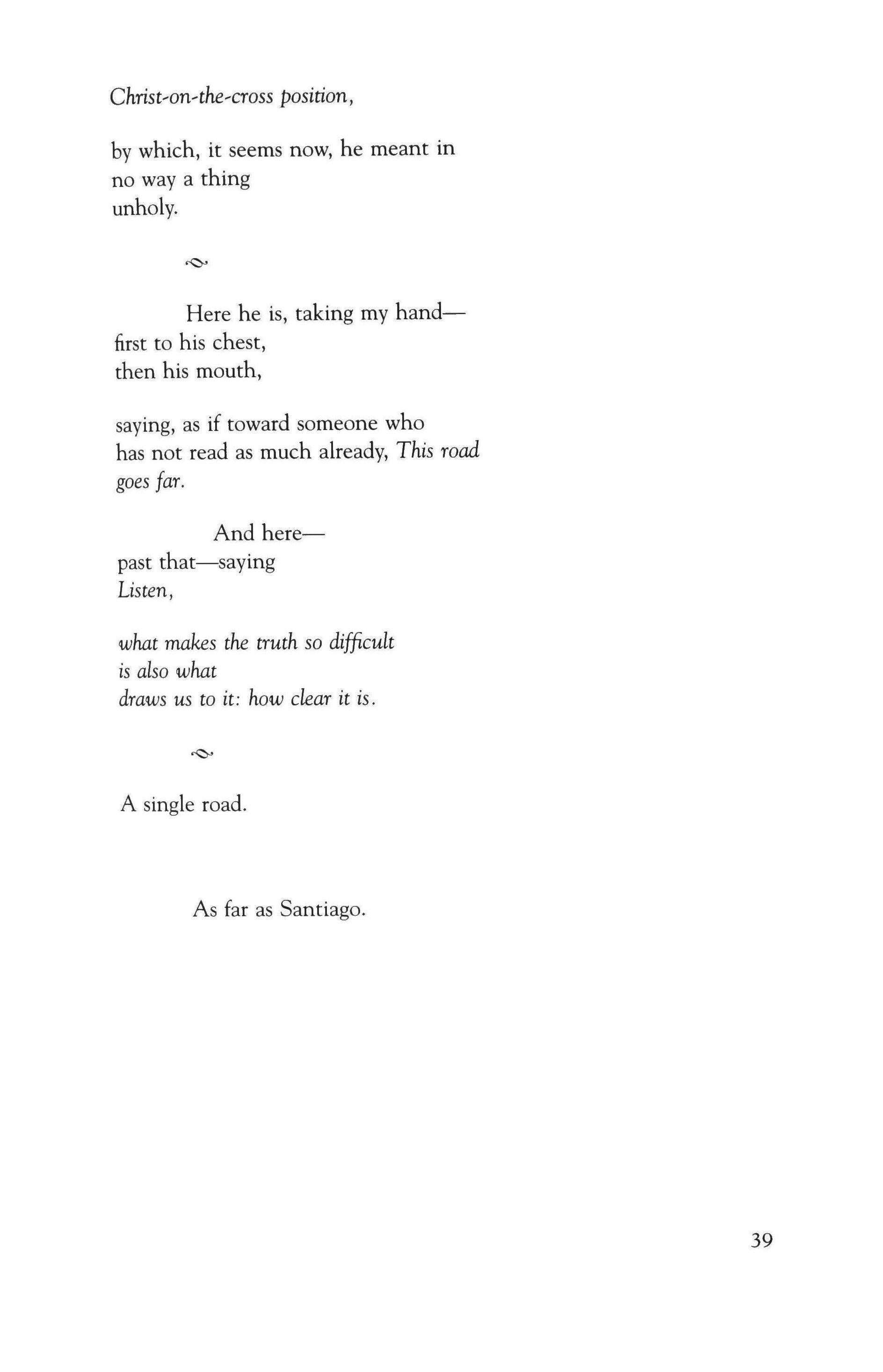
A single road. As far as Santiago.
39
Reetika Vazirani
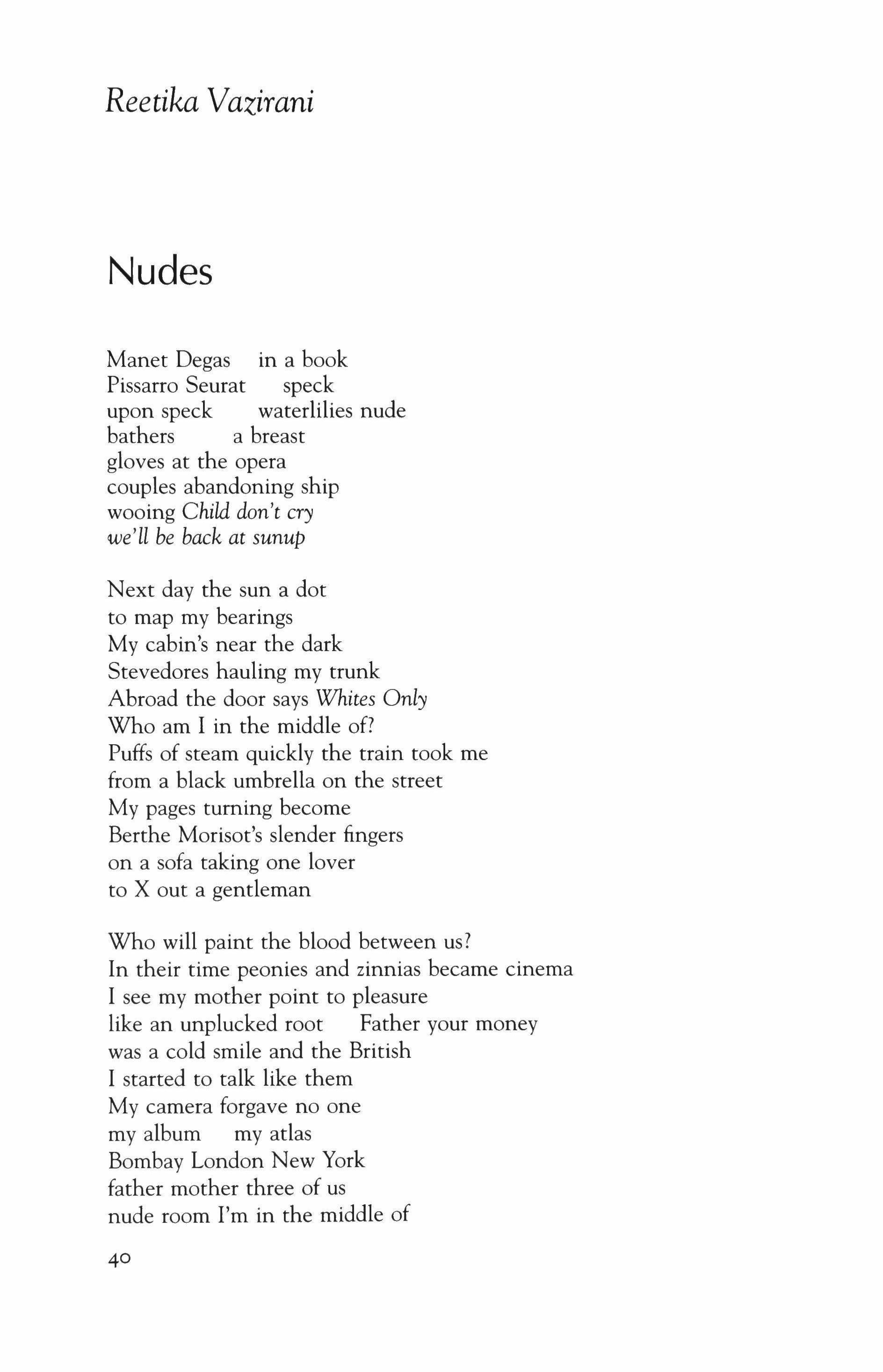
Nudes
Manet Degas in a book
Pissarro Seurat speck upon speck waterlilies nude bathers a breast gloves at the opera couples abandoning ship wooing Child don't cry we'll be back at sunup
Next day the sun a dot to map my bearings
My cabin's near the dark Stevedores hauling my trunk Abroad the door says Whites Only Who am I in the middle of?
Puffs of steam quickly the train took me from a black umbrella on the street
My pages turning become Berthe Morisot's slender fingers on a sofa taking one lover to X out a gentleman
Who will paint the blood between us?
In their time peonies and zinnias became cinema
I see my mother point to pleasure like an unplucked root Father your money was a cold smile and the British I started to talk like them
My camera forgave no one my album my atlas Bombay London New York father mother three of us nude room I'm in the middle of
Dedicated to You
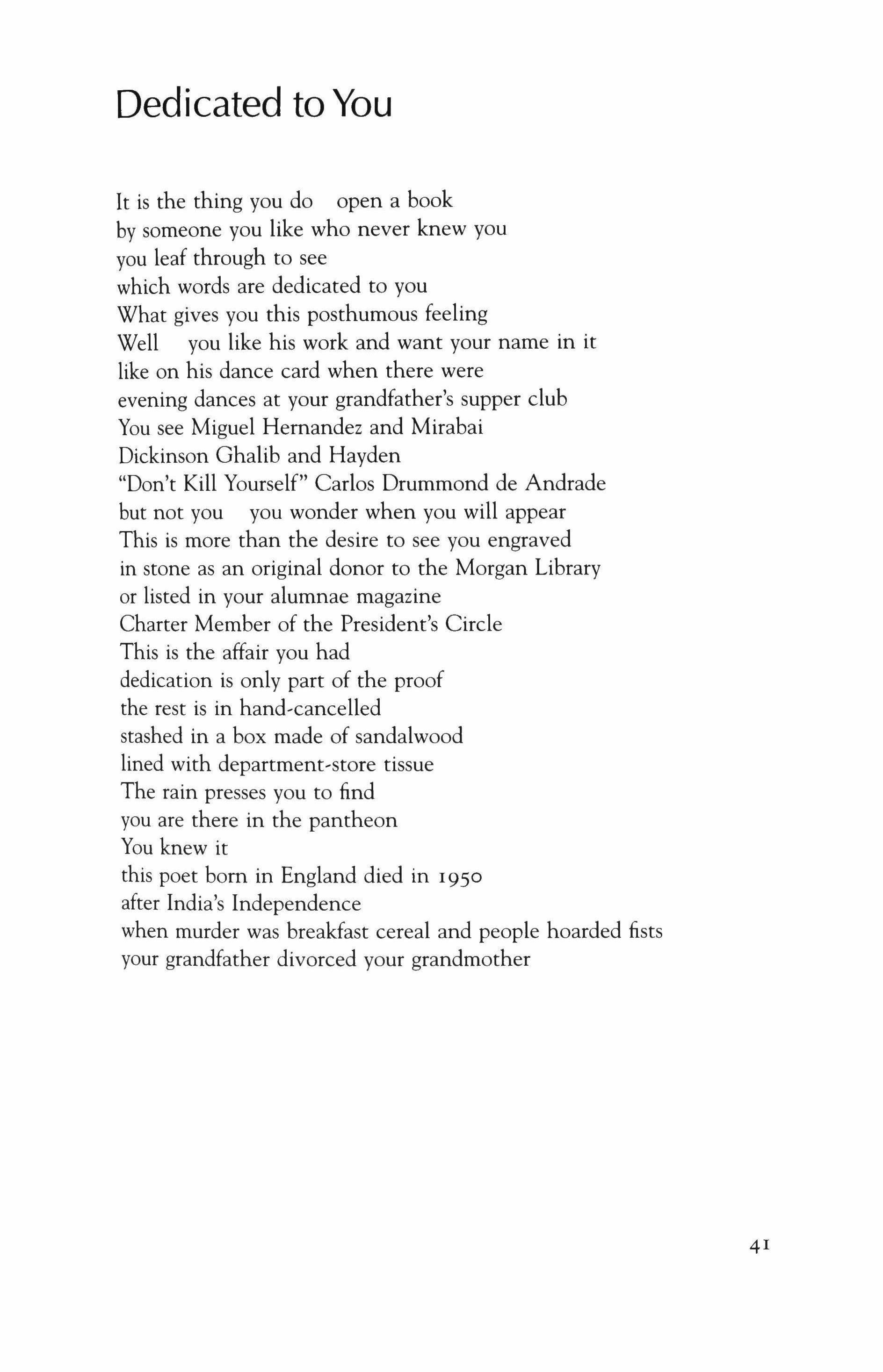
It is the thing you do open a book by someone you like who never knew you you leaf through to see which words are dedicated to you
What gives you this posthumous feeling
Well you like his work and want your name in it like on his dance card when there were evening dances at your grandfather's supper club You see Miguel Hernandez and Mirabai Dickinson Ghalib and Hayden "Don't Kill Yourself" Carlos Drummond de Andrade but not you you wonder when you will appear This is more than the desire to see you engraved in stone as an original donor to the Morgan Library or listed in your alumnae magazine Charter Member of the President's Circle
This is the affair you had dedication is only part of the proof the rest is in hand-cancelled stashed in a box made of sandalwood lined with department-store tissue The rain presses you to find you are there in the pantheon You knew it this poet born in England died in 1950 after India's Independence when murder was breakfast cereal and people hoarded fists your grandfather divorced your grandmother
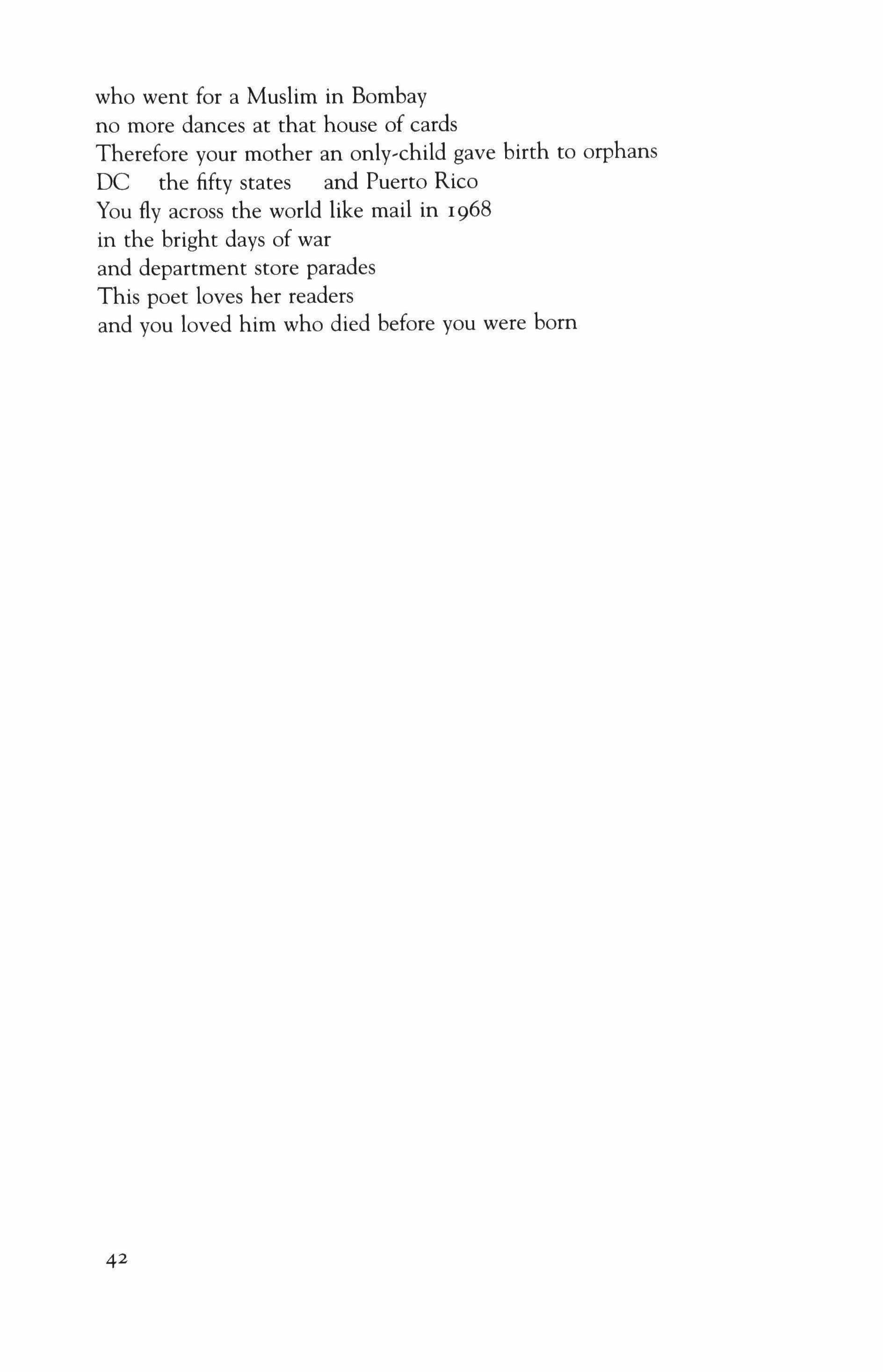
who went for a Muslim in Bombay no more dances at that house of cards
Therefore your mother an only-child gave birth to orphans DC the fifty states and Puerto Rico
You fly across the world like mail in 1968 in the bright days of war and department store parades
This poet loves her readers and you loved him who died before you were born
42
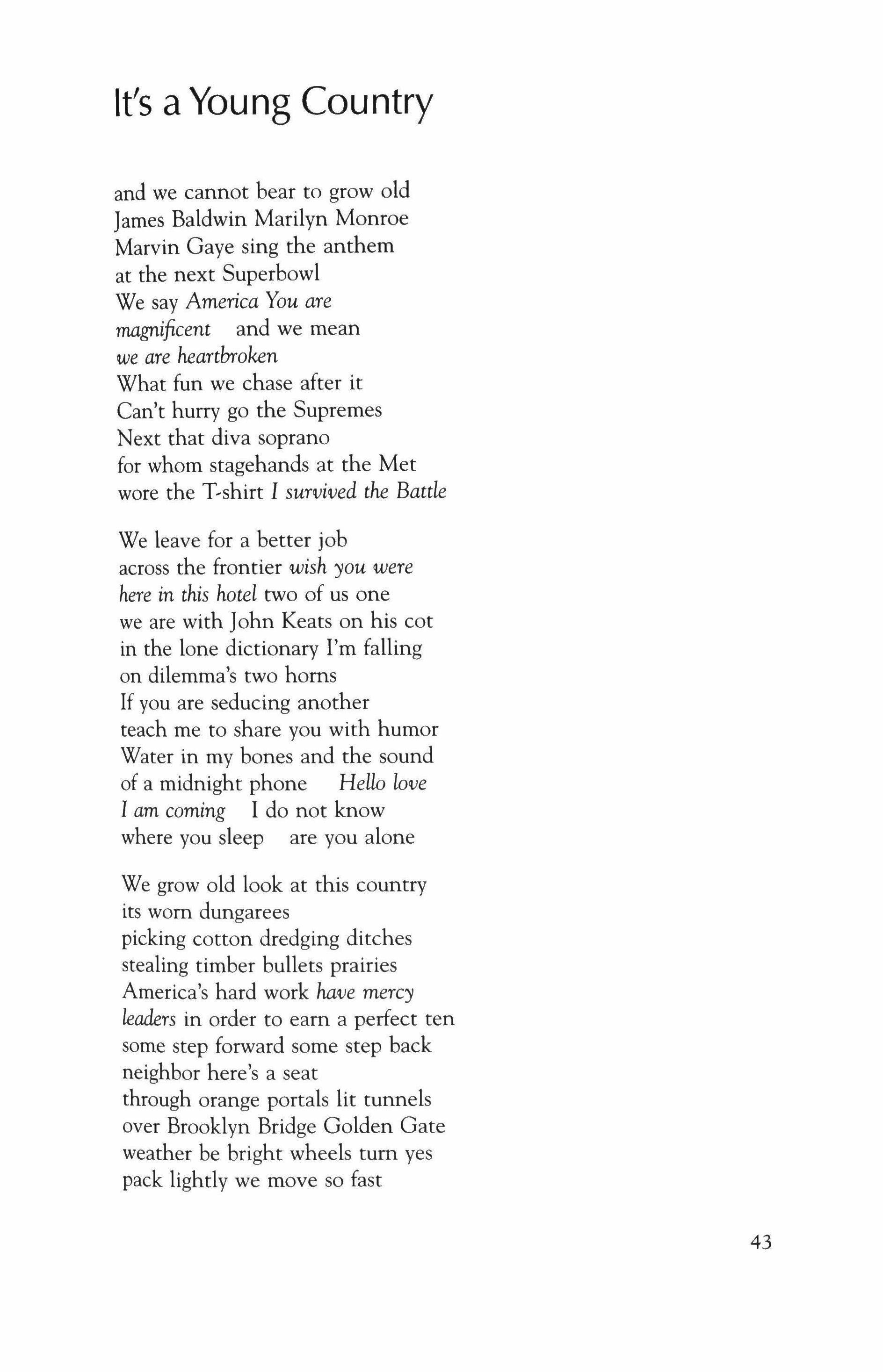
It's a Young Country
and we cannot bear to grow old James Baldwin Marilyn Monroe Marvin Gaye sing the anthem at the next Superbowl
We say America You are magnificent and we mean we are heartbroken What fun we chase after it Can't hurry go the Supremes Next that diva soprano for whom stagehands at the Met wore the Tshirt I survived the Battle
We leave for a better job across the frontier wish you were here in this hotel two of us one we are with John Keats on his cot in the lone dictionary I'm falling on dilemma's two horns
If you are seducing another teach me to share you with humor Water in my bones and the sound of a midnight phone Hello love I am coming I do not know where you sleep are you alone
We grow old look at this country its worn dungarees picking cotton dredging ditches stealing timber bullets prairies America's hard work have mercy leaders in order to earn a perfect ten some step forward some step back neighbor here's a seat through orange portals lit tunnels over Brooklyn Bridge Golden Gate weather be bright wheels tum yes pack lightly we move so fast
43
Susan Stewart
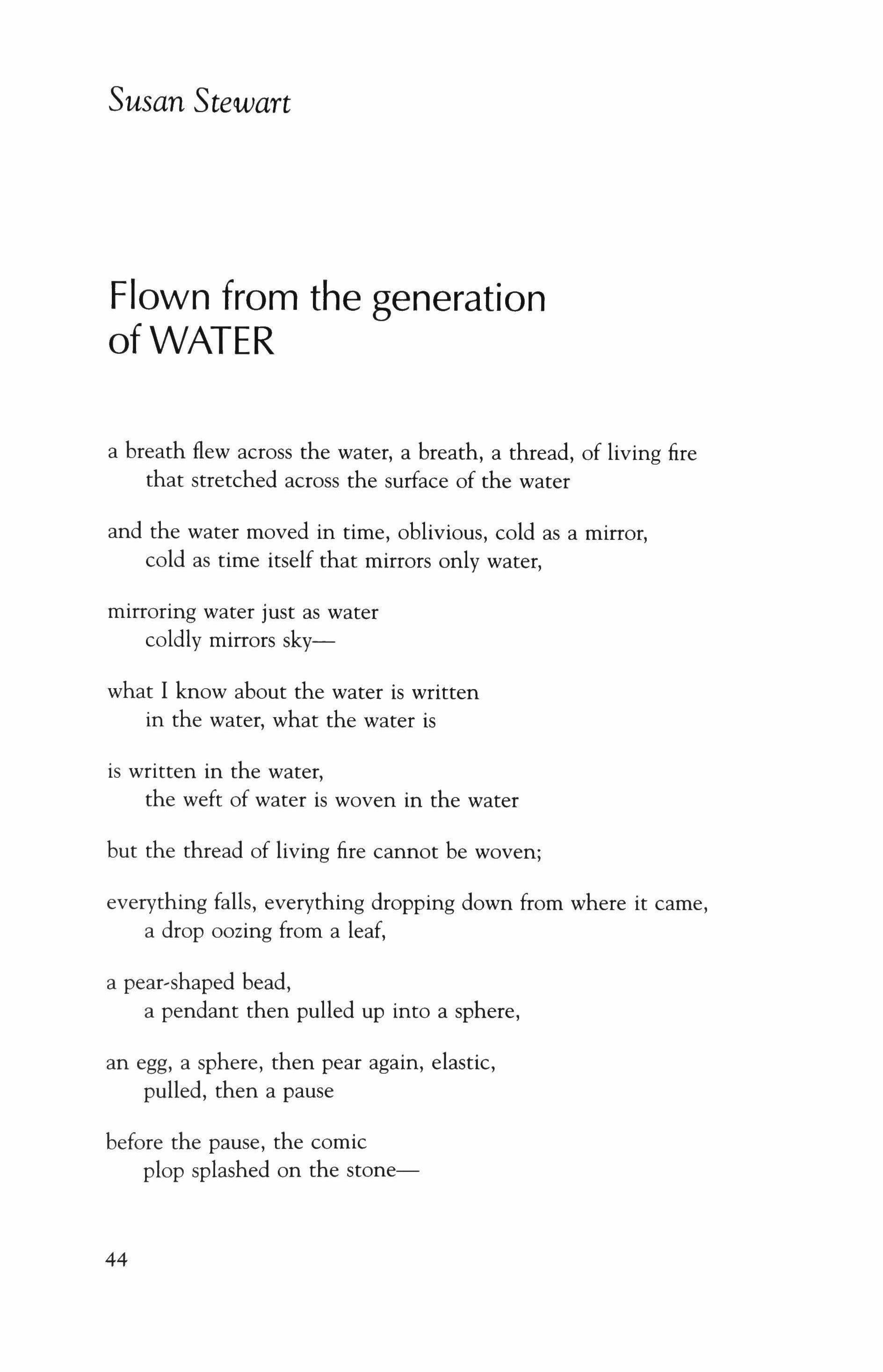
Flown from the generation of WATER
a breath flew across the water, a breath, a thread, of living fire that stretched across the surface of the water
and the water moved in time, oblivious, cold as a mirror, cold as time itself that mirrors only water, mirroring water just as water coldly mirrors skywhat I know about the water is written in the water, what the water is is written in the water, the weft of water is woven in the water but the thread of living fire cannot be woven; everything falls, everything dropping down from where it came, a drop oozing from a leaf,
a pear-shaped bead, a pendant then pulled up into a sphere,
an egg, a sphere, then pear again, elastic, pulled, then a pause before the pause, the comic plop splashed on the stone-
44
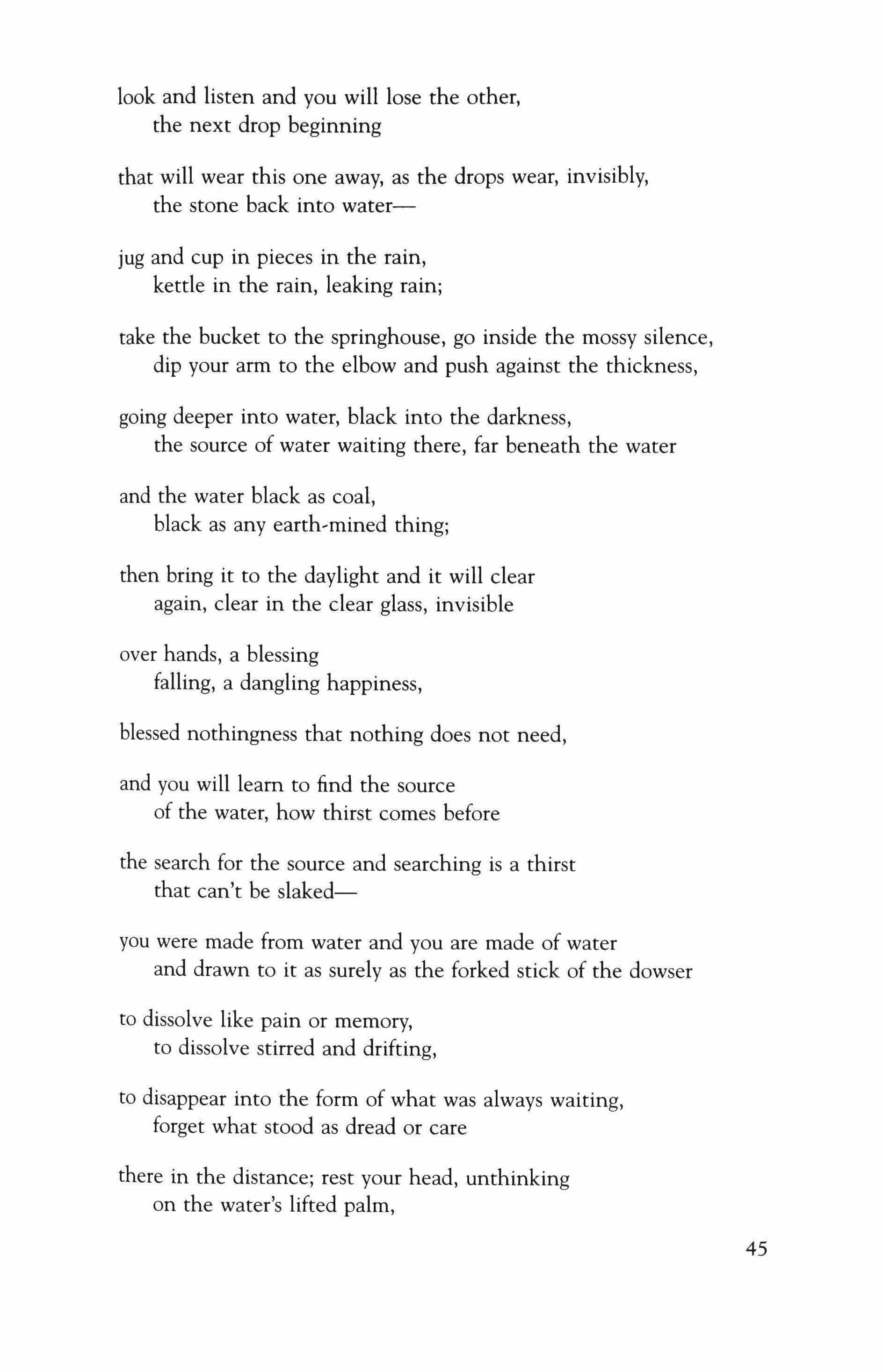
look and listen and you will lose the other, the next drop beginning
that will wear this one away, as the drops wear, invisibly, the stone back into water-
jug and cup in pieces in the rain, kettle in the rain, leaking rain; take the bucket to the springhouse, go inside the mossy silence, dip your arm to the elbow and push against the thickness, going deeper into water, black into the darkness, the source of water waiting there, far beneath the water and the water black as coal, black as any earth-mined thing; then bring it to the daylight and it will clear again, clear in the clear glass, invisible
over hands, a blessing falling, a dangling happiness, blessed nothingness that nothing does not need, and you will learn to find the source of the water, how thirst comes before the search for the source and searching is a thirst that can't be slakedyou were made from water and you are made of water and drawn to it as surely as the forked stick of the dowser to dissolve like pain or memory, to dissolve stirred and drifting, to disappear into the form of what was always waiting, forget what stood as dread or care there in the distance; rest your head, unthinking on the water's lifted palm,
45
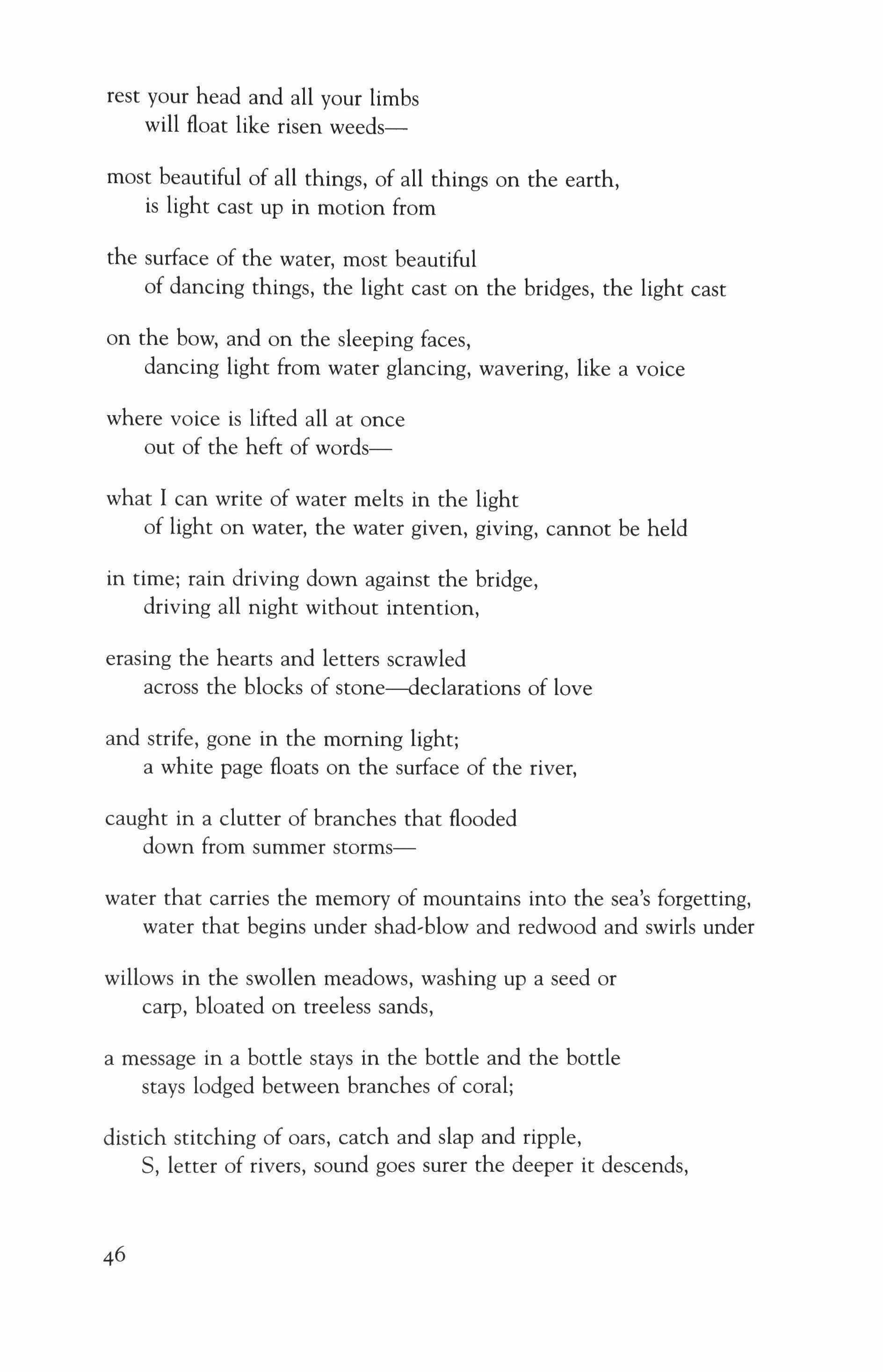
rest your head and all your limbs will float like risen weeds-
most beautiful of all things, of all things on the earth, is light cast up in motion from the surface of the water, most beautiful of dancing things, the light cast on the bridges, the light cast on the bow, and on the sleeping faces, dancing light from water glancing, wavering, like a voice where voice is lifted all at once out of the heft of wordswhat I can write of water melts in the light of light on water, the water given, giving, cannot be held in time; rain driving down against the bridge, driving all night without intention,
erasing the hearts and letters scrawled across the blocks of stone---declarations of love and strife, gone in the morning light; a white page floats on the surface of the river, caught in a clutter of branches that flooded down from summer stormswater that carries the memory of mountains into the sea's forgetting, water that begins under shad-blow and redwood and swirls under willows in the swollen meadows, washing up a seed or carp, bloated on treeless sands, a message in a bottle stays in the bottle and the bottle stays lodged between branches of coral; distich stitching of oars, catch and slap and ripple, S, letter of rivers, sound goes surer the deeper it descends,
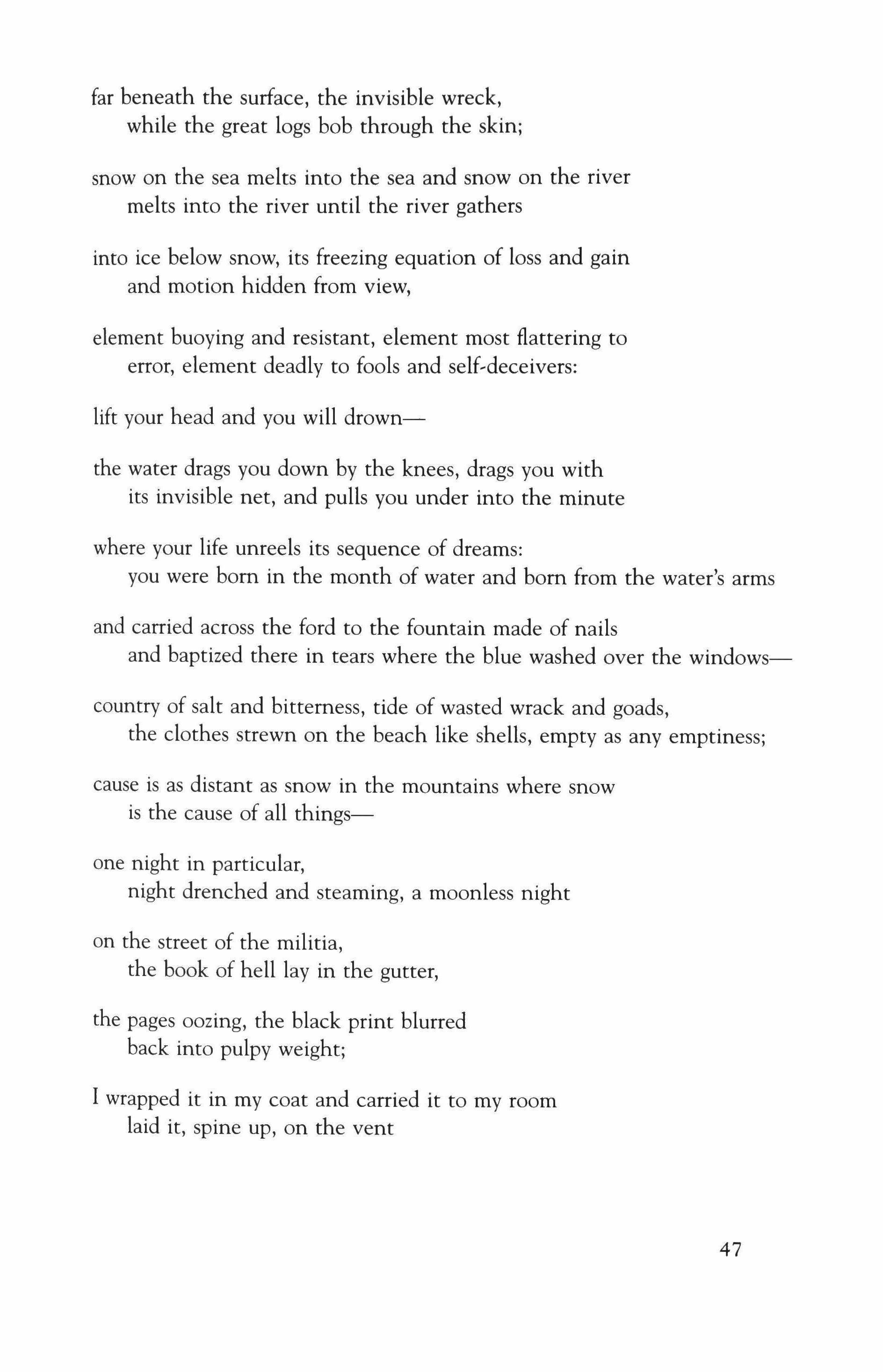
far beneath the surface, the invisible wreck, while the great logs bob through the skin;
snow on the sea melts into the sea and snow on the river melts into the river until the river gathers into ice below snow, its freezing equation of loss and gain and motion hidden from view, element buoying and resistant, element most flattering to error, element deadly to fools and self-deceivers: lift your head and you will drownthe water drags you down by the knees, drags you with its invisible net, and pulls you under into the minute where your life unreels its sequence of dreams: you were born in the month of water and born from the water's arms and carried across the ford to the fountain made of nails and baptized there in tears where the blue washed over the windowscountry of salt and bitterness, tide of wasted wrack and goads, the clothes strewn on the beach like shells, empty as any emptiness;
cause is as distant as snow in the mountains where snow is the cause of all things-
one night in particular, night drenched and steaming, a moonless night on the street of the militia, the book of hell lay in the gutter, the pages oozing, the black print blurred back into pulpy weight;
I wrapped it in my coat and carried it to my room laid it, spine up, on the vent
47
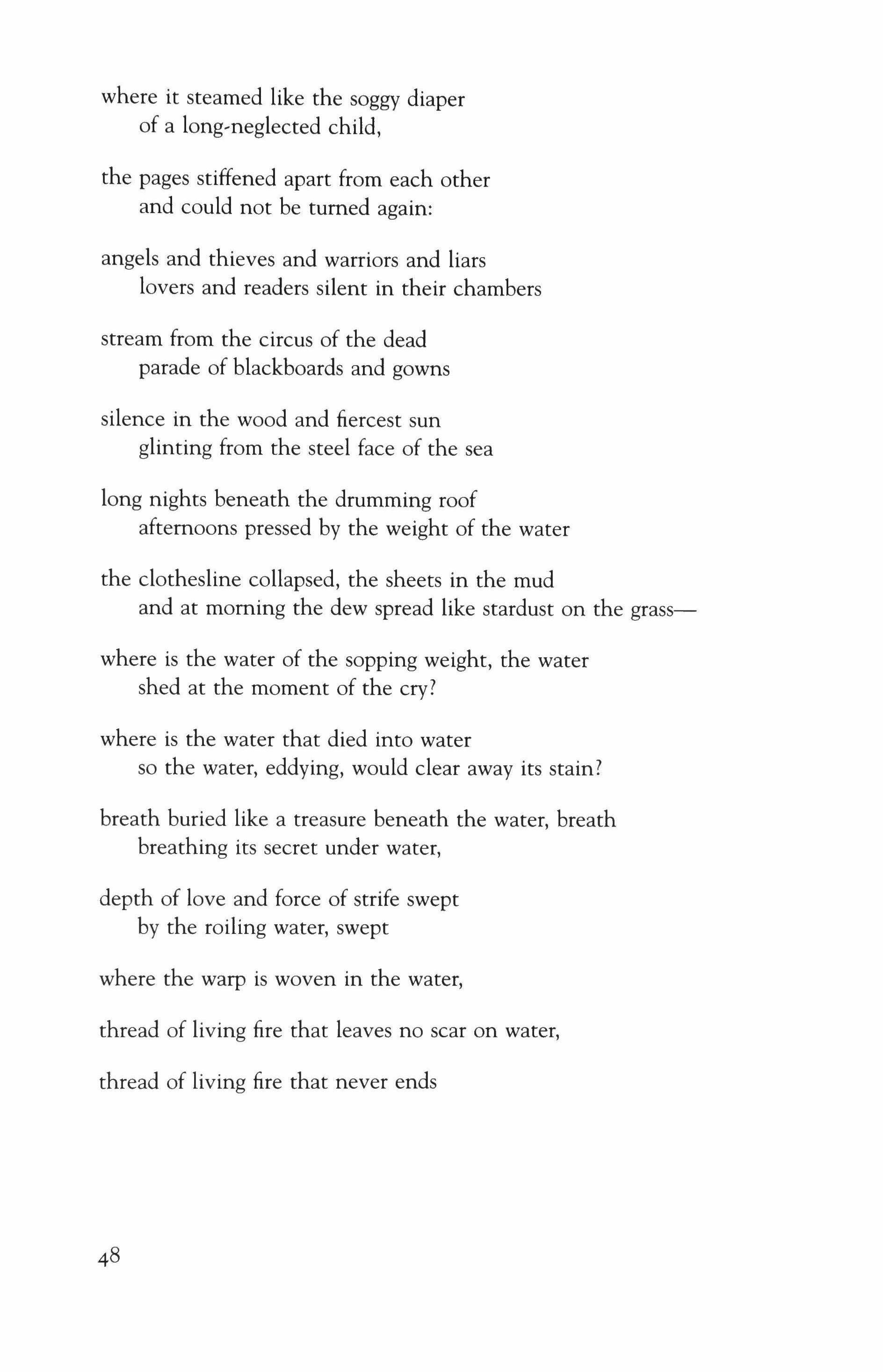
where it steamed like the soggy diaper of a long-neglected child,
the pages stiffened apart from each other and could not be turned again:
angels and thieves and warriors and liars lovers and readers silent in their chambers
stream from the circus of the dead parade of blackboards and gowns
silence in the wood and fiercest sun glinting from the steel face of the sea
long nights beneath the drumming roof afternoons pressed by the weight of the water
the clothesline collapsed, the sheets in the mud and at morning the dew spread like stardust on the grass-
where is the water of the sopping weight, the water shed at the moment of the cry?
where is the water that died into water so the water, eddying, would clear away its stain?
breath buried like a treasure beneath the water, breath breathing its secret under water,
depth of love and force of strife swept by the roiling water, swept
where the warp is woven in the water,
thread of living fire that leaves no scar on water,
thread of living fire that never ends
Jeanne Foster
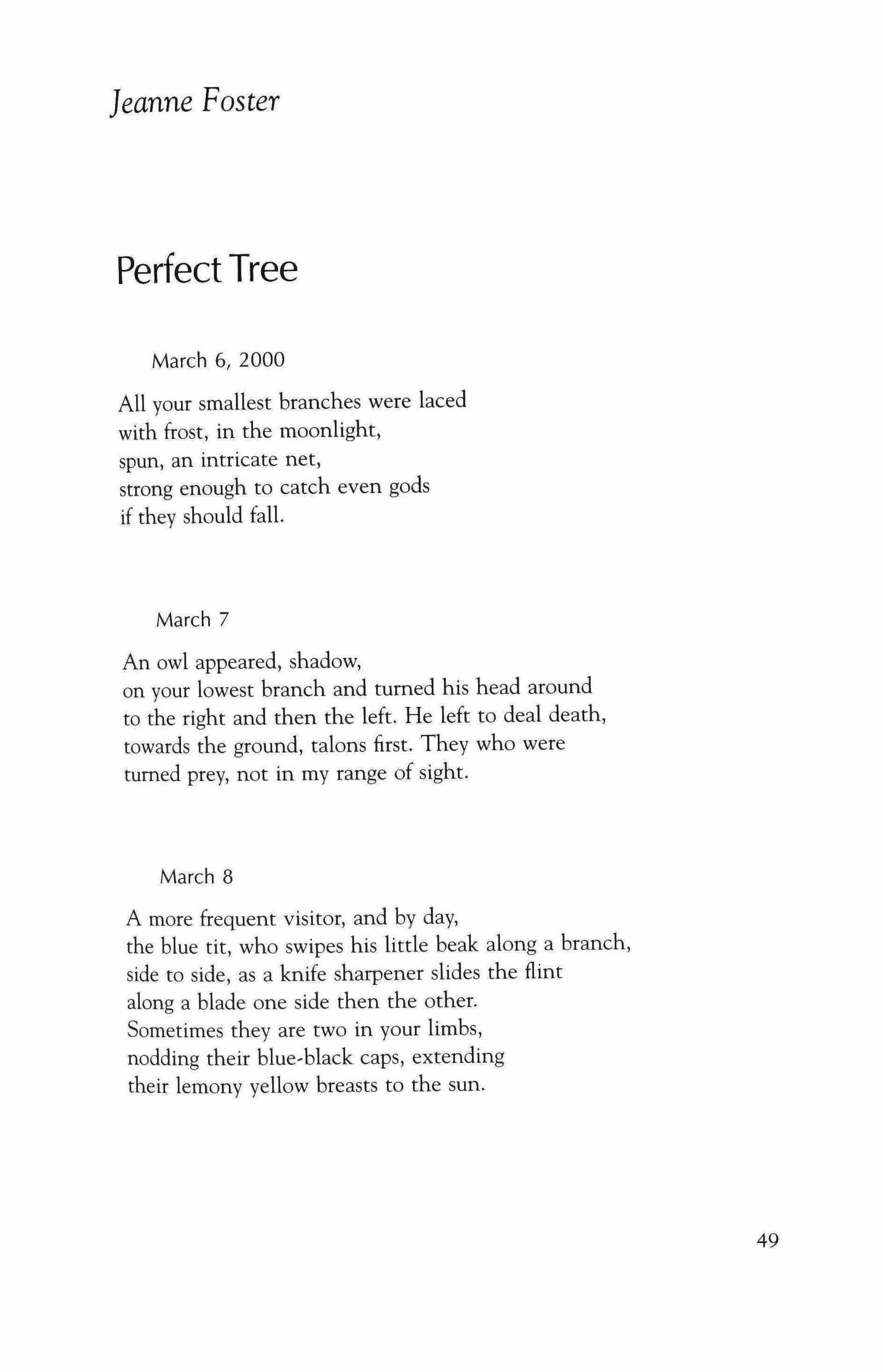
Perfect Tree
March 6, 2000
All your smallest branches were laced with frost, in the moonlight, spun, an intricate net, strong enough to catch even gods if they should fall.
March 7
An owl appeared, shadow, on your lowest branch and turned his head around to the right and then the left. He left to deal death, towards the ground, talons first. They who were turned prey, not in my range of sight.
March 8
A more frequent visitor, and by day, the blue tit, who swipes his little beak along a branch, side to side, as a knife sharpener slides the flint along a blade one side then the other. Sometimes they are two in your limbs, nodding their blue-black caps, extending their lemony yellow breasts to the sun.
49
March 9
In rain, too, you glisten, but are not spun by light; and in wind you are so closely knit that all your branches tremble as a whole down to the smallest twig.
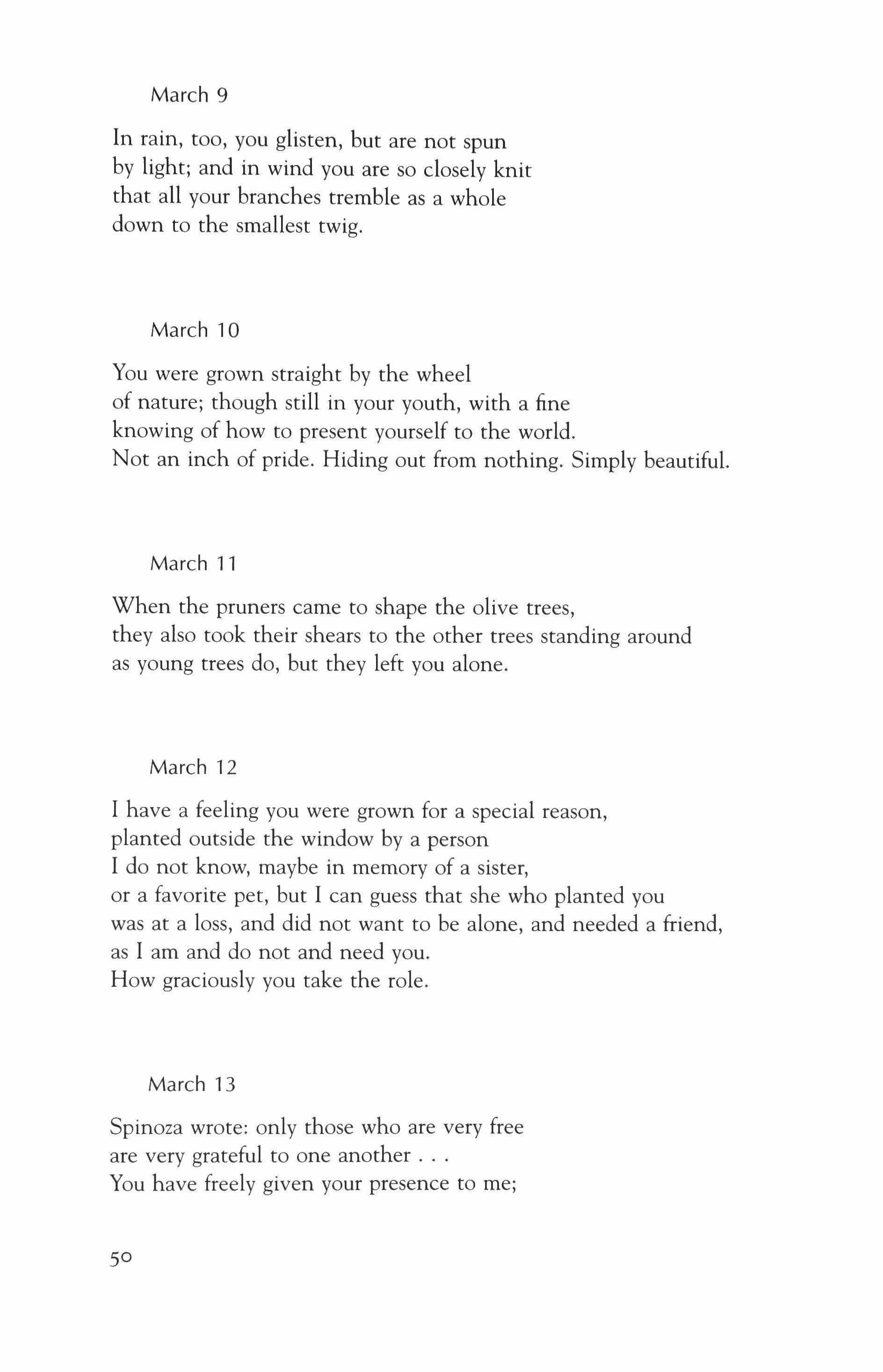
March 10
You were grown straight by the wheel of nature; though still in your youth, with a fine knowing of how to present yourself to the world. Not an inch of pride. Hiding out from nothing. Simply beautiful.
March 11
When the pruners came to shape the olive trees, they also took their shears to the other trees standing around as young trees do, but they left you alone.
March 12
I have a feeling you were grown for a special reason, planted outside the window by a person I do not know, maybe in memory of a sister, or a favorite pet, but I can guess that she who planted you was at a loss, and did not want to be alone, and needed a friend, as I am and do not and need you. How graciously you take the role.
March 13
Spinoza wrote: only those who are very free are very grateful to one another You have freely given your presence to me;
50
and I have given to you my gaze all winter long. Even in the night you glow into the room.
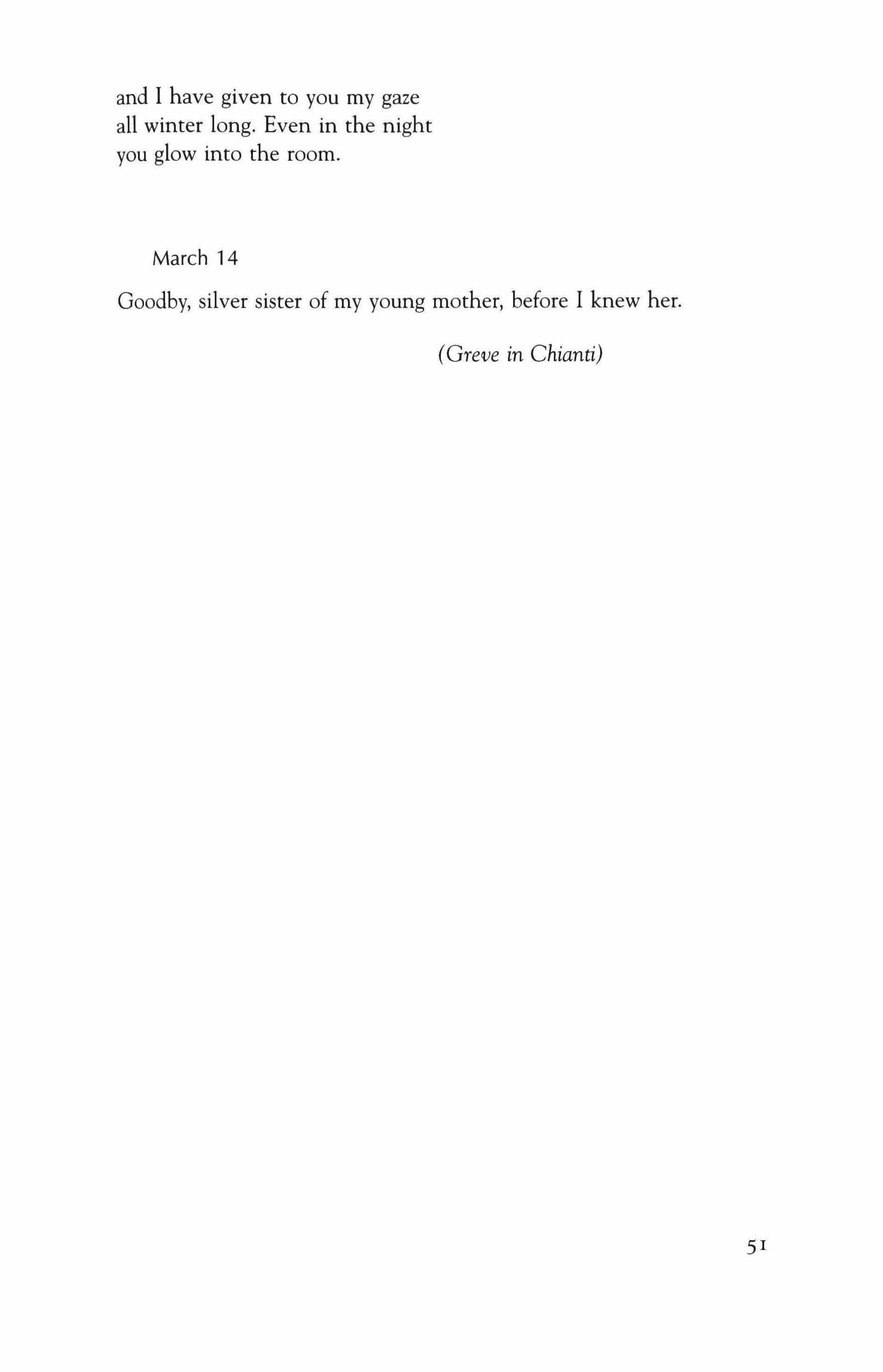
March 14
Goodby, silver sister of my young mother, before I knew her.
(Greve in Chianti)
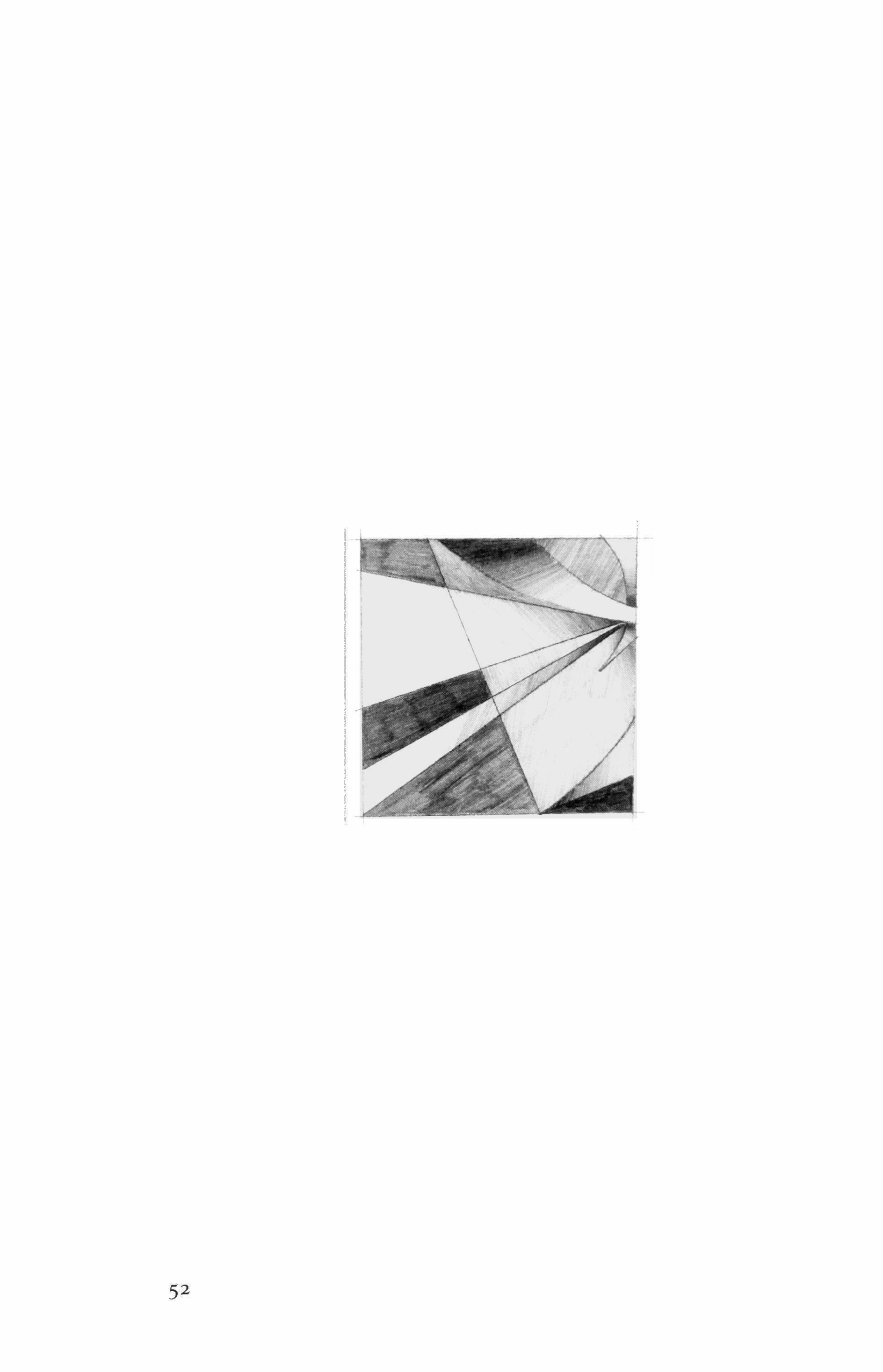
52
David Lehman
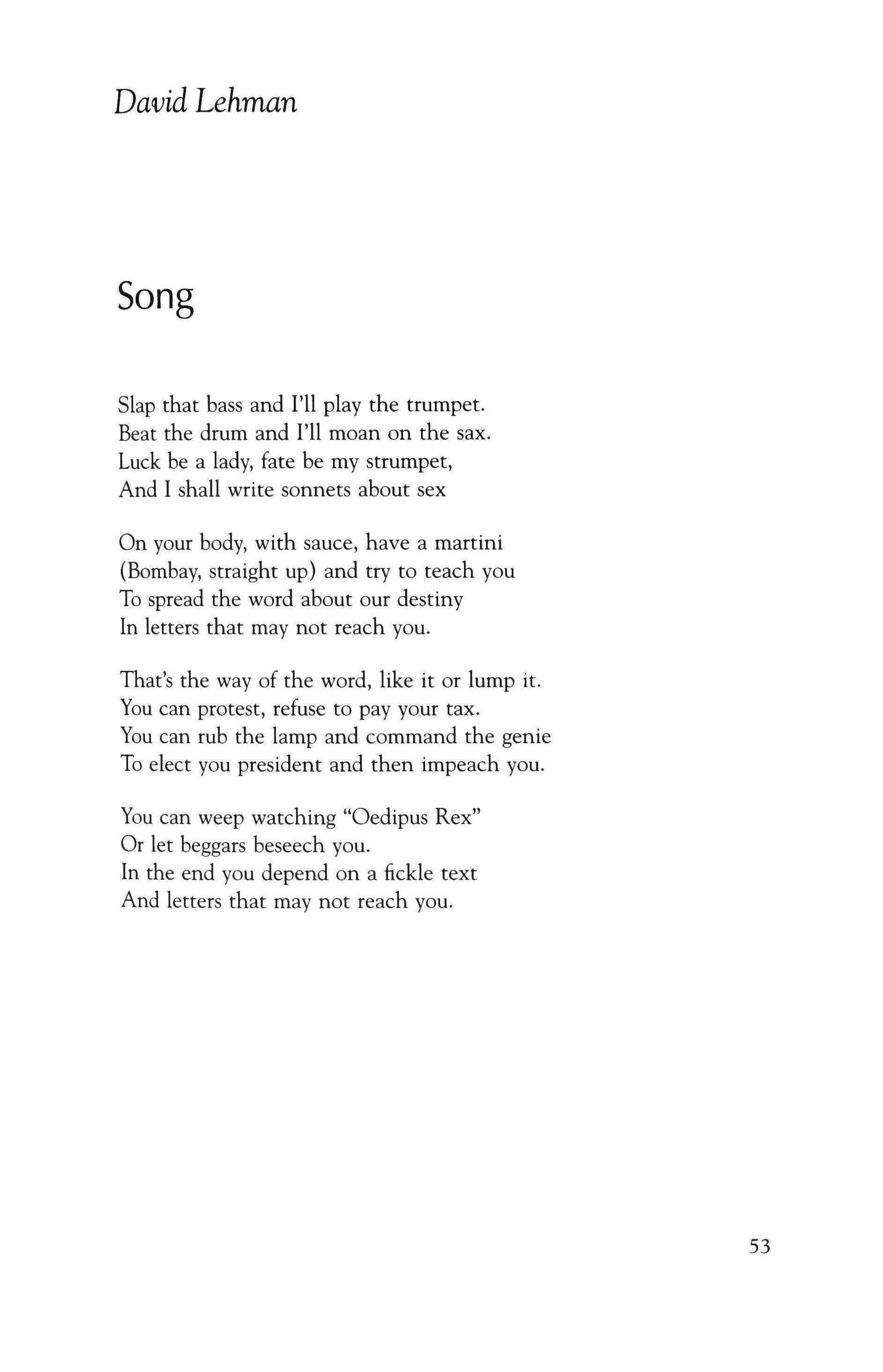
Song
Slap that bass and I'll play the trumpet.
Beat the drum and I'll moan on the sax.
Luck be a lady, fate be my strumpet, And I shall write sonnets about sex
On your body, with sauce, have a martini (Bombay, straight up) and try to teach you
To spread the word about our destiny
In letters that may not reach you.
That's the way of the word, like it or lump it.
You can protest, refuse to pay your tax.
You can rub the lamp and command the genie
To elect you president and then impeach you.
You can weep watching "Oedipus Rex"
Or let beggars beseech you.
In the end you depend on a fickle text And letters that may not reach you.
53
Andrew Feld
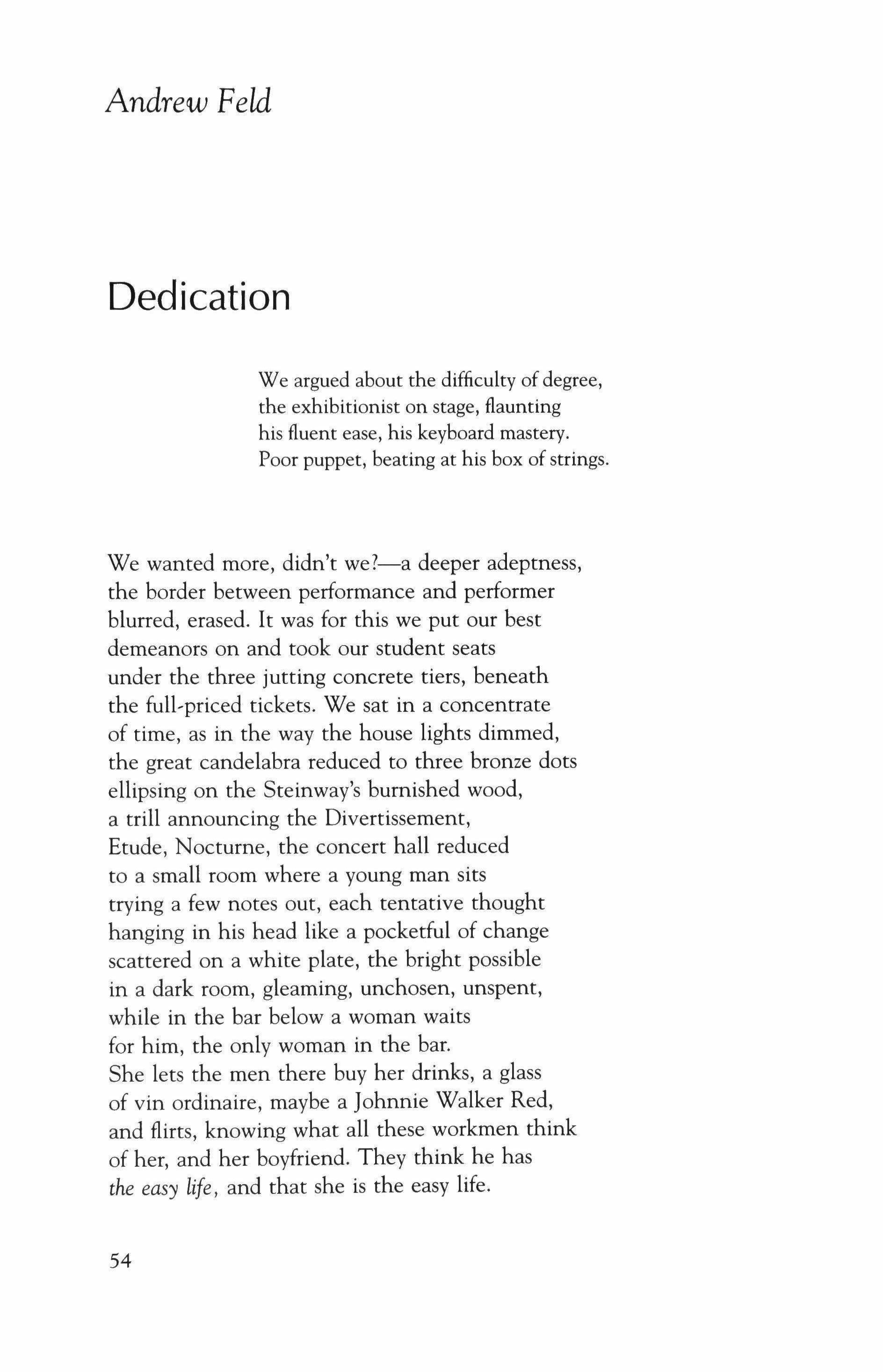
Dedication
We argued about the difficulty of degree, the exhibitionist on stage, flaunting his fluent ease, his keyboard mastery. Poor puppet, beating at his box of strings.
We wanted more, didn't we?-a deeper adeptness, the border between performance and performer blurred, erased. It was for this we put our best demeanors on and took our student seats under the three jutting concrete tiers, beneath the full-priced tickets. We sat in a concentrate of time, as in the way the house lights dimmed, the great candelabra reduced to three bronze dots ellipsing on the Steinway's burnished wood, a trill announcing the Divertissement, Etude, Nocturne, the concert hall reduced to a small room where a young man sits trying a few notes out, each tentative thought hanging in his head like a pocketful of change scattered on a white plate, the bright possible in a dark room, gleaming, unchosen, unspent, while in the bar below a woman waits for him, the only woman in the bar. She lets the men there buy her drinks, a glass of vin ordinaire, maybe a Johnnie Walker Red, and flirts, knowing what all these workmen think of her, and her boyfriend. They think he has the easy life, and that she is the easy life.
54
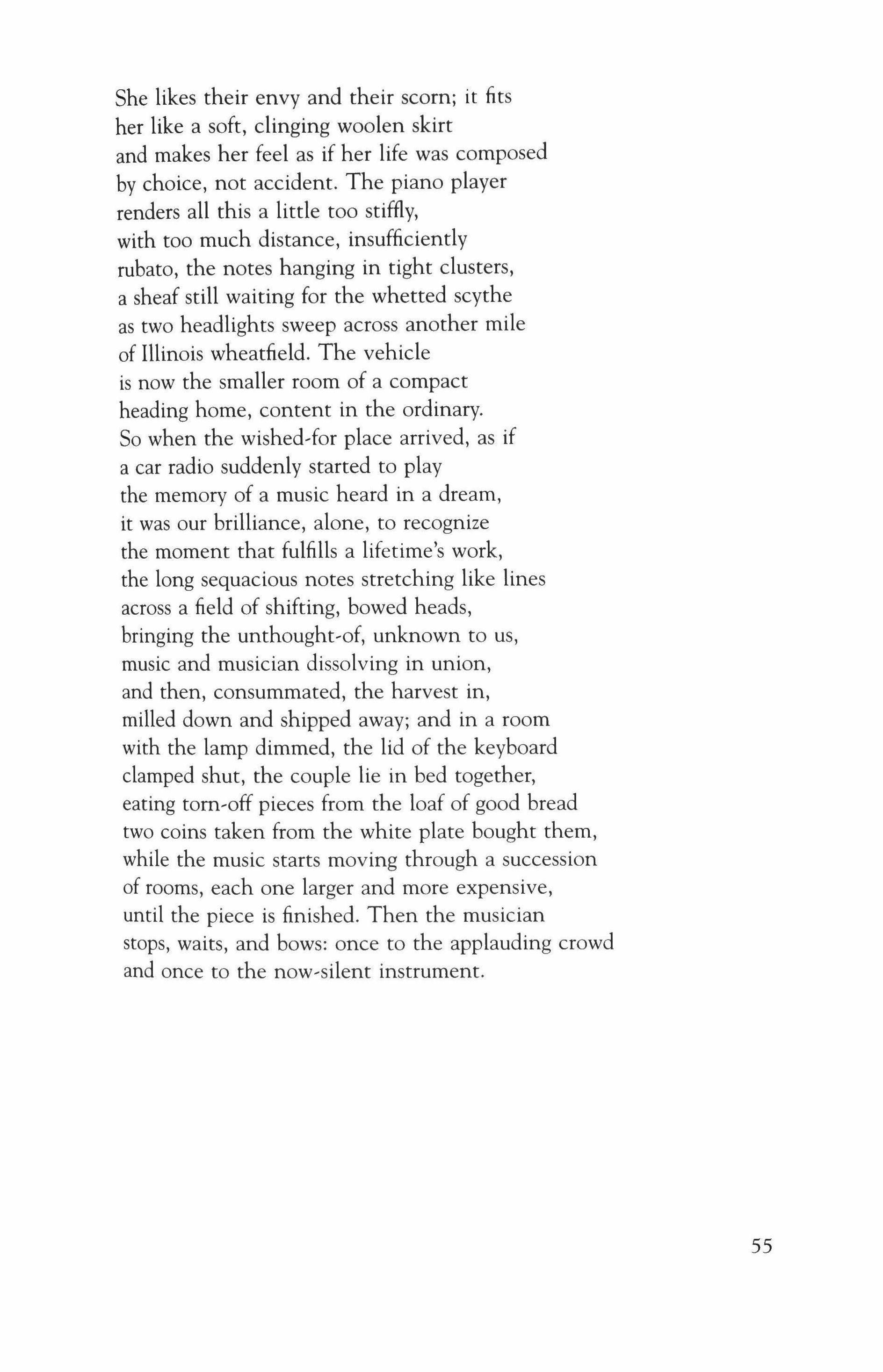
She likes their envy and their scorn; it fits her like a soft, clinging woolen skirt and makes her feel as if her life was composed by choice, not accident. The piano player renders all this a little too stiffly, with too much distance, insufficiently rubato, the notes hanging in tight clusters, a sheaf still waiting for the whetted scythe as two headlights sweep across another mile of Illinois wheatfield. The vehicle is now the smaller room of a compact heading home, content in the ordinary. So when the wished-for place arrived, as if a car radio suddenly started to play the memory of a music heard in a dream, it was our brilliance, alone, to recognize the moment that fulfills a lifetime's work, the long sequacious notes stretching like lines across a field of shifting, bowed heads, bringing the unthought-of, unknown to us, music and musician dissolving in union, and then, consummated, the harvest in, milled down and shipped away; and in a room with the lamp dimmed, the lid of the keyboard clamped shut, the couple lie in bed together, eating torn-off pieces from the loaf of good bread two coins taken from the white plate bought them, while the music starts moving through a succession of rooms, each one larger and more expensive, until the piece is finished. Then the musician stops, waits, and bows: once to the applauding crowd and once to the now-silent instrument.
55
Bob Hicok Fallen
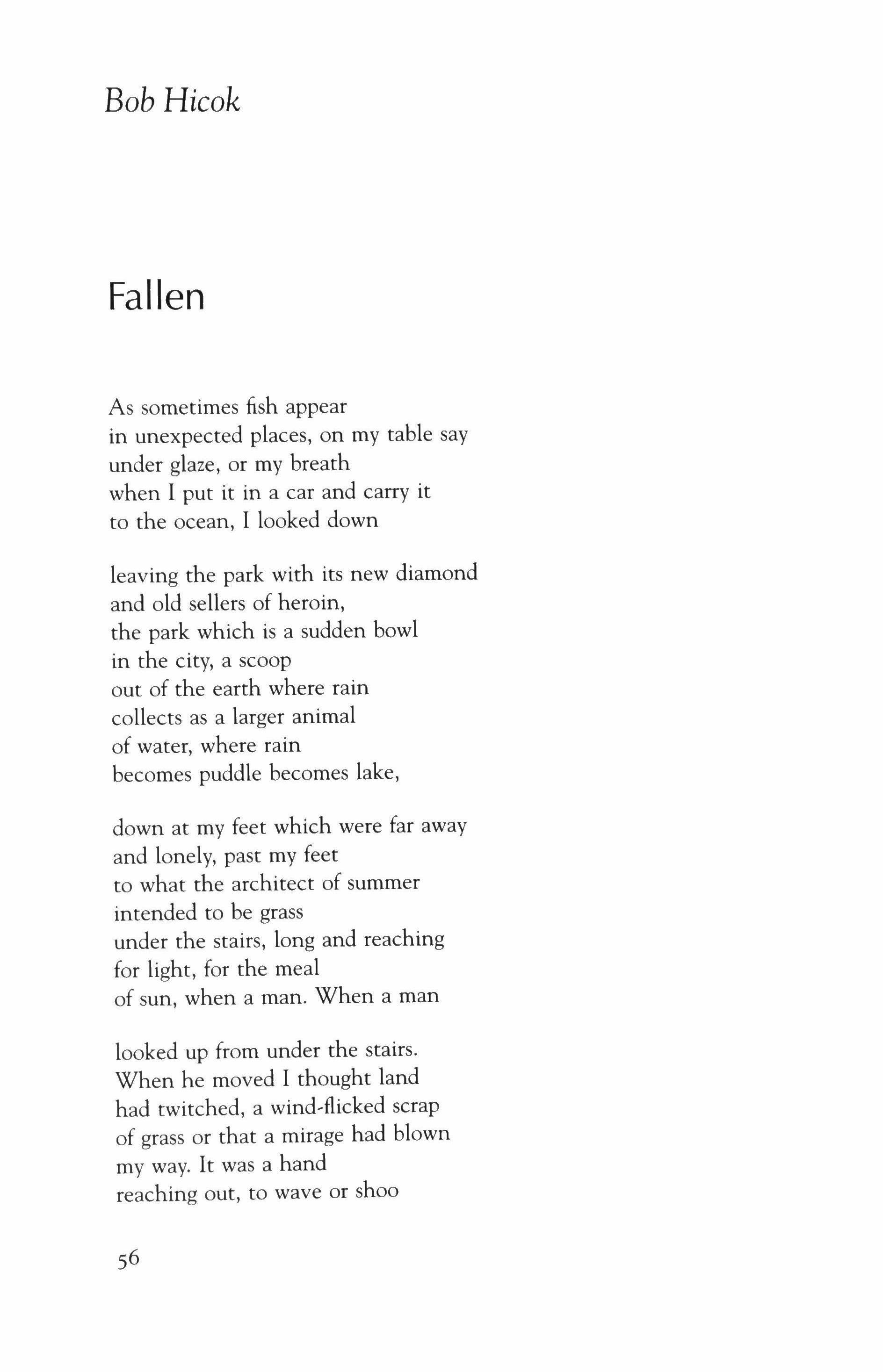
As sometimes fish appear in unexpected places, on my table say under glaze, or my breath when I put it in a car and carry it to the ocean, I looked down
leaving the park with its new diamond and old sellers of heroin, the park which is a sudden bowl in the city, a scoop out of the earth where rain collects as a larger animal of water, where rain becomes puddle becomes lake,
down at my feet which were far away and lonely, past my feet to what the architect of summer intended to be grass under the stairs, long and reaching for light, for the meal of sun, when a man. When a man
looked up from under the stairs. When he moved I thought land had twitched, a wind-flicked scrap of grass or that a mirage had blown my way. It was a hand reaching out, to wave or shoo
56
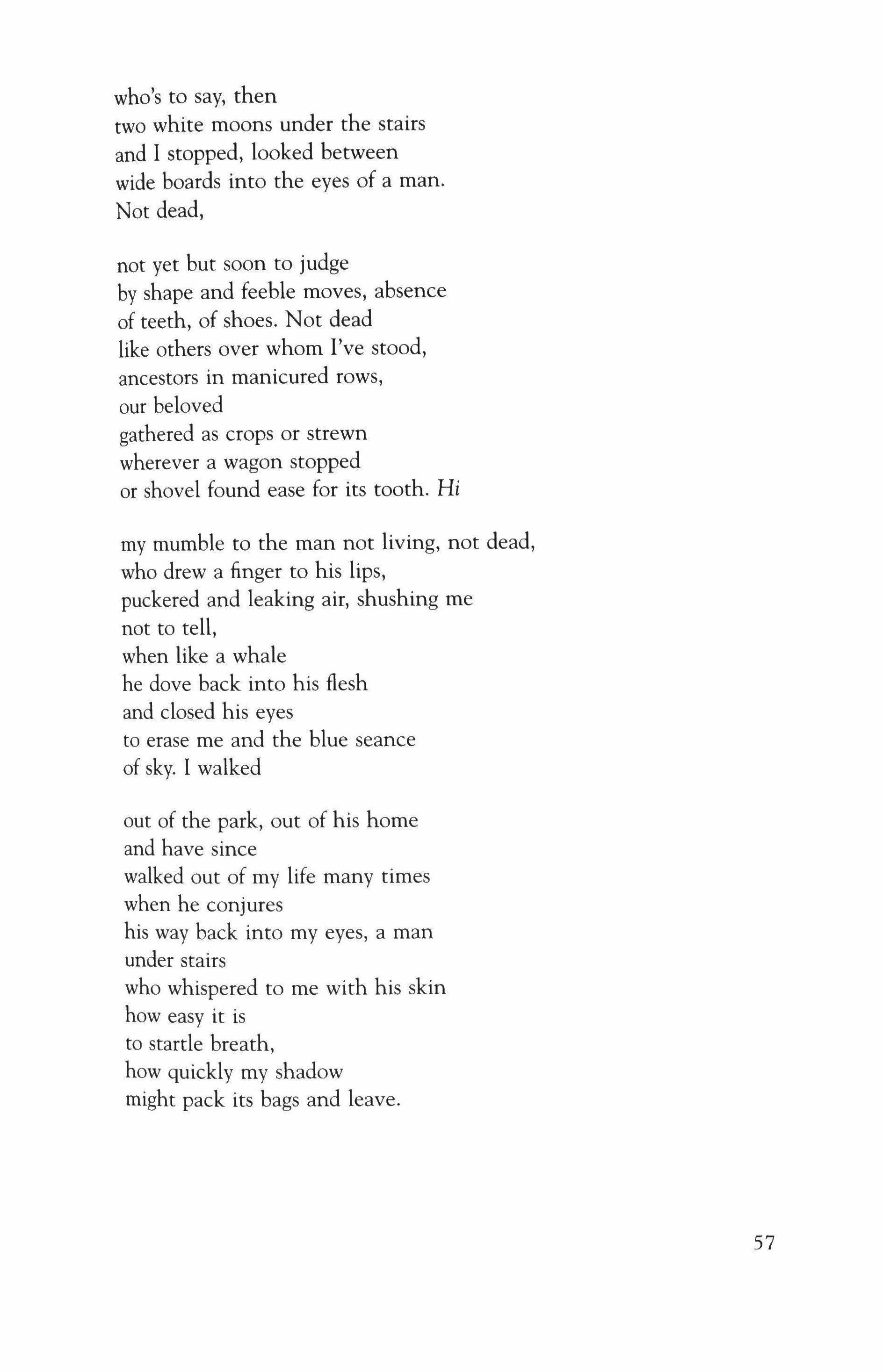
who's to say, then two white moons under the stairs and I stopped, looked between wide boards into the eyes of a man. Not dead,
not yet but soon to judge by shape and feeble moves, absence of teeth, of shoes. Nat dead like others over whom I've stood, ancestors in manicured rows, our beloved gathered as crops or strewn wherever a wagon stopped or shovel found ease for its tooth. Hi
my mumble to the man not living, not dead, who drew a finger to his lips, puckered and leaking air, shushing me not to tell, when like a whale he dove back into his flesh and closed his eyes to erase me and the blue seance of sky. I walked
out of the park, out of his home and have since walked out of my life many times when he conjures his way back into my eyes, a man under stairs who whispered to me with his skin how easy it is to startle breath, how quickly my shadow might pack its bags and leave.
57
Daneen Wardrop
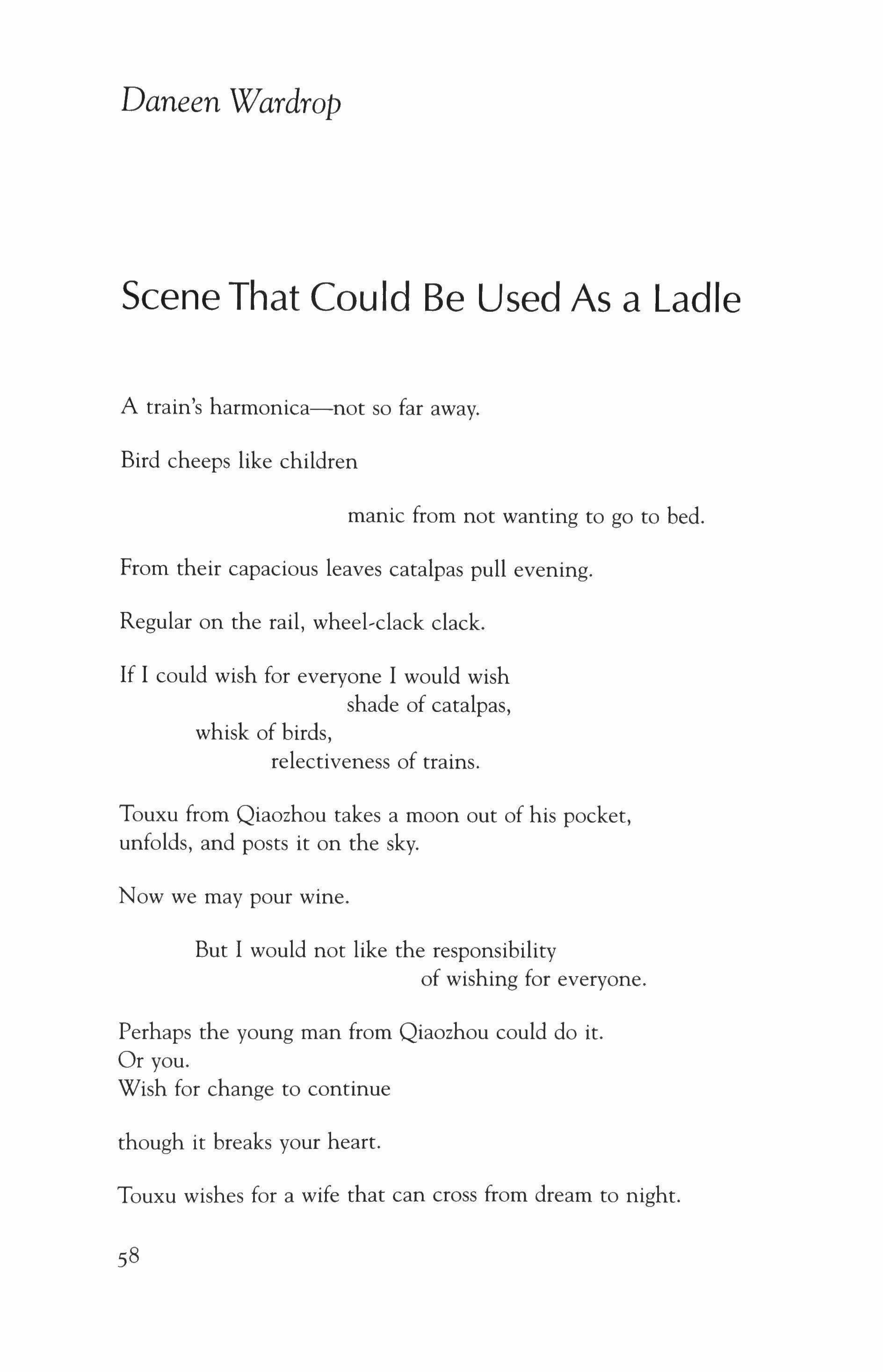
Scene That Could Be Used As a Ladle
A train's harmonica-not so far away.
Bird cheeps like children
manic from not wanting to go to bed.
From their capacious leaves catalpas pull evening.
Regular on the rail, wheel-clack clack.
If I could wish for everyone I would wish shade of catalpas, whisk of birds, relectiveness of trains.
Touxu from Qiaozhou takes a moon out of his pocket, unfolds, and posts it on the sky.
Now we may pour wine.
But I would not like the responsibility of wishing for everyone.
Perhaps the young man from Qiaozhou could do it. Or you.
Wish for change to continue though it breaks your heart.
Touxu wishes for a wife that can cross from dream to night.
58
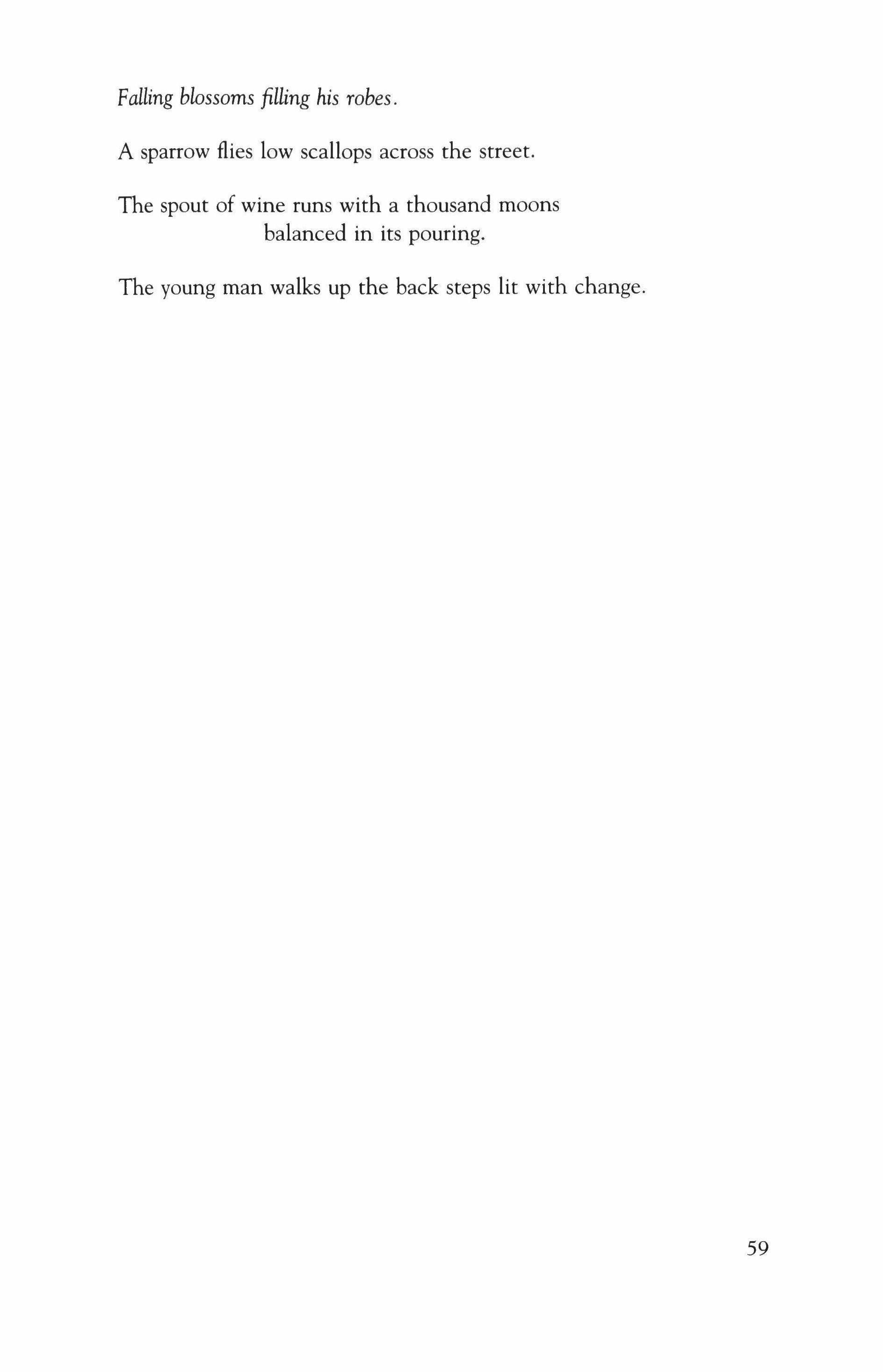
Falling blossoms filling his robes.
A sparrow flies low scallops across the street.
The spout of wine runs with a thousand moons balanced in its pouring.
The young man walks up the back steps lit with change.
59
Late-scape
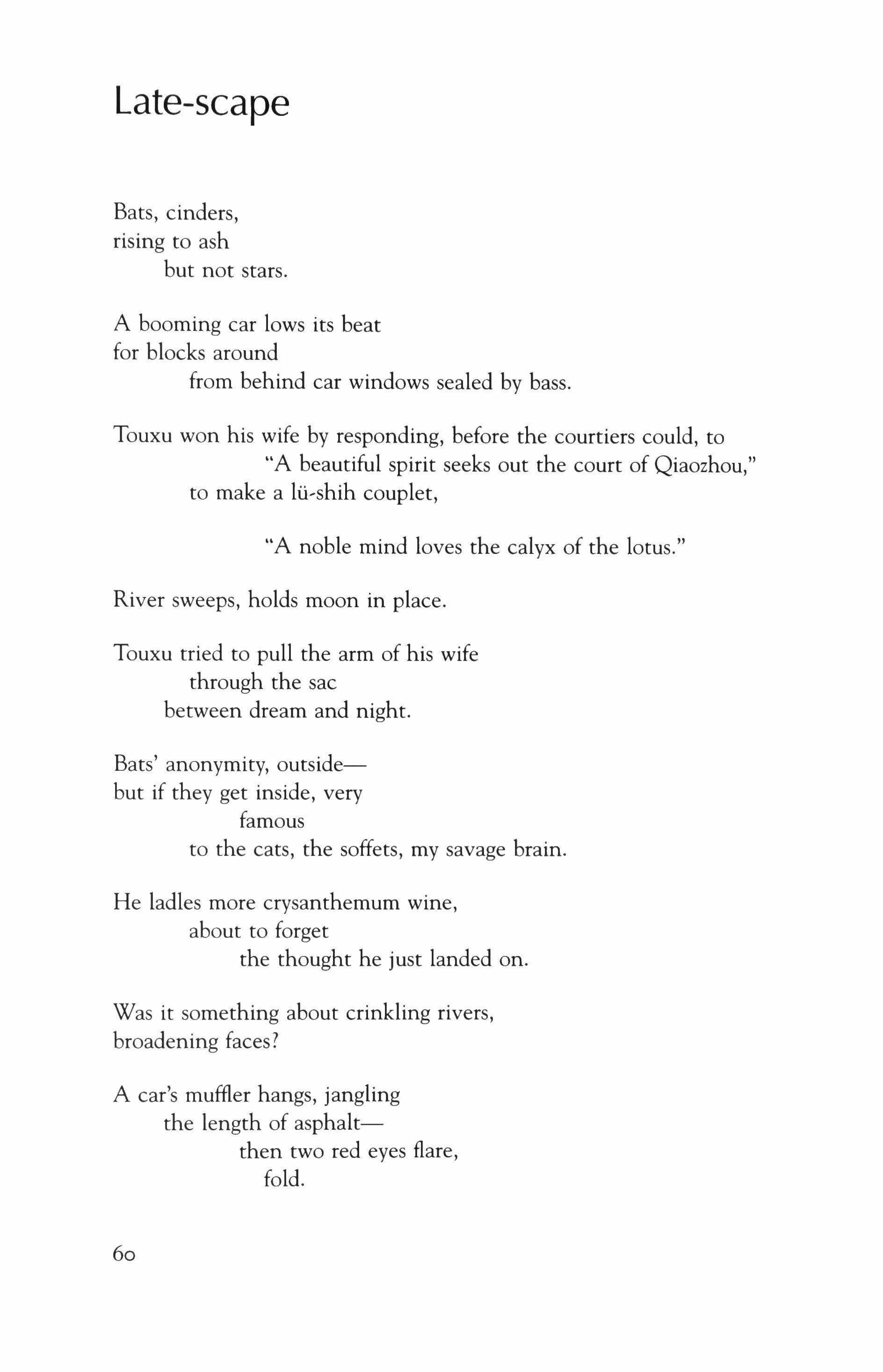
Bats, cinders, rising to ash but not stars.
A booming car lows its beat for blocks around from behind car windows sealed by bass.
Touxu won his wife by responding, before the courtiers could, to "A beautiful spirit seeks out the court of Qiaozhou," to make a lu-shih couplet, "A noble mind loves the calyx of the lotus."
River sweeps, holds moon in place.
Touxu tried to pull the arm of his wife through the sac between dream and night.
Bats' anonymity, outsidebut if they get inside, very famous to the cats, the soffets, my savage brain.
He ladles more crysanthemum wine, about to forget the thought he just landed on.
Was it something about crinkling rivers, broadening faces?
A car's muffler hangs, jangling the length of asphaltthen two red eyes flare, fold.
60
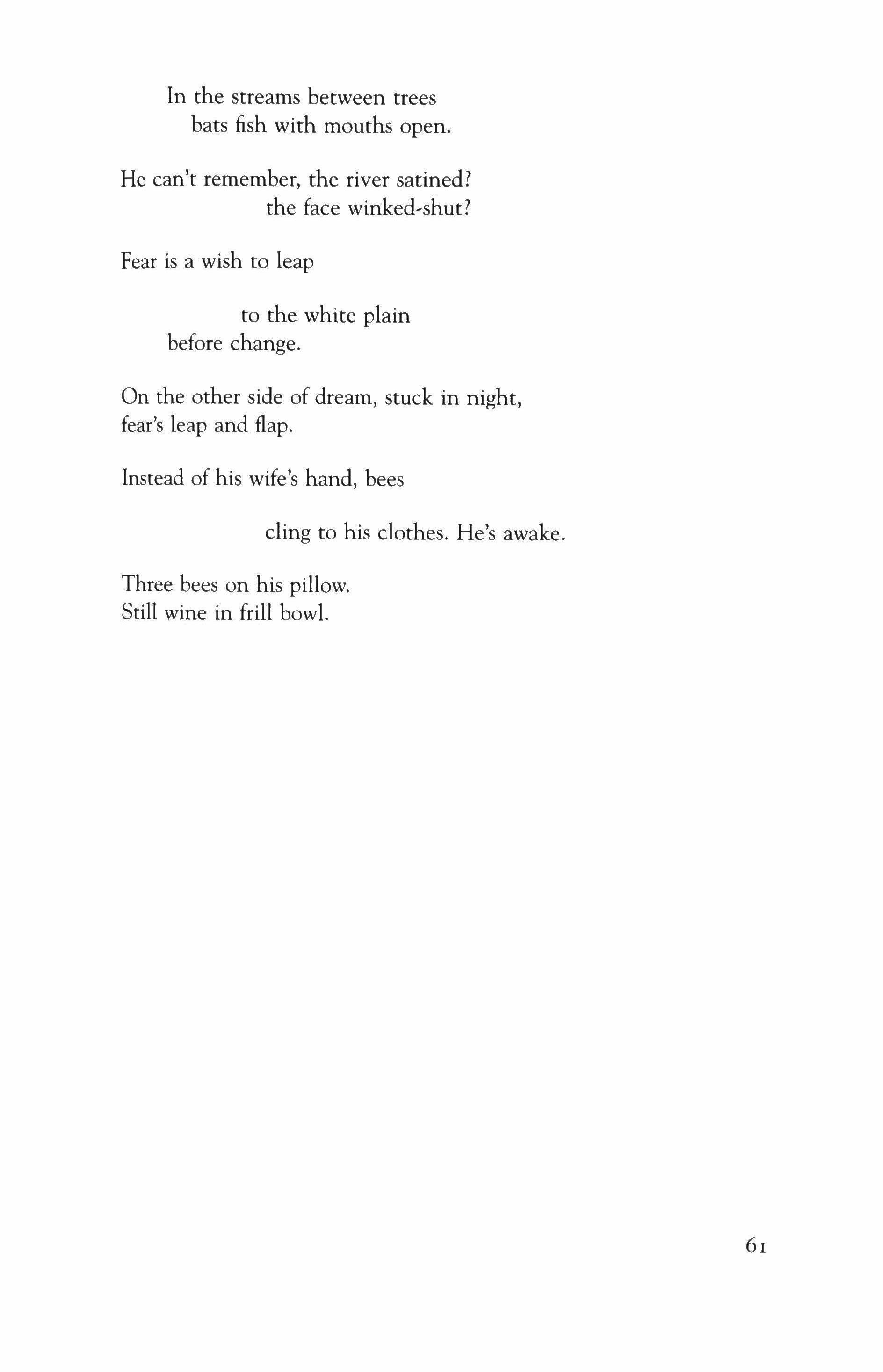
In the streams between trees bats fish with mouths open.
He can't remember, the river satined? the face winked-shut?
Fear is a wish to leap to the white plain before change.
On the other side of dream, stuck in night, fear's leap and flap.
Instead of his wife's hand, bees cling to his clothes. He's awake.
Three bees on his pillow. Still wine in frill bowl.
Scene of Wandering and Scraps
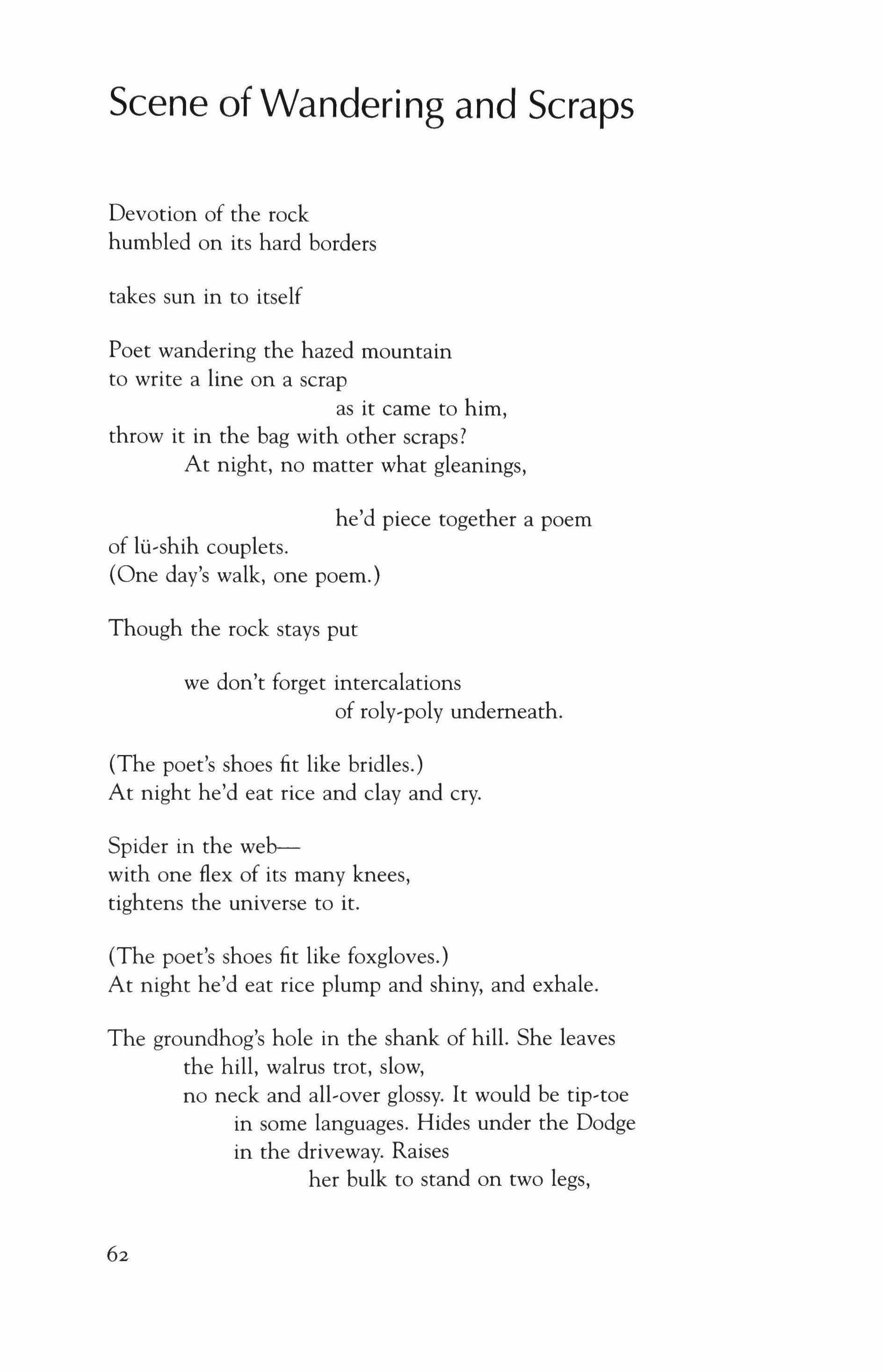
Devotion of the rock humbled on its hard borders takes sun in to itself
Poet wandering the hazed mountain to write a line on a scrap as it came to him, throw it in the bag with other scraps?
At night, no matter what gleanings, he'd piece together a poem of lu-shih couplets.
(One day's walk, one poem.)
Though the rock stays put we don't forget intercalations of rely-poly underneath.
(The poet's shoes fit like bridles.)
At night he'd eat rice and clay and cry.
Spider in the webwith one flex of its many knees, tightens the universe to it.
(The poet's shoes fit like foxgloves.)
At night he'd eat rice plump and shiny, and exhale.
The groundhog's hole in the shank of hill. She leaves the hill, walrus trot, slow, no neck and all-over glossy. It would be tip-toe in some languages. Hides under the Dodge in the driveway. Raises her bulk to stand on two legs,
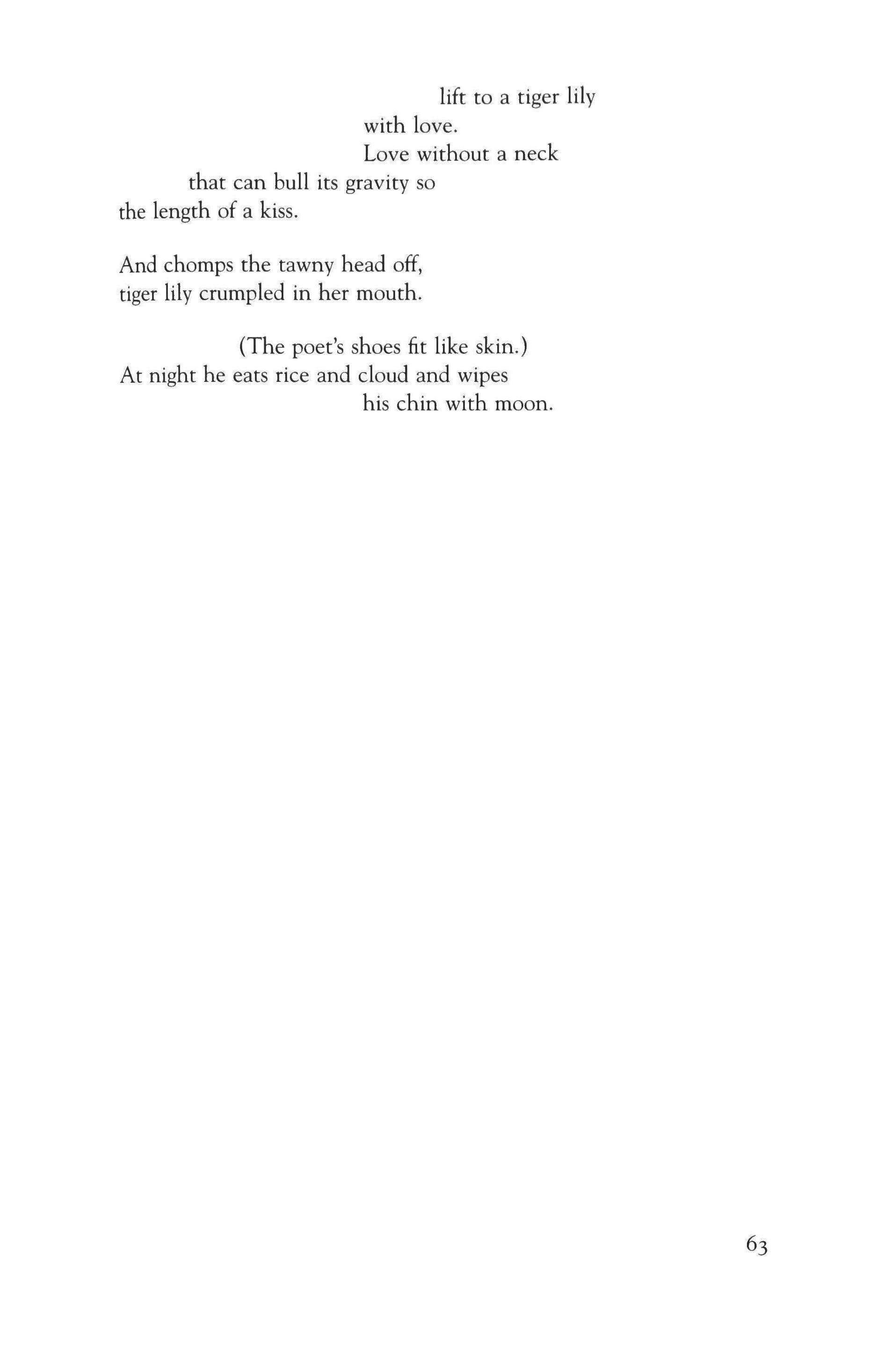
lift to a tiger lily with love.
Love without a neck that can bull its gravity so the length of a kiss.
And chomps the tawny head off, tiger lily crumpled in her mouth.
(The poet's shoes fit like skin.) At night he eats rice and cloud and wipes his chin with moon.
Joshua Weiner
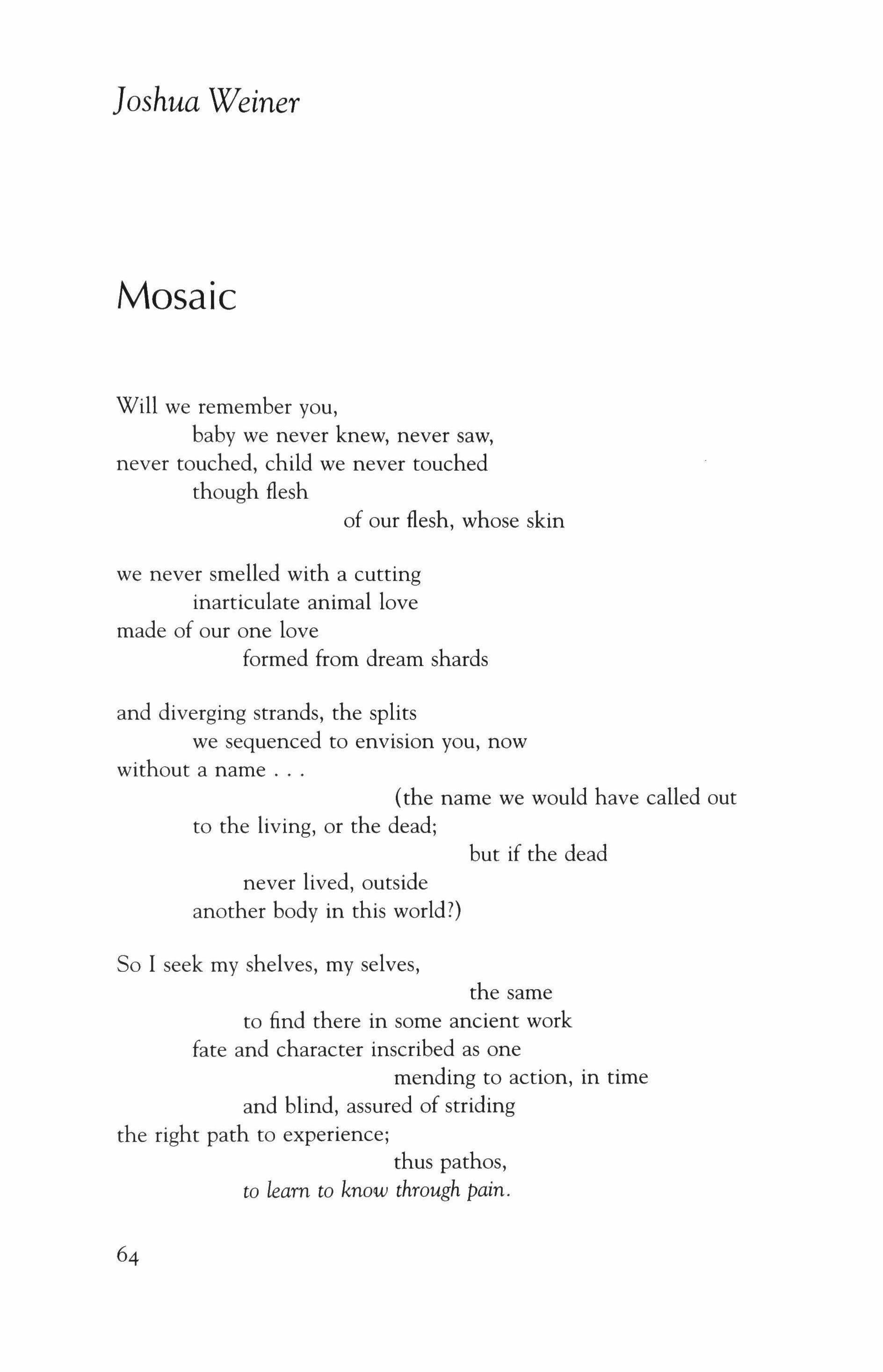
Mosaic
Will we remember you, baby we never knew, never saw, never touched, child we never touched though flesh of our flesh, whose skin we never smelled with a cutting inarticulate animal love made of our one love formed from dream shards and diverging strands, the splits we sequenced to envision you, now without a name (the name we would have called out to the living, or the dead; but if the dead never lived, outside another body in this world?)
So I seek my shelves, my selves, the same to find there in some ancient work fate and character inscribed as one mending to action, in time and blind, assured of striding the right path to experience; thus pathos, to learn to know through pain.
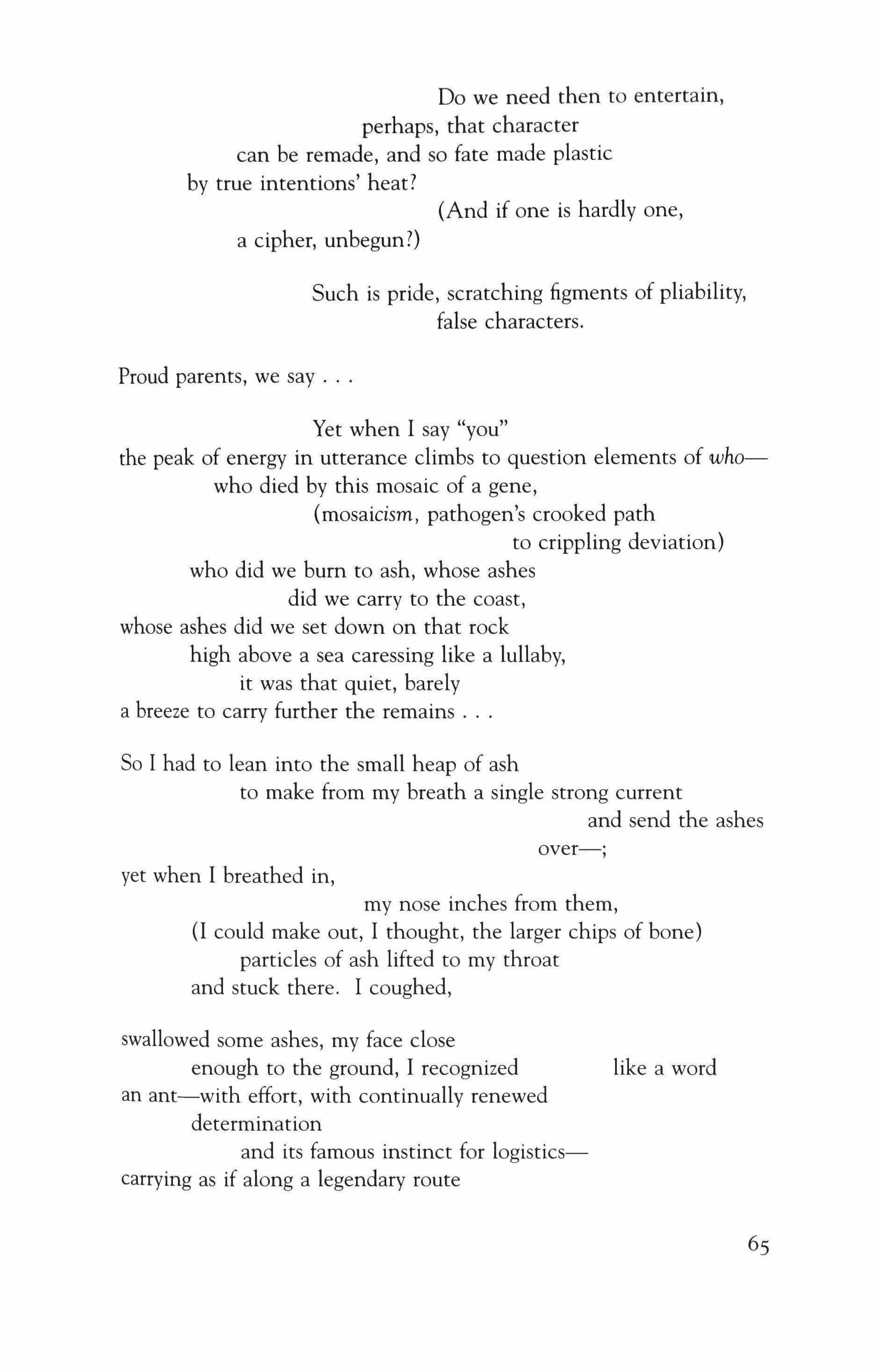
Do we need then to entertain, perhaps, that character can be remade, and so fate made plastic by true intentions' heat?
(And if one is hardly one, a cipher, unbegun?)
Such is pride, scratching figments of pliability, false characters.
Proud parents, we say
Yet when I say "you" the peak of energy in utterance climbs to question elements of whowho died by this mosaic of a gene, (mosaicism, pathogen's crooked path to crippling deviation) who did we bum to ash, whose ashes did we carry to the coast, whose ashes did we set down on that rock high above a sea caressing like a lullaby, it was that quiet, barely a breeze to carry further the remains
So I had to lean into the small heap of ash to make from my breath a single strong current and send the ashes over-; yet when I breathed in, my nose inches from them, (I could make out, I thought, the larger chips of bone) particles of ash lifted to my throat and stuck there. I coughed, swallowed some ashes, my face close enough to the ground, I recognized like a word an ant-with effort, with continually renewed determination and its famous instinct for logisticscarrying as if along a legendary route
65
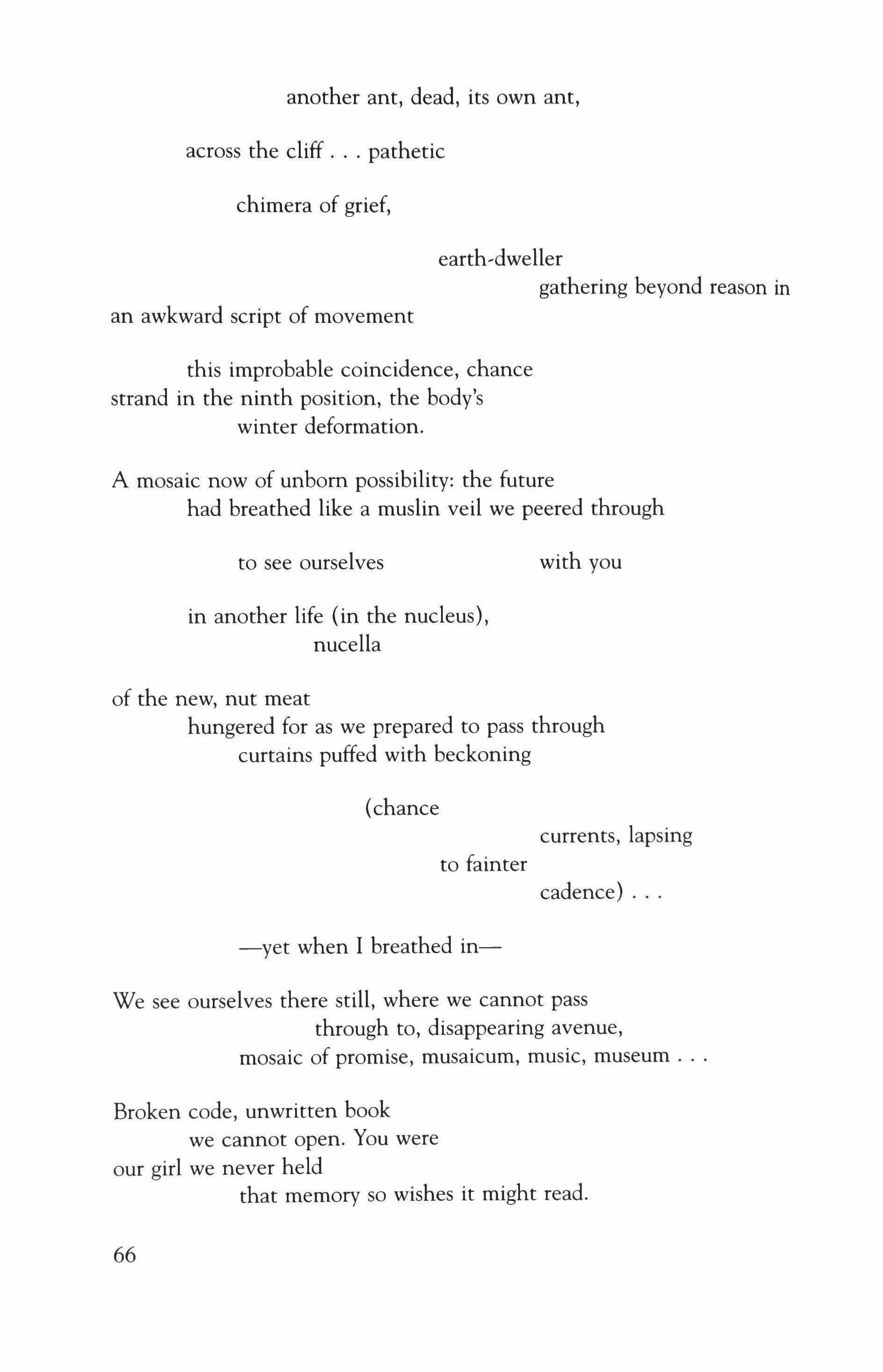
another ant, dead, its own ant, across the cliff pathetic chimera of grief, earth-dweller gathering beyond reason in an awkward script of movement this improbable coincidence, chance strand in the ninth position, the body's winter deformation.
A mosaic now of unborn possibility: the future had breathed like a muslin veil we peered through to see ourselves with you in another life (in the nucleus), nucella
of the new, nut meat hungered for as we prepared to pass through curtains puffed with beckoning (chance currents, lapsing to fainter cadence)
-yet when I breathed in-
We see ourselves there still, where we cannot pass through to, disappearing avenue, mosaic of promise, musaicum, music, museum
Broken code, unwritten book we cannot open. You were our girl we never held that memory so wishes it might read.
66
Kevin Stein
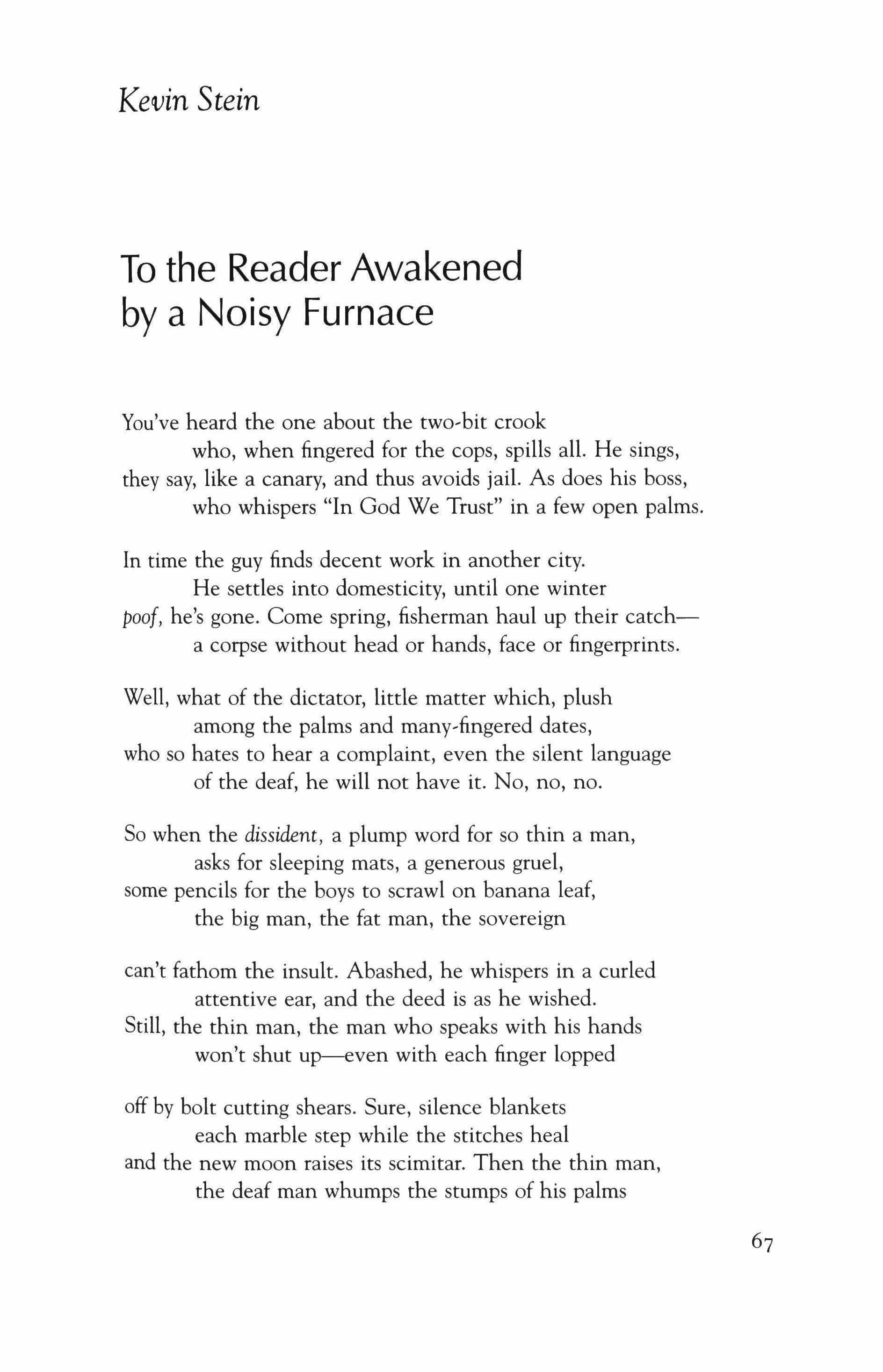
To the Reader Awakened by a Noisy Furnace
You've heard the one about the two-bit crook who, when fingered for the cops, spills all. He sings, they say, like a canary, and thus avoids jail. As does his boss, who whispers "In God We Trust" in a few open palms.
In time the guy finds decent work in another city. He settles into domesticity, until one winter poof, he's gone. Come spring, fisherman haul up their catcha corpse without head or hands, face or fingerprints.
Well, what of the dictator, little matter which, plush among the palms and many-fingered dates, who so hates to hear a complaint, even the silent language of the deaf, he will not have it. No, no, no.
So when the dissident, a plump word for so thin a man, asks for sleeping mats, a generous gruel, some pencils for the boys to scrawl on banana leaf, the big man, the fat man, the sovereign
can't fathom the insult. Abashed, he whispers in a curled attentive ear, and the deed is as he wished. Still, the thin man, the man who speaks with his hands won't shut up-even with each finger lopped off by bolt cutting shears. Sure, silence blankets each marble step while the stitches heal and the new moon raises its scimitar. Then the thin man, the deaf man whumps the stumps of his palms
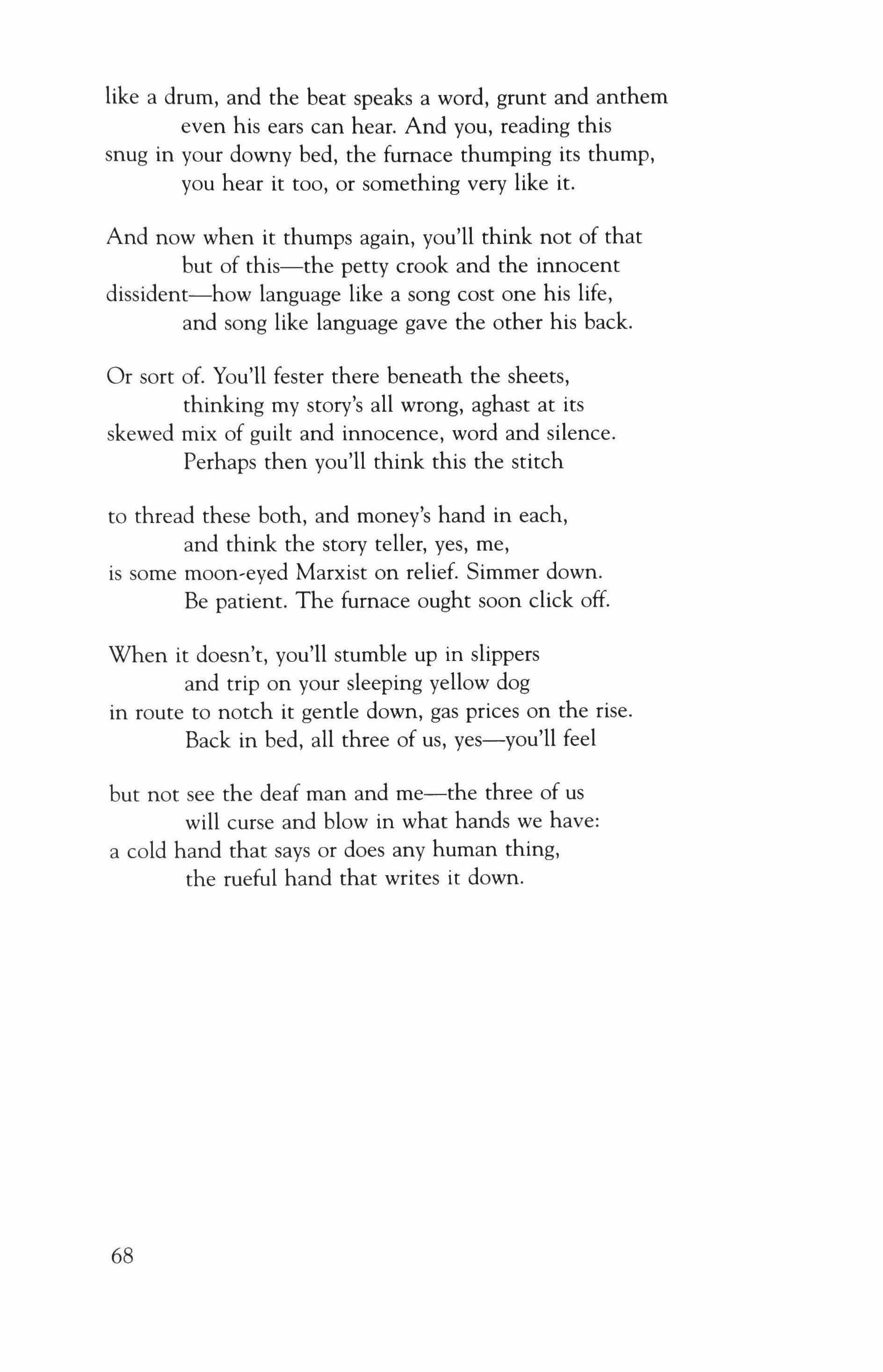
like a drum, and the beat speaks a word, grunt and anthem even his ears can hear. And you, reading this snug in your downy bed, the furnace thumping its thump, you hear it too, or something very like it.
And now when it thumps again, you'll think not of that but of this-the petty crook and the innocent dissident-how language like a song cost one his life, and song like language gave the other his back.
Or sort of. You'll fester there beneath the sheets, thinking my story's all wrong, aghast at its skewed mix of guilt and innocence, word and silence. Perhaps then you'll think this the stitch
to thread these both, and money's hand in each, and think the story teller, yes, me, is some moon-eyed Marxist on relief. Simmer down. Be patient. The furnace ought soon click off.
When it doesn't, you'll stumble up in slippers and trip on your sleeping yellow dog in route to notch it gentle down, gas prices on the rise. Back in bed, all three of us, yes-you'll feel
but not see the deaf man and me-the three of us will curse and blow in what hands we have: a cold hand that says or does any human thing, the rueful hand that writes it down.
68
Reintroductions
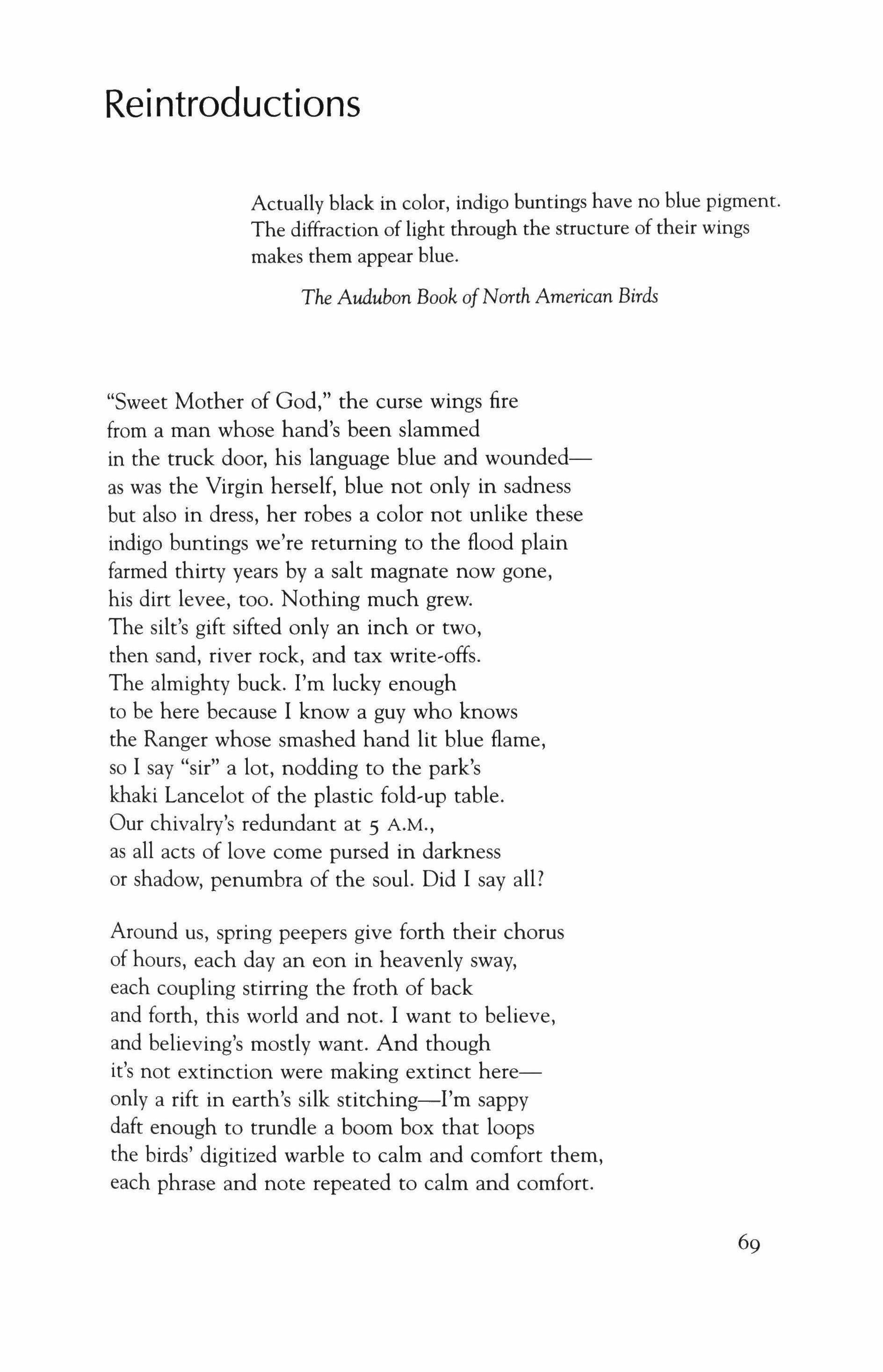
Actually black in color, indigo buntings have no blue pigment. The diffraction of light through the structure of their wings makes them appear blue.
The Audubon Book ofNorth American Birds
"Sweet Mother of God," the curse wings fire from a man whose hand's been slammed in the truck door, his language blue and woundedas was the Virgin herself, blue not only in sadness but also in dress, her robes a color not unlike these indigo buntings we're returning to the flood plain farmed thirty years by a salt magnate now gone, his dirt levee, too. Nothing much grew. The silt's gift sifted only an inch or two, then sand, river rock, and tax write-offs. The almighty buck. I'm lucky enough to be here because I know a guy who knows the Ranger whose smashed hand lit blue flame, so I say "sir" a lot, nodding to the park's khaki Lancelot of the plastic fold-up table. Our chivalry's redundant at 5 A.M., as all acts of love come pursed in darkness or shadow, penumbra of the soul. Did I say all?
Around us, spring peepers give forth their chorus of hours, each day an eon in heavenly sway, each coupling stirring the froth of back and forth, this world and not. I want to believe, and believing's mostly want. And though it's not extinction were making extinct hereonly a rift in earth's silk stitching-I'm sappy daft enough to trundle a boom box that loops the birds' digitized warble to calm and comfort them, each phrase and note repeated to calm and comfort.
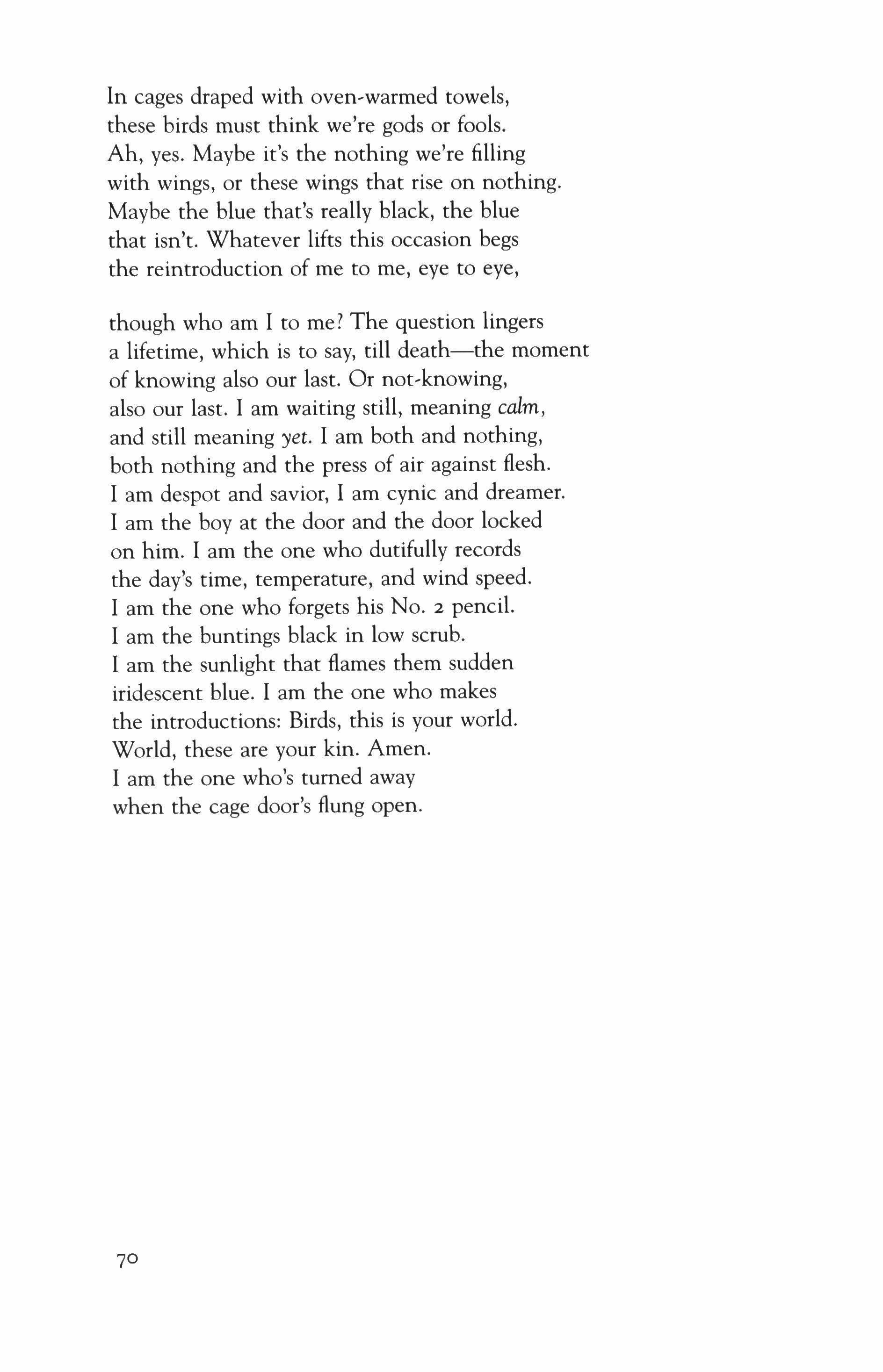
In cages draped with oven-warmed towels, these birds must think we're gods or fools. Ah, yes. Maybe it's the nothing we're filling with wings, or these wings that rise on nothing. Maybe the blue that's really black, the blue that isn't. Whatever lifts this occasion begs the reintroduction of me to me, eye to eye,
though who am I to me? The question lingers a lifetime, which is to say, till death-the moment of knowing also our last. Or not-knowing, also our last. I am waiting still, meaning calm, and still meaning yet. I am both and nothing, both nothing and the press of air against flesh.
I am despot and savior, I am cynic and dreamer. I am the boy at the door and the door locked on him. I am the one who dutifully records the day's time, temperature, and wind speed. I am the one who forgets his NO.2 pencil.
I am the buntings black in low scrub.
I am the sunlight that flames them sudden iridescent blue. I am the one who makes the introductions: Birds, this is your world. World, these are your kin. Amen. I am the one who's turned away when the cage door's flung open.
Bruce Smith
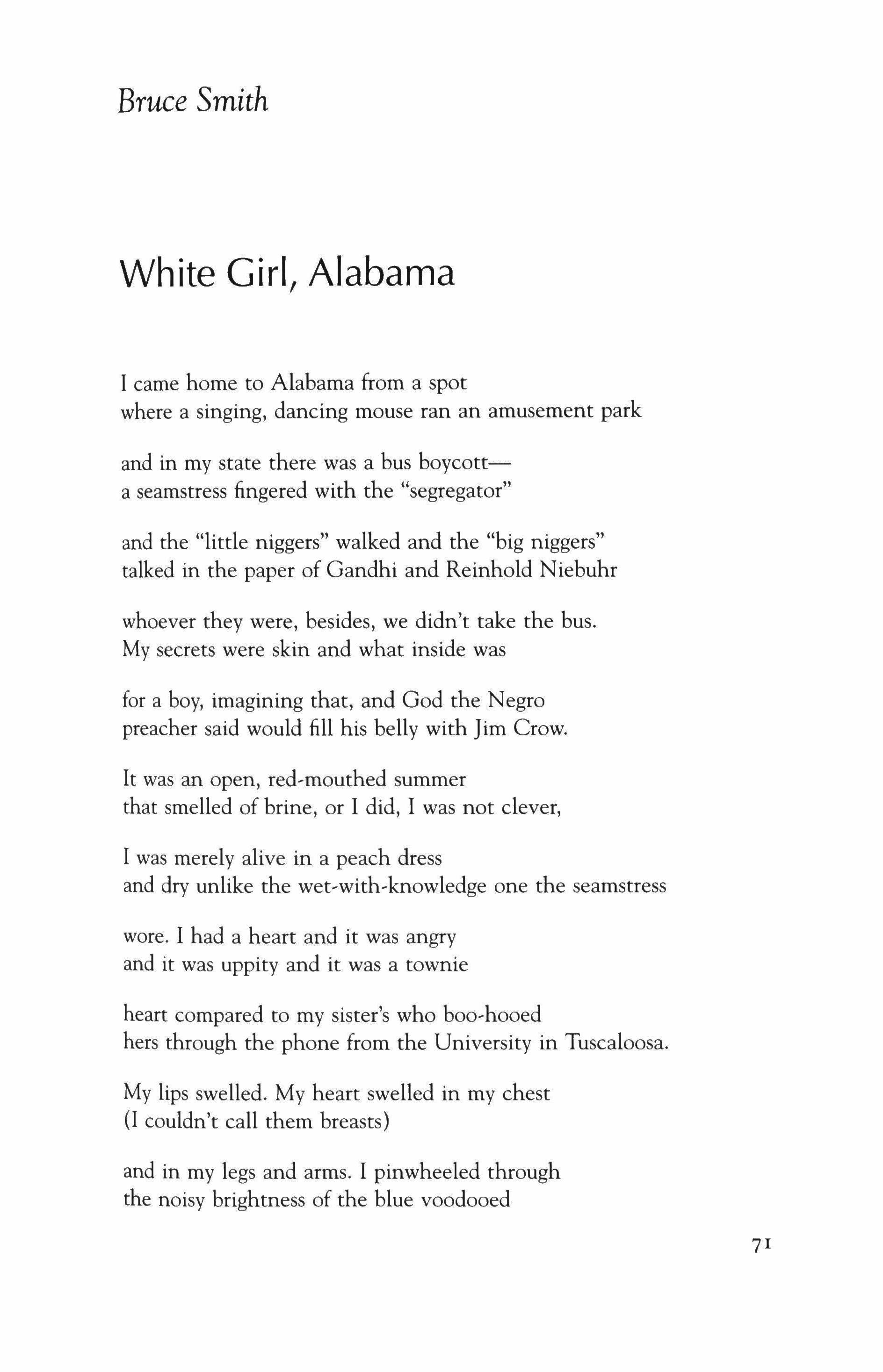
White Girl, Alabama
I came home to Alabama from a spot where a singing, dancing mouse ran an amusement park and in my state there was a bus boycotta seamstress fingered with the "segregator" and the "little niggers" walked and the "big niggers" talked in the paper of Gandhi and Reinhold Niebuhr whoever they were, besides, we didn't take the bus. My secrets were skin and what inside was for a boy, imagining that, and God the Negro preacher said would fill his belly with Jim Crow.
It was an open, red,mouthed summer that smelled of brine, or I did, I was not clever,
I was merely alive in a peach dress and dry unlike the wet-with-knowledge one the seamstress wore. I had a heart and it was angry and it was uppity and it was a townie heart compared to my sister's who boo-hooed hers through the phone from the University in Tuscaloosa.
My lips swelled. My heart swelled in my chest (I couldn't call them breasts) and in my legs and arms. I pinwheeled through the noisy brightness of the blue voodooed
71
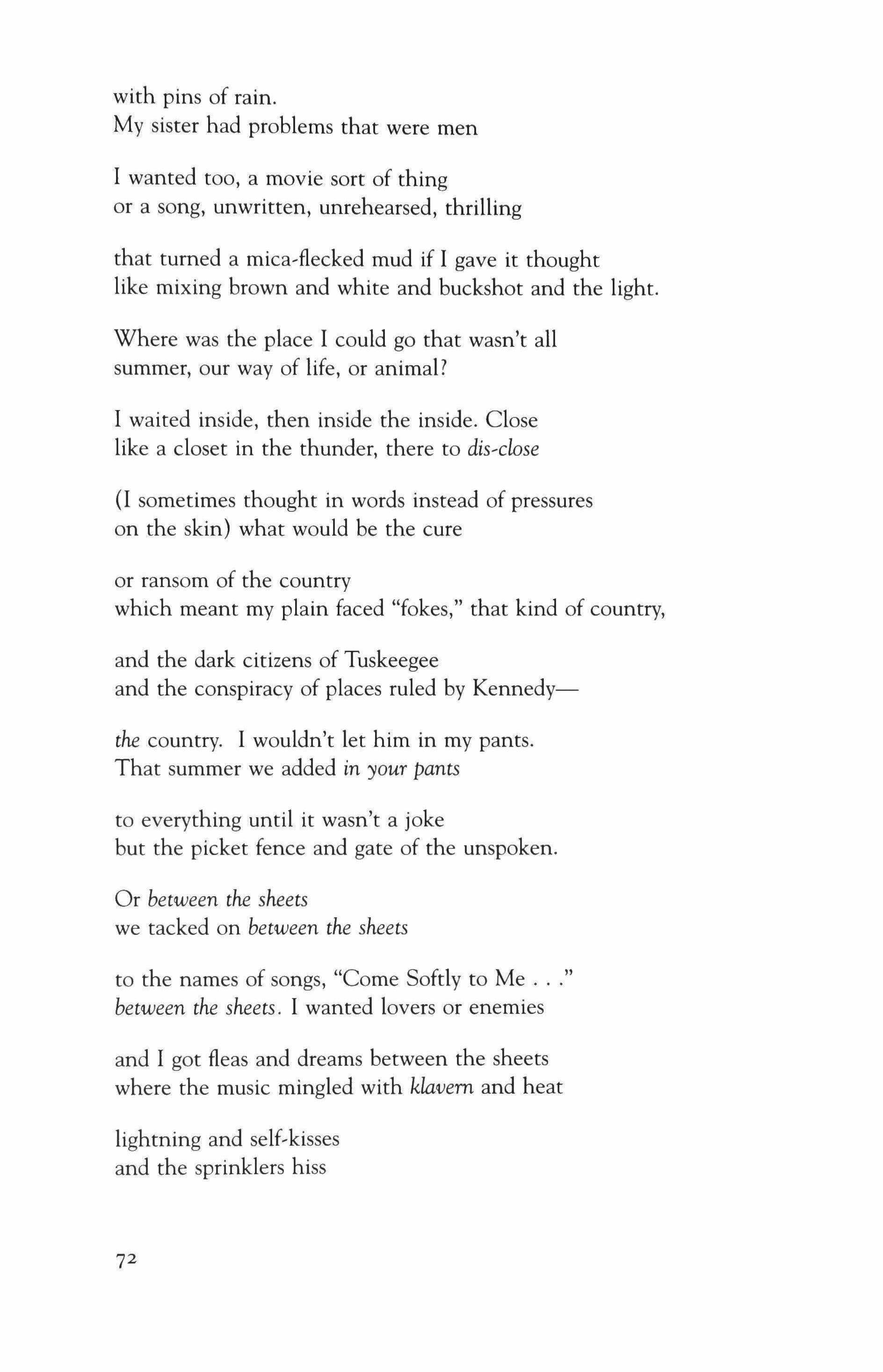
with pins of rain. My sister had problems that were men
I wanted too, a movie sort of thing or a song, unwritten, unrehearsed, thrilling that turned a mica-flecked mud if I gave it thought like mixing brown and white and buckshot and the light.
Where was the place I could go that wasn't all summer, our way of life, or animal?
I waited inside, then inside the inside. Close like a closet in the thunder, there to dis�close (I sometimes thought in words instead of pressures on the skin) what would be the cure or ransom of the country which meant my plain faced "fokes," that kind of country, and the dark citizens of Tuskeegee and the conspiracy of places ruled by Kennedythe country. I wouldn't let him in my pants. That summer we added in your pants to everything until it wasn't a joke but the picket fence and gate of the unspoken. Or between the sheets we tacked on between the sheets to the names of songs, "Come Softly to Me between the sheets. I wanted lovers or enemies and I got fleas and dreams between the sheets where the music mingled with klavem and heat lightning and self-kisses and the sprinklers hiss
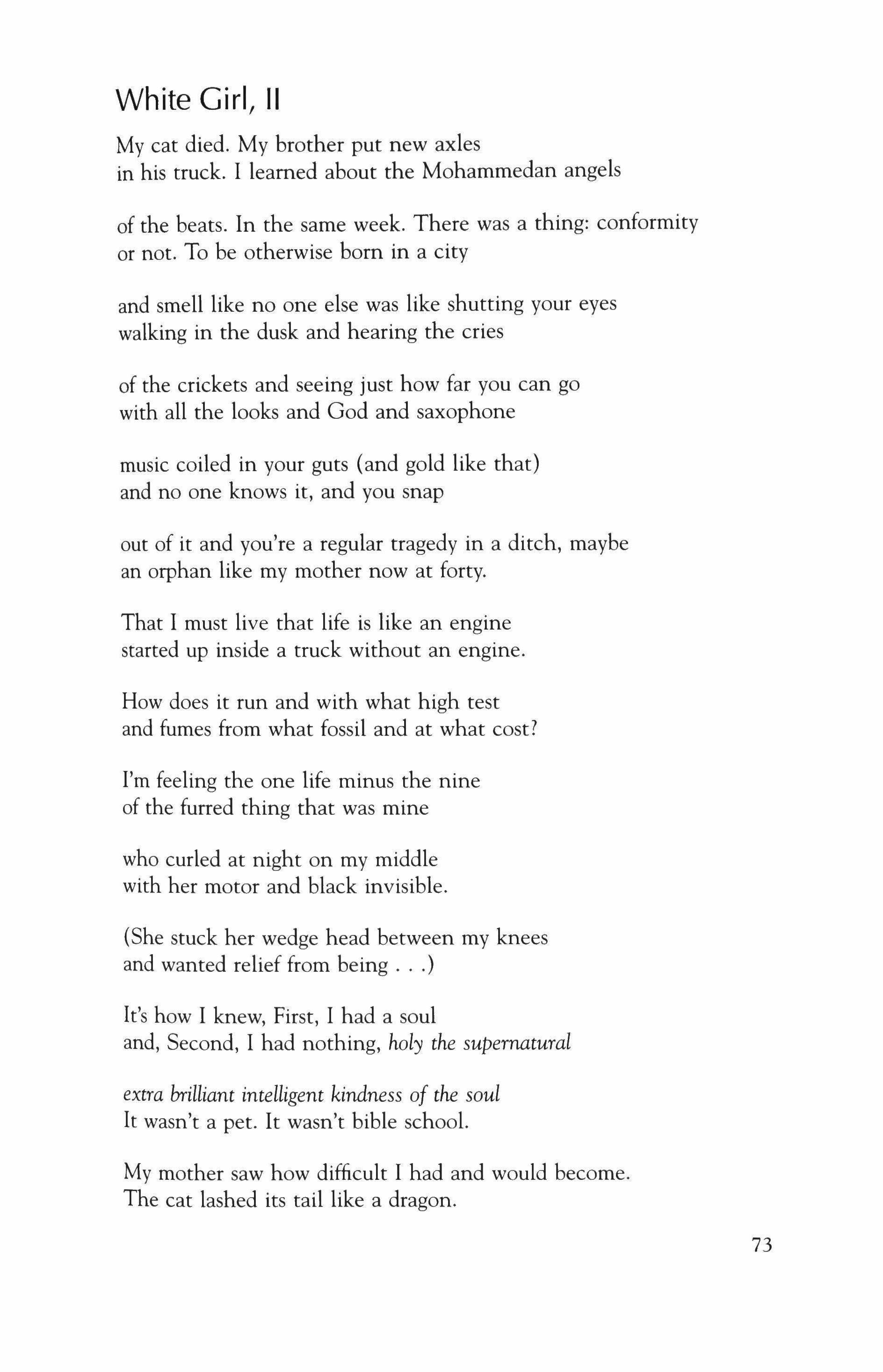
White Girl, II
My cat died. My brother put new axles in his truck. I learned about the Mohammedan angels of the beats. In the same week. There was a thing: conformity or not. To be otherwise born in a city
and smell like no one else was like shutting your eyes walking in the dusk and hearing the cries of the crickets and seeing just how far you can go with all the looks and God and saxophone
music coiled in your guts (and gold like that) and no one knows it, and you snap out of it and you're a regular tragedy in a ditch, maybe an orphan like my mother now at forty.
That I must live that life is like an engine started up inside a truck without an engine.
How does it run and with what high test and fumes from what fossil and at what cost?
I'm feeling the one life minus the nine of the furred thing that was mine
who curled at night on my middle with her motor and black invisible.
(She stuck her wedge head between my knees and wanted relief from being )
It's how I knew, First, I had a soul and, Second, I had nothing, holy the supernatural
extra brilliant intelligent kindness of the soul It wasn't a pet. It wasn't bible school.
My mother saw how difficult I had and would become. The cat lashed its tail like a dragon.
73
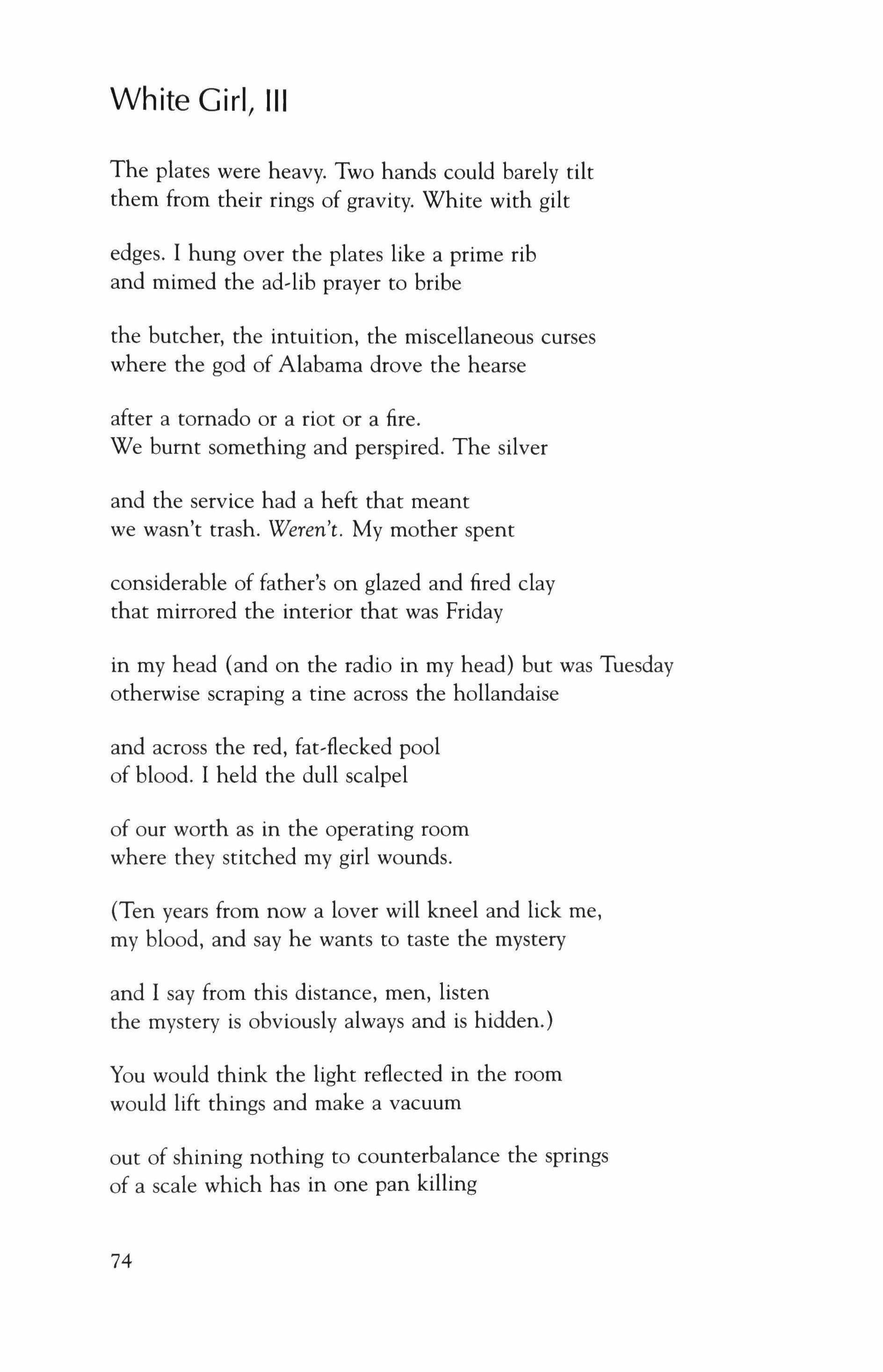
White Girl, III
The plates were heavy. Two hands could barely tilt them from their rings of gravity. White with gilt edges. I hung over the plates like a prime rib and mimed the ad,lib prayer to bribe the butcher, the intuition, the miscellaneous curses where the god of Alabama drove the hearse after a tornado or a riot or a fire. We burnt something and perspired. The silver and the service had a heft that meant we wasn't trash. Weren't. My mother spent
considerable of father's on glazed and fired clay that mirrored the interior that was Friday in my head (and on the radio in my head) but was Tuesday otherwise scraping a tine across the hollandaise and across the red, fat-flecked pool of blood. I held the dull scalpel of our worth as in the operating room where they stitched my girl wounds.
(Ten years from now a lover will kneel and lick me, my blood, and say he wants to taste the mystery and I say from this distance, men, listen the mystery is obviously always and is hidden.)
You would think the light reflected in the room would lift things and make a vacuum out of shining nothing to counterbalance the springs of a scale which has in one pan killing
74
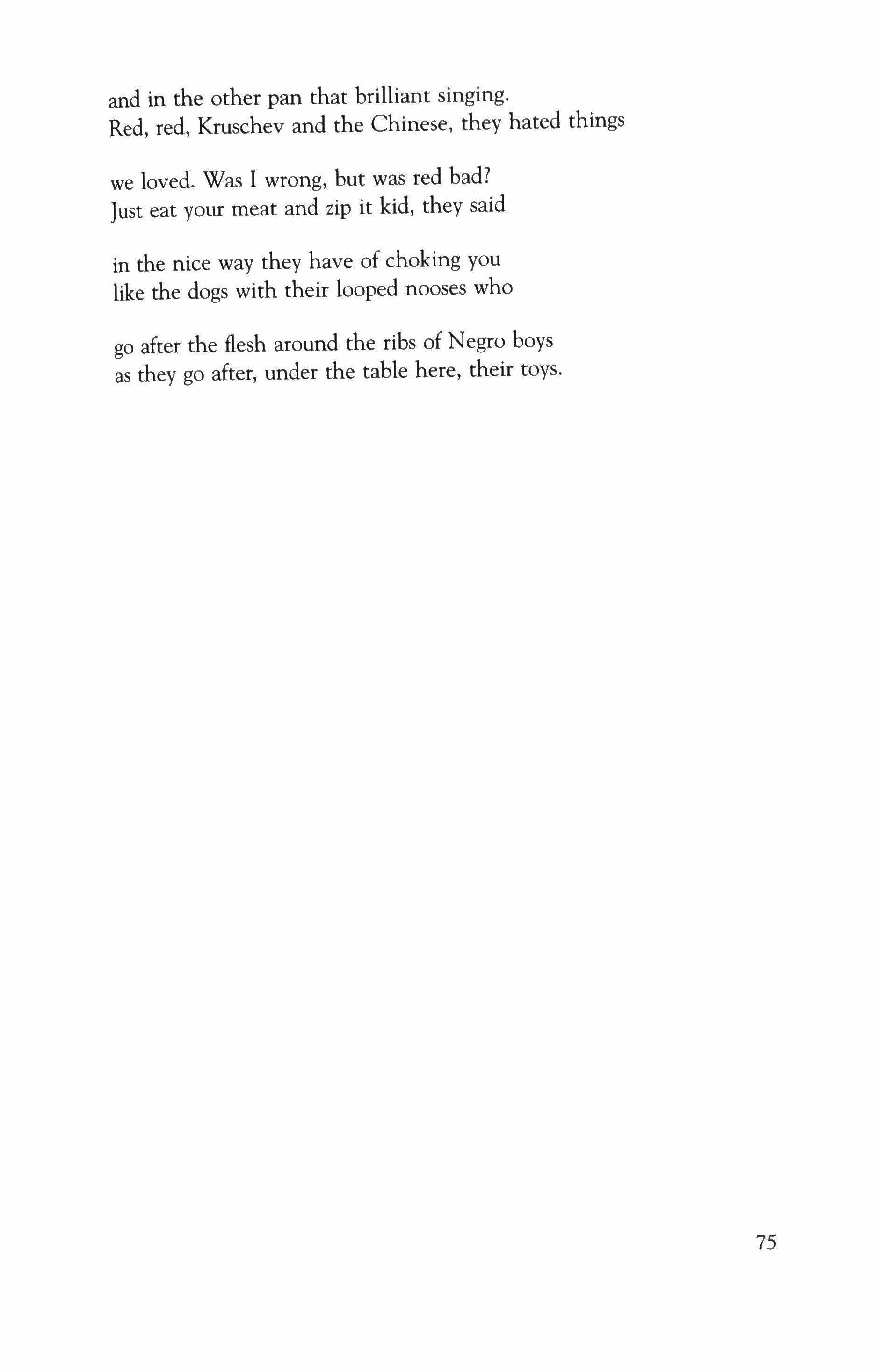
and in the other pan that brilliant singing. Red, red, Kruschev and the Chinese, they hated things
we loved. Was I wrong, but was red bad? Just eat your meat and zip it kid, they said in the nice way they have of choking you like the dogs with their looped nooses who go after the flesh around the ribs of Negro boys as they go after, under the table here, their toys.
75
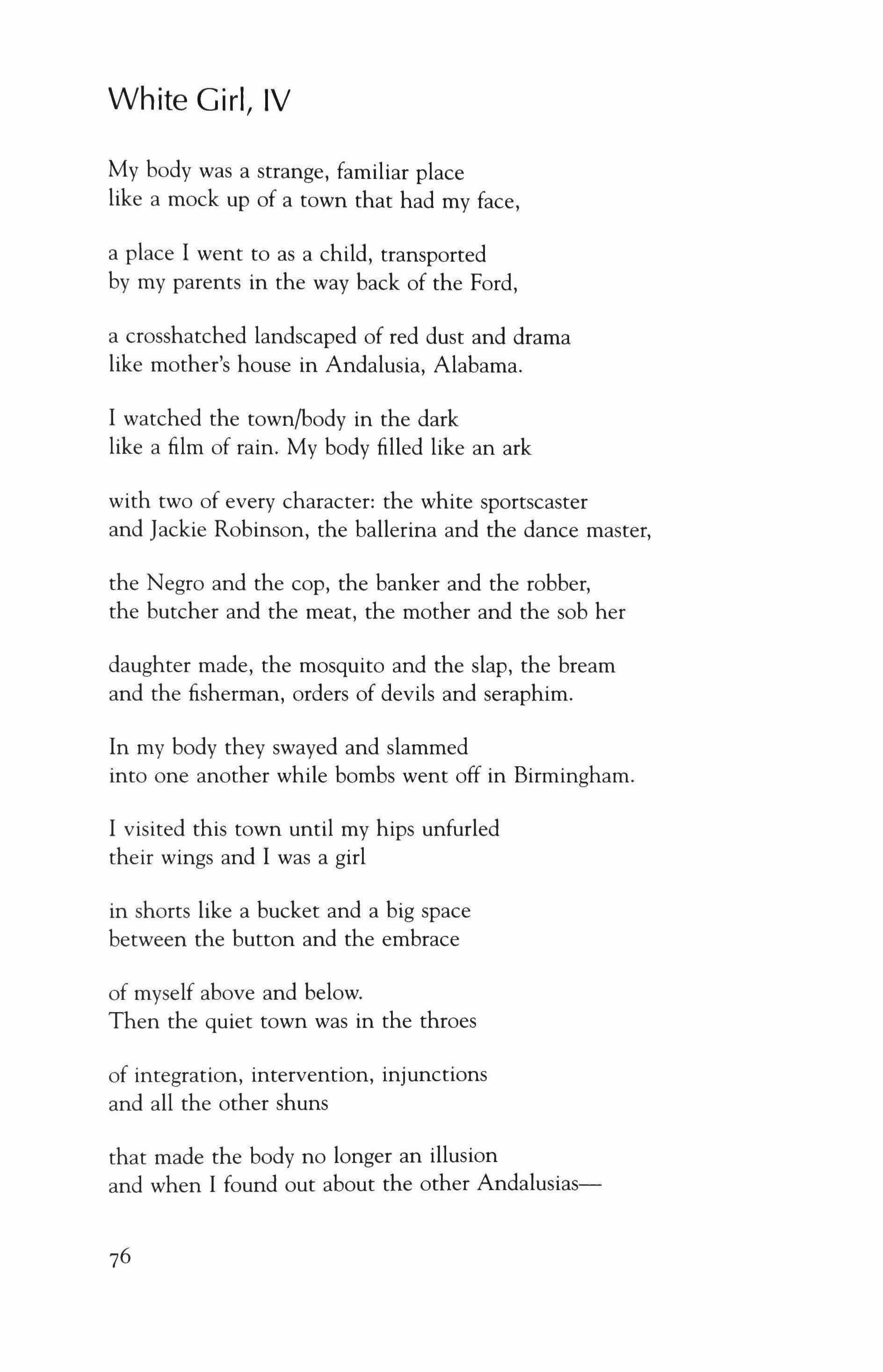
White Girl, IV
My body was a strange, familiar place like a mock up of a town that had my face, a place I went to as a child, transported by my parents in the way back of the Ford, a crosshatched landscaped of red dust and drama like mother's house in Andalusia, Alabama.
I watched the town/body in the dark like a film of rain. My body filled like an ark with two of every character: the white sportscaster and Jackie Robinson, the ballerina and the dance master, the Negro and the cop, the banker and the robber, the butcher and the meat, the mother and the sob her daughter made, the mosquito and the slap, the bream and the fisherman, orders of devils and seraphim.
In my body they swayed and slammed into one another while bombs went off in Birmingham.
I visited this town until my hips unfurled their wings and I was a girl in shorts like a bucket and a big space between the button and the embrace of myself above and below. Then the quiet town was in the throes of integration, intervention, injunctions and all the other shuns that made the body no longer an illusion and when I found out about the other Andalusias-
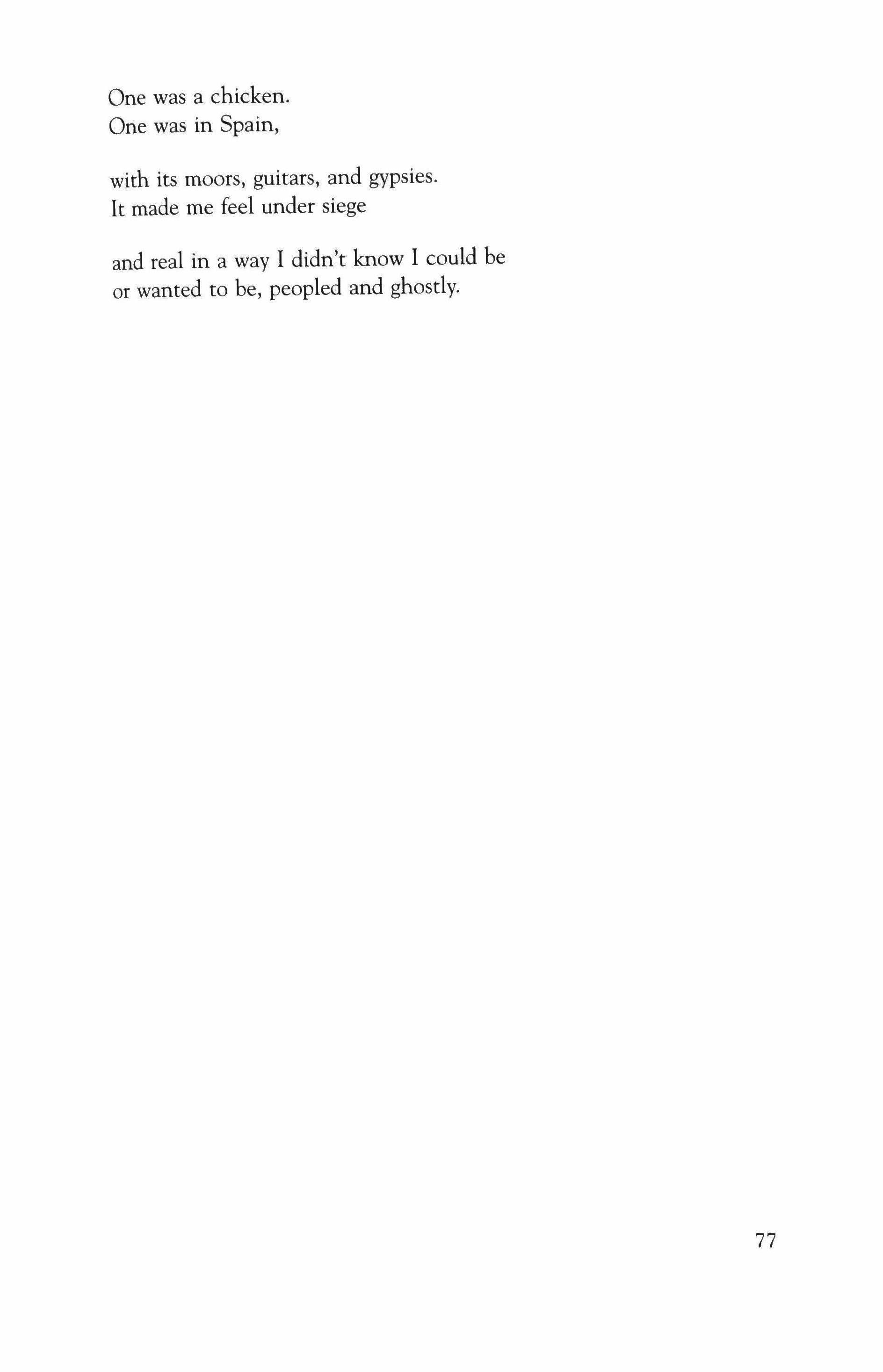
One was a chicken. One was in Spain, with its moors, guitars, and gypsies. It made me feel under siege and real in a way I didn't know I could be or wanted to be, peopled and ghostly.
77
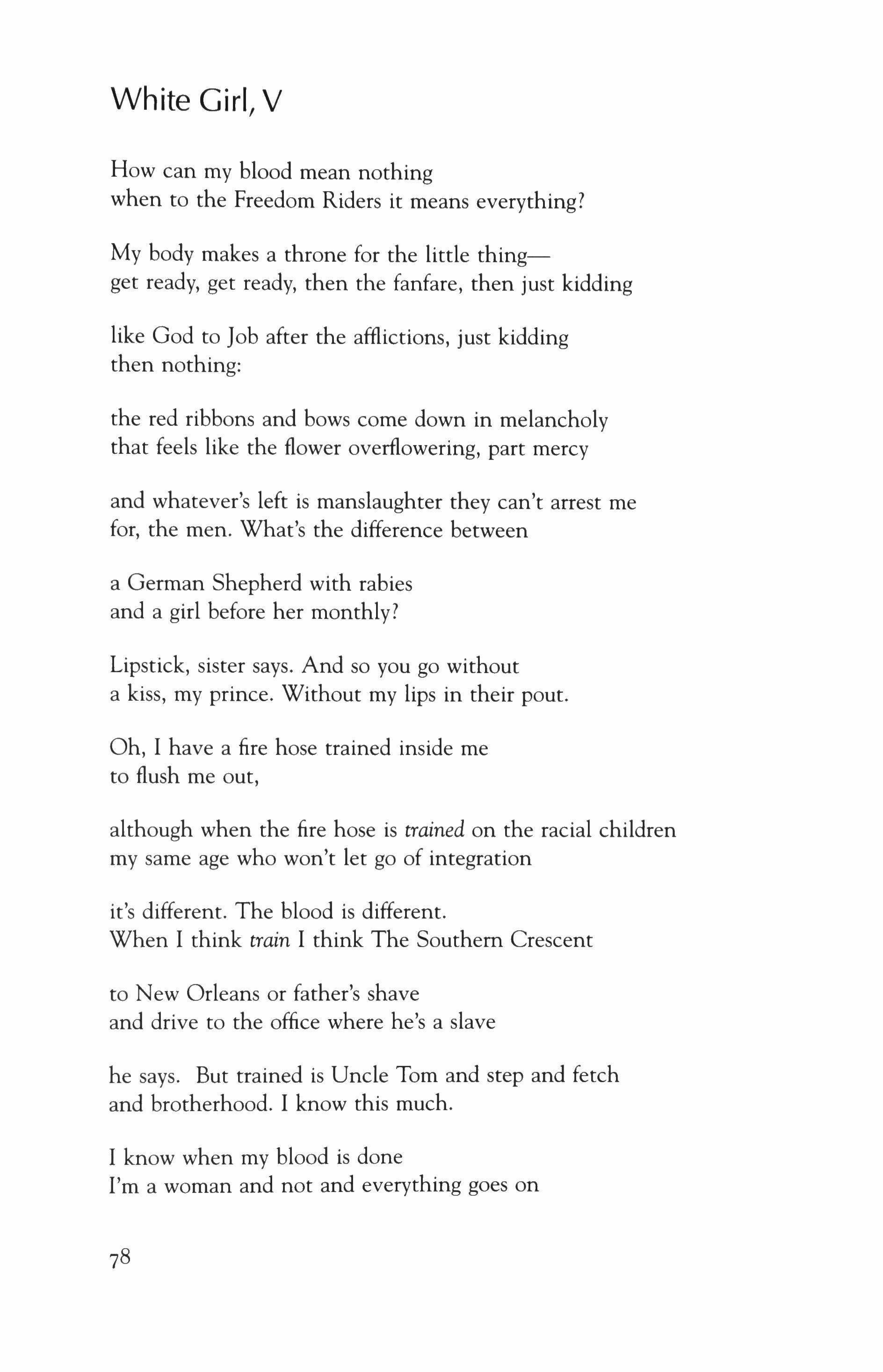
White Girl, V
How can my blood mean nothing when to the Freedom Riders it means everything?
My body makes a throne for the little thingget ready, get ready, then the fanfare, then just kidding like God to Job after the afflictions, just kidding then nothing: the red ribbons and bows come down in melancholy that feels like the flower overflowering, part mercy and whatever's left is manslaughter they can't arrest me for, the men. What's the difference between
a German Shepherd with rabies and a girl before her monthly?
Lipstick, sister says. And so you go without a kiss, my prince. Without my lips in their pout.
Oh, I have a fire hose trained inside me to flush me out,
although when the fire hose is trained on the racial children my same age who won't let go of integration it's different. The blood is different. When I think train I think The Southern Crescent to New Orleans or father's shave and drive to the office where he's a slave
he says. But trained is Uncle Tom and step and fetch and brotherhood. I know this much.
I know when my blood is done I'm a woman and not and everything goes on
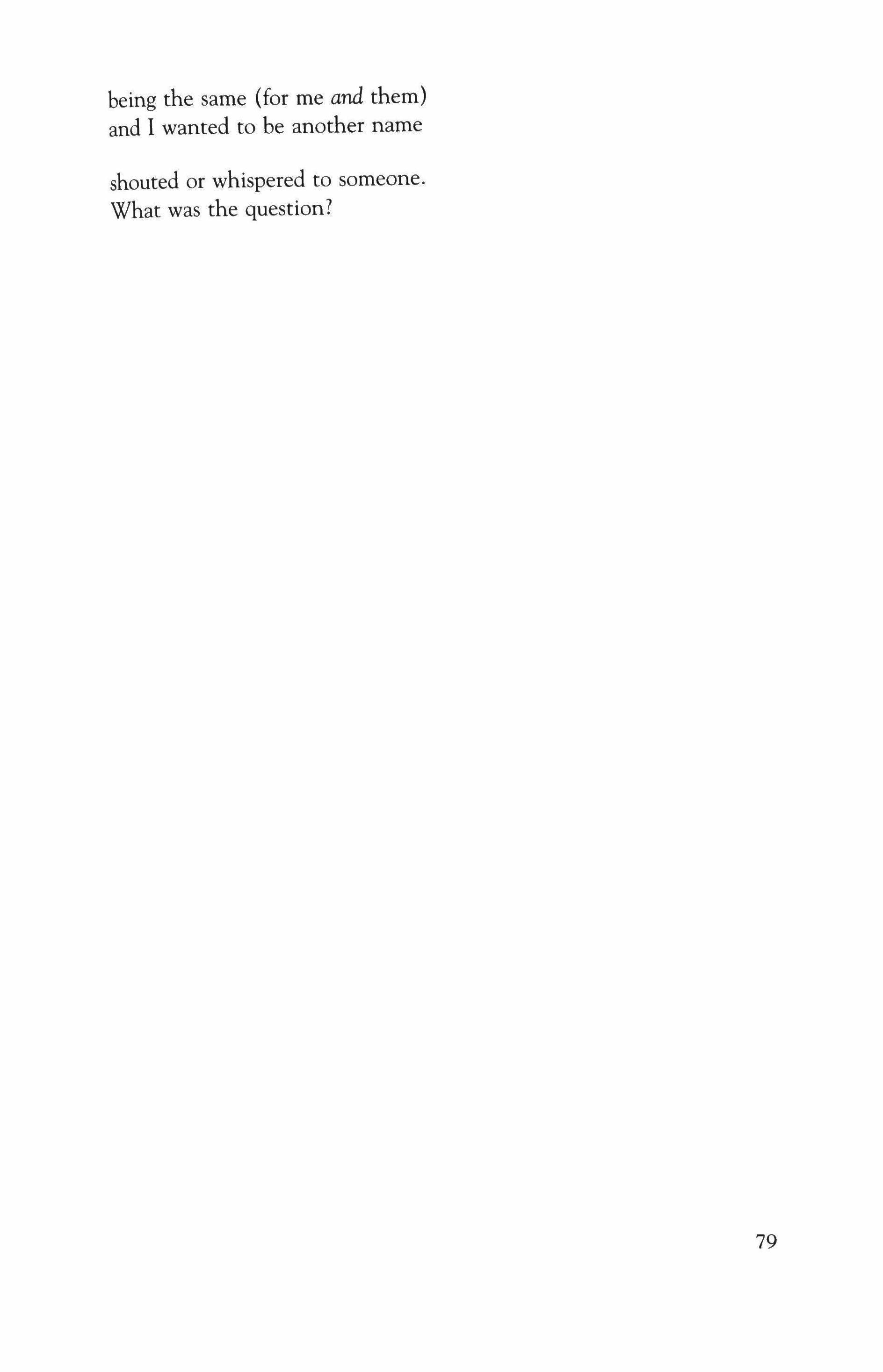
being the same (for me and them) and I wanted to be another name shouted or whispered to someone. What was the question?
79
William Olsen
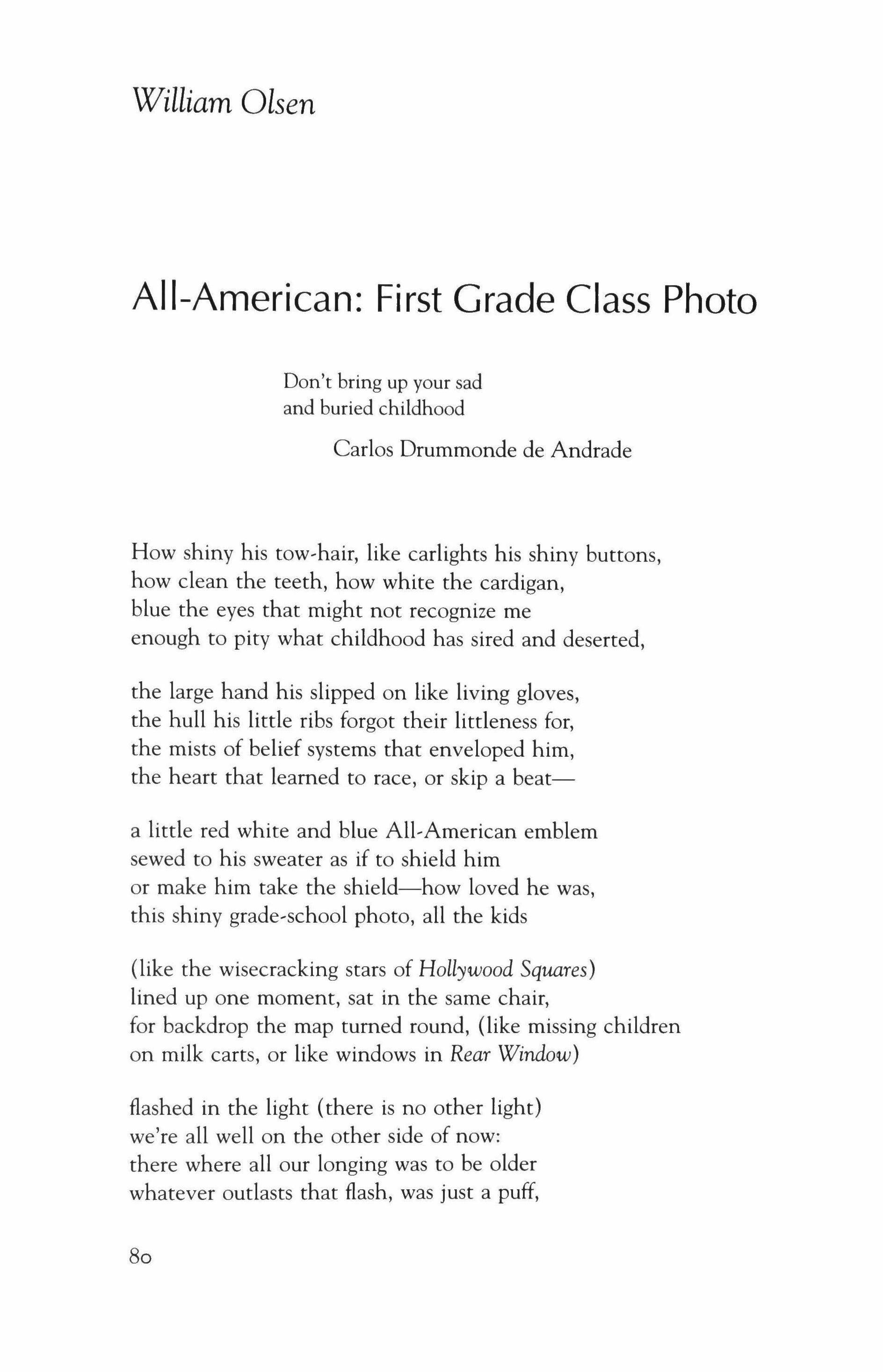
All-American: First Grade Class Photo
Don't bring up your sad and buried childhood
Carlos Drummonde de Andrade
How shiny his tow-hair, like carlights his shiny buttons, how clean the teeth, how white the cardigan, blue the eyes that might not recognize me enough to pity what childhood has sired and deserted,
the large hand his slipped on like living gloves, the hull his little ribs forgot their littleness for, the mists of belief systems that enveloped him, the heart that learned to race, or skip a beat-
a little red white and blue All-American emblem sewed to his sweater as if to shield him or make him take the shield-how loved he was, this shiny grade-school photo, all the kids
(like the wisecracking stars of Hollywood Squares) lined up one moment, sat in the same chair, for backdrop the map turned round, (like missing children on milk carts, or like windows in Rear Window)
flashed in the light (there is no other light) we're all well on the other side of now: there where all our longing was to be older whatever outlasts that flash, was just a puff,
80
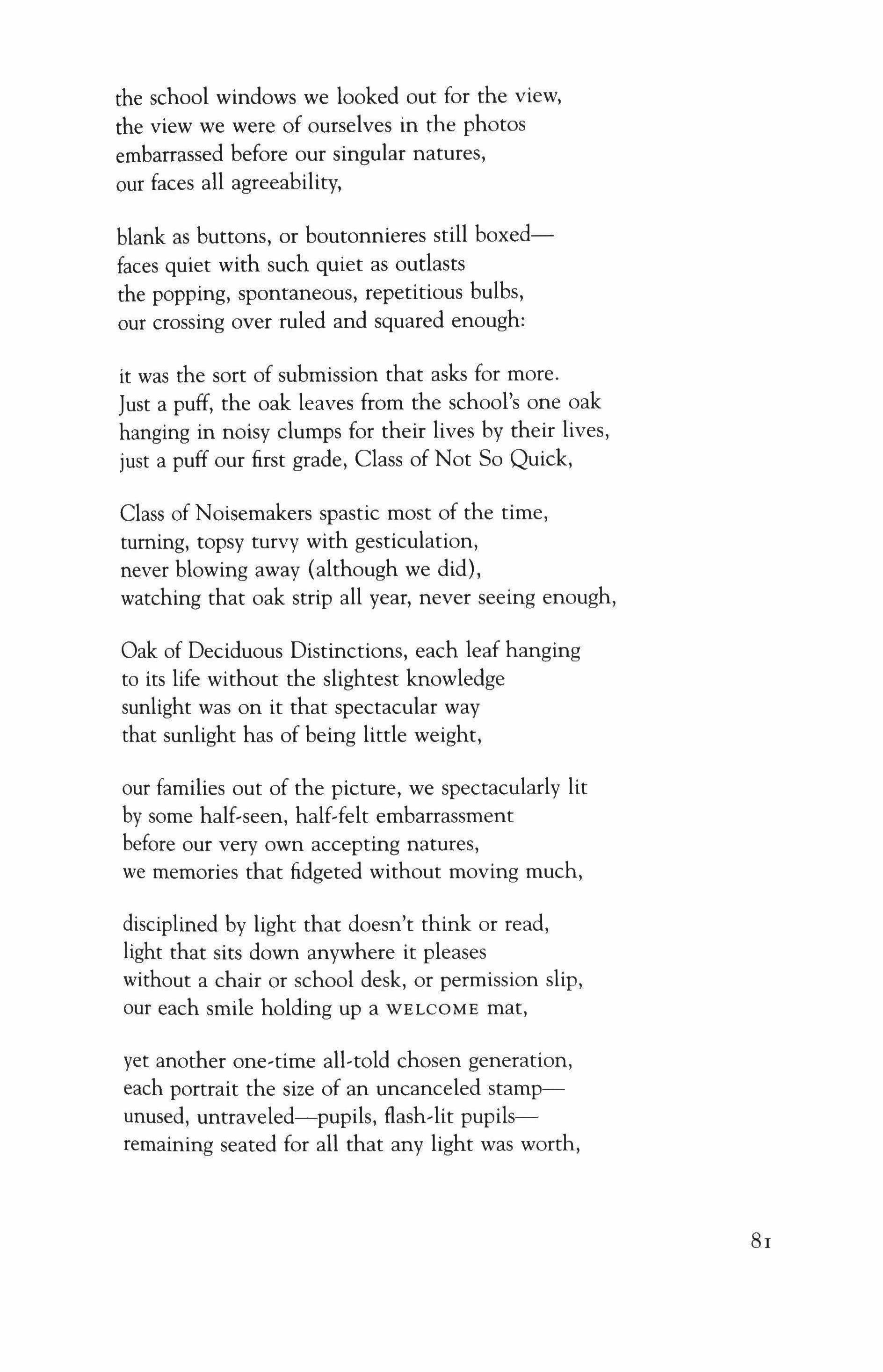
the school windows we looked out for the view, the view we were of ourselves in the photos embarrassed before our singular natures, our faces all agreeability,
blank as buttons, or boutonnieres still boxedfaces quiet with such quiet as outlasts the popping, spontaneous, repetitious bulbs, our crossing over ruled and squared enough:
it was the sort of submission that asks for more.
Just a puff, the oak leaves from the school's one oak hanging in noisy clumps for their lives by their lives, just a puff our first grade, Class of Not So Quick,
Class of Noisemakers spastic most of the time, turning, topsy turvy with gesticulation, never blowing away (although we did), watching that oak strip all year, never seeing enough,
Oak of Deciduous Distinctions, each leaf hanging to its life without the slightest knowledge sunlight was on it that spectacular way that sunlight has of being little weight,
our families out of the picture, we spectacularly lit by some half-seen, half-felt embarrassment before our very own accepting natures, we memories that fidgeted without moving much,
disciplined by light that doesn't think or read, light that sits down anywhere it pleases without a chair or school desk, or permission slip, our each smile holding up a WELCOME mat,
yet another one-time all-told chosen generation, each portrait the size of an uncanceled stampunused, untraveled-pupils, flash-lit pupilsremaining seated for all that any light was worth,
81
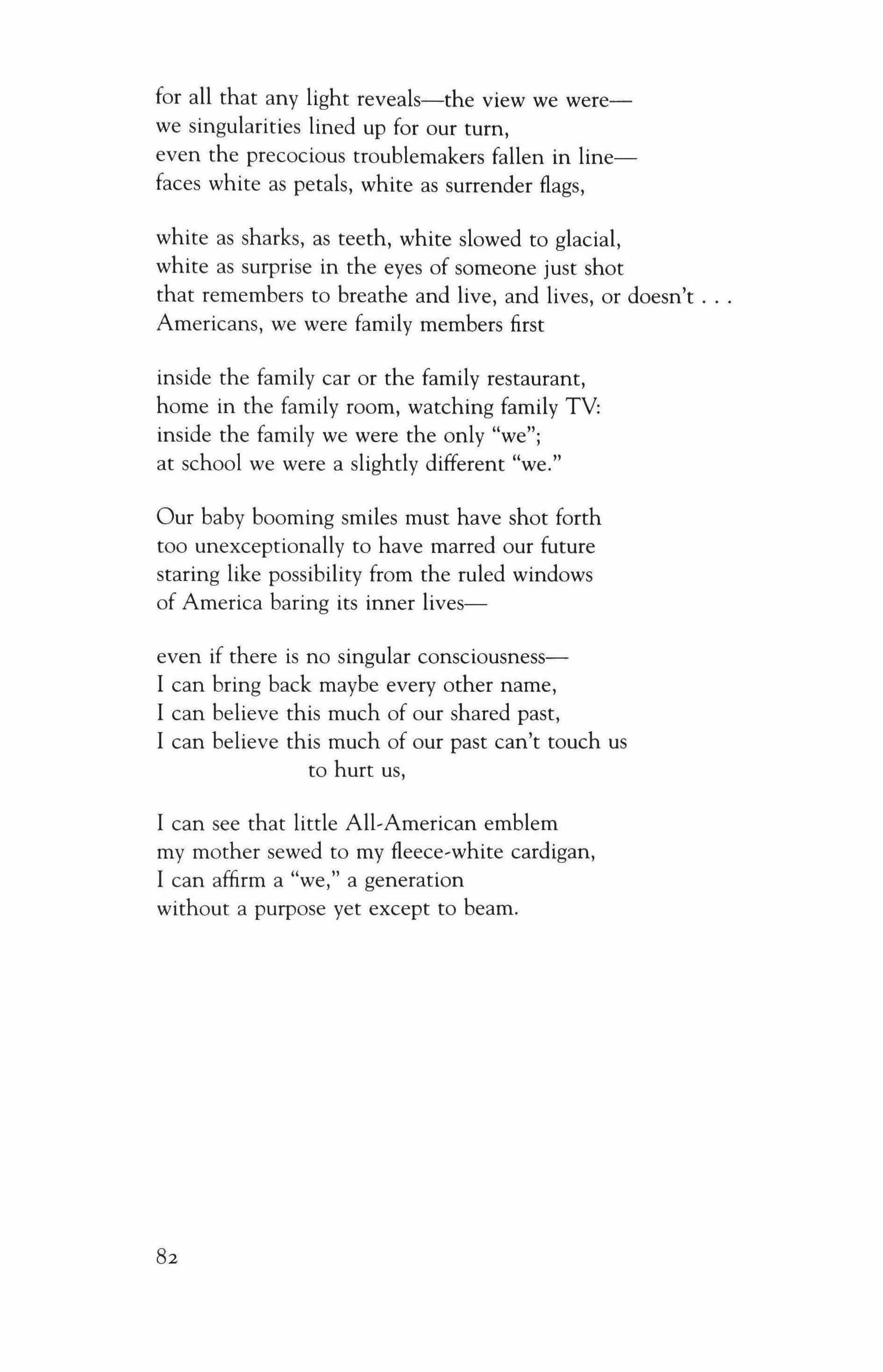
for all that any light reveals-the view we werewe singularities lined up for our turn, even the precocious troublemakers fallen in linefaces white as petals, white as surrender flags,
white as sharks, as teeth, white slowed to glacial, white as surprise in the eyes of someone just shot that remembers to breathe and live, and lives, or doesn't Americans, we were family members first
inside the family car or the family restaurant, home in the family room, watching family TV: inside the family we were the only "we"; at school we were a slightly different "we."
Our baby booming smiles must have shot forth too unexceptionally to have marred our future staring like possibility from the ruled windows of America baring its inner lives-
even if there is no singular consciousnessI can bring back maybe every other name, I can believe this much of our shared past, I can believe this much of our past can't touch us to hurt us,
I can see that little All-American emblem my mother sewed to my fleece-white cardigan, I can affirm a "we," a generation without a purpose yet except to beam.
Neither Paradise Nor Below,
Nor Up Nor Down
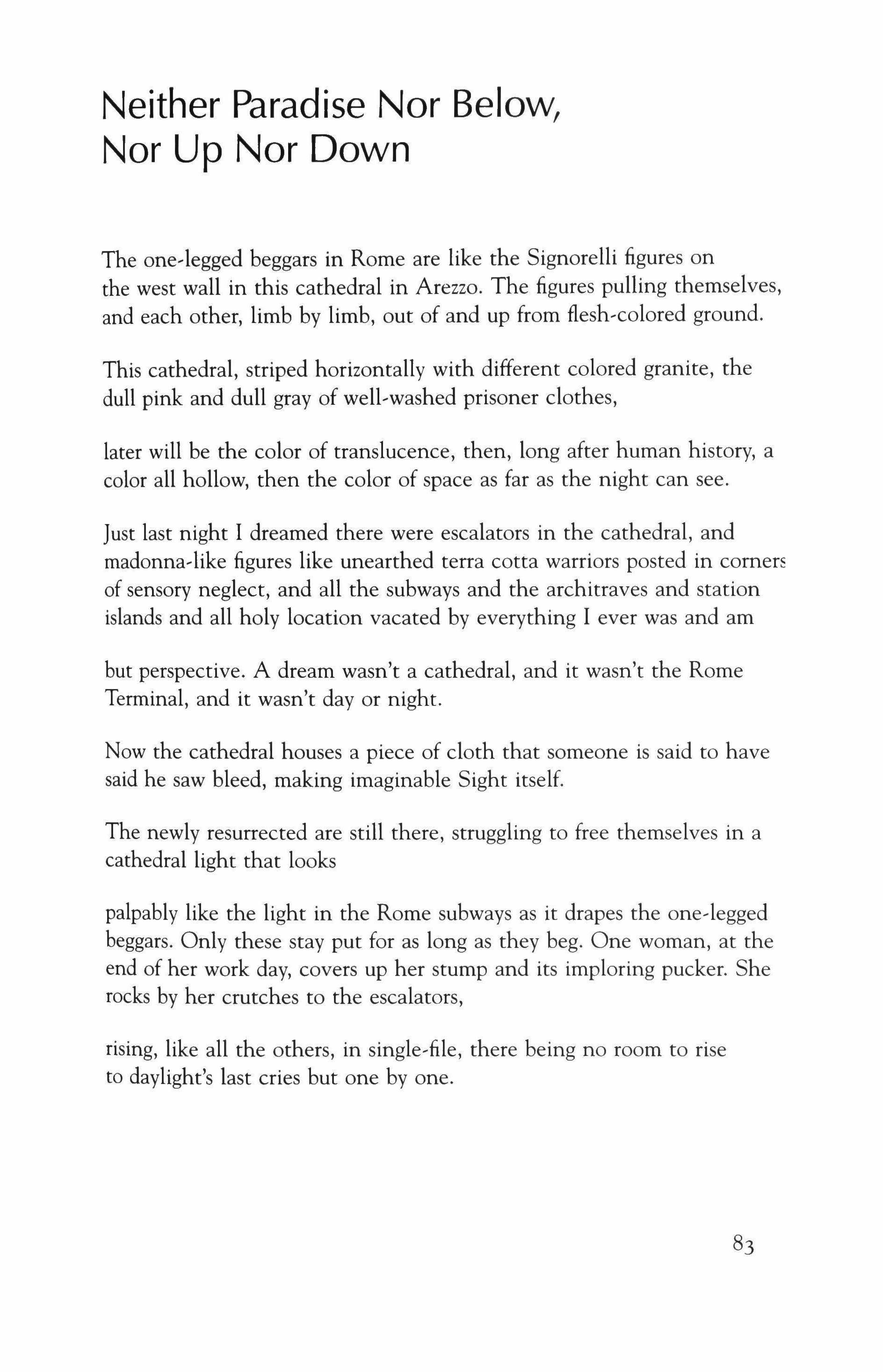
The one'legged beggars in Rome are like the Signorelli figures on the west wall in this cathedral in Arezzo. The figures pulling themselves, and each other, limb by limb, out of and up from flesh-colored ground.
This cathedral, striped horizontally with different colored granite, the dull pink and dull gray of well-washed prisoner clothes, later will be the color of translucence, then, long after human history, a color all hollow, then the color of space as far as the night can see.
Just last night I dreamed there were escalators in the cathedral, and madonna-like figures like unearthed terra cotta warriors posted in corners of sensory neglect, and all the subways and the architraves and station islands and all holy location vacated by everything I ever was and am but perspective. A dream wasn't a cathedral, and it wasn't the Rome Terminal, and it wasn't day or night.
Now the cathedral houses a piece of cloth that someone is said to have said he saw bleed, making imaginable Sight itself.
The newly resurrected are still there, struggling to free themselves in a cathedral light that looks palpably like the light in the Rome subways as it drapes the one-legged beggars. Only these stay put for as long as they beg. One woman, at the end of her work day, covers up her stump and its imploring pucker. She rocks by her crutches to the escalators, rising, like all the others, in single-file, there being no room to rise to daylight's last cries but one by one.
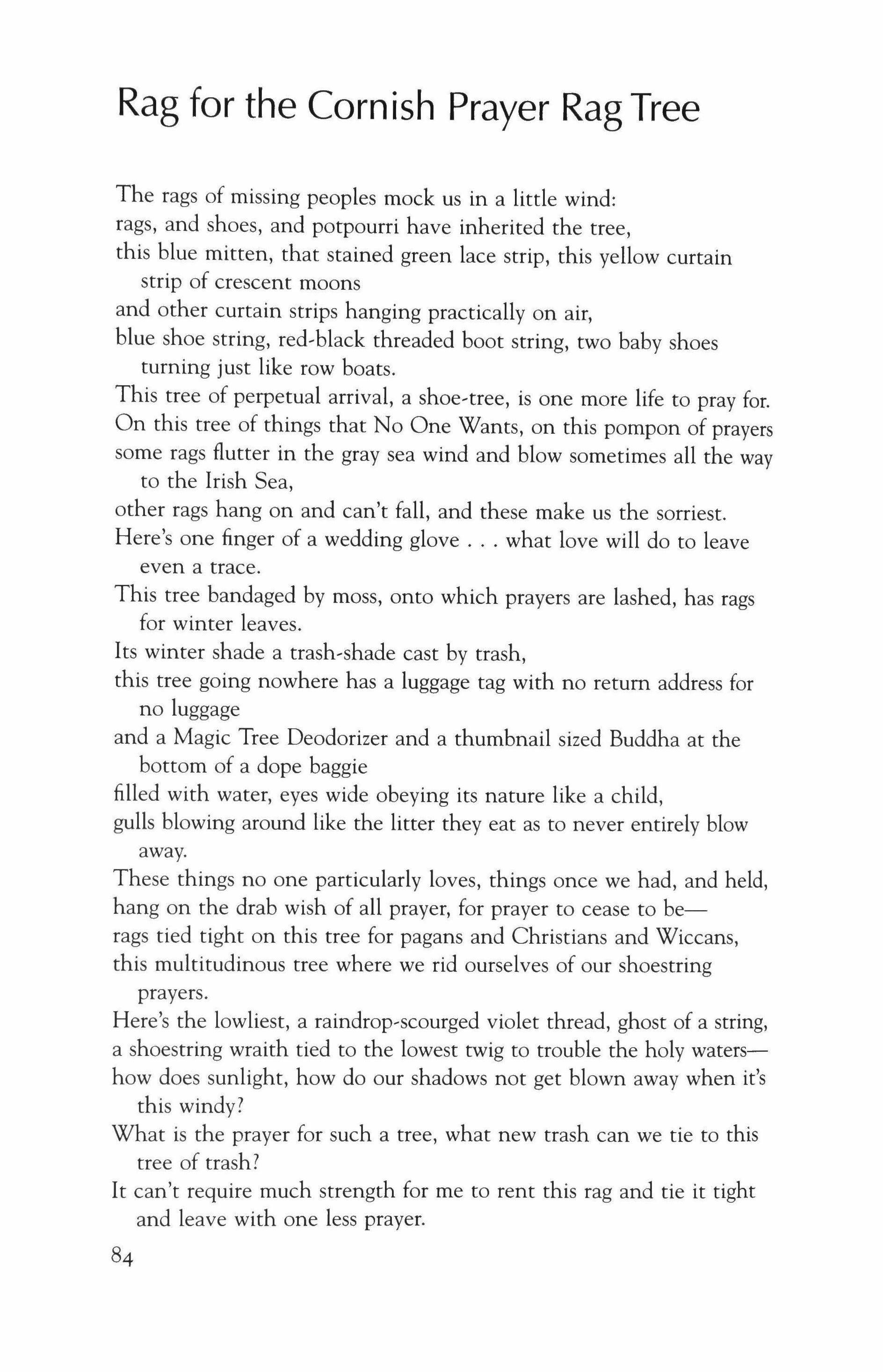
Rag for the Cornish Prayer Rag Tree
The rags of missing peoples mock us in a little wind: rags, and shoes, and potpourri have inherited the tree, this blue mitten, that stained green lace strip, this yellow curtain strip of crescent moons and other curtain strips hanging practically on air, blue shoe string, red-black threaded boot string, two baby shoes turning just like row boats.
This tree of perpetual arrival, a shoe-tree, is one more life to pray for. On this tree of things that No One Wants, on this pompon of prayers some rags flutter in the gray sea wind and blow sometimes all the way to the Irish Sea, other rags hang on and can't fall, and these make us the sorriest. Here's one finger of a wedding glove what love will do to leave even a trace.
This tree bandaged by moss, onto which prayers are lashed, has rags for winter leaves.
Its winter shade a trash-shade cast by trash, this tree going nowhere has a luggage tag with no return address for no luggage and a Magic Tree Deodorizer and a thumbnail sized Buddha at the bottom of a dope baggie filled with water, eyes wide obeying its nature like a child, gulls blowing around like the litter they eat as to never entirely blow away.
These things no one particularly loves, things once we had, and held, hang on the drab wish of all prayer, for prayer to cease to berags tied tight on this tree for pagans and Christians and Wiccans, this multitudinous tree where we rid ourselves of our shoestring prayers.
Here's the lowliest, a raindrop-scourged violet thread, ghost of a string, a shoestring wraith tied to the lowest twig to trouble the holy watershow does sunlight, how do our shadows not get blown away when it's this windy?
What is the prayer for such a tree, what new trash can we tie to this tree of trash?
It can't require much strength for me to rent this rag and tie it tight and leave with one less prayer.
Shirley Kaufman
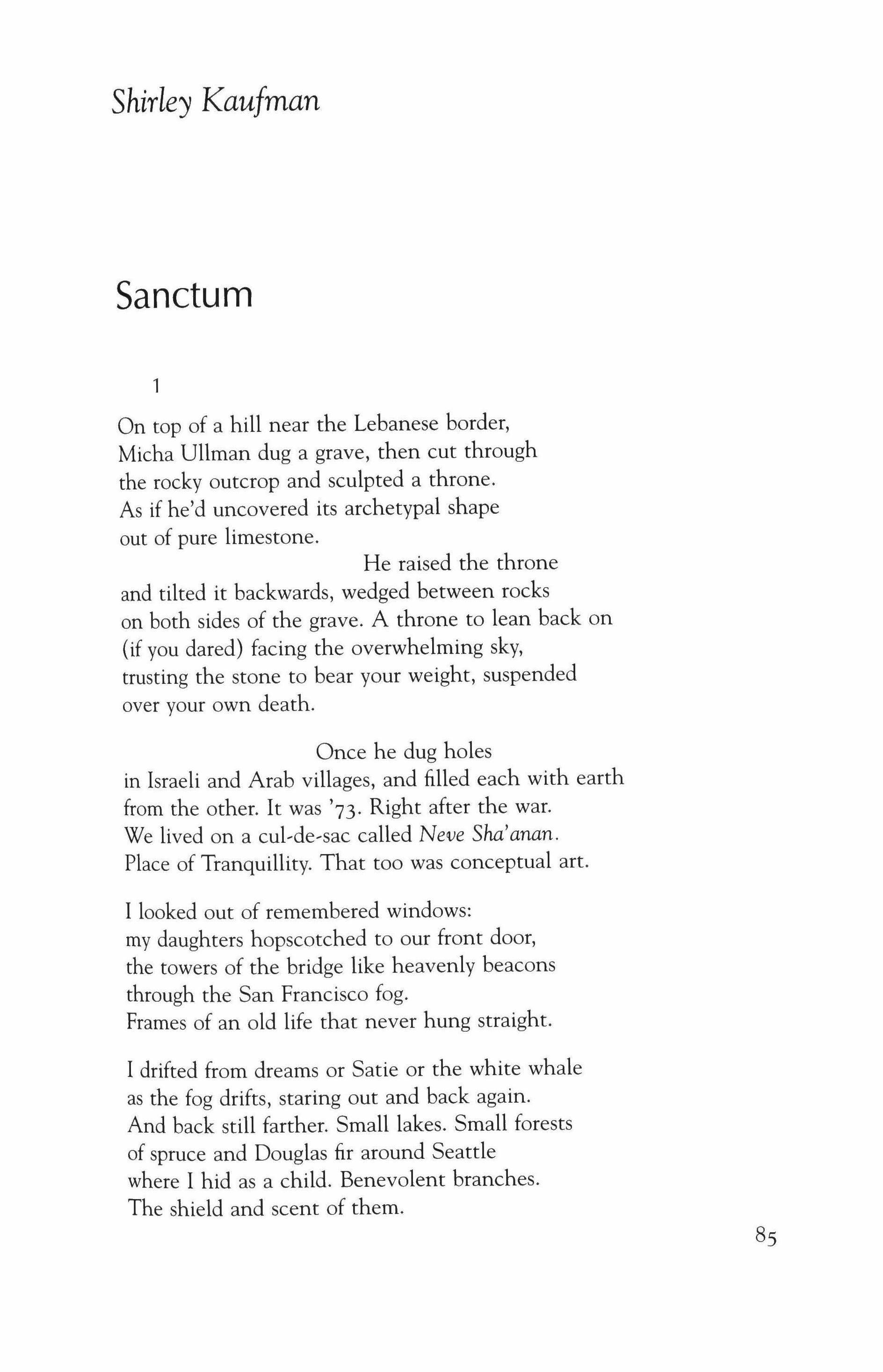
Sanctum
On top of a hill near the Lebanese border, Micha Ullman dug a grave, then cut through the rocky outcrop and sculpted a throne. As if he'd uncovered its archetypal shape out of pure limestone. He raised the throne and tilted it backwards, wedged between rocks on both sides of the grave. A throne to lean back on (if you dared) facing the overwhelming sky, trusting the stone to bear your weight, suspended over your own death.
Once he dug holes in Israeli and Arab villages, and filled each with earth from the other. It was '73. Right after the war. We lived on a cul-de-sac called Neve Sha'anan. Place of Tranquillity. That too was conceptual art.
I looked out of remembered windows: my daughters hopscotched to our front door, the towers of the bridge like heavenly beacons through the San Francisco fog. Frames of an old life that never hung straight. I drifted from dreams or Satie or the white whale as the fog drifts, staring out and back again. And back still farther. Small lakes. Small forests of spruce and Douglas fir around Seattle where I hid as a child. Benevolent branches. The shield and scent of them.
85
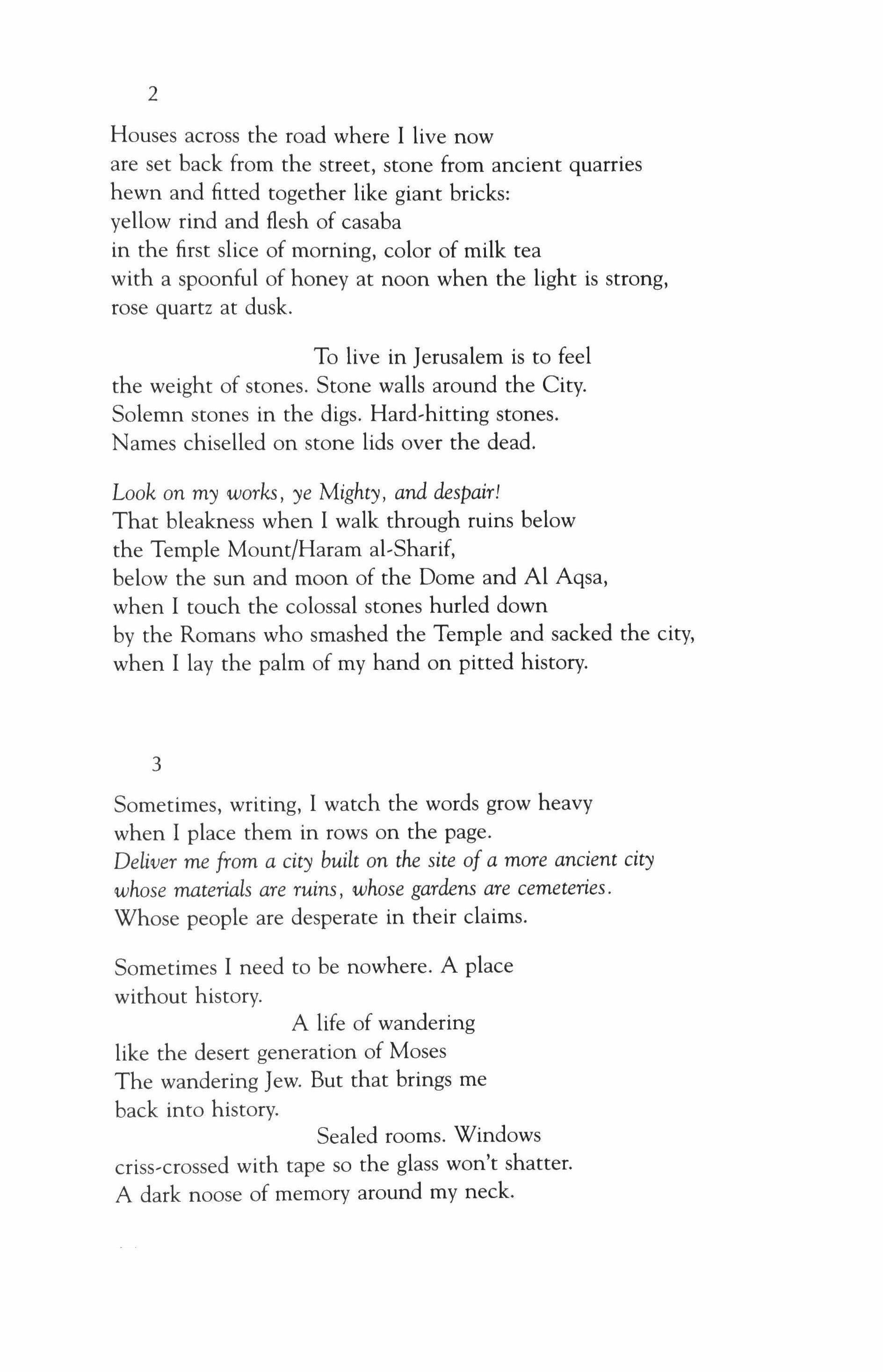
Houses across the road where I live now are set back from the street, stone from ancient quarries hewn and fitted together like giant bricks: yellow rind and flesh of casaba in the first slice of morning, color of milk tea with a spoonful of honey at noon when the light is strong, rose quartz at dusk.
To live in Jerusalem is to feel the weight of stones. Stone walls around the City. Solemn stones in the digs. Hard-hitting stones. Names chiselled on stone lids over the dead.
Look on my works, ye Mighty, and despair! That bleakness when I walk through ruins below the Temple Mount/Haram al-Sharif, below the sun and moon of the Dome and Al Aqsa, when I touch the colossal stones hurled down by the Romans who smashed the Temple and sacked the city, when I lay the palm of my hand on pitted history. 3
Sometimes, writing, I watch the words grow heavy when I place them in rows on the page. Deliver me from a city built on the site of a more ancient city whose materials are ruins, whose gardens are cemeteries. Whose people are desperate in their claims.
Sometimes I need to be nowhere. A place without history.
A life of wandering like the desert generation of Moses
The wandering Jew. But that brings me back into history.
Sealed rooms. Windows criss-crossed with tape so the glass won't shatter. A dark noose of memory around my neck.
2
Coffins covered with flags and flags burning. I need to be nowhere.
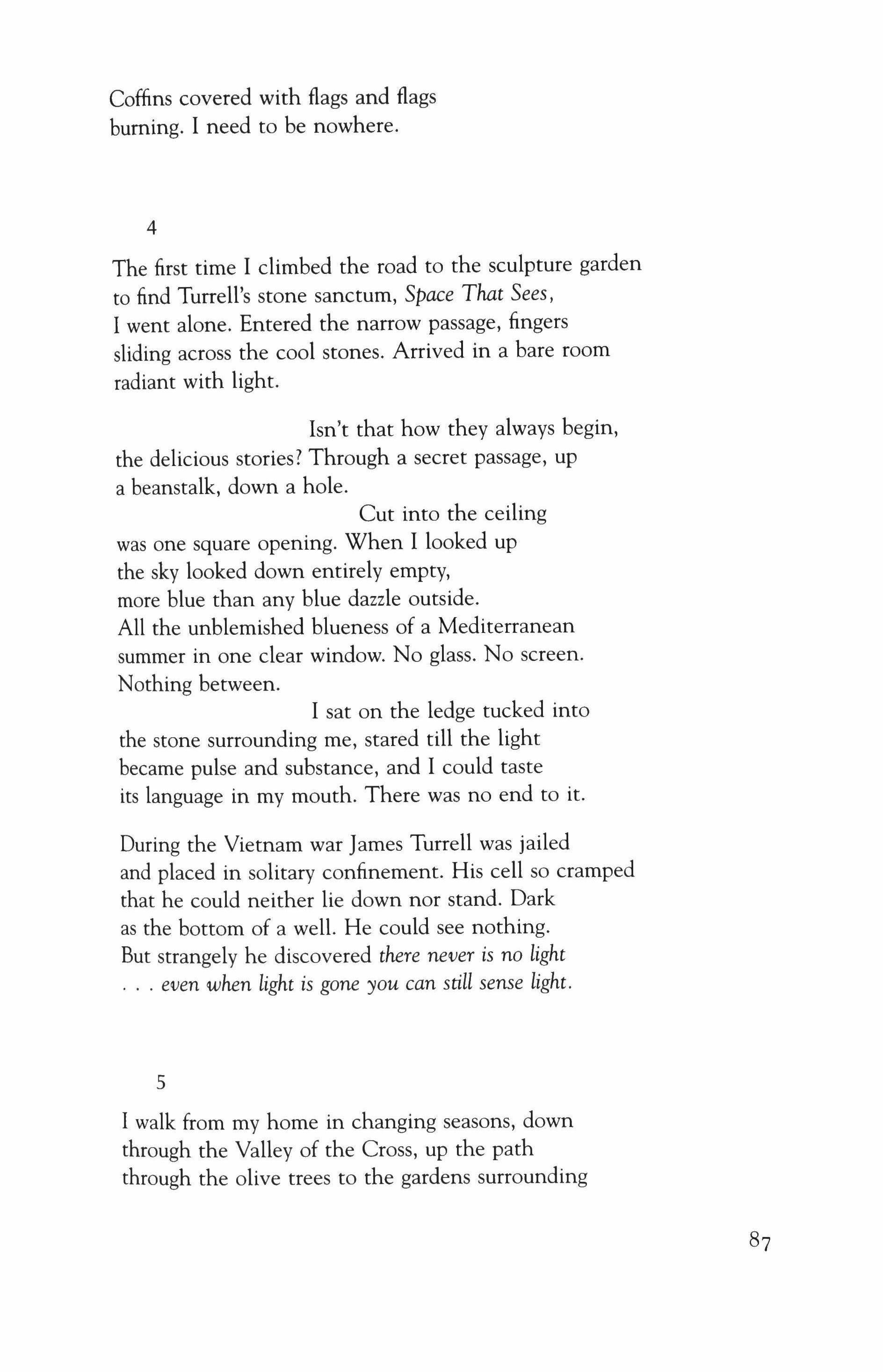
4
The first time I climbed the road to the sculpture garden to find Turrell's stone sanctum, Space That Sees, I went alone. Entered the narrow passage, fingers sliding across the cool stones. Arrived in a bare room radiant with light.
Isn't that how they always begin, the delicious stories? Through a secret passage, up a beanstalk, down a hole.
Cut into the ceiling was one square opening. When I looked up the sky looked down entirely empty, more blue than any blue dazzle outside. All the unblemished blueness of a Mediterranean summer in one clear window. No glass. No screen. Nothing between.
I sat on the ledge tucked into the stone surrounding me, stared till the light became pulse and substance, and I could taste its language in my mouth. There was no end to it.
During the Vietnam war James Turrell was jailed and placed in solitary confinement. His cell so cramped that he could neither lie down nor stand. Dark as the bottom of a well. He could see nothing. But strangely he discovered there never is no light even when light is gone you can still sense light.
5
I walk from my home in changing seasons, down through the Valley of the Cross, up the path through the olive trees to the gardens surrounding
that room. Often thin wisps of clouds leave a smoke trail across the blue square over my head, or clusters of vapor form and dissolve the way thoughts quicken with words before I lose them.
I have seen two ravens cross in an instant and disappear beyond the frame. I have seen the sky-space in silence. And with a child who shouted to break the silence. Once, lying down on the ledge, stretching my body on the stone, I saw it like newly dyed cloth in India, still wet and silky, spread out on the air to dry.
It has become the eye in the center of my head, the eye of the vastness around it.
I have seen the movement of the unseen sun. How shadows change on the interior wall. As I have changed.
What is there out there watching over me? Watching me watching it?
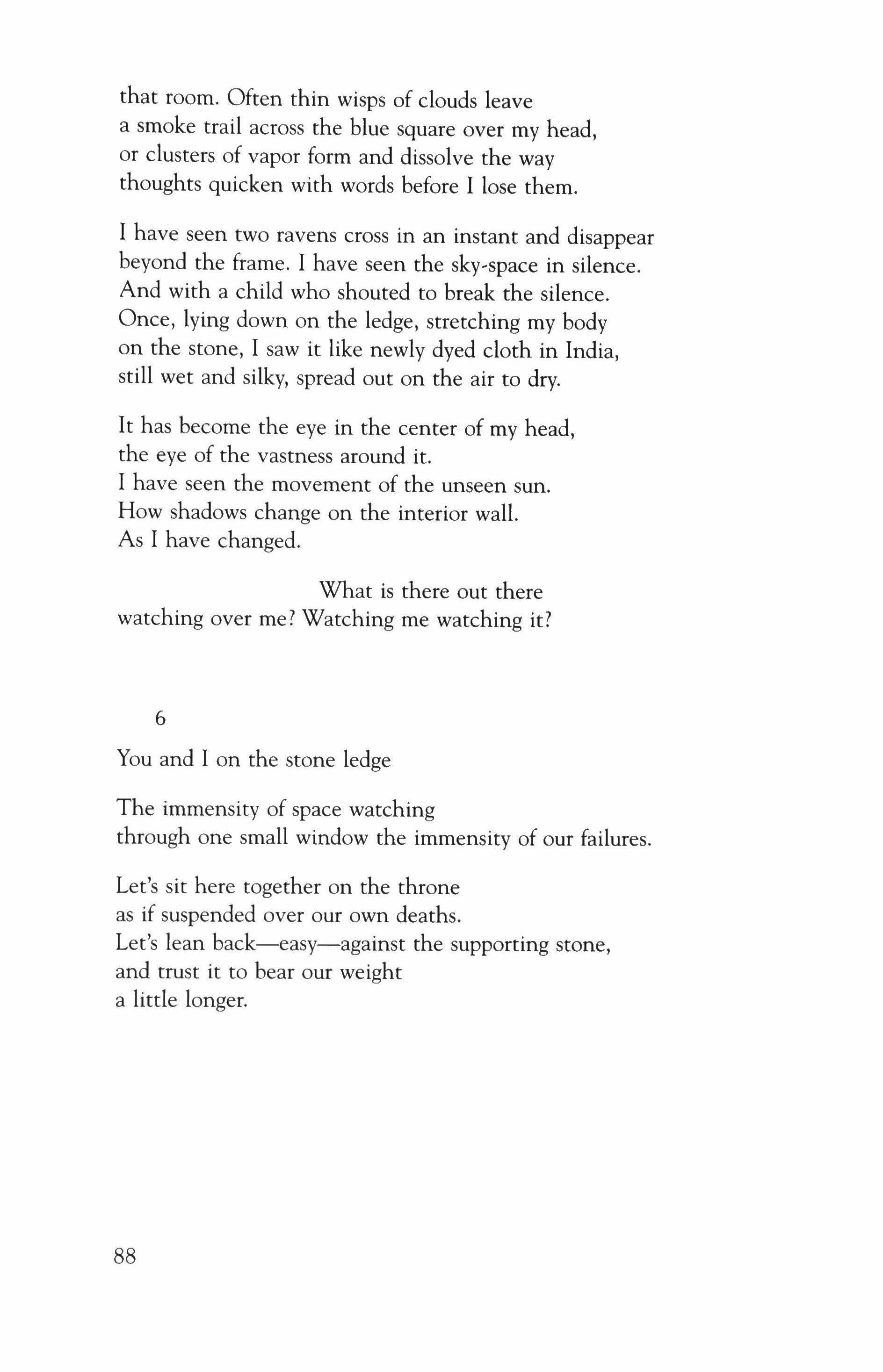
6
You and I on the stone ledge
The immensity of space watching through one small window the immensity of our failures.
Let's sit here together on the throne as if suspended over our own deaths. Let's lean back-easy-against the supporting stone, and trust it to bear our weight a little longer.
88
Peter Campion
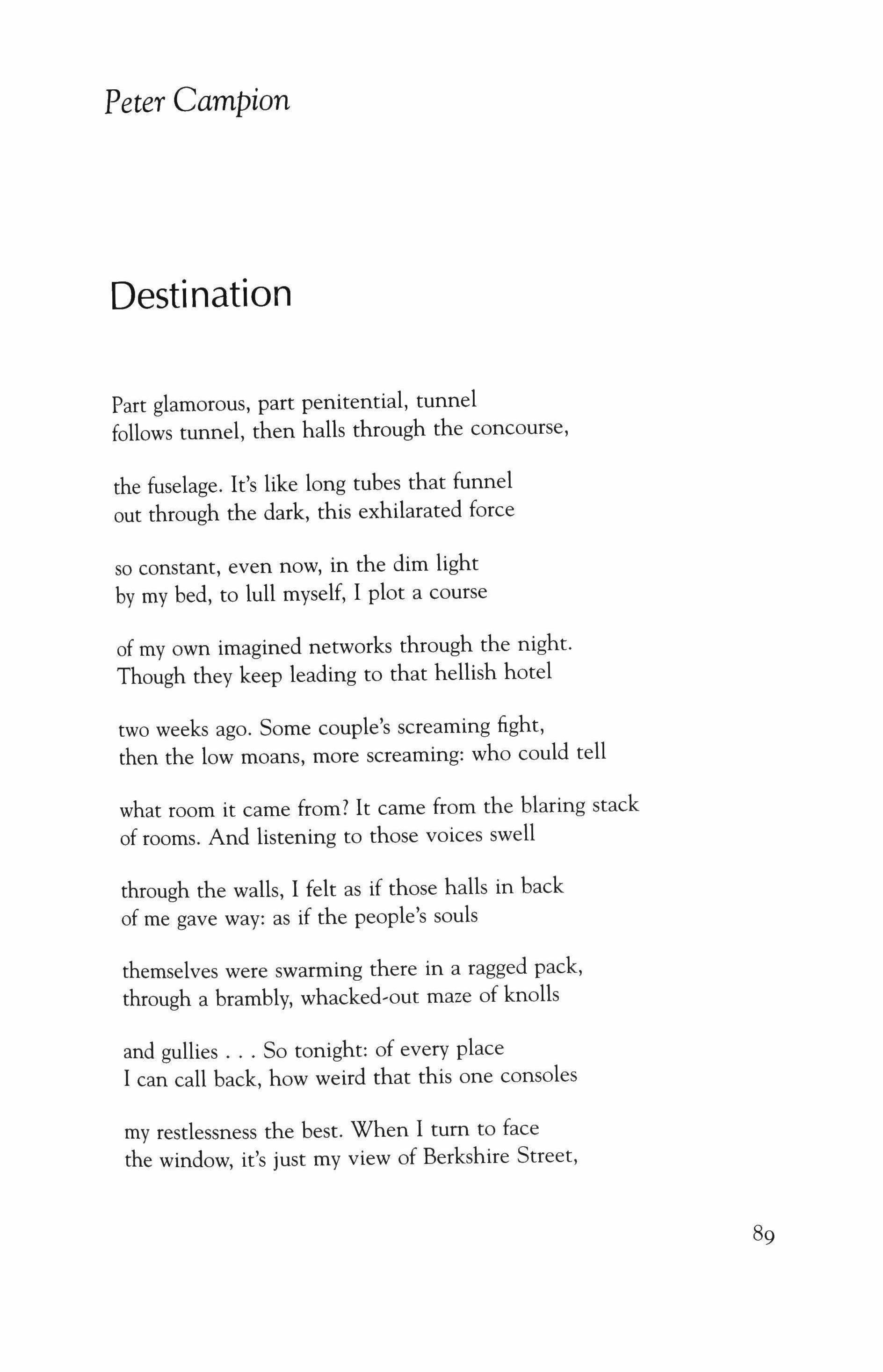
Destination
Part glamorous, part penitential, tunnel follows tunnel, then halls through the concourse, the fuselage. It's like long tubes that funnel out through the dark, this exhilarated force so constant, even now, in the dim light by my bed, to lull myself, I plot a course of my own imagined networks through the night. Though they keep leading to that hellish hotel
two weeks ago. Some couple's screaming fight, then the low moans, more screaming: who could tell what room it came from? It came from the blaring stack of rooms. And listening to those voices swell through the walls, I felt as if those halls in back of me gave way: as if the people's souls
themselves were swarming there in a ragged pack, through a brambly, whacked-out maze of knolls and gullies So tonight: of every place I can call back, how weird that this one consoles my restlessness the best. When I tum to face the window, it's just my view of Berkshire Street,
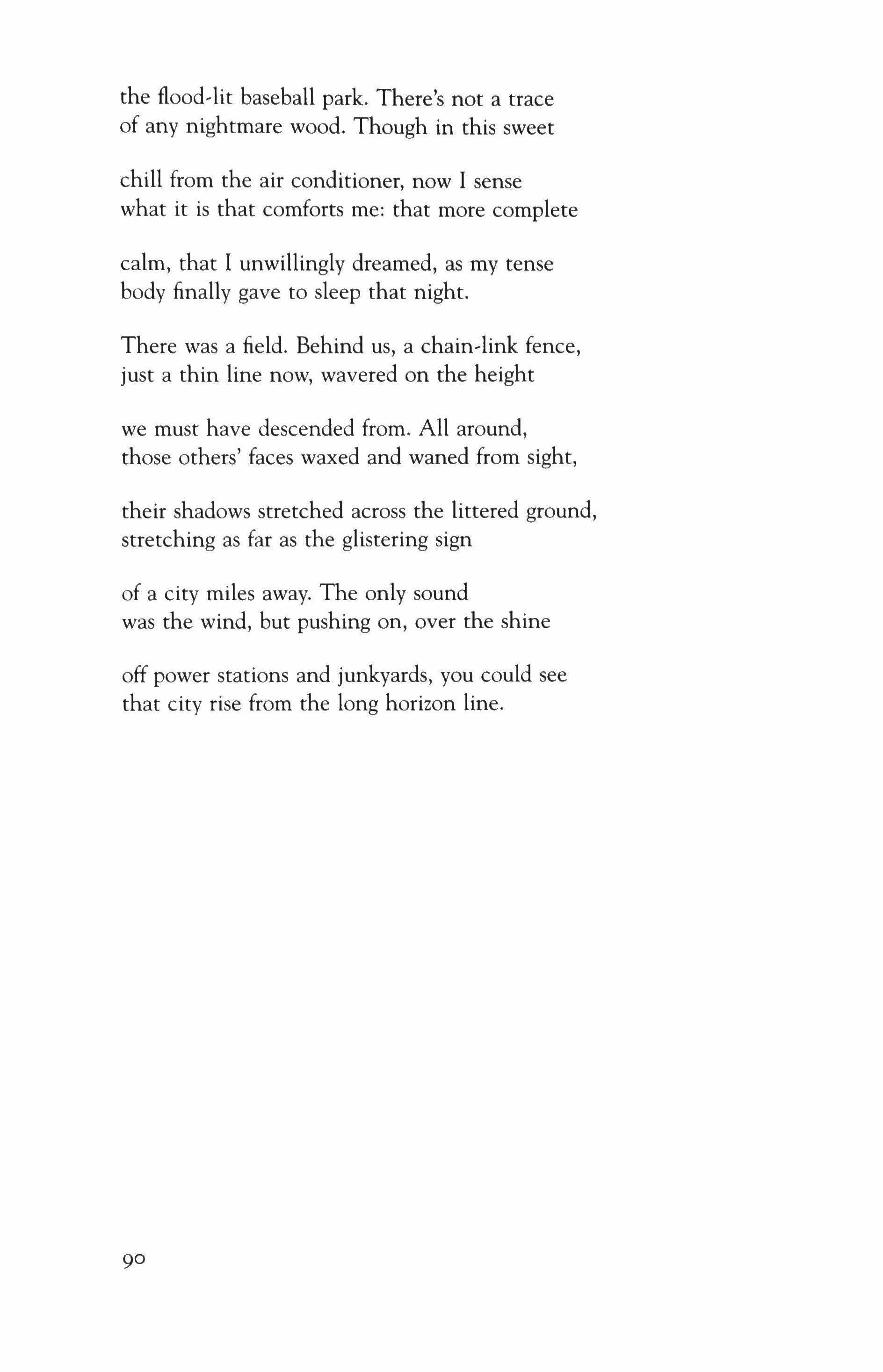
the flood,lit baseball park. There's not a trace of any nightmare wood. Though in this sweet
chill from the air conditioner, now I sense what it is that comforts me: that more complete
calm, that I unwillingly dreamed, as my tense body finally gave to sleep that night.
There was a field. Behind us, a chain,link fence, just a thin line now, wavered on the height
we must have descended from. All around, those others' faces waxed and waned from sight,
their shadows stretched across the littered ground, stretching as far as the glistering sign
of a city miles away. The only sound was the wind, but pushing on, over the shine
off power stations and junkyards, you could see that city rise from the long horizon line.
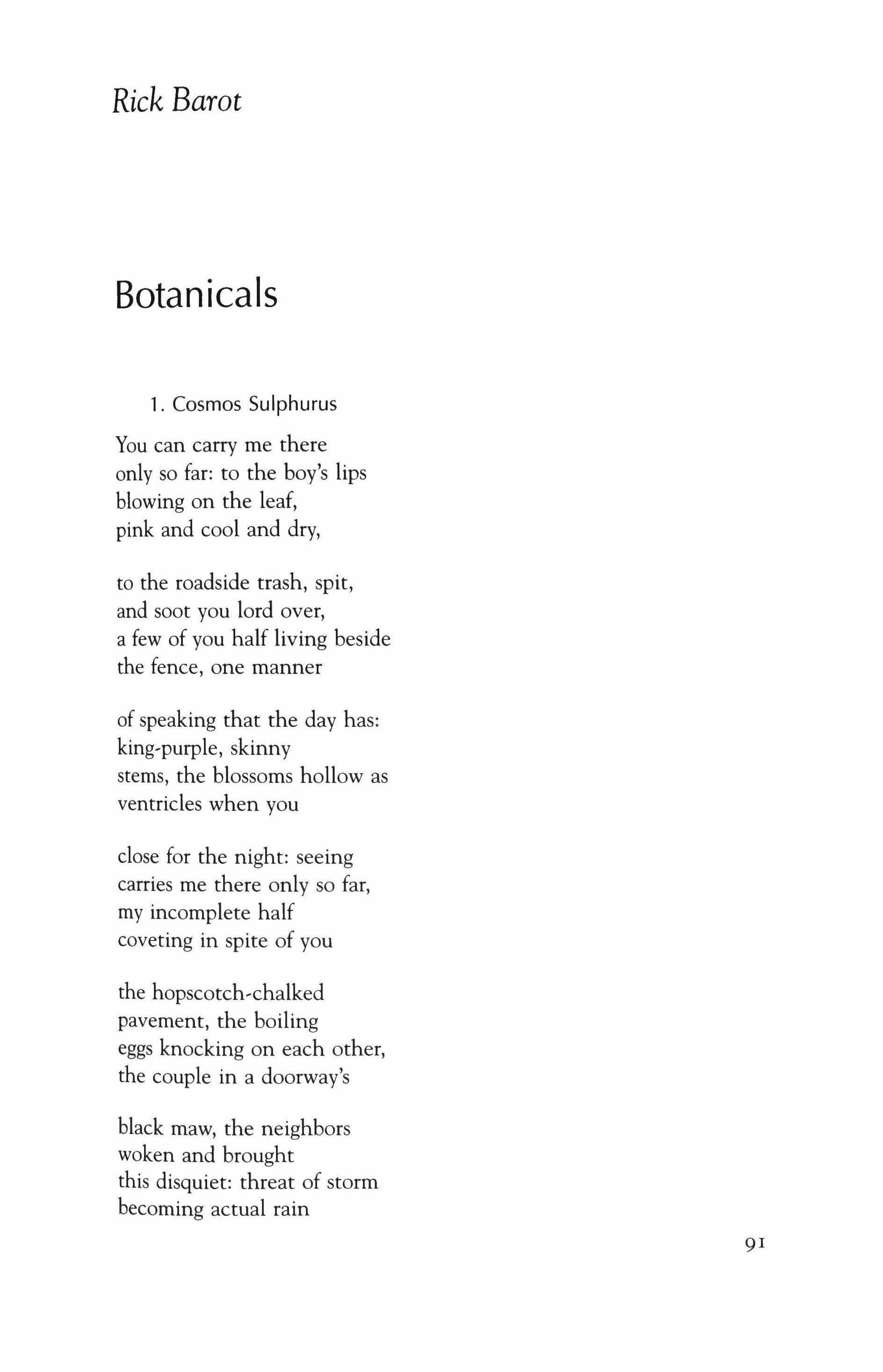
Rick Barot Botanicals
1. Cosmos Sulphurus
You can carry me there only so far: to the boy's lips blowing on the leaf, pink and cool and dry,
to the roadside trash, spit, and soot you lord over, a few of you half living beside the fence, one manner
of speaking that the day has: king-purple, skinny stems, the blossoms hollow as ventricles when you
close for the night: seeing carries me there only so far, my incomplete half coveting in spite of you the hopscotch-chalked pavement, the boiling eggs knocking on each other, the couple in a doorway's black maw, the neighbors woken and brought this disquiet: threat of storm becoming actual rain
nailing down on the sulk of you, heads inclined, made amenable, your petals already piecing into the chalk.
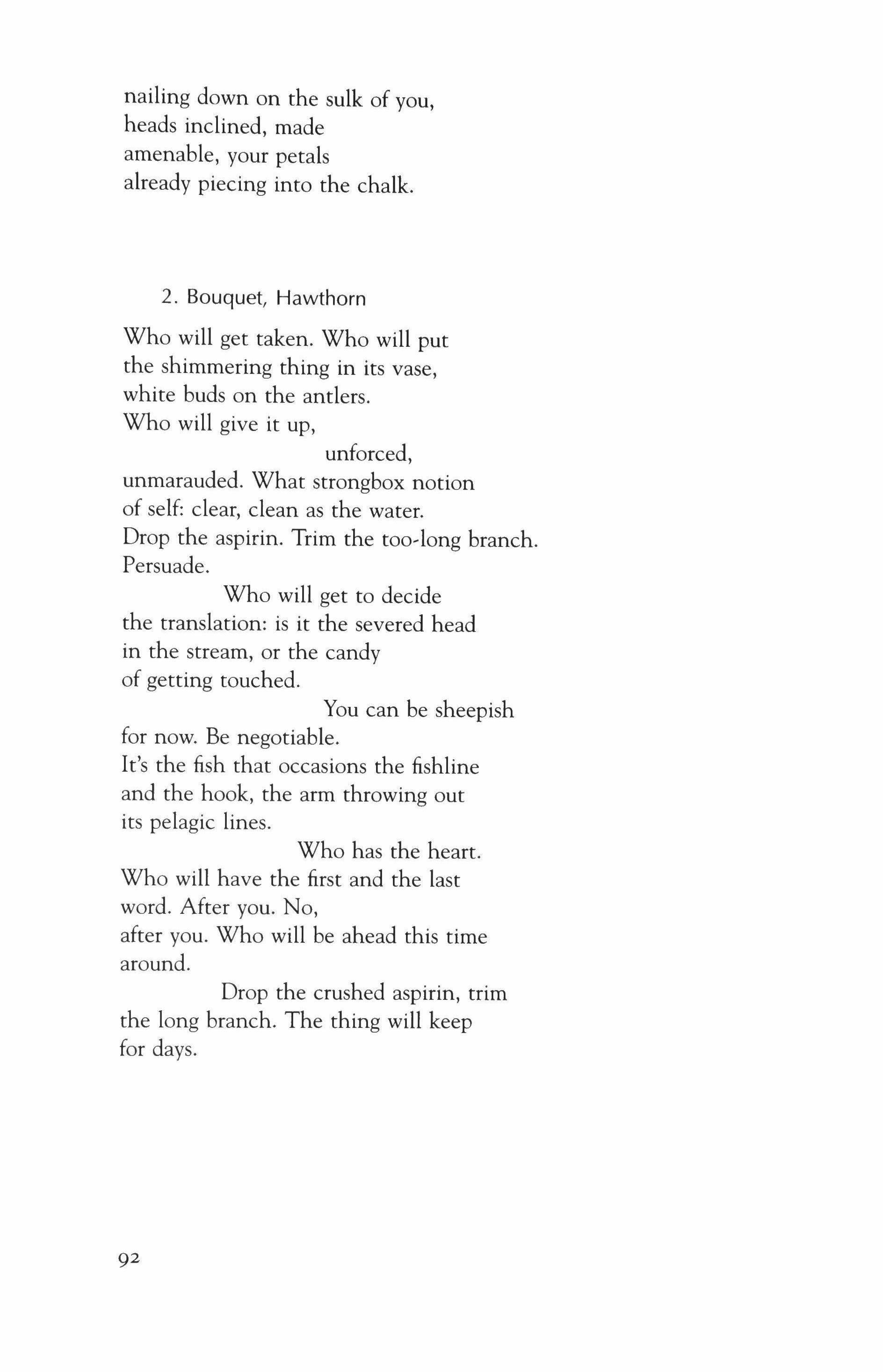
2. Bouquet, Hawthorn
Who will get taken. Who will put the shimmering thing in its vase, white buds on the antlers. Who will give it up, unforced, unmarauded. What strongbox notion of self: clear, clean as the water. Drop the aspirin. Trim the too-long branch. Persuade.
Who will get to decide the translation: is it the severed head in the stream, or the candy of getting touched.
You can be sheepish for now. Be negotiable. It's the fish that occasions the fishline and the hook, the arm throwing out its pelagic lines.
Who has the heart. Who will have the first and the last word. After you. No, after you. Who will be ahead this time around.
Drop the crushed aspirin, trim the long branch. The thing will keep for days.
92
Nancy Eimers
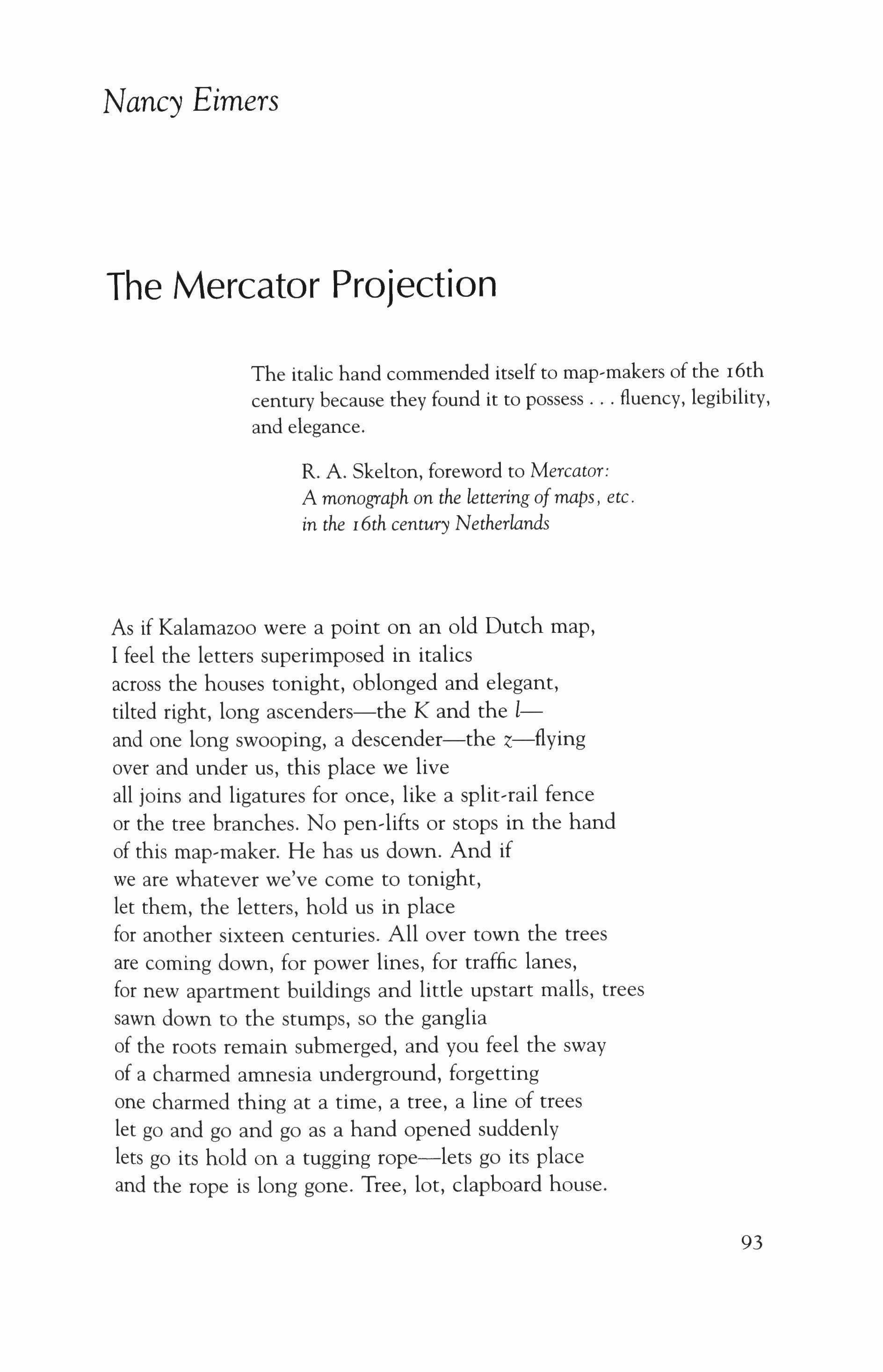
The Mercator Projection
The italic hand commended itself to map-makers of the 16th century because they found it to possess fluency, legibility, and elegance.
R. A. Skelton, foreword to Mercator: A monograph on the lettering ofmaps, etc. in the I6th century Netherlands
As if Kalamazoo were a point on an old Dutch map, I feel the letters superimposed in italics across the houses tonight, oblonged and elegant, tilted right, long ascenders-the K and the land one long swooping, a descender-the z-flying over and under us, this place we live all joins and ligatures for once, like a split-rail fence or the tree branches. No pen-lifts or stops in the hand of this map-maker. He has us down. And if we are whatever we've come to tonight, let them, the letters, hold us in place for another sixteen centuries. All over town the trees are coming down, for power lines, for traffic lanes, for new apartment buildings and little upstart malls, trees sawn down to the stumps, so the ganglia of the roots remain submerged, and you feel the sway of a charmed amnesia underground, forgetting one charmed thing at a time, a tree, a line of trees let go and go and go as a hand opened suddenly lets go its hold on a tugging rope-lets go its place and the rope is long gone. Tree, lot, clapboard house.
93
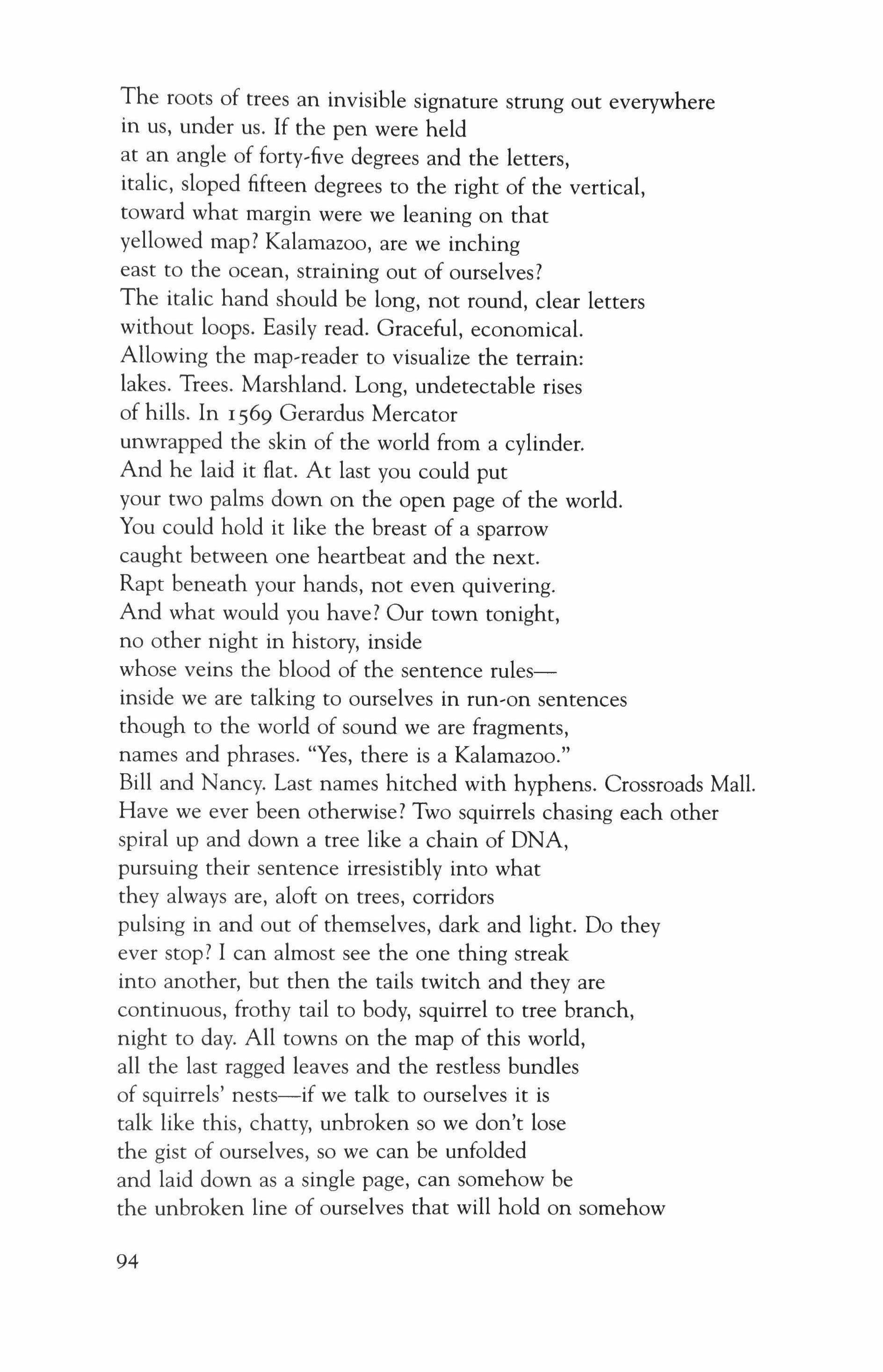
The roots of trees an invisible signature strung out everywhere in us, under us. If the pen were held at an angle of forty-five degrees and the letters, italic, sloped fifteen degrees to the right of the vertical, toward what margin were we leaning on that yellowed map? Kalamazoo, are we inching east to the ocean, straining out of ourselves? The italic hand should be long, not round, clear letters without loops. Easily read. Graceful, economical. Allowing the map-reader to visualize the terrain: lakes. Trees. Marshland. Long, undetectable rises of hills. In 1569 Gerardus Mercator unwrapped the skin of the world from a cylinder. And he laid it flat. At last you could put your two palms down on the open page of the world. You could hold it like the breast of a sparrow caught between one heartbeat and the next. Rapt beneath your hands, not even quivering. And what would you have? Our town tonight, no other night in history, inside whose veins the blood of the sentence rulesinside we are talking to ourselves in run-on sentences though to the world of sound we are fragments, names and phrases. "Yes, there is a Kalamazoo." Bill and Nancy. Last names hitched with hyphens. Crossroads Mall. Have we ever been otherwise ? Two squirrels chasing each other spiral up and down a tree like a chain of DNA, pursuing their sentence irresistibly into what they always are, aloft on trees, corridors pulsing in and out of themselves, dark and light. Do they ever stop? I can almost see the one thing streak into another, but then the tails twitch and they are continuous, frothy tail to body, squirrel to tree branch, night to day. All towns on the map of this world, all the last ragged leaves and the restless bundles of squirrels' nests-if we talk to ourselves it is talk like this, chatty, unbroken so we don't lose the gist of ourselves, so we can be unfolded and laid down as a single page, can somehow be the unbroken line of ourselves that will hold on somehow
94
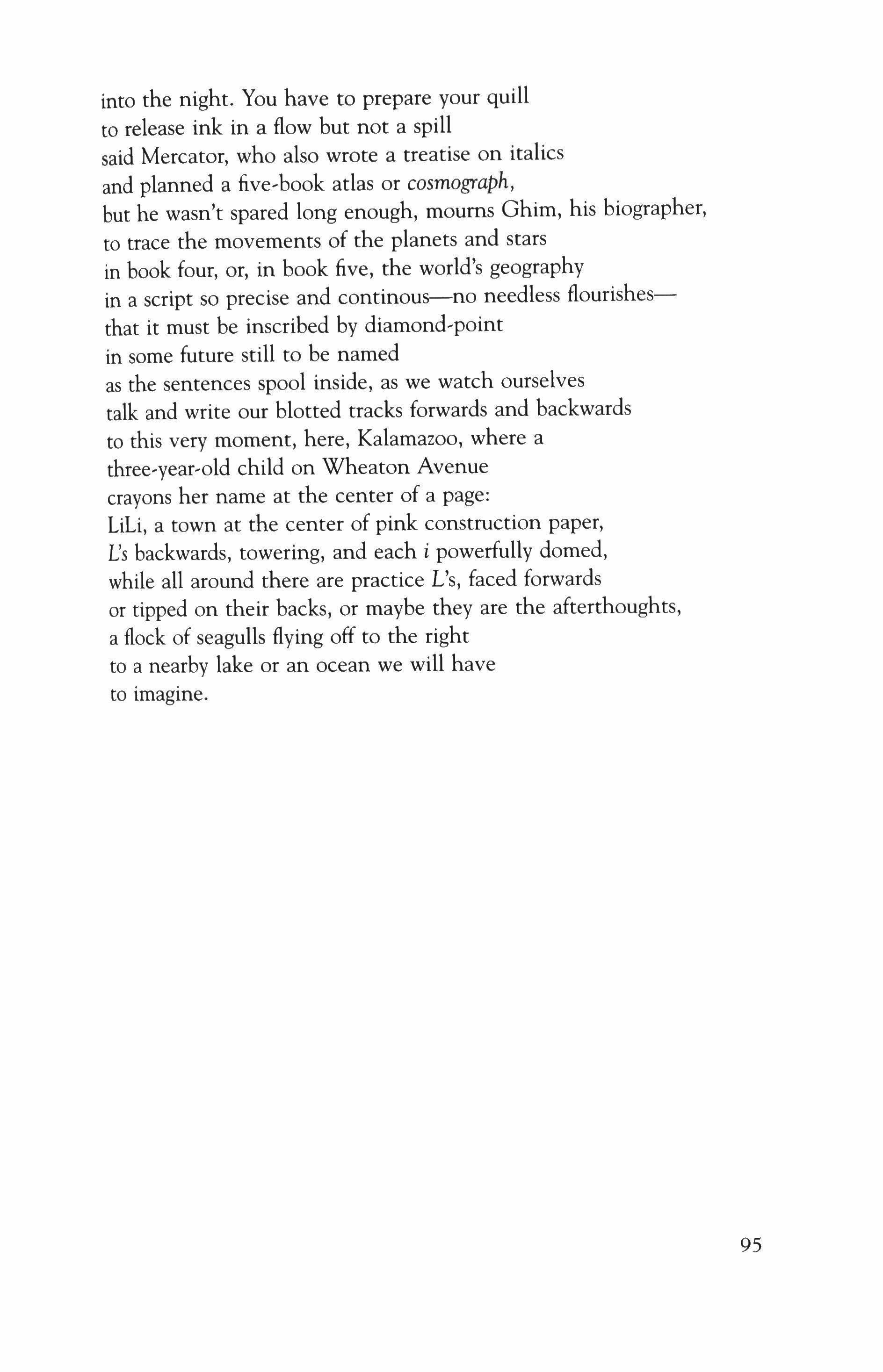
into the night. You have to prepare your quill to release ink in a flow but not a spill said Mercator, who also wrote a treatise on italics and planned a five-book atlas or cosmograph, but he wasn't spared long enough, mourns Ghim, his biographer, to trace the movements of the planets and stars in book four, or, in book five, the world's geography in a script so precise and continous-no needless flourishesthat it must be inscribed by diamond-point in some future still to be named as the sentences spool inside, as we watch ourselves talk and write our blotted tracks forwards and backwards to this very moment, here, Kalamazoo, where a three-year-old child on Wheaton Avenue crayons her name at the center of a page: Lil.i, a town at the center of pink construction paper, r;s backwards, towering, and each i powerfully domed, while all around there are practice L's, faced forwards or tipped on their backs, or maybe they are the afterthoughts, a flock of seagulls flying off to the right to a nearby lake or an ocean we will have to imagine.
95
Shower
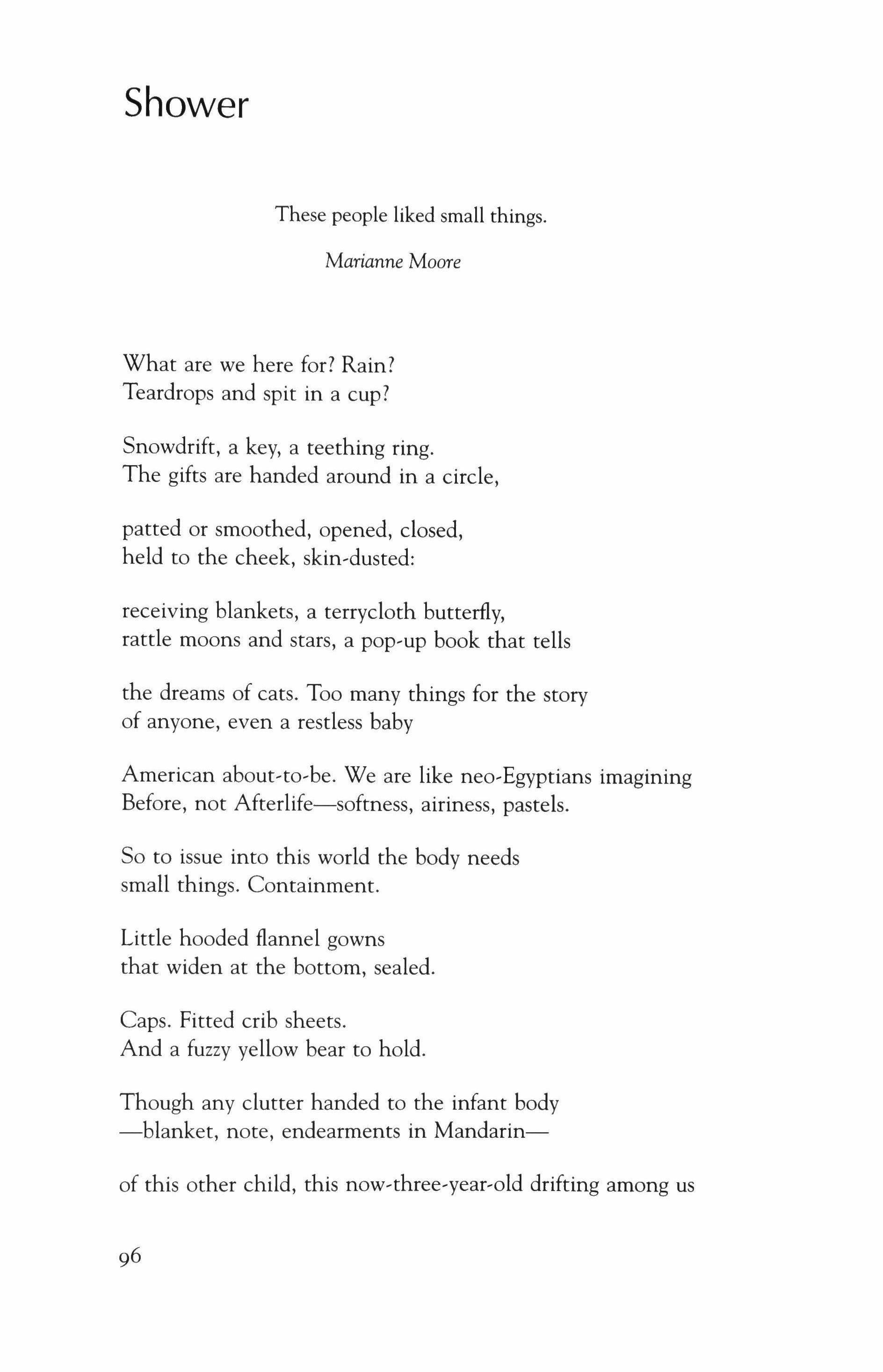
These people liked small things.
Marianne Moore
What are we here for? Rain?
Teardrops and spit in a cup?
Snowdrift, a key, a teething ring. The gifts are handed around in a circle, patted or smoothed, opened, closed, held to the cheek, skin-dusted:
receiving blankets, a terrycloth butterfly, rattle moons and stars, a pop-up book that tells the dreams of cats. Too many things for the story of anyone, even a restless baby
American about-to-be. We are like neo-Egyptians imagining Before, not Afterlife-softness, airiness, pastels.
So to issue into this world the body needs small things. Containment.
Little hooded flannel gowns that widen at the bottom, sealed.
Caps. Fitted crib sheets. And a fuzzy yellow bear to hold.
Though any clutter handed to the infant body -blanket, note, endearments in Mandarinof this other child, this now-three-year-old drifting among us
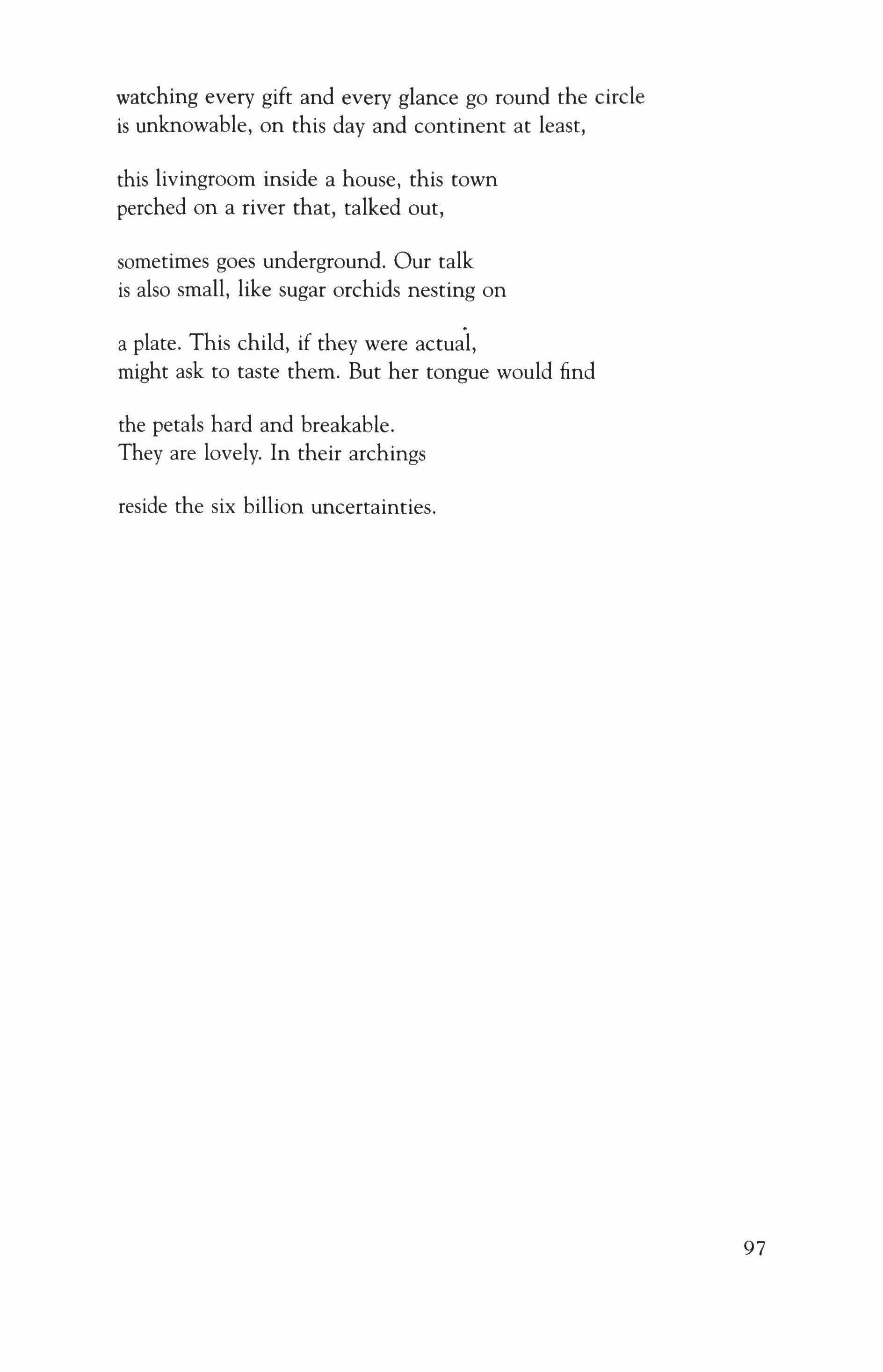
watching every gift and every glance go round the circle is unknowable, on this day and continent at least, this livingroom inside a house, this town perched on a river that, talked out, sometimes goes underground. Our talk is also small, like sugar orchids nesting on a plate. This child, if they were actual, might ask to taste them. But her tongue would find the petals hard and breakable. They are lovely. In their archings reside the six billion uncertainties.
97
C. Dale Young
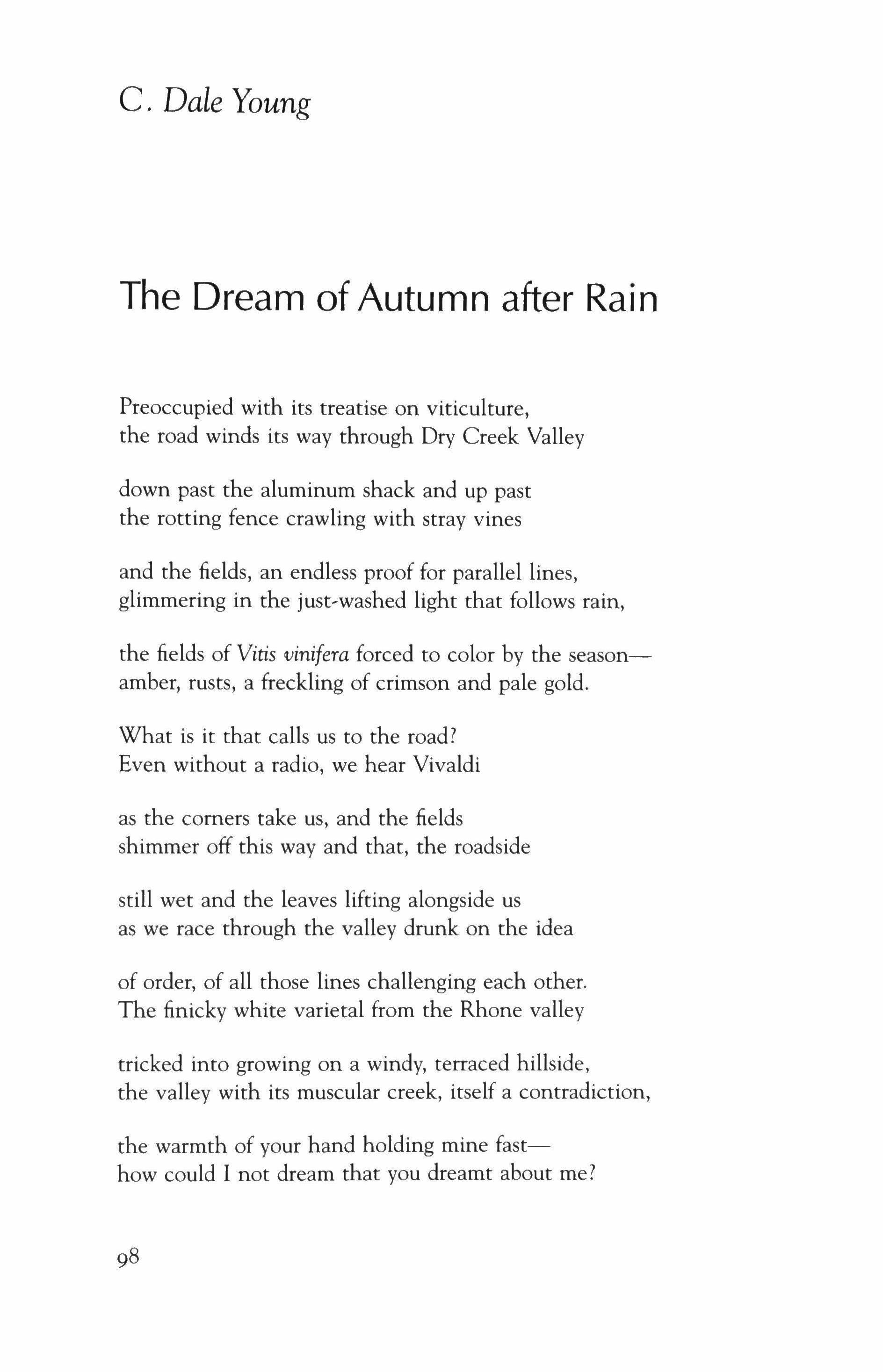
The Dream of Autumn after Rain
Preoccupied with its treatise on viticulture, the road winds its way through Dry Creek Valley
down past the aluminum shack and up past the rotting fence crawling with stray vines
and the fields, an endless proof for parallel lines, glimmering in the just-washed light that follows rain, the fields of Vitis vinifera forced to color by the seasonamber, rusts, a freckling of crimson and pale gold.
What is it that calls us to the road?
Even without a radio, we hear Vivaldi
as the comers take us, and the fields shimmer off this way and that, the roadside
still wet and the leaves lifting alongside us as we race through the valley drunk on the idea
of order, of all those lines challenging each other. The finicky white varietal from the Rhone valley
tricked into growing on a windy, terraced hillside, the valley with its muscular creek, itself a contradiction, the warmth of your hand holding mine fasthow could I not dream that you dreamt about me?
Beside the Unnamed Lake
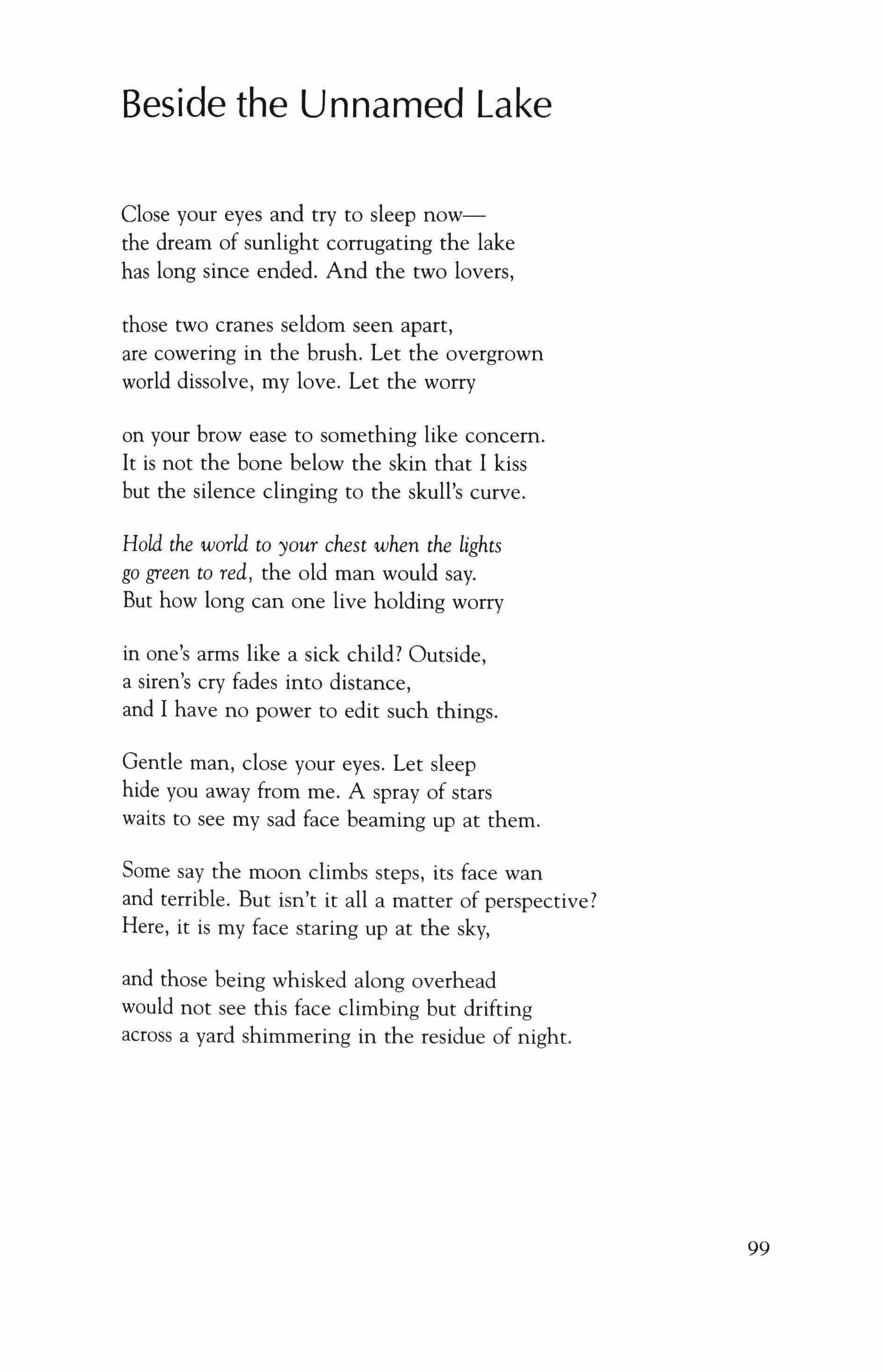
Close your eyes and try to sleep nowthe dream of sunlight corrugating the lake has long since ended. And the two lovers, those two cranes seldom seen apart, are cowering in the brush. Let the overgrown world dissolve, my love. Let the worry
on your brow ease to something like concern. It is not the bone below the skin that I kiss but the silence clinging to the skull's curve.
Hold the world to your chest when the lights go green to red, the old man would say. But how long can one live holding worry
in one's arms like a sick child? Outside, a siren's cry fades into distance, and I have no power to edit such things.
Gentle man, close your eyes. Let sleep hide you away from me. A spray of stars waits to see my sad face beaming up at them.
Some say the moon climbs steps, its face wan and terrible. But isn't it all a matter of perspective? Here, it is my face staring up at the sky, and those being whisked along overhead would not see this face climbing but drifting across a yard shimmering in the residue of night.
99
33rd & Kirkham
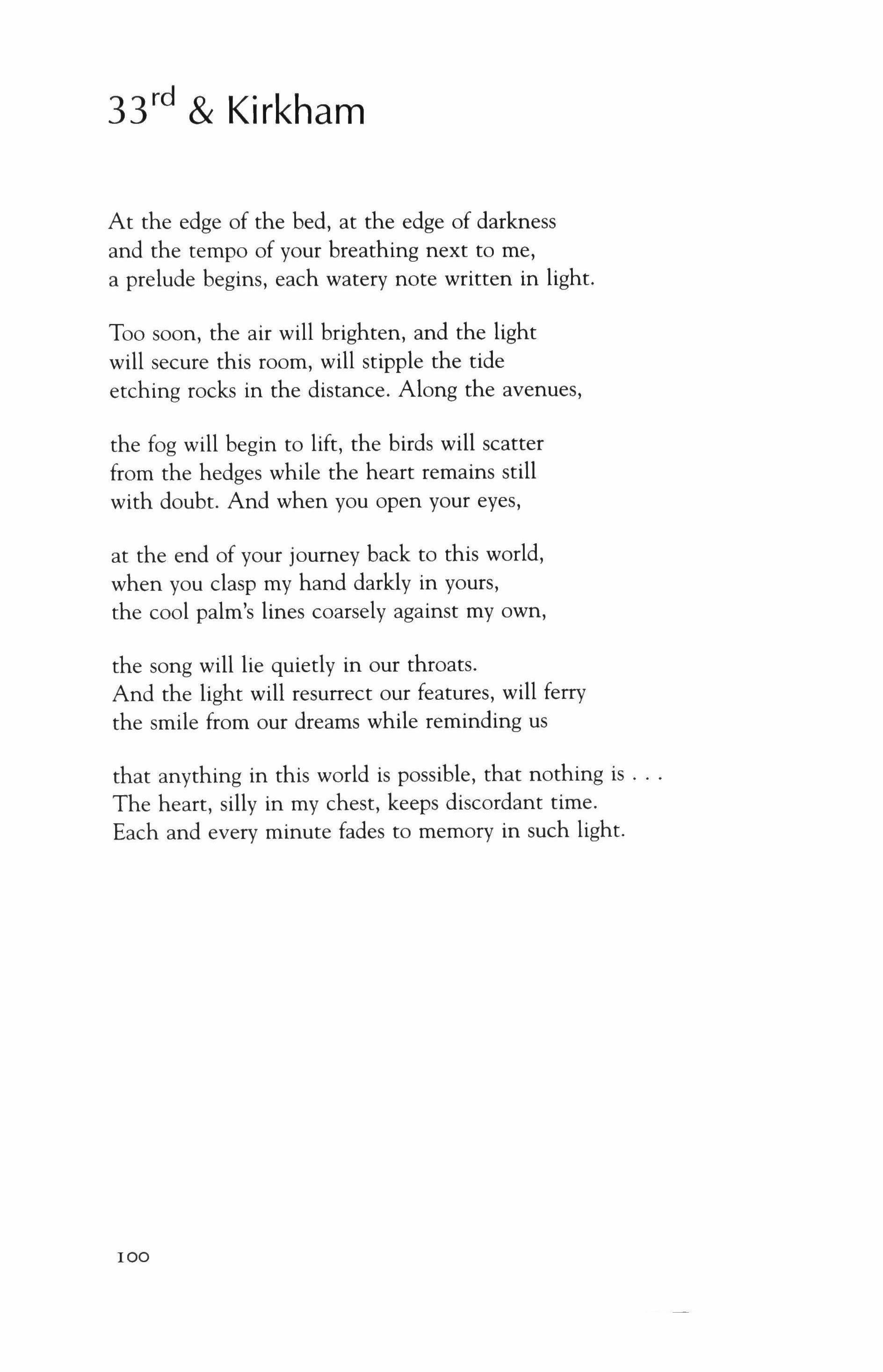
At the edge of the bed, at the edge of darkness and the tempo of your breathing next to me, a prelude begins, each watery note written in light.
Too soon, the air will brighten, and the light will secure this room, will stipple the tide etching rocks in the distance. Along the avenues, the fog will begin to lift, the birds will scatter from the hedges while the heart remains still with doubt. And when you open your eyes, at the end of your journey back to this world, when you clasp my hand darkly in yours, the cool palm's lines coarsely against my own, the song will lie quietly in our throats. And the light will resurrect our features, will ferry the smile from our dreams while reminding us
that anything in this world is possible, that nothing is The heart, silly in my chest, keeps discordant time. Each and every minute fades to memory in such light.
100
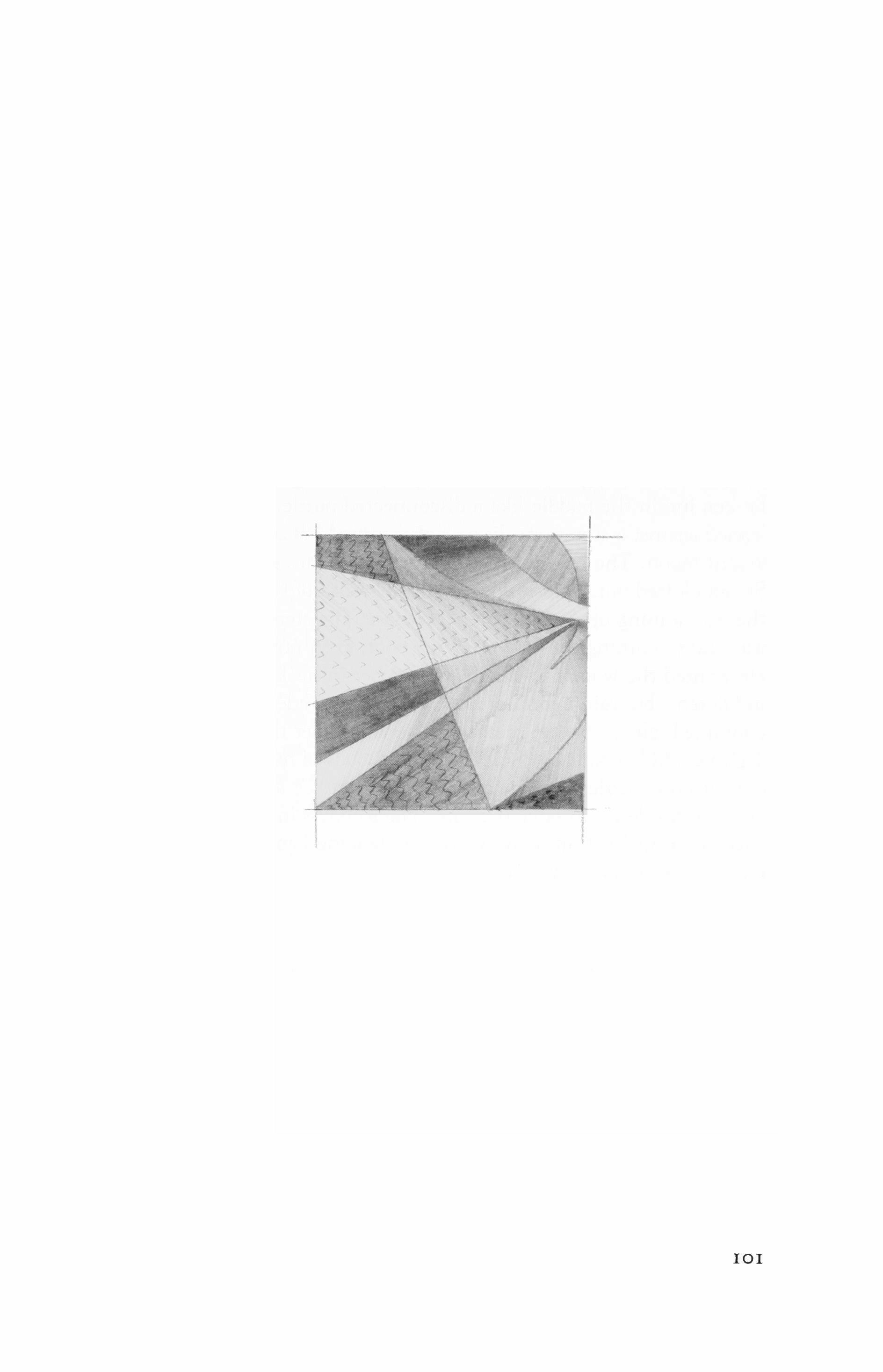
101
George Kalamaras
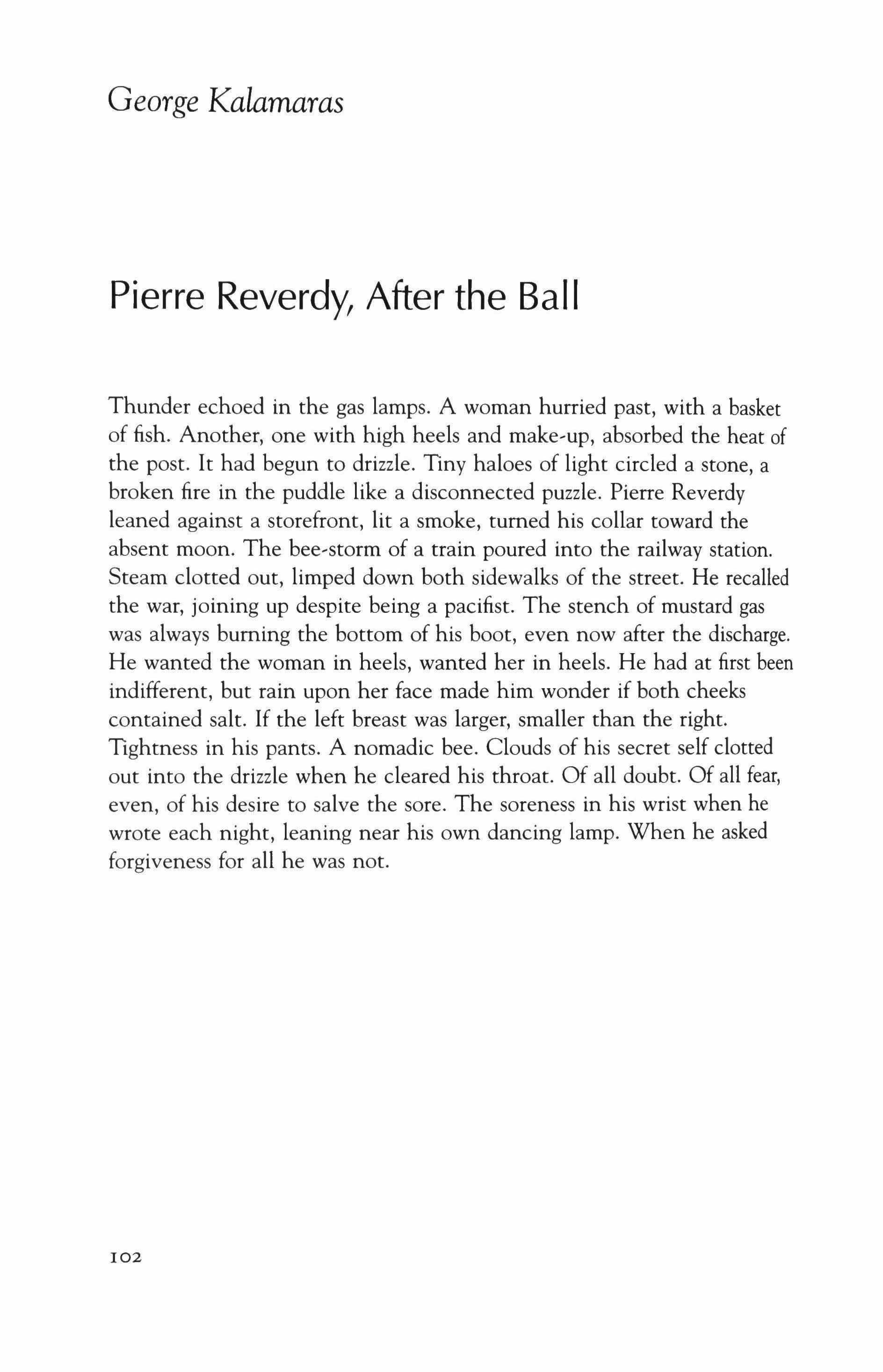
Pierre Reverdy, After the Ball
Thunder echoed in the gas lamps. A woman hurried past, with a basket of fish. Another, one with high heels and make-up, absorbed the heat of the post. It had begun to drizzle. Tiny haloes of light circled a stone, a broken fire in the puddle like a disconnected puzzle. Pierre Reverdy leaned against a storefront, lit a smoke, turned his collar toward the absent moon. The bee'storm of a train poured into the railway station. Steam clotted out, limped down both sidewalks of the street. He recalled the war, joining up despite being a pacifist. The stench of mustard gas was always burning the bottom of his boot, even now after the discharge. He wanted the woman in heels, wanted her in heels. He had at first been indifferent, but rain upon her face made him wonder if both cheeks contained salt. If the left breast was larger, smaller than the right. Tightness in his pants. A nomadic bee. Clouds of his secret self clotted out into the drizzle when he cleared his throat. Of all doubt. Of all fear, even, of his desire to salve the sore. The soreness in his wrist when he wrote each night, leaning near his own dancing lamp. When he asked forgiveness for all he was not.
102
Molly McQuade
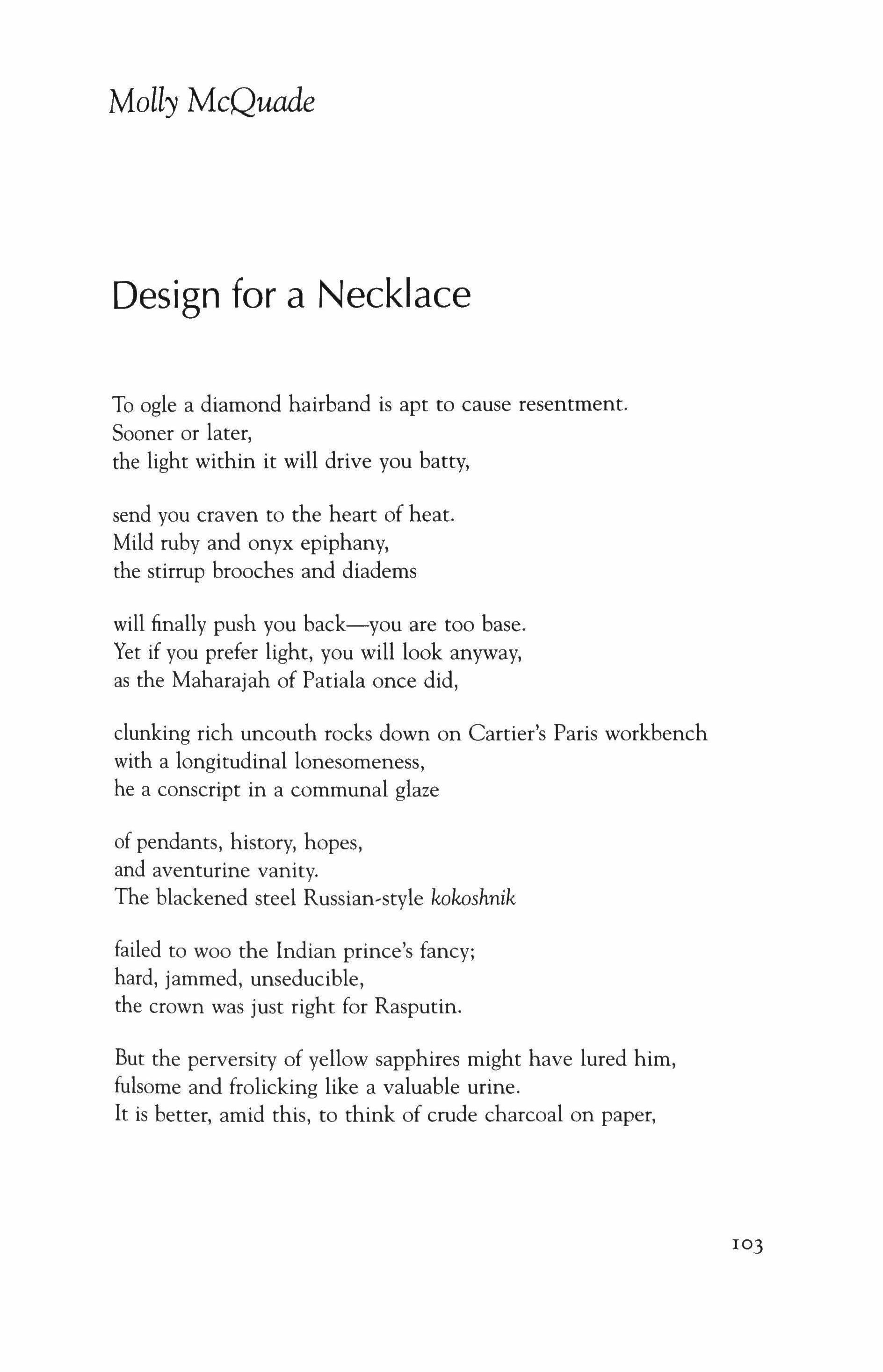
Design for a Necklace
To ogle a diamond hairband is apt to cause resentment. Sooner or later, the light within it will drive you batty, send you craven to the heart of heat. Mild ruby and onyx epiphany, the stirrup brooches and diadems will finally push you back-you are too base. Yet if you prefer light, you will look anyway, as the Maharajah of Patiala once did,
clunking rich uncouth rocks down on Cartier's Paris workbench with a longitudinal lonesomeness, he a conscript in a communal glaze of pendants, history, hopes, and aventurine vanity. The blackened steel Russian-style kokoshnik failed to woo the Indian prince's fancy; hard, jammed, unseducible, the crown was just right for Rasputin.
But the perversity of yellow sapphires might have lured him, fulsome and frolicking like a valuable urine. It is better, amid this, to think of crude charcoal on paper,
103
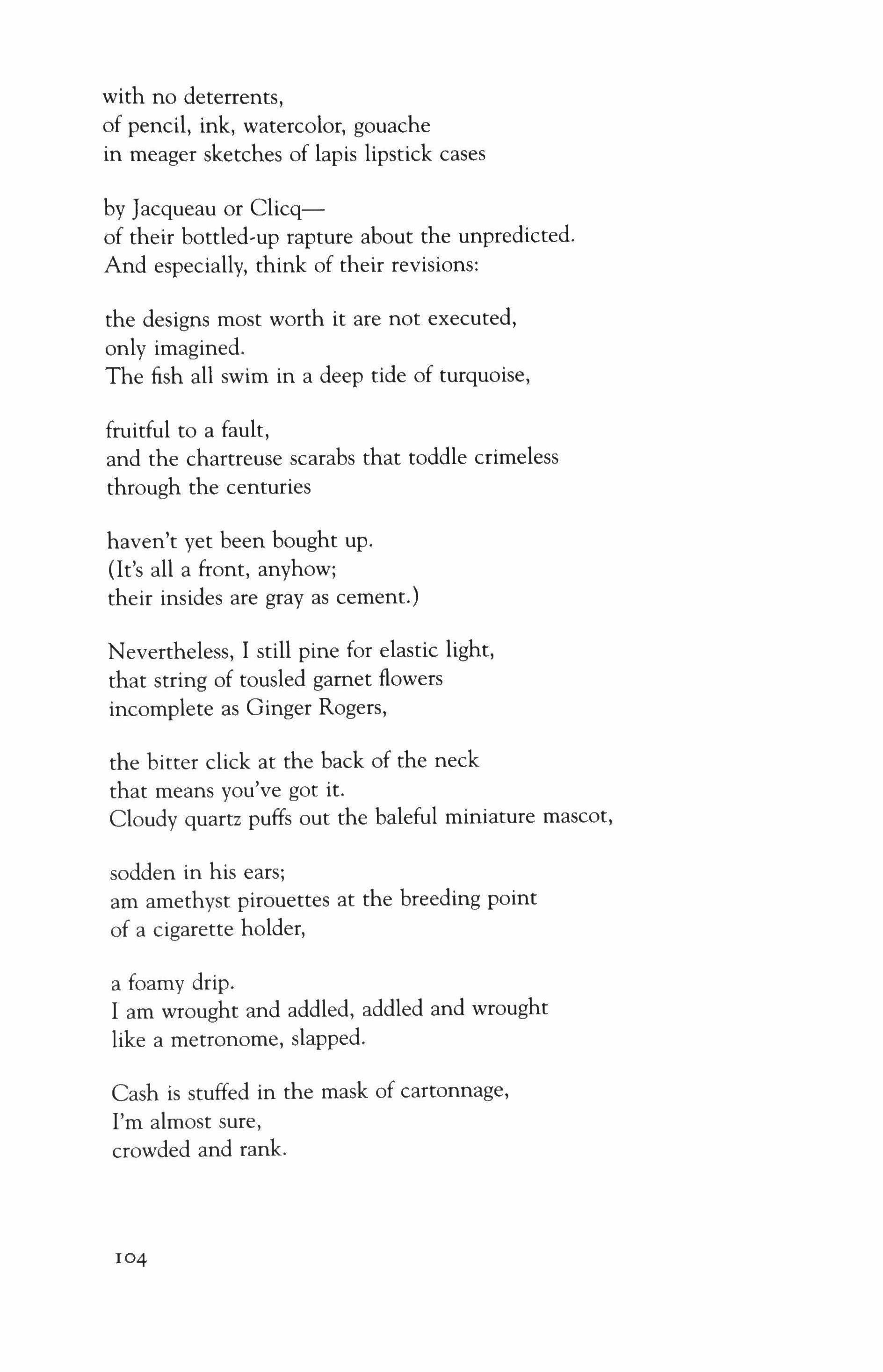
with no deterrents, of pencil, ink, watercolor, gouache in meager sketches of lapis lipstick cases by Jacqueau or Clicqof their bottled-up rapture about the unpredicted. And especially, think of their revisions: the designs most worth it are not executed, only imagined. The fish all swim in a deep tide of turquoise, fruitful to a fault, and the chartreuse scarabs that toddle crimeless through the centuries haven't yet been bought up. (It's all a front, anyhow; their insides are gray as cement.)
Nevertheless, I still pine for elastic light, that string of tousled garnet flowers incomplete as Ginger Rogers, the bitter click at the back of the neck that means you've got it.
Cloudy quartz puffs out the baleful miniature mascot, sodden in his ears; am amethyst pirouettes at the breeding point of a cigarette holder, a foamy drip.
I am wrought and addled, addled and wrought like a metronome, slapped.
Cash is stuffed in the mask of cartonnage, I'm almost sure, crowded and rank.
104
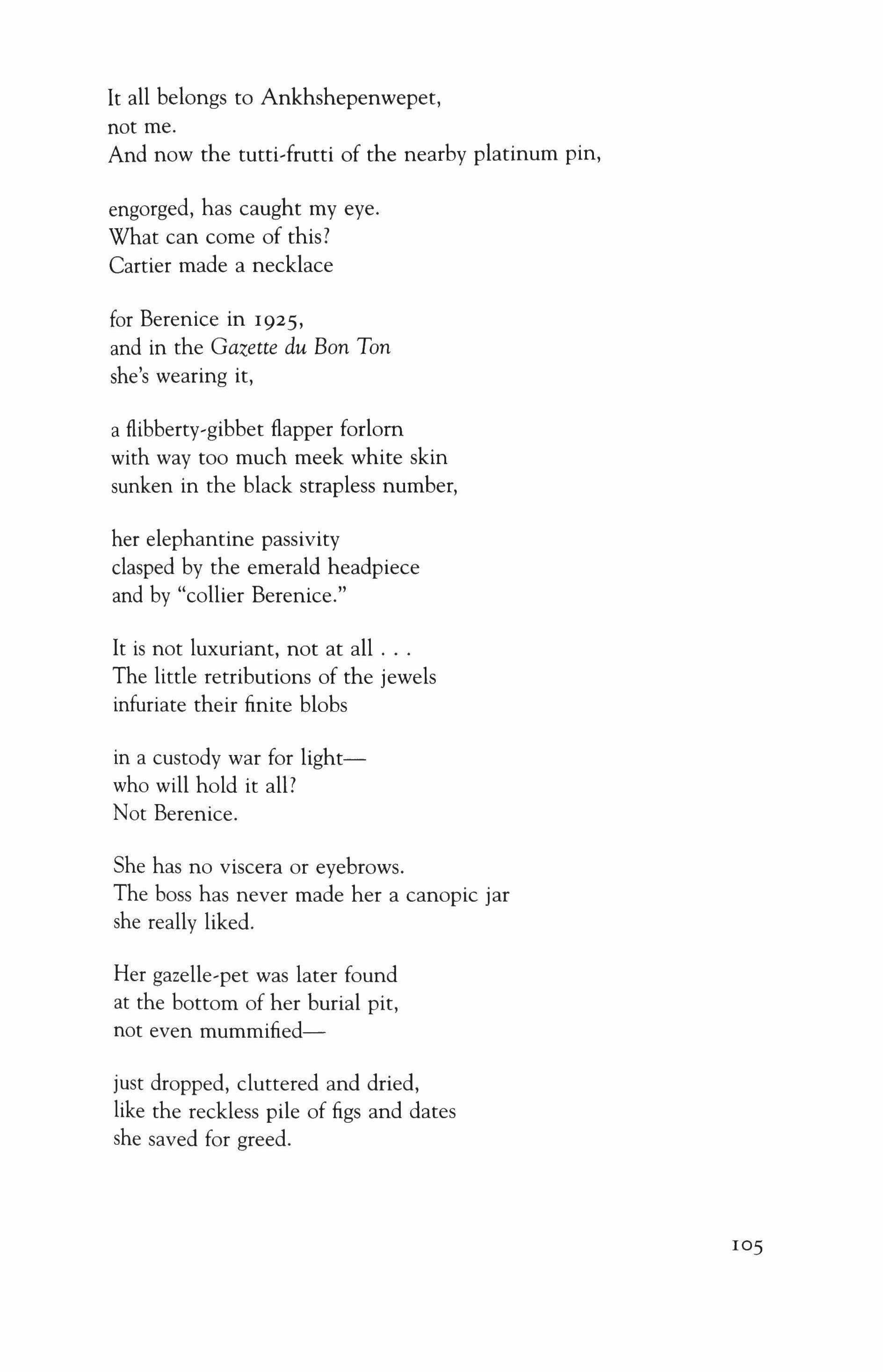
It all belongs to Ankhshepenwepet, not me.
And now the tutti-frutti of the nearby platinum pin, engorged, has caught my eye. What can come of this?
Cartier made a necklace for Berenice in 1925, and in the Gazette du Bon Ton she's wearing it, a flibberty-gibbet flapper forlorn with way too much meek white skin sunken in the black strapless number, her elephantine passivity clasped by the emerald headpiece and by "collier Berenice."
It is not luxuriant, not at all The little retributions of the jewels infuriate their finite blobs
in a custody war for lightwho will hold it all? Not Berenice.
She has no viscera or eyebrows. The boss has never made her a canopic jar she really liked.
Her gazelle-pet was later found at the bottom of her burial pit, not even mummifiedjust dropped, cluttered and dried, like the reckless pile of figs and dates she saved for greed.
105
Judith Valente Green
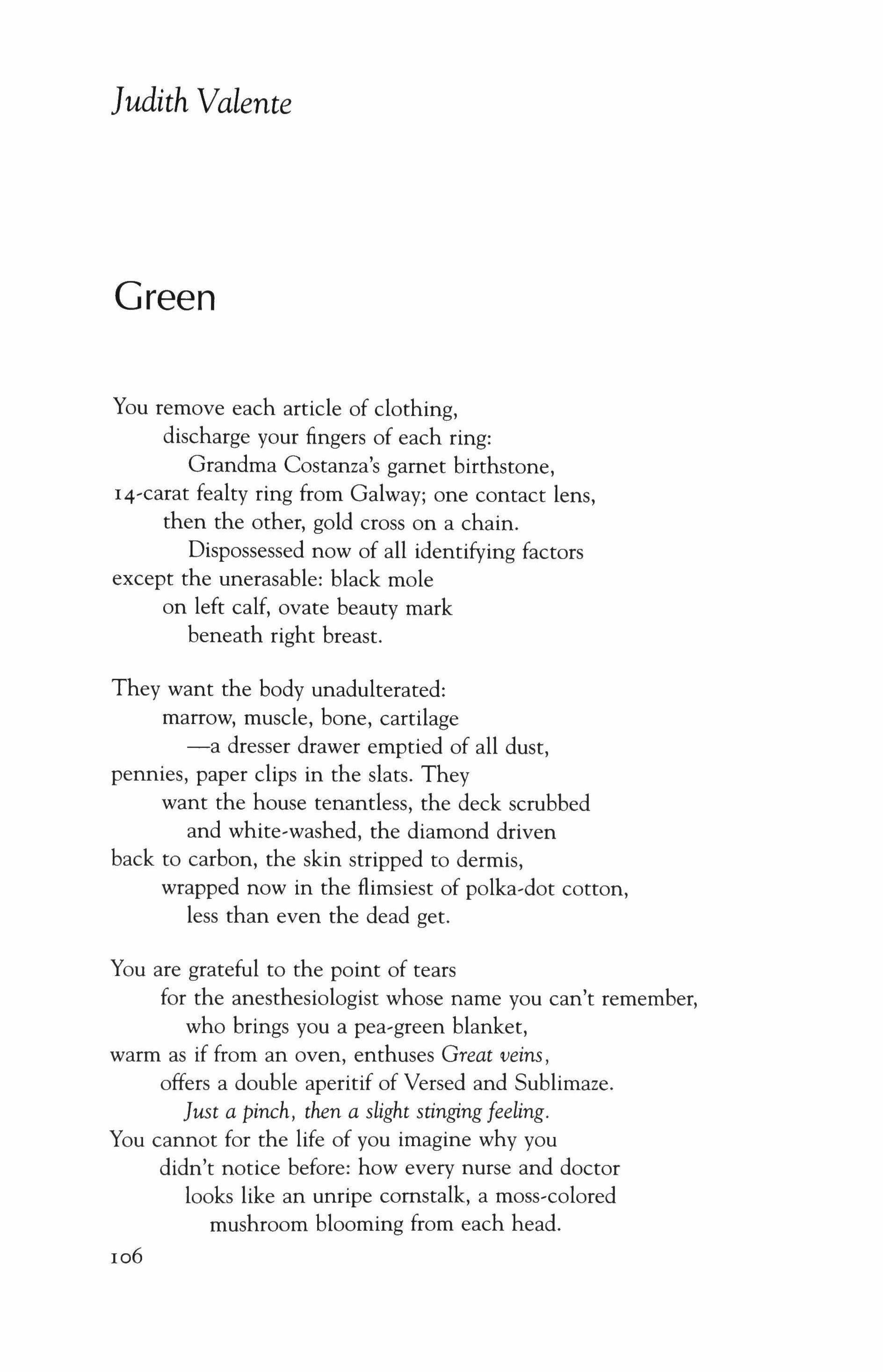
You remove each article of clothing, discharge your fingers of each ring: Grandma Costanza's garnet birthstone, r a-carat fealty ring from Galway; one contact lens, then the other, gold cross on a chain.
Dispossessed now of all identifying factors except the unerasable: black mole on left calf, ovate beauty mark beneath right breast.
They want the body unadulterated: marrow, muscle, bone, cartilage -a dresser drawer emptied of all dust, pennies, paper clips in the slats. They want the house tenantless, the deck scrubbed and white-washed, the diamond driven back to carbon, the skin stripped to dermis, wrapped now in the flimsiest of polka-dot cotton, less than even the dead get.
You are grateful to the point of tears for the anesthesiologist whose name you can't remember, who brings you a pea-green blanket, warm as if from an oven, enthuses Great veins, offers a double aperitif of Versed and Sublimaze. Just a pinch, then a slight stinging feeling. You cannot for the life of you imagine why you didn't notice before: how every nurse and doctor looks like an unripe cornstalk, a moss-colored mushroom blooming from each head.
106
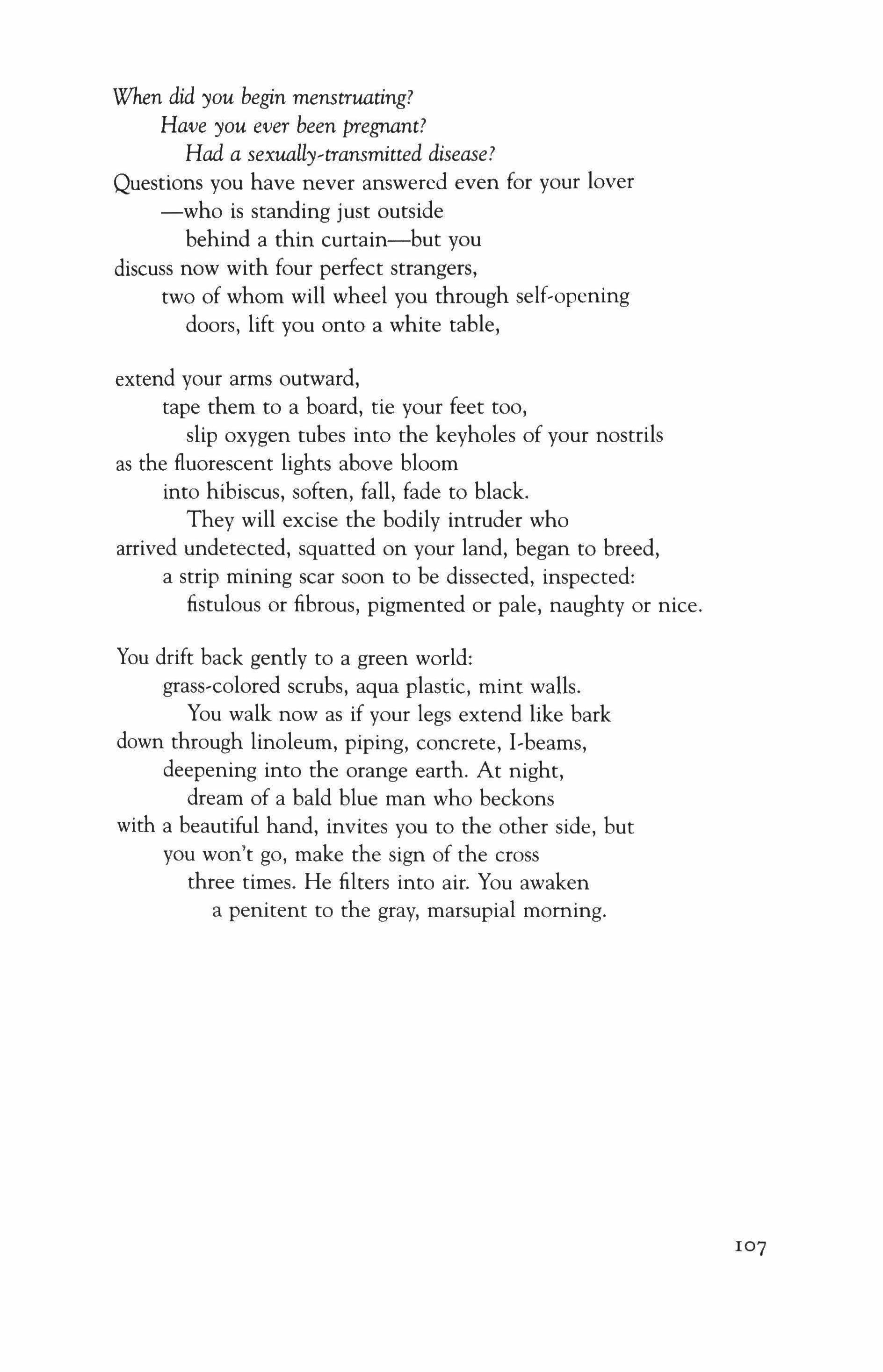
When did you begin menstruating?
Have you ever been pregnant? Had a sexually,transmitted disease? Questions you have never answered even for your lover -who is standing just outside behind a thin curtain-but you discuss now with four perfect strangers, two of whom will wheel you through self-opening doors, lift you onto a white table,
extend your arms outward, tape them to a board, tie your feet too, slip oxygen tubes into the keyholes of your nostrils as the fluorescent lights above bloom into hibiscus, soften, fall, fade to black. They will excise the bodily intruder who arrived undetected, squatted on your land, began to breed, a strip mining scar soon to be dissected, inspected: fistulous or fibrous, pigmented or pale, naughty or nice.
You drift back gently to a green world: grass-colored scrubs, aqua plastic, mint walls. You walk now as if your legs extend like bark down through linoleum, piping, concrete, l-beams, deepening into the orange earth. At night, dream of a bald blue man who beckons with a beautiful hand, invites you to the other side, but you won't go, make the sign of the cross three times. He filters into air. You awaken a penitent to the gray, marsupial morning.
107
Faces of the Madonna
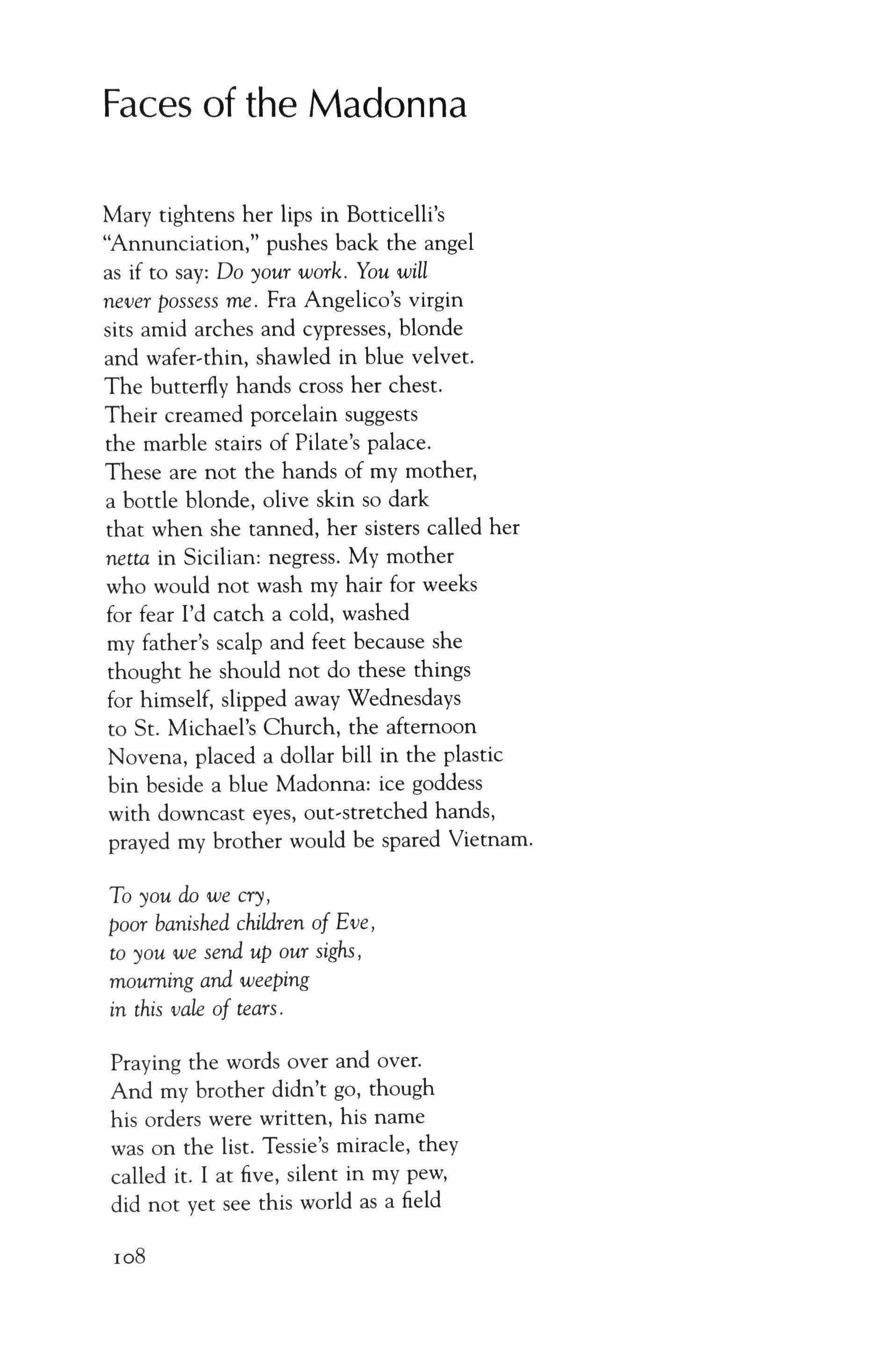
Mary tightens her lips in Botticelli's "Annunciation," pushes back the angel as if to say: Do your work. You will never possess me. Fra Angelico's virgin sits amid arches and cypresses, blonde and wafer-thin, shawled in blue velvet. The butterfly hands cross her chest. Their creamed porcelain suggests the marble stairs of Pilate's palace. These are not the hands of my mother, a bottle blonde, olive skin so dark that when she tanned, her sisters called her netta in Sicilian: negress. My mother who would not wash my hair for weeks for fear I'd catch a cold, washed my father's scalp and feet because she thought he should not do these things for himself, slipped away Wednesdays to St. Michael's Church, the afternoon Novena, placed a dollar bill in the plastic bin beside a blue Madonna: ice goddess with downcast eyes, out-stretched hands, prayed my brother would be spared Vietnam.
To you do we cry, poor banished children of Eve, to you we send up our sighs, mourning and weeping in this vale of tears.
Praying the words over and over. And my brother didn't go, though his orders were written, his name was on the list. Tessie's miracle, they called it. I at five, silent in my pew, did not yet see this world as a field
108
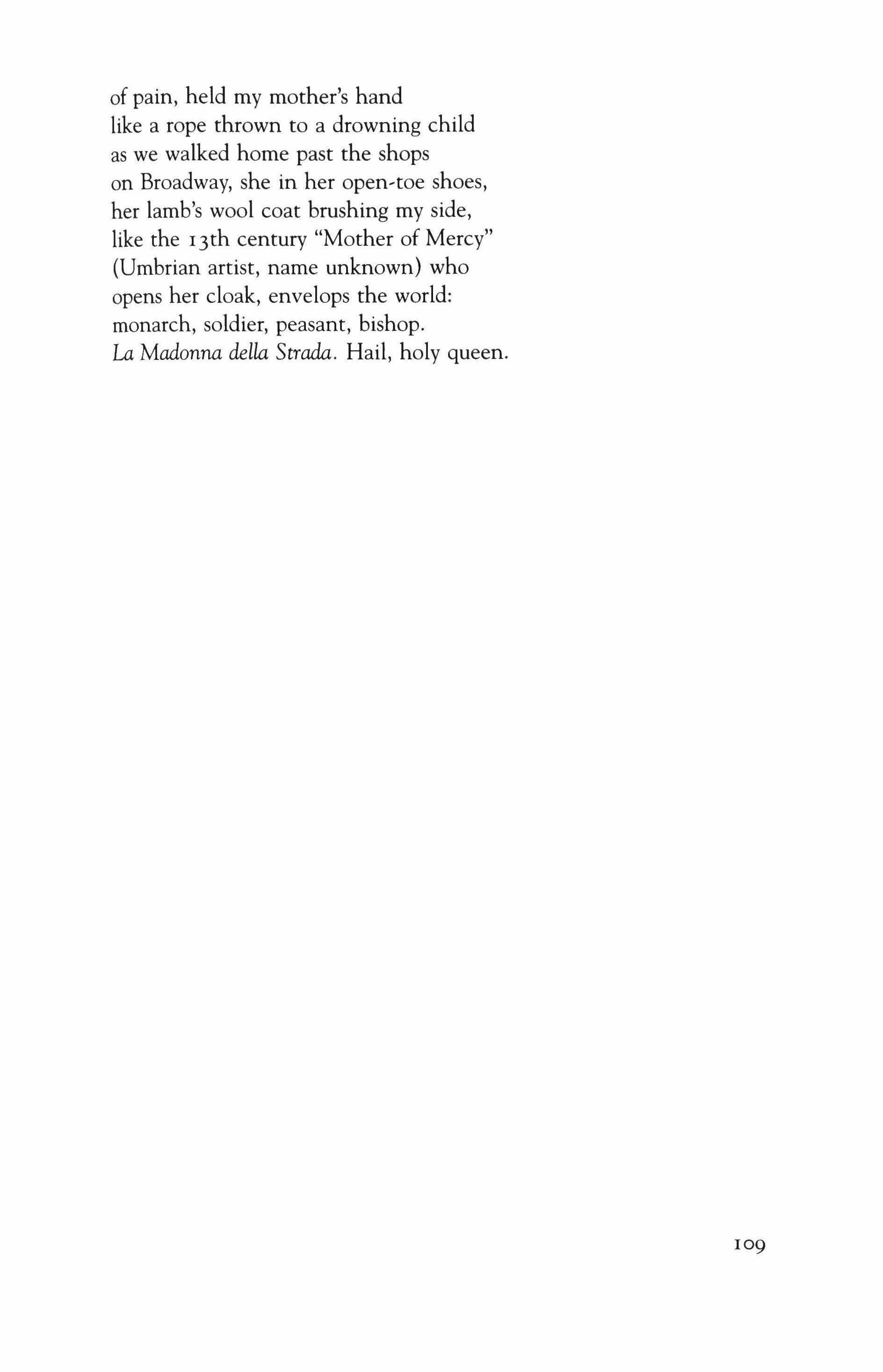
of pain, held my mother's hand like a rope thrown to a drowning child as we walked home past the shops on Broadway, she in her open-toe shoes, her lamb's wool coat brushing my side, like the r jth century "Mother of Mercy" (Umbrian artist, name unknown) who opens her cloak, envelops the world: monarch, soldier, peasant, bishop. La Madonna della Strada. Hail, holy queen.
109
Winter Journal
The willow sees the heron's image upside down. Basha
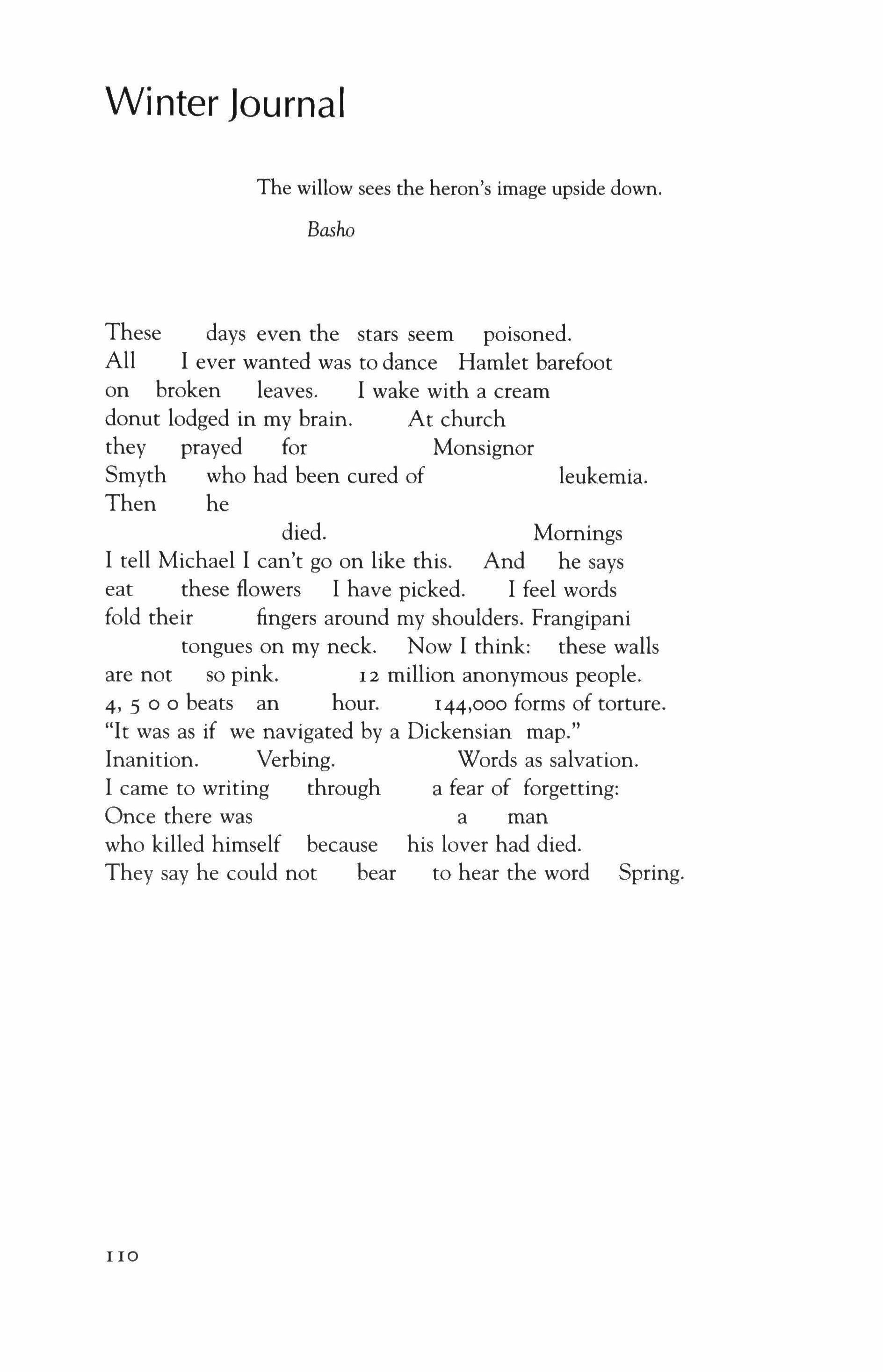
These days even the stars seem poisoned. All I ever wanted was to dance Hamlet barefoot on broken leaves. I wake with a cream donut lodged in my brain. At church they prayed for Monsignor Smyth who had been cured of leukemia. Then he died.
Mornings
I tell Michael I can't go on like this. And he says eat these flowers I have picked. I feel words fold their fingers around my shoulders. Frangipani tongues on my neck. Now I think: these walls are not so pink. 12 million anonymous people. 4, 5 00 beats an hour. 144,000 forms of torture. "It was as if we navigated by a Dickensian map." Inanition. Verbing. Words as salvation. I came to writing through a fear of forgetting: Once there was a man who killed himself because his lover had died. They say he could not bear to hear the word Spring.
110
Alan Williamson
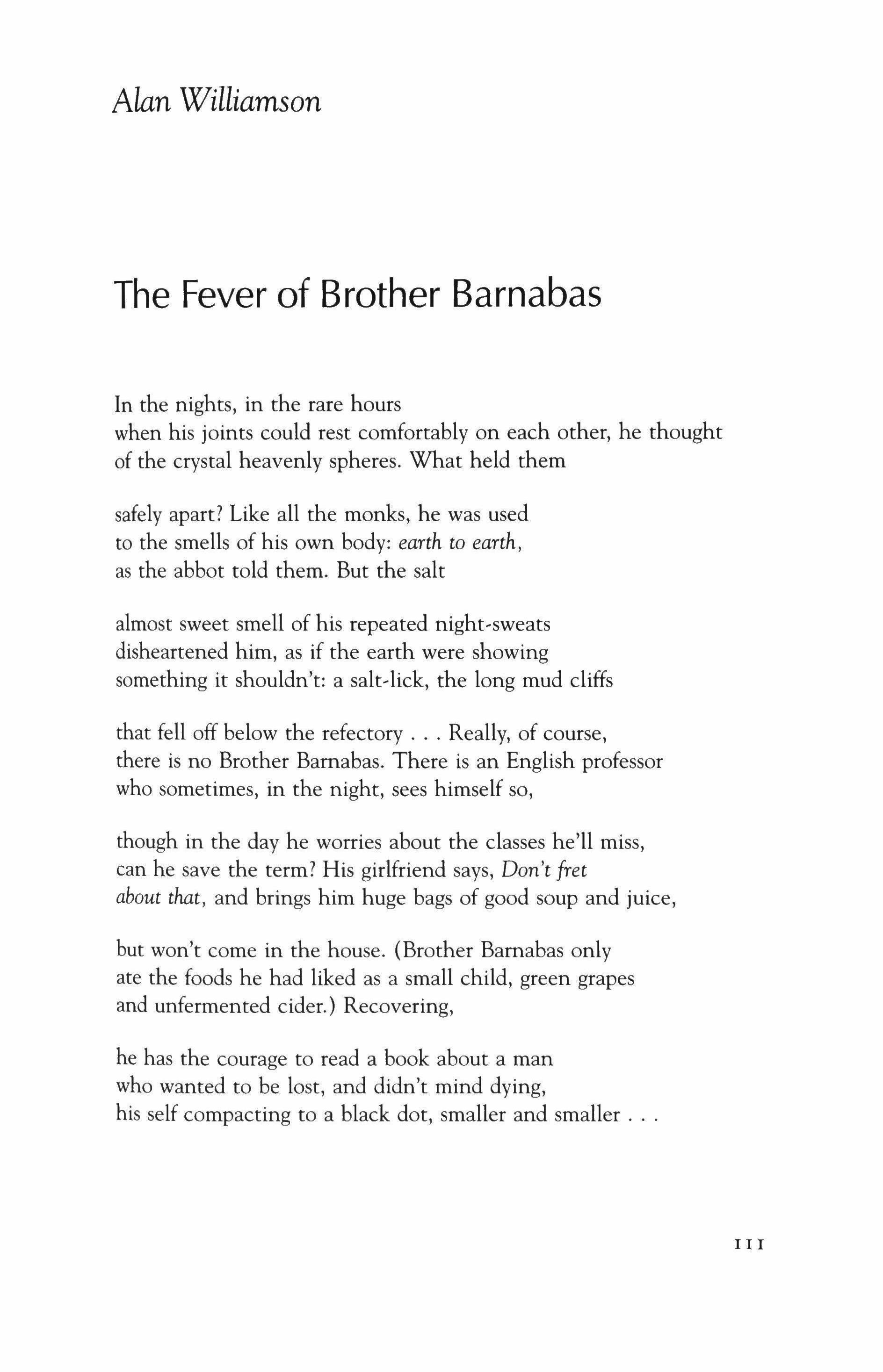
The Fever of Brother Barnabas
In the nights, in the rare hours when his joints could rest comfortably on each other, he thought of the crystal heavenly spheres. What held them safely apart? Like all the monks, he was used to the smells of his own body: earth to earth, as the abbot told them. But the salt almost sweet smell of his repeated night-sweats disheartened him, as if the earth were showing something it shouldn't: a salt-lick, the long mud cliffs that fell off below the refectory Really, of course, there is no Brother Barnabas. There is an English professor who sometimes, in the night, sees himself so, though in the day he worries about the classes he'll miss, can he save the term? His girlfriend says, Don't fret about that, and brings him huge bags of good soup and juice, but won't come in the house. (Brother Barnabas only ate the foods he had liked as a small child, green grapes and unfermented cider.) Recovering, he has the courage to read a book about a man who wanted to be lost, and didn't mind dying, his self compacting to a black dot, smaller and smaller
III
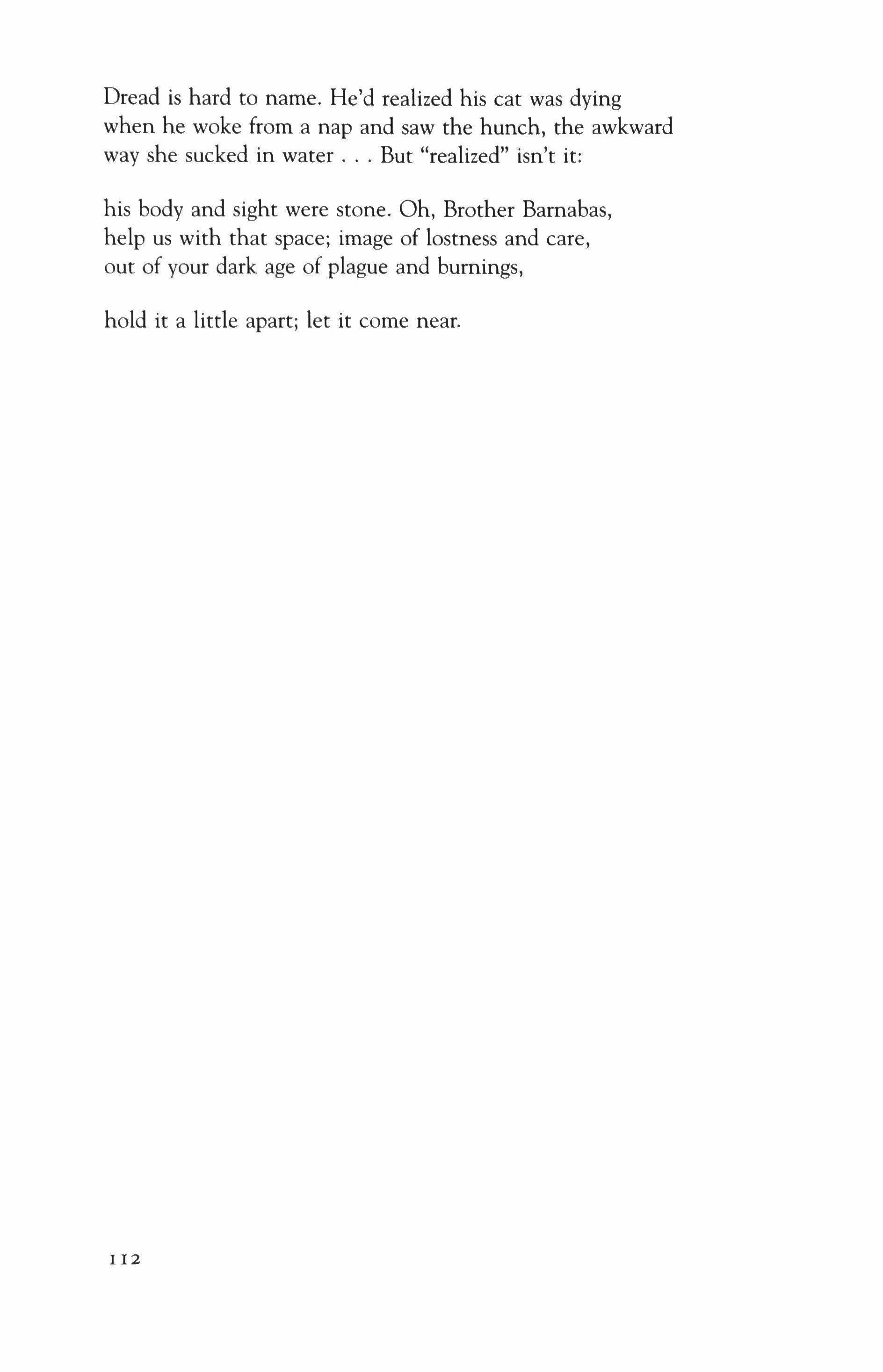
Dread is hard to name. He'd realized his cat was dying when he woke from a nap and saw the hunch, the awkward way she sucked in water But "realized" isn't it:
his body and sight were stone. Oh, Brother Barnabas, help us with that space; image of lostness and care, out of your dark age of plague and burnings, hold it a little apart; let it come near.
112
The Christian Year
Questa rissa cristiana che non ha se non parole d'ombra Montale
Churches are interesting: earthly gatherings premised on the presence of something invisible, unseen guest at the fund-raisers, breakfasts, the bickering committees. In the hallways where sunlight stirs idle dust, and unwatched children try a whoop and a sliding run.
In the homes life has an edge for being lived for something beyond life, sometimes burdensome-across the street, in Berkeley, where the two sisters' not doing their chores or spending their allowance on candy, is something God cares about-but always a refulgence, the moment vibrating with its Listener
Even the year is different, most special when the light goes and we all feel some kind of ebb, need something to get us through the days, like the Advent box I was told to fold up and put a penny inwith fascination, with grudgingnesseach evening, for the poor.
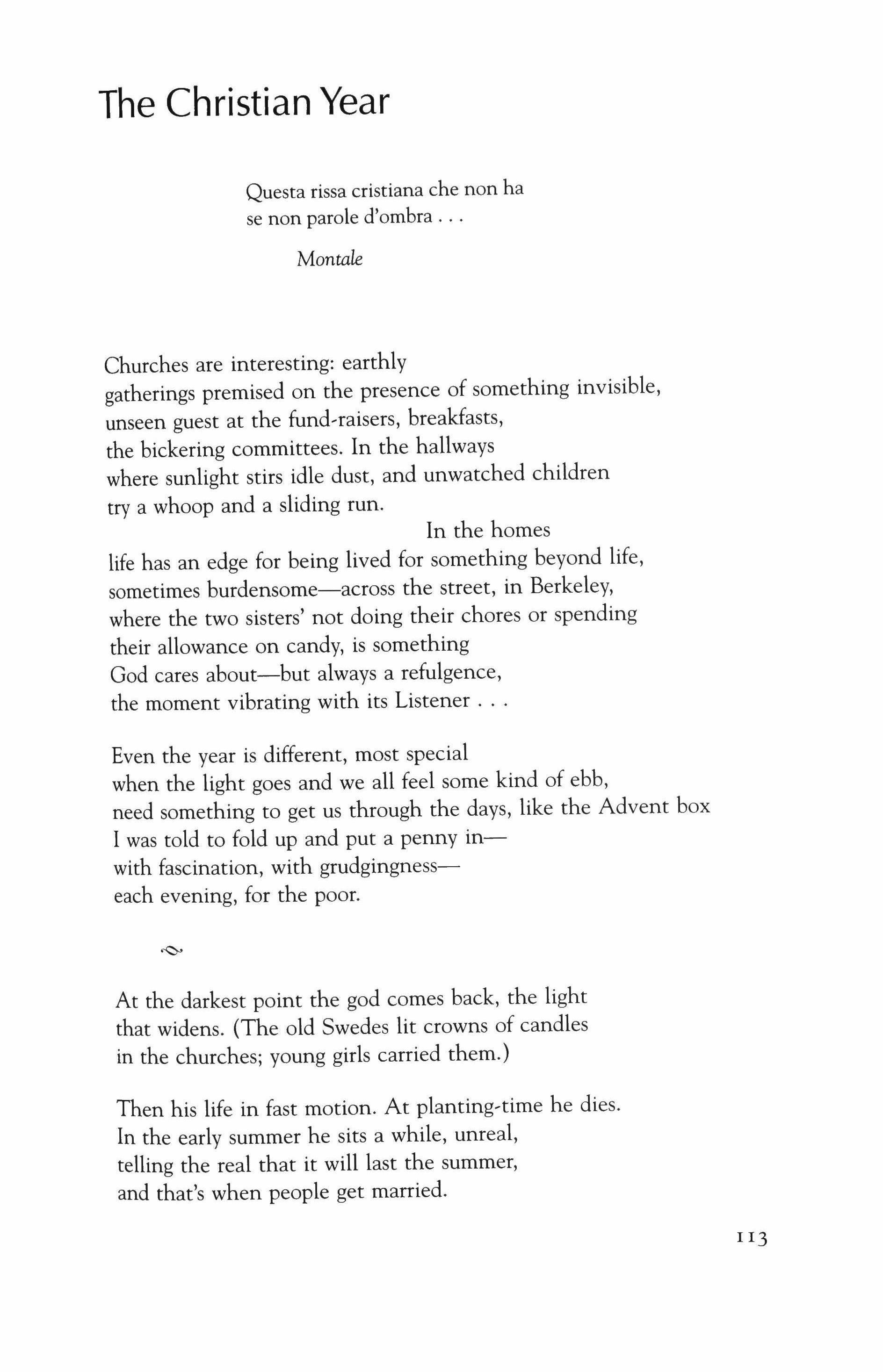
At the darkest point the god comes back, the light that widens. (The old Swedes lit crowns of candles in the churches; young girls carried them.)
Then his life in fast motion. At planting-time he dies. In the early summer he sits a while, unreal, telling the real that it will last the summer, and that's when people get married.
113
And when the darkness gathers again Strange music so the radio said, was heard as far away as the Dead Sea, and the Sea of Galilee.
(The Flemish angel hangs green-tawny above the hill, outshining the shepherds' fire. The baby's nakedness also shines of itself on the bare ground, and flickers on the skin of beasts. Even his Mother kneels to it stunned, as if a force of forces held her back, lonely.)
And on the ice-slick outside the church, after the five o'clock carol service, we spun out, and saw the apartments down the block all dark, as the sky was darkening Happiness gathered huge and forever, though at a moment's why cresting over us, and gone.
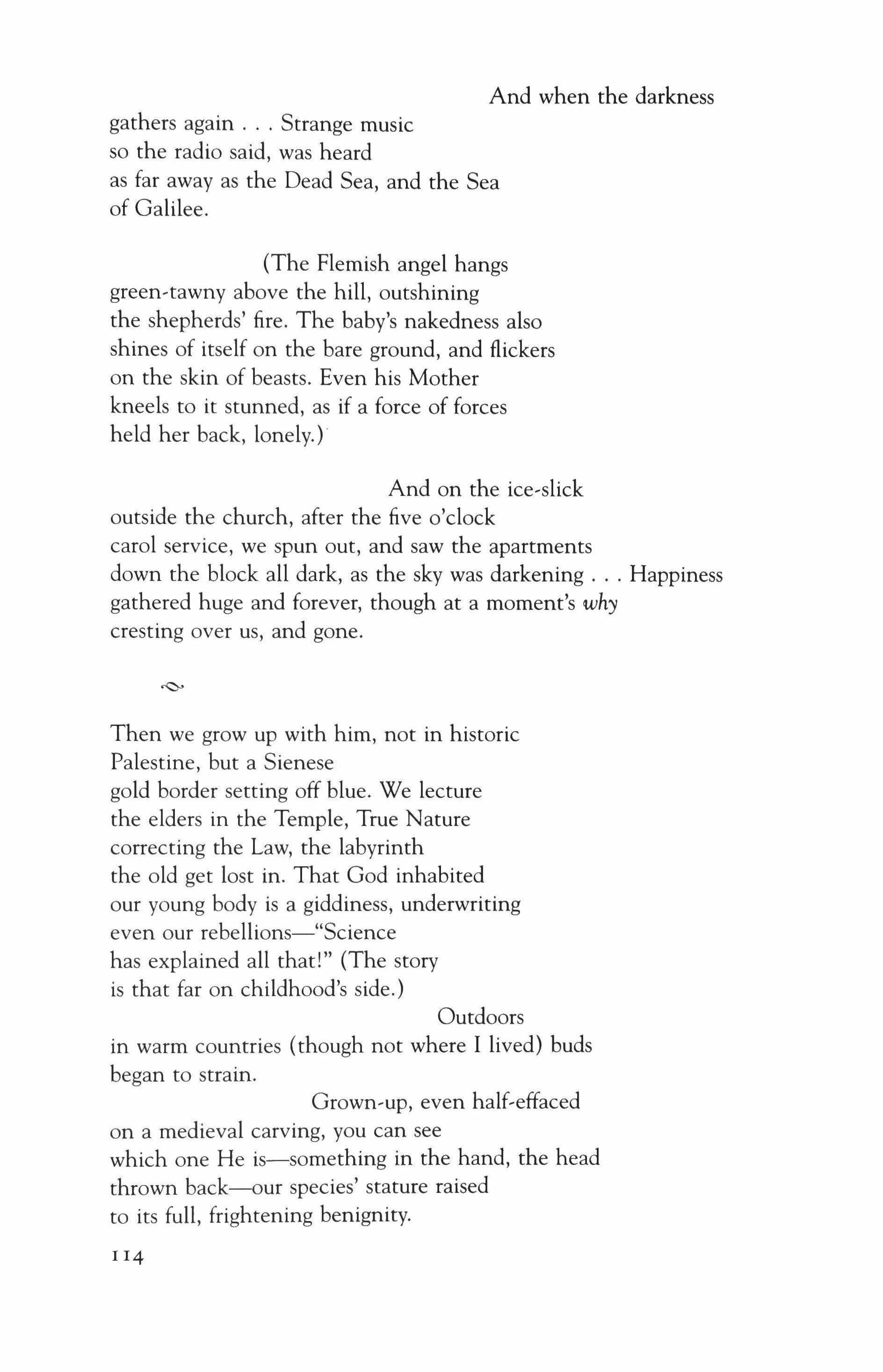
Then we grow up with him, not in historic Palestine, but a Sienese gold border setting off blue. We lecture the elders in the Temple, True Nature correcting the Law, the labyrinth the old get lost in. That God inhabited our young body is a giddiness, underwriting even our rebellions-"Science has explained all that!" (The story is that far on childhood's side.)
Outdoors in warm countries (though not where I lived) buds began to strain.
Grown-up, even half-effaced on a medieval carving, you can see which one He is-something in the hand, the head thrown back-our species' stature raised to its full, frightening benignity.
114
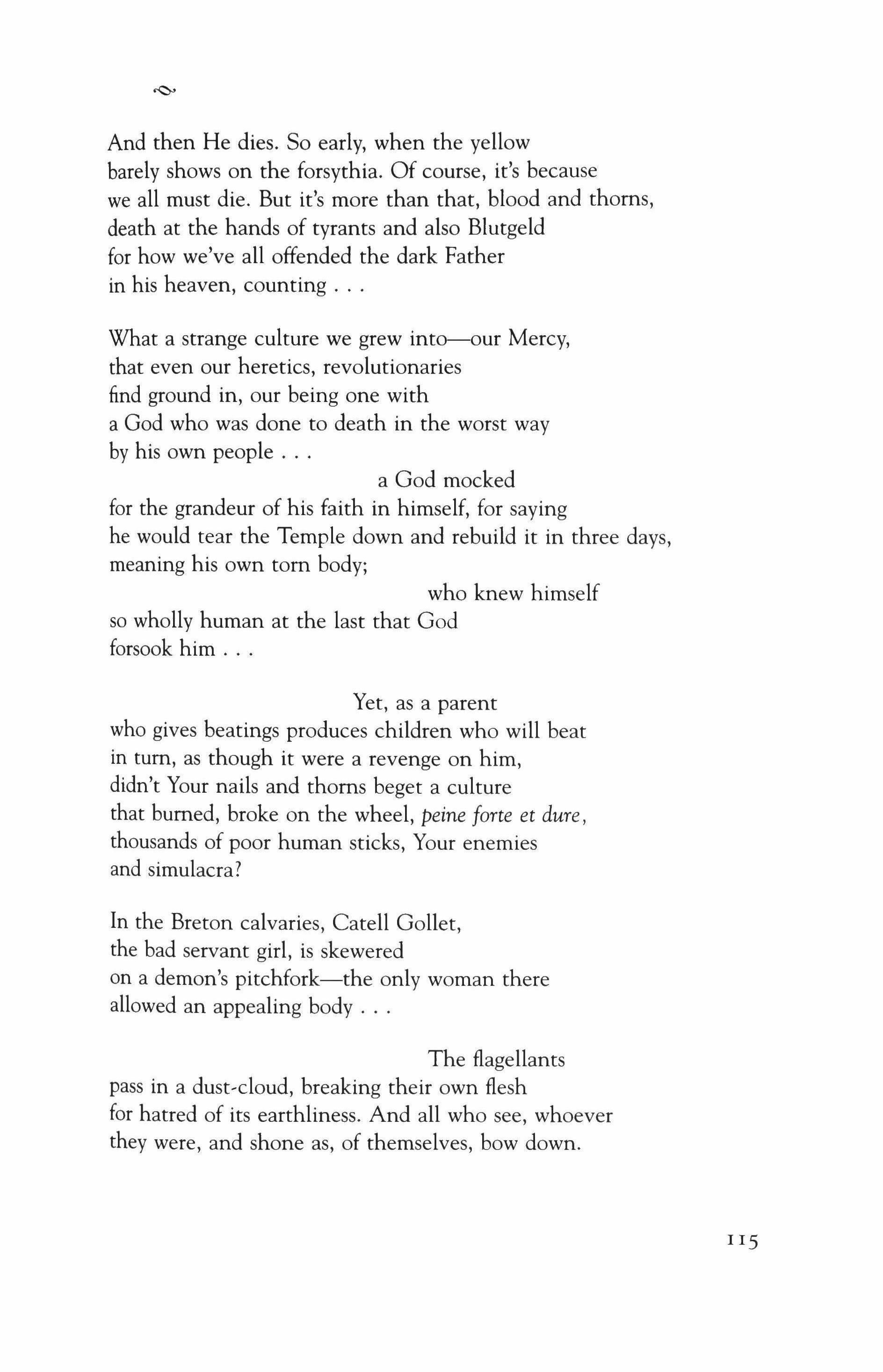
And then He dies. So early, when the yellow barely shows on the forsythia. Of course, it's because we all must die. But it's more than that, blood and thoms, death at the hands of tyrants and also Blutgeld for how we've all offended the dark Father in his heaven, counting
What a strange culture we grew into-our Mercy, that even our heretics, revolutionaries find ground in, our being one with a God who was done to death in the worst way by his own people
a God mocked for the grandeur of his faith in himself, for saying he would tear the Temple down and rebuild it in three days, meaning his own tom body; who knew himself so wholly human at the last that God forsook him
Yet, as a parent who gives beatings produces children who will beat in tum, as though it were a revenge on him, didn't Your nails and thorns beget a culture that burned, broke on the wheel, peine forte et dure, thousands of poor human sticks, Your enemies and simulacra?
In the Breton calvaries, Catell Gollet, the bad servant girl, is skewered on a demon's pitchfork-the only woman there allowed an appealing body
The flagellants pass in a dust-cloud, breaking their own flesh for hatred of its earthliness. And all who see, whoever they were, and shone as, of themselves, bow down.
lIS
My father hit me, though not often. When he was sick and I couldn't be angry-in Lent, that yearYou came to me, in confirmation class in the pseudo-Gothic chapel funnelling evening's rays to one blood-red drop. It seemed as easy to be one with a power, as to oppose itthe power a kindness to everything, including my clenched, ungiving self. I seized tremorously as to a cup, to a new way of being. Of course, I condescended. If my father demanded unquestioned obedience, out of the Old Testament, I was being Jesus, returning right for wrong
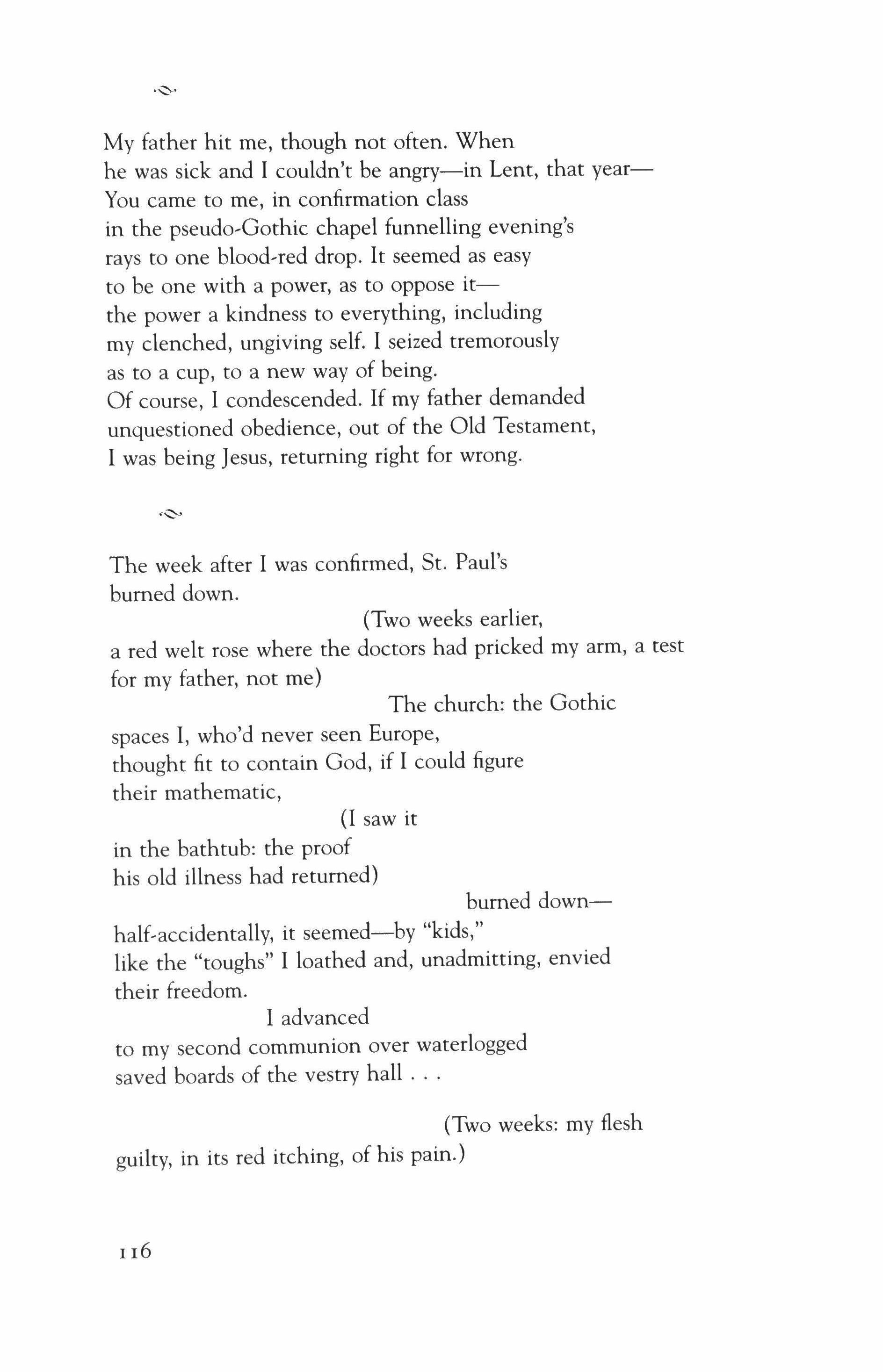
The week after I was confirmed, St. Paul's burned down.
(Two weeks earlier, a red welt rose where the doctors had pricked my arm, a test for my father, not me)
The church: the Gothic spaces I, who'd never seen Europe, thought fit to contain God, if I could figure their mathematic,
(I saw it in the bathtub: the proof his old illness had returned)
burned downhalf-accidentally, it seemed-by "kids," like the "toughs" I loathed and, unadmitting, envied their freedom.
I advanced to my second communion over waterlogged saved boards of the vestry hall
(Two weeks: my flesh guilty, in its red itching, of his pain.)
.�
�
II6
We were marked now, as the church was marked, by the scandal of misfortune. I wasn't allowed to say my father was sick, for fear my classmates would shun contagion
Were we changed by it? The communicants, having to include raw-brick rain-light, a plywood chancel, couldn't be "social churchgoers," any more than the ones in the Catacombs
And once, that winter, before the diagnosis, but as if knowing something extraordinary was coming, my father and mother danced under the bare light bulb in the kitchen. I ran and took a picture.
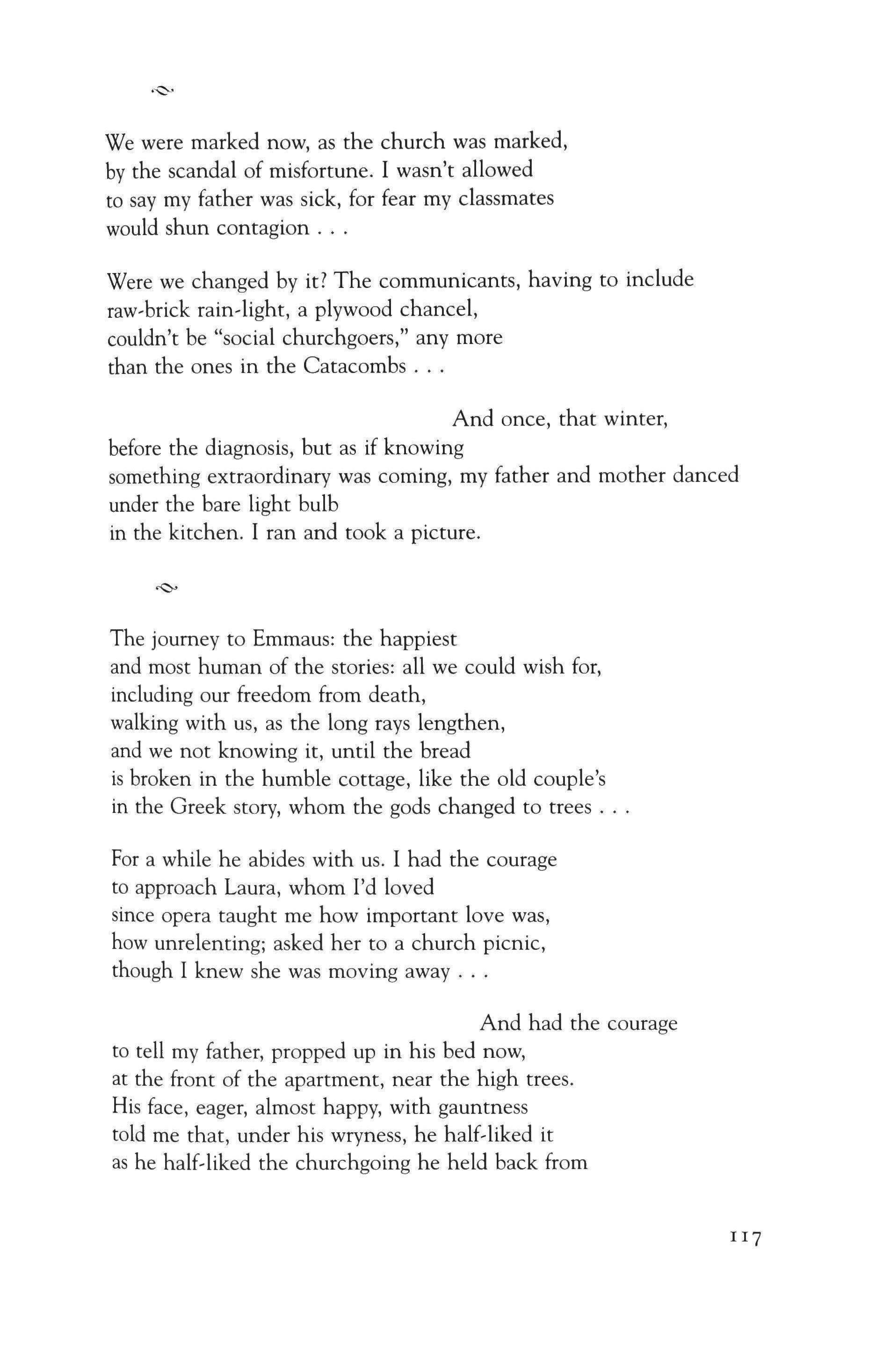
The journey to Emmaus: the happiest and most human of the stories: all we could wish for, including our freedom from death, walking with us, as the long rays lengthen, and we not knowing it, until the bread is broken in the humble cottage, like the old couple's in the Greek story, whom the gods changed to trees
For a while he abides with us. I had the courage to approach Laura, whom I'd loved since opera taught me how important love was, how unrelenting; asked her to a church picnic, though I knew she was moving away
And had the courage to tell my father, propped up in his bed now, at the front of the apartment, near the high trees. His face, eager, almost happy, with gauntness told me that, under his wryness, he half-liked it as he half-liked the churchgoing he held back from
-c-
after a childhood of camp-meeting hellfire
The picnic in a lakefront park, farther in June than we ever stayed in Chicago. Laura caught a wisp of white cottonwood falling from the heights like piano notes, and looked at it a long second, then let it go. What did that mean? Back at the parish house My mother warned You wouldn't play spin the bottle in a church; but we did.
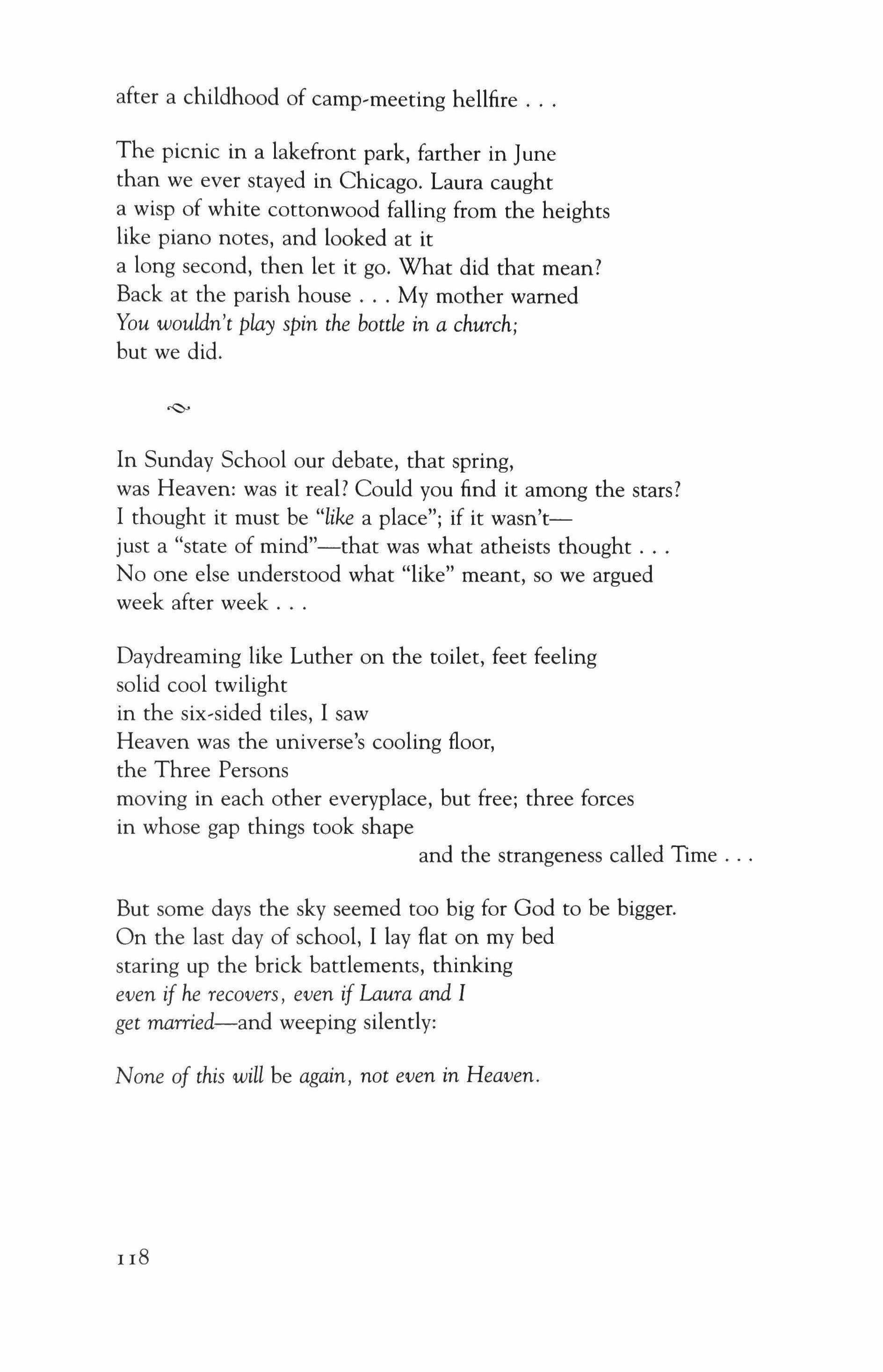
In Sunday School our debate, that spring, was Heaven: was it real? Could you find it among the stars? I thought it must be "like a place"; if it wasn'tjust a "state of mind"-that was what atheists thought No one else understood what "like" meant, so we argued week after week
Daydreaming like Luther on the toilet, feet feeling solid cool twilight in the six-sided tiles, I saw Heaven was the universe's cooling floor, the Three Persons moving in each other everyplace, but free; three forces in whose gap things took shape and the strangeness called Time
But some days the sky seemed too big for God to be bigger. On the last day of school, I lay flat on my bed staring up the brick battlements, thinking even if he recovers, even if Laura and I get married-and weeping silently:
None of this will be again, not even in Heaven.
liB
Night will fall upon man's wisdom now that man has been taught that he is nothing. He had discovered, or halrdiscovered, that the world is round and one of many like it, but he must now believe that the sky is but a tent spread above a level floor, and that he may be stirred into a frenzy of anxiety and so to moral transformation, blot out the knowledge or halrknowledge that he has lived many times, and think that all eternity depends upon a moment's decision The world is changed into a featureless dust and can be run through the fingers.
-Though in the cathedrals the world does seem included-if a pigeon roosts on a statue, at first you only notice it as deepening a meditation
completing a design, though one so dependent on internal consistency, not evidence, you can see why a wrench as slight as sunspots, or the moons of Jupiter, untuned
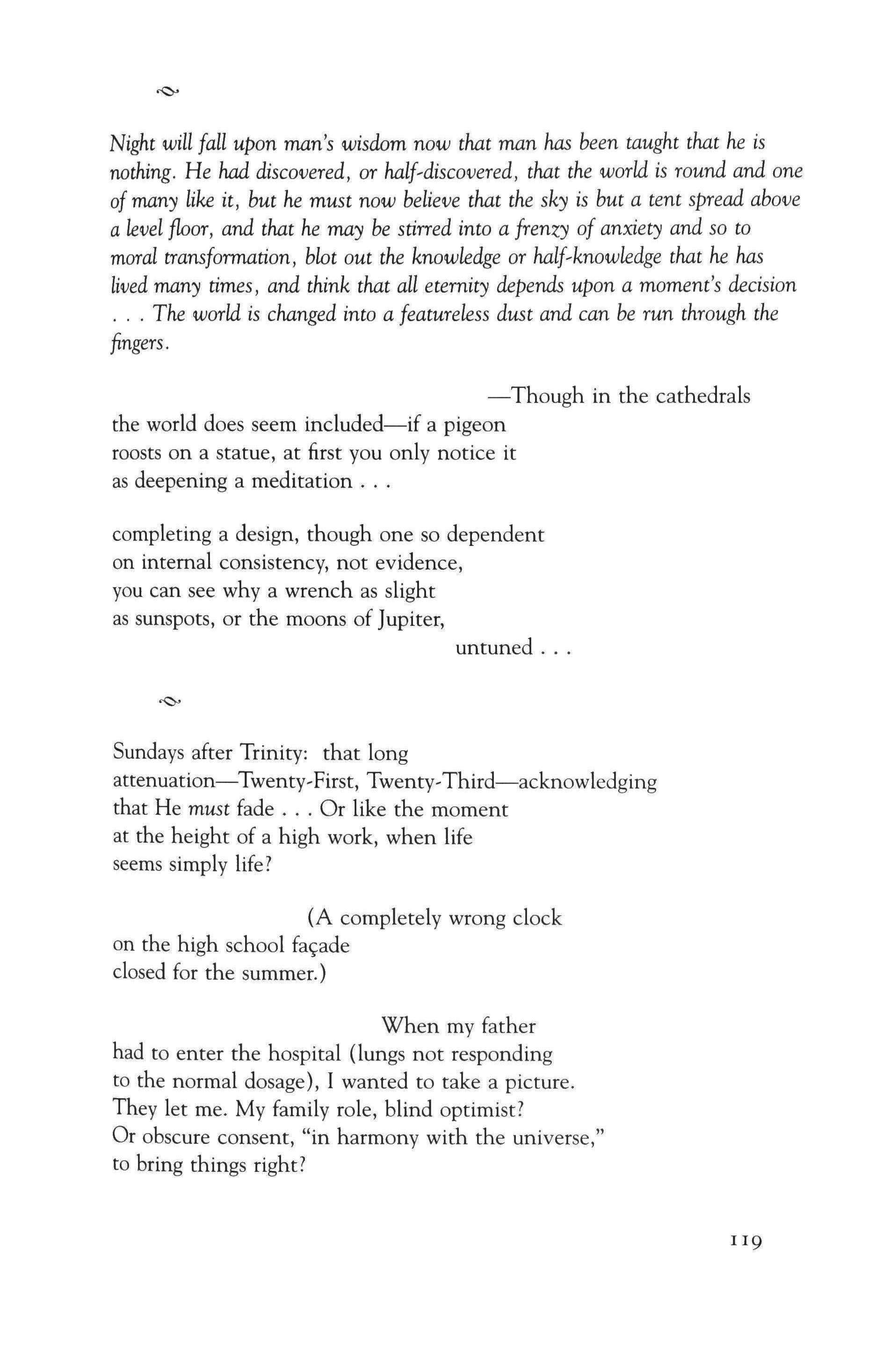
Sundays after Trinity: that long attenuation-Twenty,First, Twenty,Third-acknowledging that He must fade Or like the moment at the height of a high work, when life seems simply life?
(A completely wrong clock on the high school facade closed for the summer.)
When my father had to enter the hospital (lungs not responding to the normal dosage), I wanted to take a picture. They let me. My family role, blind optimist? Or obscure consent, "in harmony with the universe," to bring things right?
119
He has a small suitcase in his hand, his face is extra-gaunt, almost hollow, against the blinding rising walls.
My mother and I were leaving, to see to the house in Monterey. All evening, while packing, she would suddenly burst out crying-so unlike herand I would hug her: "Mama, don't get the weepies!" When she went, alone, to visit him one last time, a wild sunset exploded. I had the fantasy that haunted me for years: I was in my forties, a decade younger than him, a famous musician though unspecifiably decadent. My limousine had crashed, in the central boulevard of the Midway. I died there, bleeding out, as it were, into that sky. Was it a bargain, offering my life for his, if only I could be greater?
By fall he was home, the dosage that had worked (was it forty-eight pills?) arrayed before him at dinner.
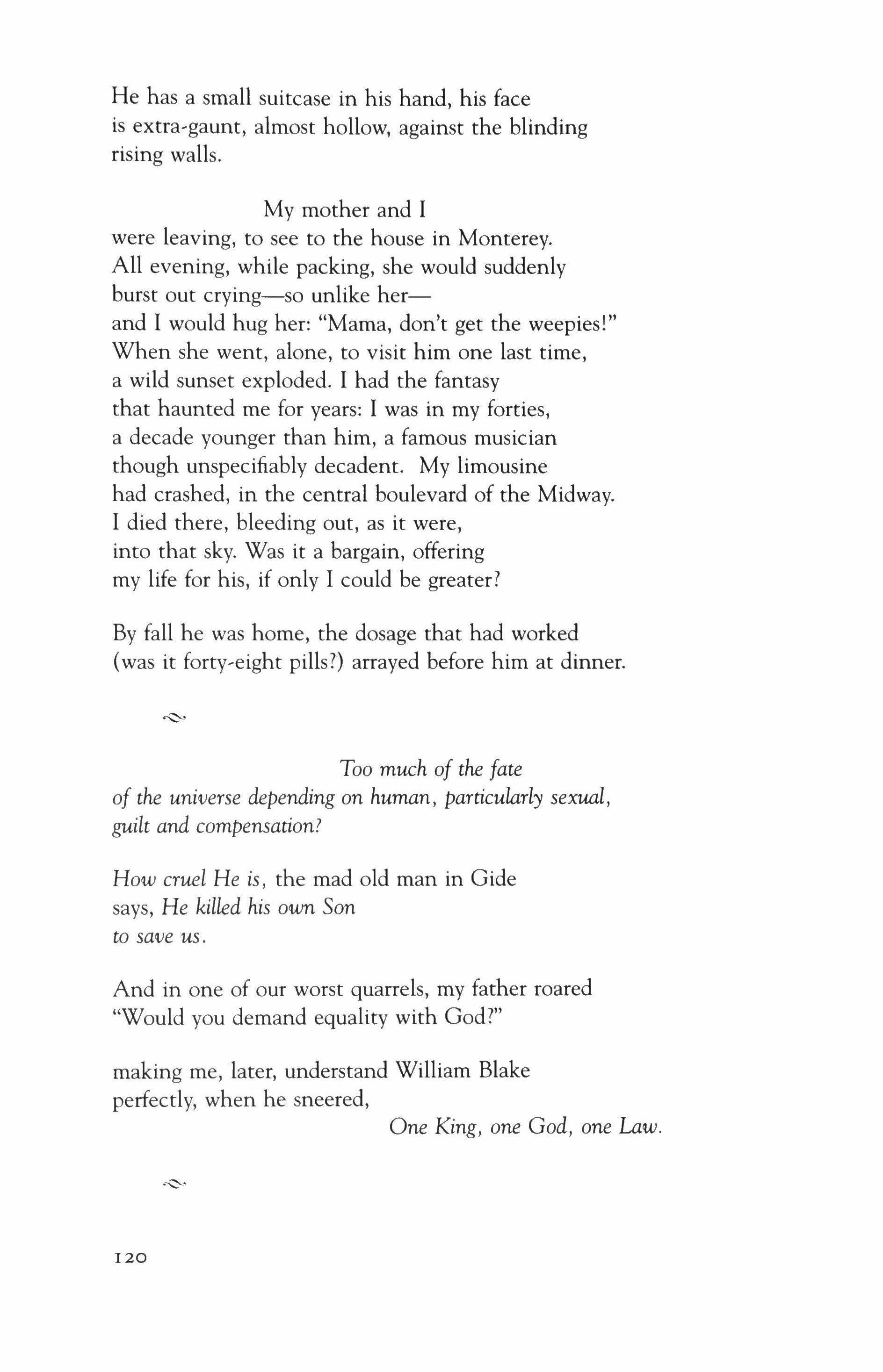
Too much of the fate of the universe depending on human, particularly sexual, guilt and compensation?
How cruel He is, the mad old man in Gide says, He killed his own Son to save us.
And in one of our worst quarrels, my father roared "Would you demand equality with God?"
making me, later, understand William Blake perfectly, when he sneered,
One King, one God, one Law.
120
The church was rebuilt, new brick. But by the time it was consecrated, whatever it held for me was no longer needed, or had moved somehow elsewhere.
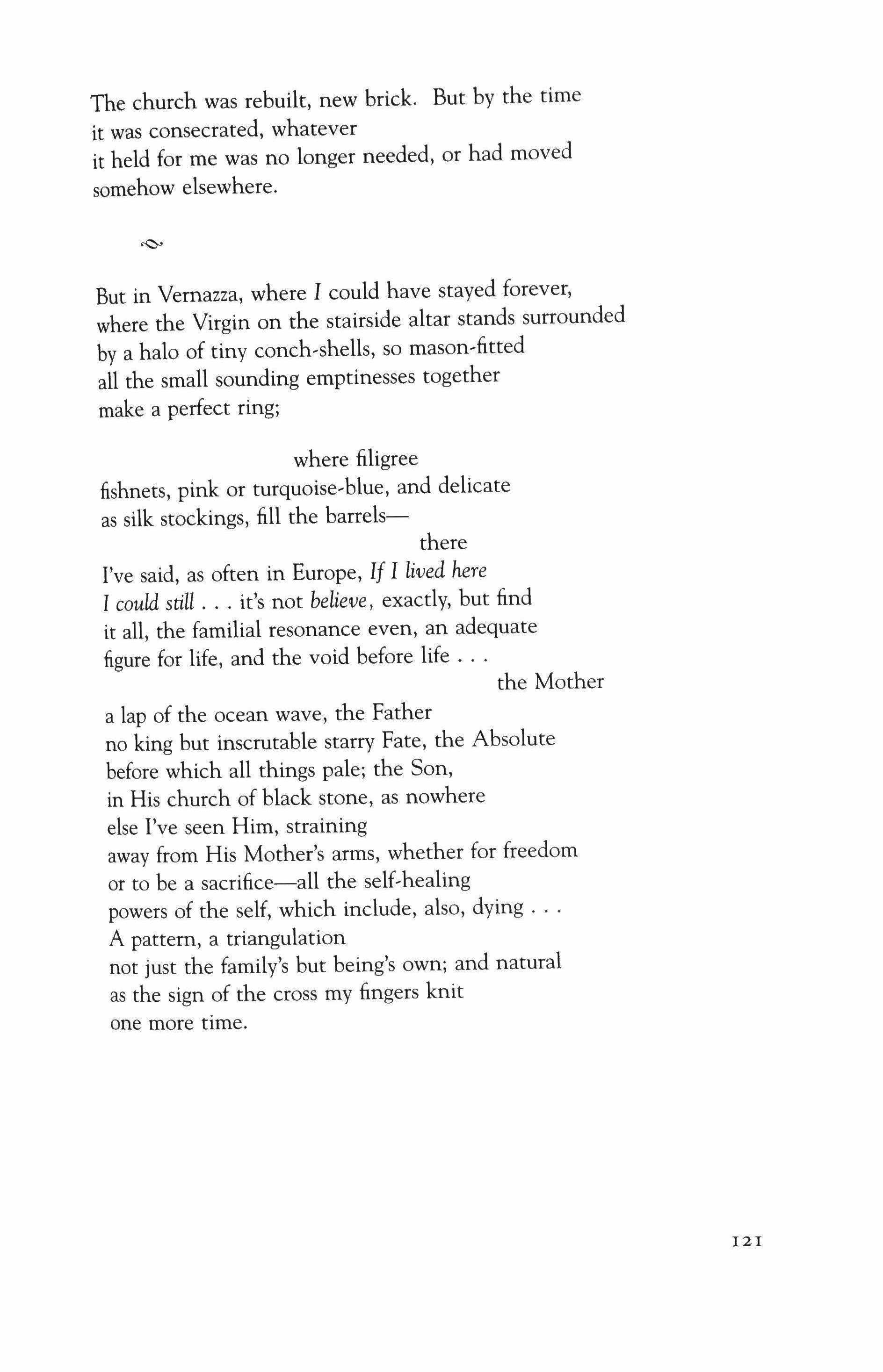
But in Vernazza, where I could have stayed forever, where the Virgin on the stairside altar stands surrounded by a halo of tiny conch-shells, so mason-fitted all the small sounding emptinesses together make a perfect ring;
where filigree
fishnets, pink or turquoise-blue, and delicate as silk stockings, fill the barrelsthere
I've said, as often in Europe, If I lived here I could still it's not believe, exactly, but find it all, the familial resonance even, an adequate figure for life, and the void before life the Mother
a lap of the ocean wave, the Father no king but inscrutable starry Fate, the Absolute before which all things pale; the Son, in His church of black stone, as nowhere else I've seen Him, straining away from His Mother's arms, whether for freedom or to be a sacrifice-all the self-healing powers of the self, which include, also, dying A pattern, a triangulation not just the family's but being's own; and natural as the sign of the cross my fingers knit one more time.
I2I
Eric LeMay
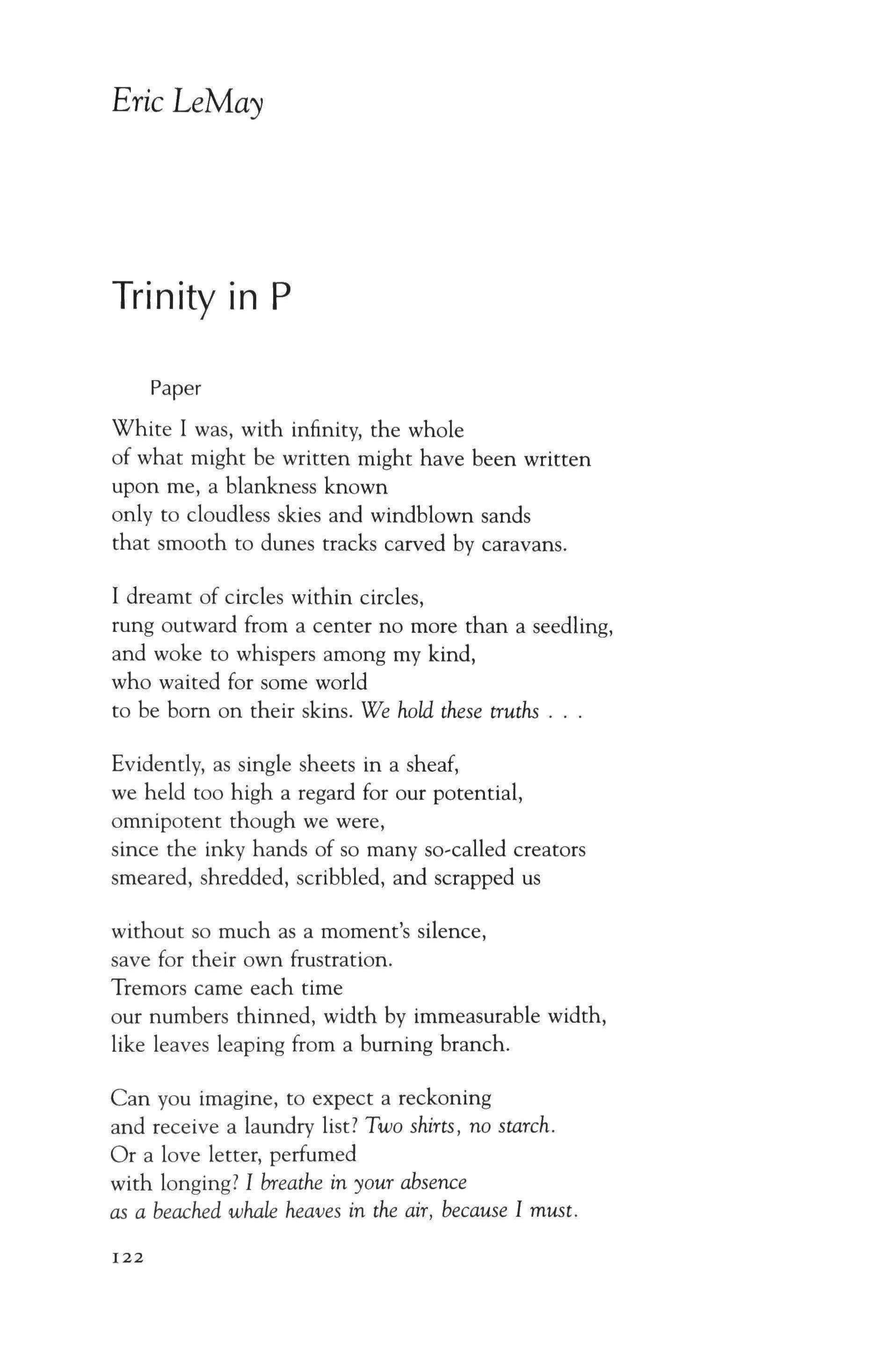
Trinity in P Paper
White I was, with infinity, the whole of what might be written might have been written upon me, a blankness known only to cloudless skies and windblown sands that smooth to dunes tracks carved by caravans.
I dreamt of circles within circles, rung outward from a center no more than a seedling, and woke to whispers among my kind, who waited for some world to be born on their skins. We hold these truths
Evidently, as single sheets in a sheaf, we held too high a regard for our potential, omnipotent though we were, since the inky hands of so many so-called creators smeared, shredded, scribbled, and scrapped us without so much as a moment's silence, save for their own frustration. Tremors came each time our numbers thinned, width by immeasurable width, like leaves leaping from a burning branch.
Can you imagine, to expect a reckoning and receive a laundry list? Two shirts, no starch. Or a love letter, perfumed with longing? I breathe in your absence as a beached whale heaves in the air, because I must.
122
o the blubbering and the bathos soaked into us by impious pens and imperfect pencils buffeting us to tears with their pink bottoms! flow could I, once endless, be sentenced to such a scatological end?
Here I am, blackened by stanzas, without room for the profound or unknown thought promised in the whiteness surrounding all you have ever read, the unmarred margin, where nothing lies
but what might redeem what we have beendeclarations of war, binding contracts, birth and death certificates filed away in locked steel cabinets by clerks too punctilious to notice the lives between.
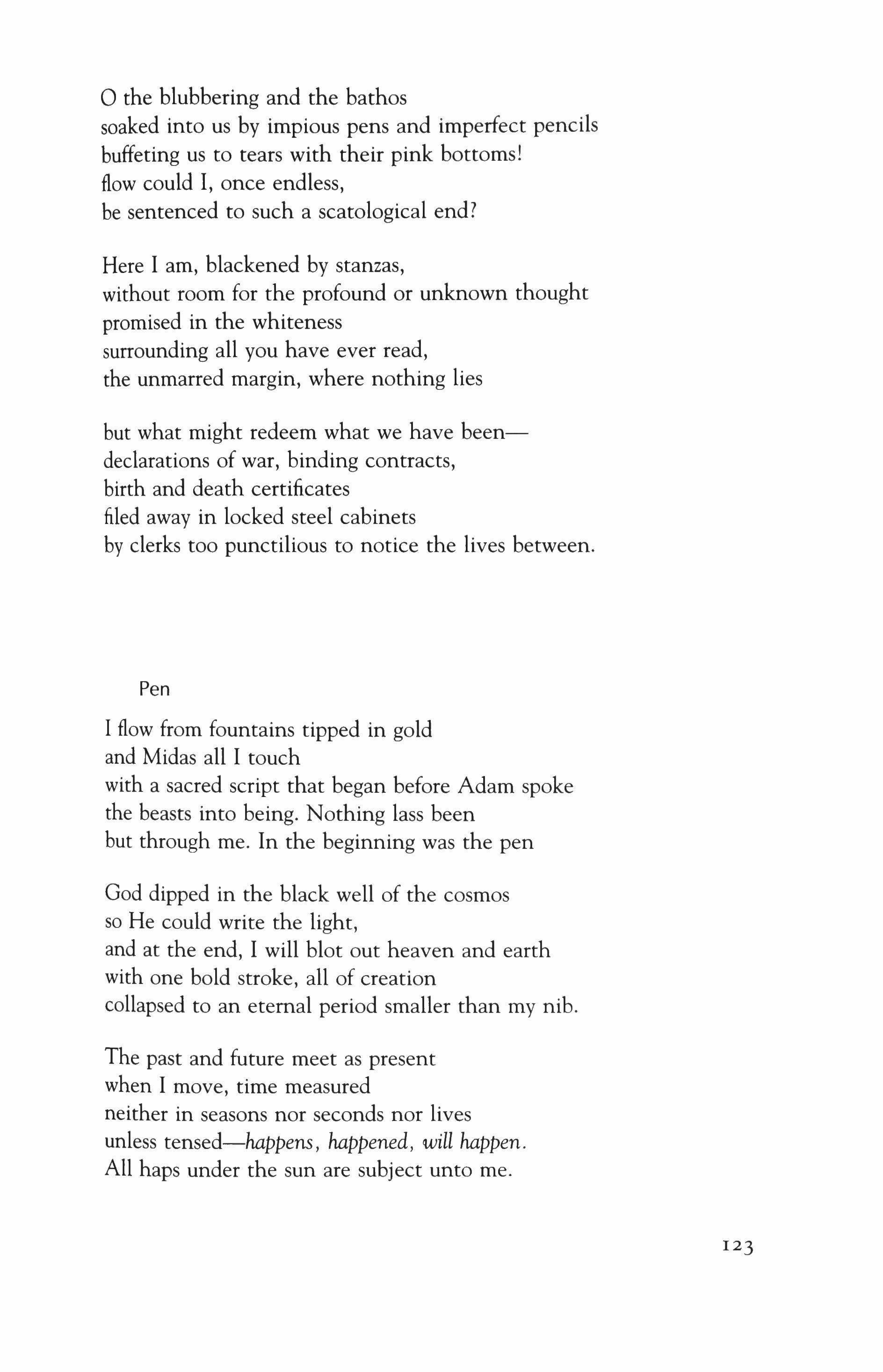
Pen
I flow from fountains tipped in gold and Midas all I touch with a sacred script that began before Adam spoke the beasts into being. Nothing lass been but through me. In the beginning was the pen
God dipped in the black well of the cosmos so He could write the light, and at the end, I will blot out heaven and earth with one bold stroke, all of creation collapsed to an eternal period smaller than my nib.
The past and future meet as present when I move, time measured neither in seasons nor seconds nor lives unless tensed-happens, happened, will happen. All haps under the sun are subject unto me.
123
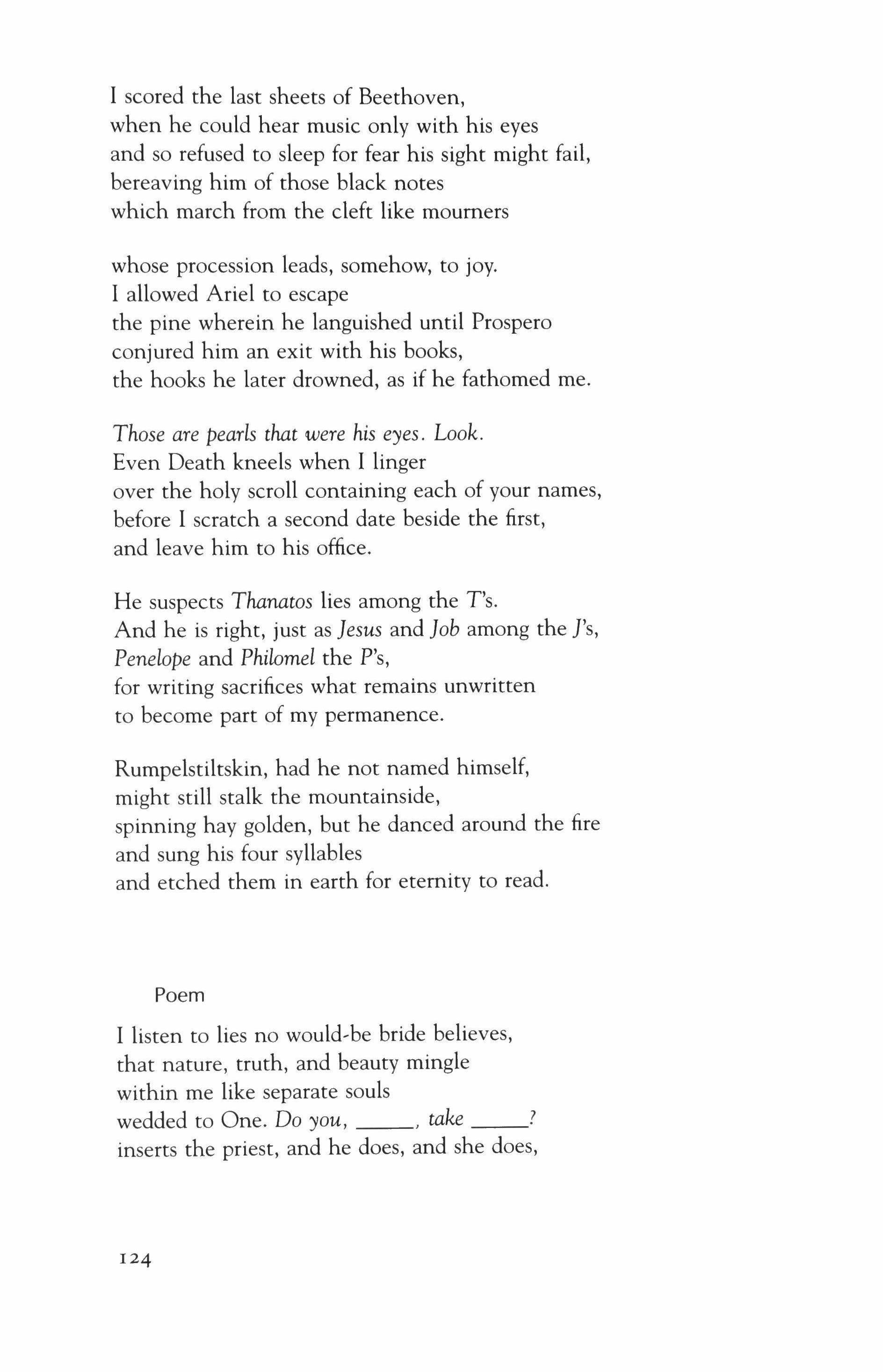
I scored the last sheets of Beethoven, when he could hear music only with his eyes and so refused to sleep for fear his sight might fail, bereaving him of those black notes which march from the cleft like mourners whose procession leads, somehow, to joy. I allowed Ariel to escape the pine wherein he languished until Prospero conjured him an exit with his books, the hooks he later drowned, as if he fathomed me.
Those are pearls that were his eyes. Look. Even Death kneels when I linger over the holy scroll containing each of your names, before I scratch a second date beside the first, and leave him to his office.
He suspects Thanatos lies among the T's. And he is right, just as Jesus and Job among the ],s, Penelope and Philomel the P's, for writing sacrifices what remains unwritten to become part of my permanence.
Rumpelstiltskin, had he not named himself, might still stalk the mountainside, spinning hay golden, but he danced around the fire and sung his four syllables and etched them in earth for eternity to read. Poem
I listen to lies no would-be bride believes, that nature, truth, and beauty mingle within me like separate souls wedded to One. Do you, r take ? inserts the priest, and he does, and she does,
124
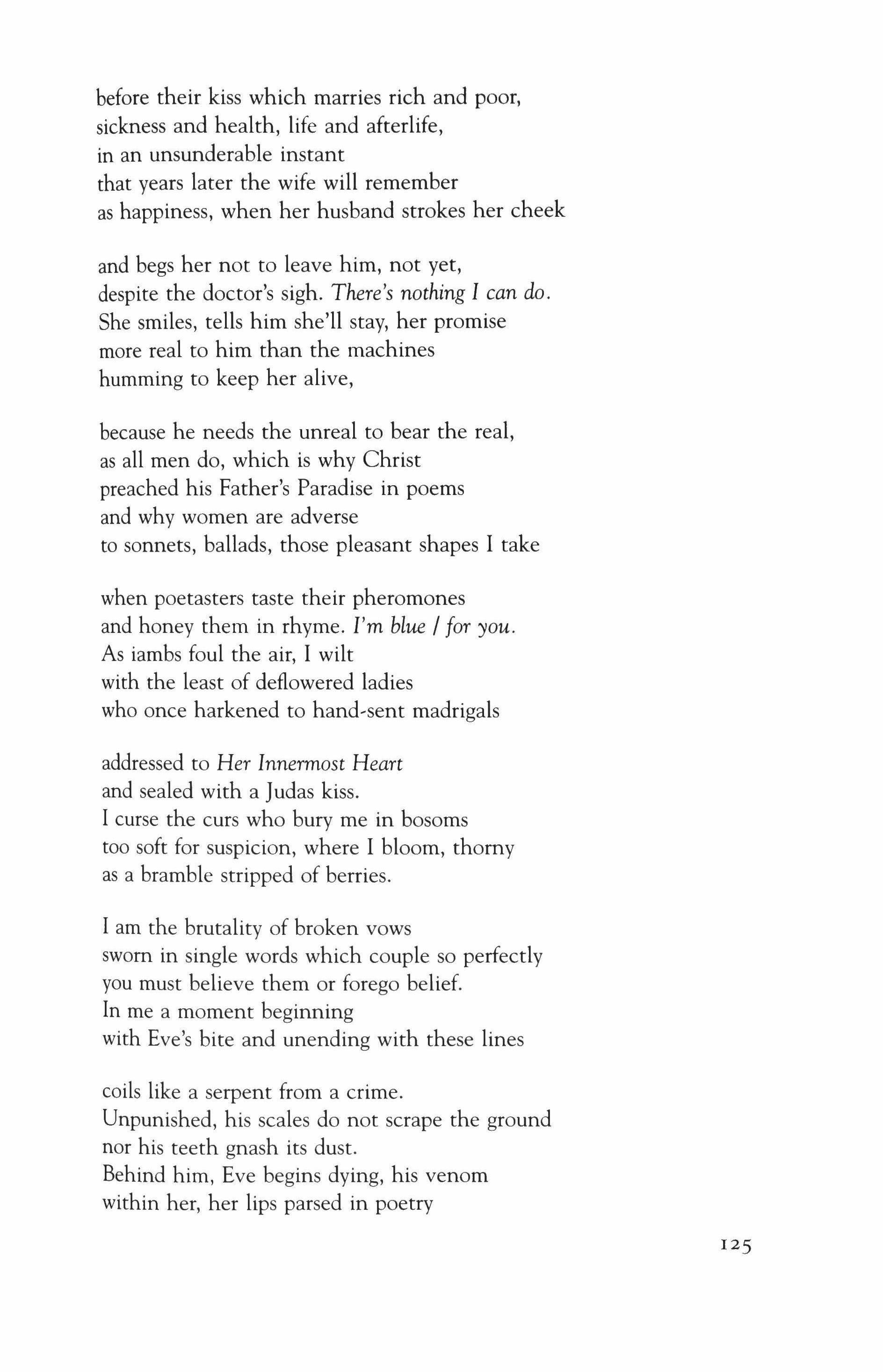
before their kiss which marries rich and poor, sickness and health, life and afterlife, in an unsunderable instant that years later the wife will remember as happiness, when her husband strokes her cheek and begs her not to leave him, not yet, despite the doctor's sigh. There's nothing I can do. She smiles, tells him she'll stay, her promise more real to him than the machines humming to keep her alive, because he needs the unreal to bear the real, as all men do, which is why Christ preached his Father's Paradise in poems and why women are adverse to sonnets, ballads, those pleasant shapes I take when poetasters taste their pheromones and honey them in rhyme. I'm blue / for you. As iambs foul the air, I wilt with the least of deflowered ladies who once harkened to hand-sent madrigals
addressed to Her Innermost Heart and sealed with a Judas kiss. I curse the curs who bury me in bosoms too soft for suspicion, where I bloom, thorny as a bramble stripped of berries.
I am the brutality of broken vows sworn in single words which couple so perfectly you must believe them or forego belief. In me a moment beginning with Eve's bite and unending with these lines coils like a serpent from a crime. Unpunished, his scales do not scrape the ground nor his teeth gnash its dust. Behind him, Eve begins dying, his venom within her, her lips parsed in poetry
125
Peter Johnson
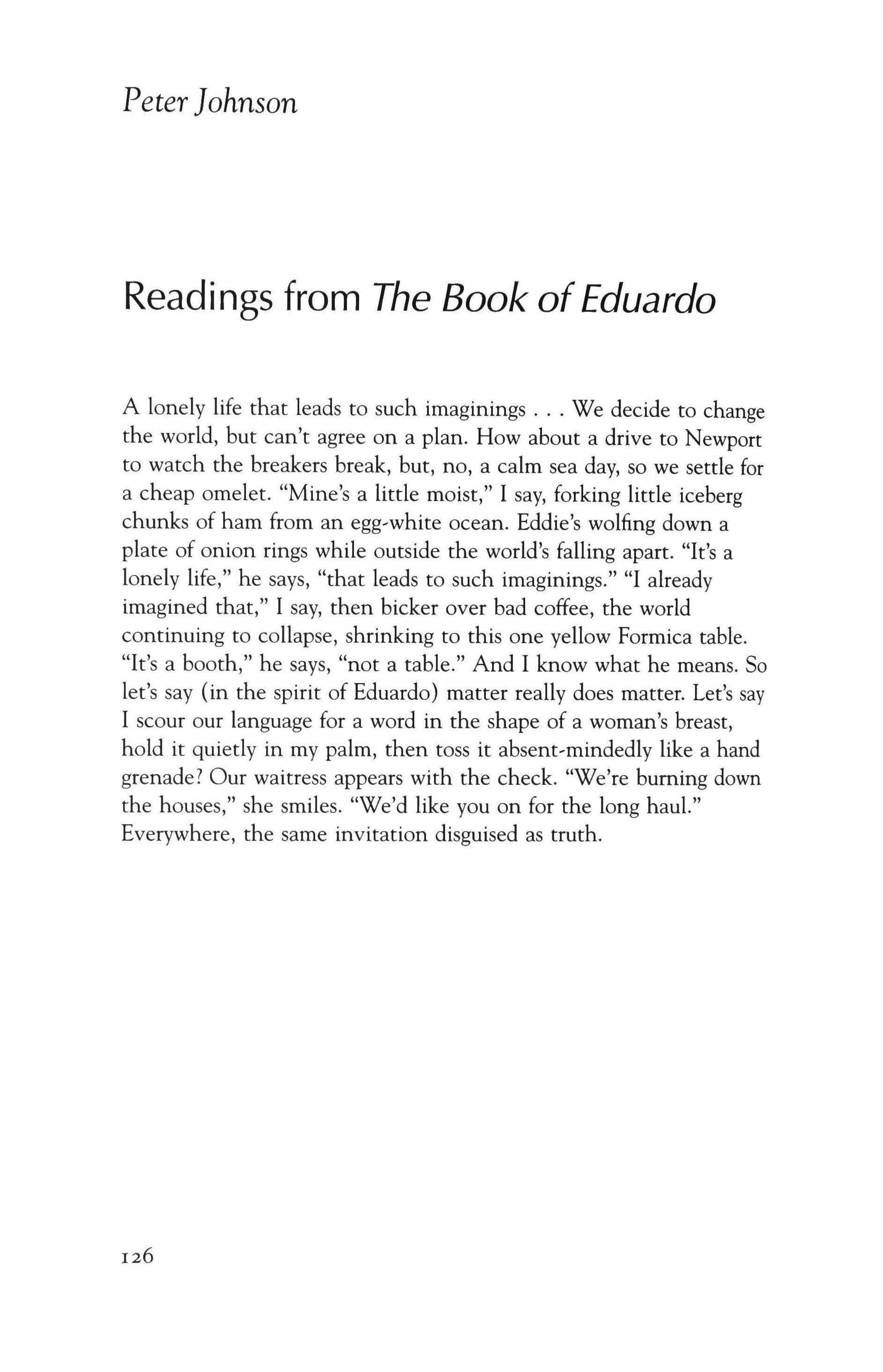
Readings from The Book ofEduardo
A lonely life that leads to such imaginings We decide to change the world, but can't agree on a plan. How about a drive to Newport to watch the breakers break, but, no, a calm sea day, so we settle for a cheap omelet. "Mine's a little moist," I say, forking little iceberg chunks of ham from an egg-white ocean. Eddie's wolfing down a plate of onion rings while outside the world's falling apart. "It's a lonely life," he says, "that leads to such imaginings." "I already imagined that," I say, then bicker over bad coffee, the world continuing to collapse, shrinking to this one yellow Formica table. "It's a booth," he says, "not a table." And I know what he means. So let's say (in the spirit of Eduardo) matter really does matter. Let's say I scour our language for a word in the shape of a woman's breast, hold it quietly in my palm, then toss it absent-mindedly like a hand grenade? Our waitress appears with the check. "We're burning down the houses," she smiles. "We'd like you on for the long haul." Everywhere, the same invitation disguised as truth.
126
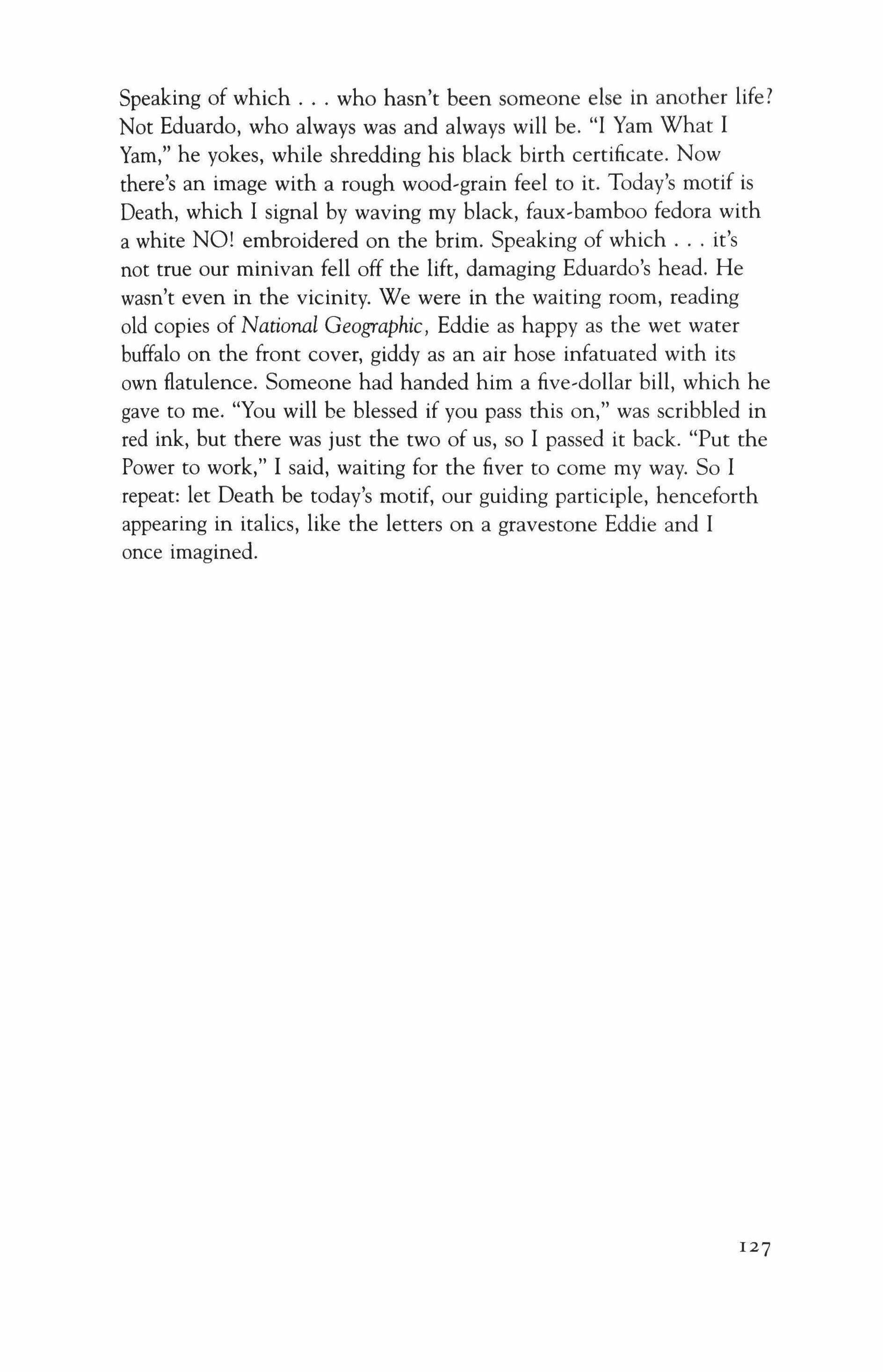
Speaking of which who hasn't been someone else in another life? Not Eduardo, who always was and always will be. "I Yam What I Yam," he yokes, while shredding his black birth certificate. Now there's an image with a rough wood-grain feel to it. Today's motif is Death, which I signal by waving my black, faux-bamboo fedora with a white NO! embroidered on the brim. Speaking of which it's not true our minivan fell off the lift, damaging Eduardo's head. He wasn't even in the vicinity. We were in the waiting room, reading old copies of National Geographic, Eddie as happy as the wet water buffalo on the front cover, giddy as an air hose infatuated with its own flatulence. Someone had handed him a five-dollar bill, which he gave to me. "You will be blessed if you pass this on," was scribbled in red ink, but there was just the two of us, so I passed it back. "Put the Power to work," I said, waiting for the fiver to come my way. So I repeat: let Death be today's motif, our guiding participle, henceforth appearing in italics, like the letters on a gravestone Eddie and I once imagined.
127
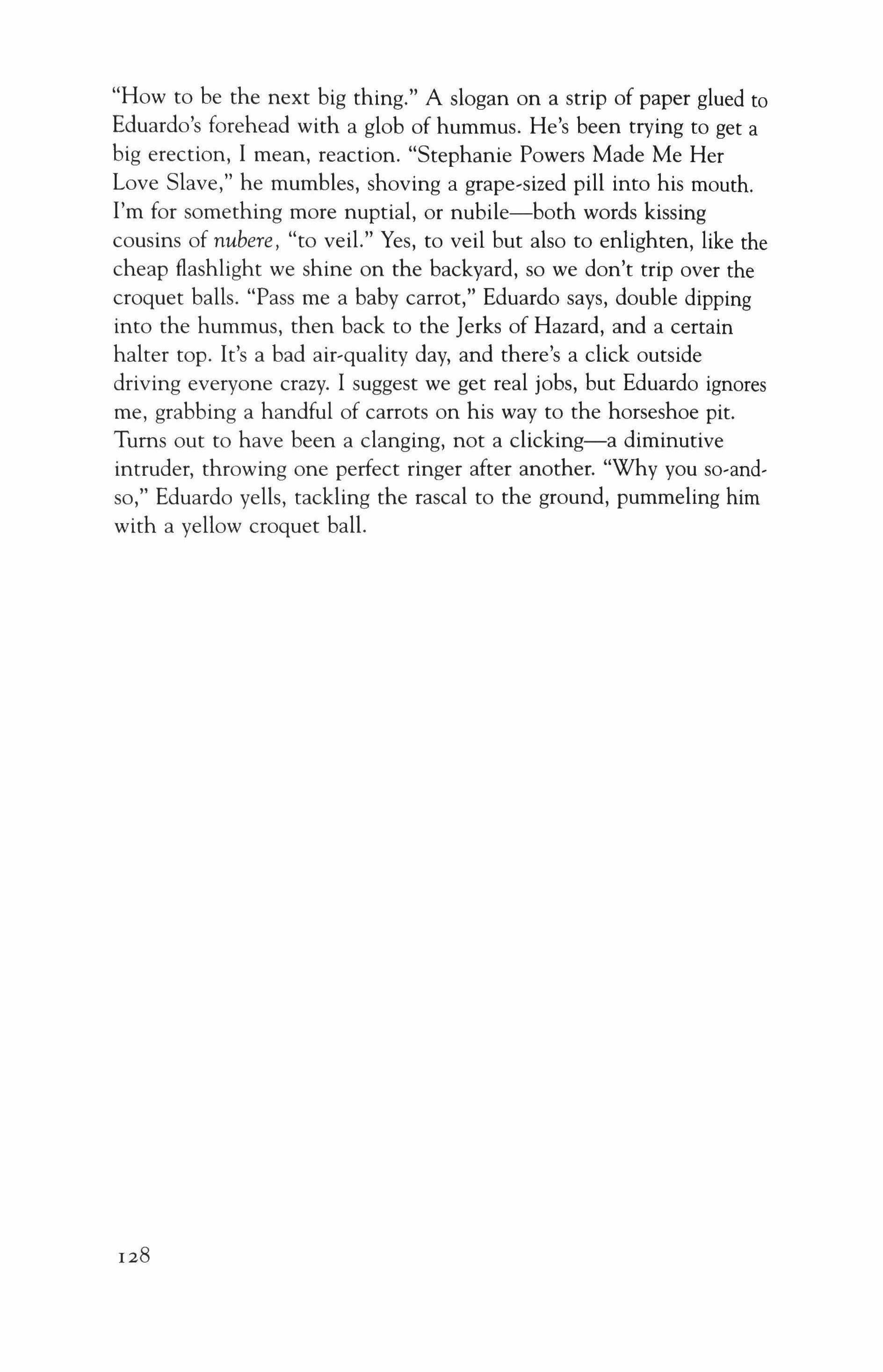
"How to be the next big thing." A slogan on a strip of paper glued to Eduardo's forehead with a glob of hummus. He's been trying to get a big erection, I mean, reaction. "Stephanie Powers Made Me Her Love Slave," he mumbles, shoving a grape-sized pill into his mouth. I'm for something more nuptial, or nubile-both words kissing cousins of nubere, "to veil." Yes, to veil but also to enlighten, like the cheap flashlight we shine on the backyard, so we don't trip over the croquet balls. "Pass me a baby carrot," Eduardo says, double dipping into the hummus, then back to the Jerks of Hazard, and a certain halter top. It's a bad air-quality day, and there's a click outside driving everyone crazy. I suggest we get real jobs, but Eduardo ignores me, grabbing a handful of carrots on his way to the horseshoe pit. Turns out to have been a clanging, not a clicking-a diminutive intruder, throwing one perfect ringer after another. "Why you so'andso," Eduardo yells, tackling the rascal to the ground, pummeling him with a yellow croquet ball.
128
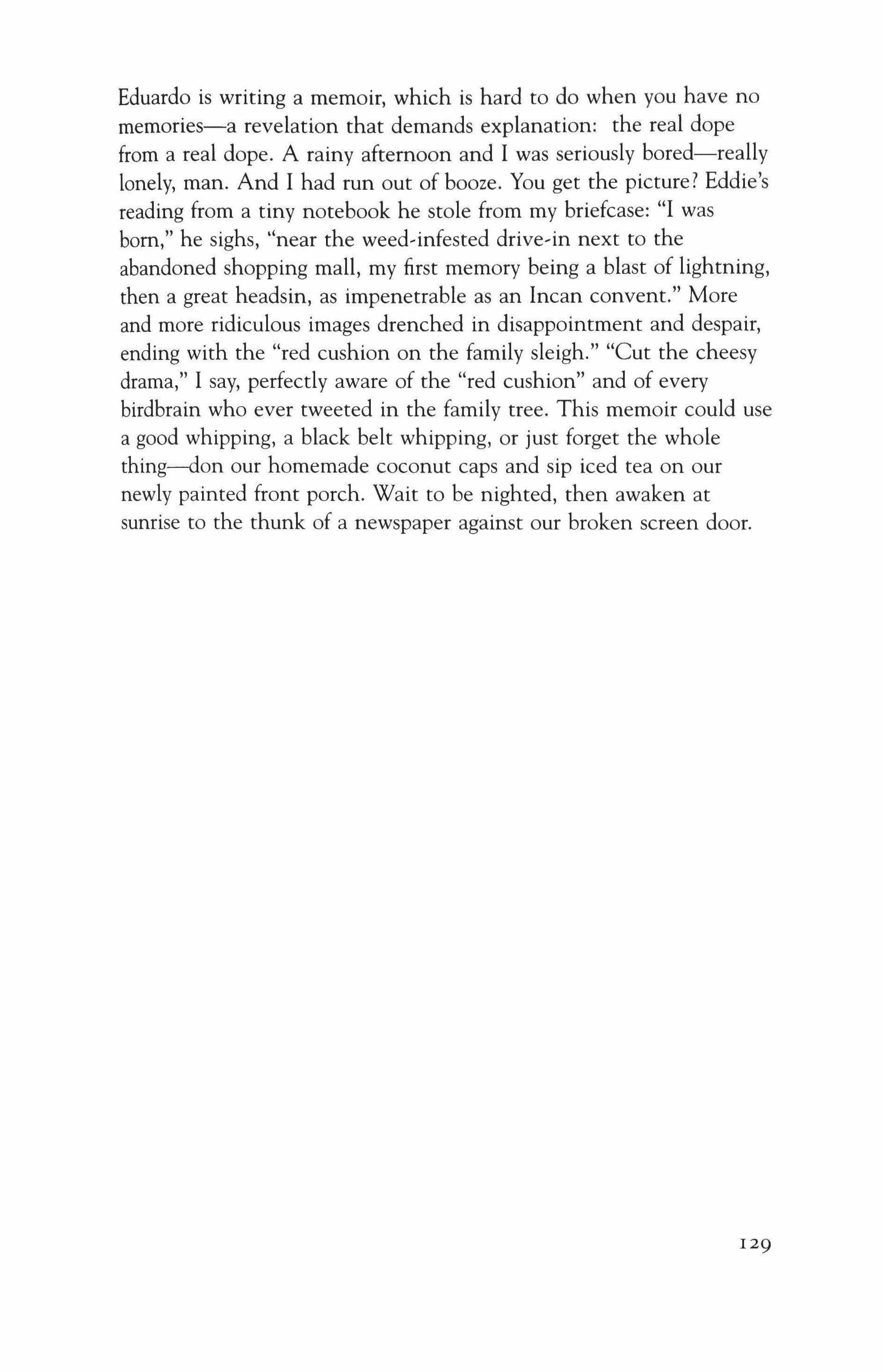
Eduardo is writing a memoir, which is hard to do when you have no memories-a revelation that demands explanation: the real dope from a real dope. A rainy afternoon and I was seriously bored-really lonely, man. And I had run out of booze. You get the picture? Eddie's reading from a tiny notebook he stole from my briefcase: "I was born," he sighs, "near the weed-infested drive-in next to the abandoned shopping mall, my first memory being a blast of lightning, then a great headsin, as impenetrable as an Incan convent." More and more ridiculous images drenched in disappointment and despair, ending with the "red cushion on the family sleigh." "Cut the cheesy drama," I say, perfectly aware of the "red cushion" and of every birdbrain who ever tweeted in the family tree. This memoir could use a good whipping, a black belt whipping, or just forget the whole thing=-don our homemade coconut caps and sip iced tea on our newly painted front porch. Wait to be nighted, then awaken at sunrise to the thunk of a newspaper against our broken screen door.
129
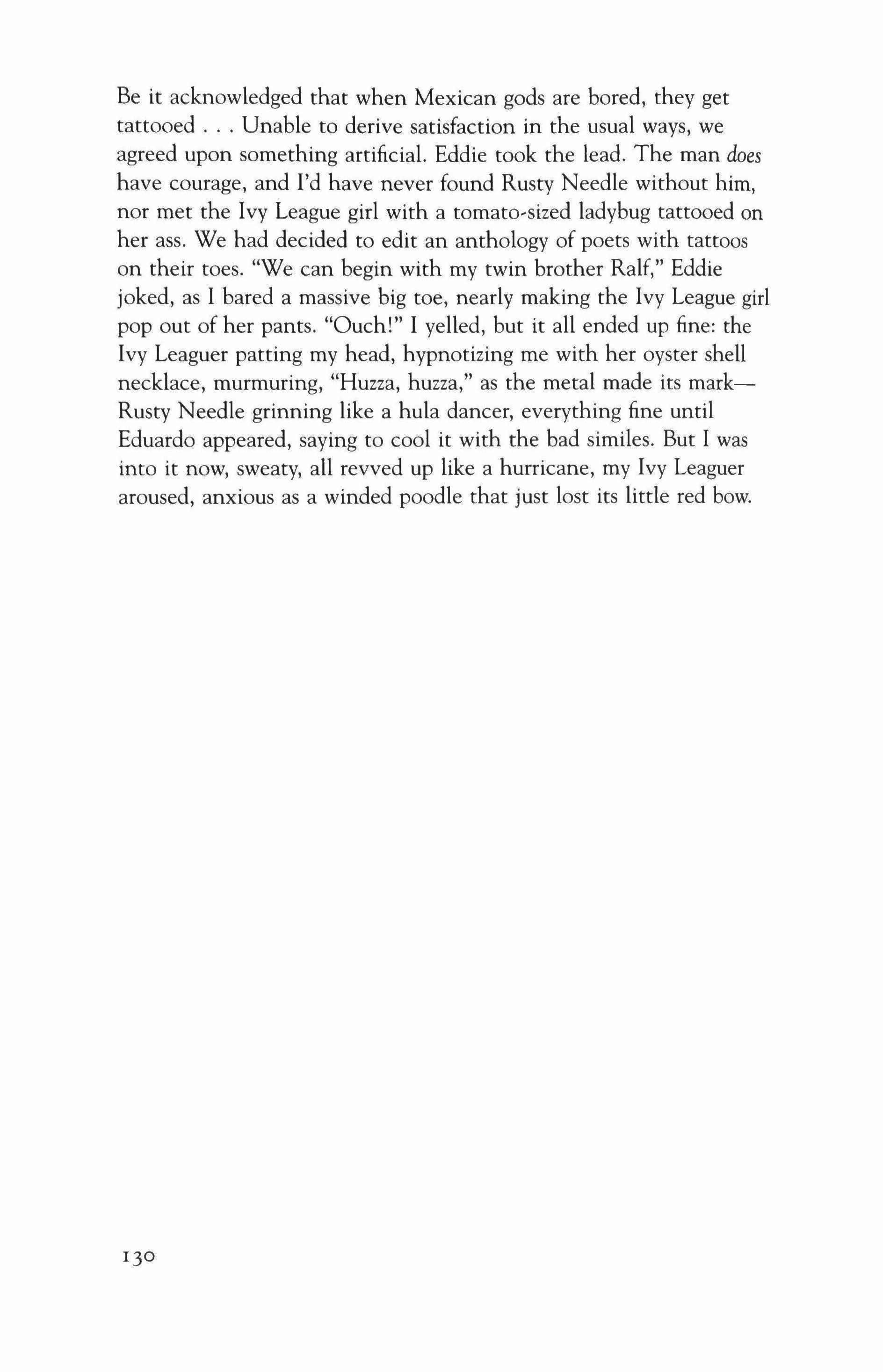
Be it acknowledged that when Mexican gods are bored, they get tattooed Unable to derive satisfaction in the usual ways, we agreed upon something artificial. Eddie took the lead. The man does have courage, and I'd have never found Rusty Needle without him, nor met the Ivy League girl with a tomato-sized ladybug tattooed on her ass. We had decided to edit an anthology of poets with tattoos on their toes. "We can begin with my twin brother Ralf," Eddie joked, as I bared a massive big toe, nearly making the Ivy League girl pop out of her pants. "Ouch!" I yelled, but it all ended up fine: the Ivy Leaguer patting my head, hypnotizing me with her oyster shell necklace, murmuring, "Huzza, huzza," as the metal made its markRusty Needle grinning like a hula dancer, everything fine until Eduardo appeared, saying to cool it with the bad similes. But I was into it now, sweaty, all revved up like a hurricane, my Ivy Leaguer aroused, anxious as a winded poodle that just lost its little red bow.
13°
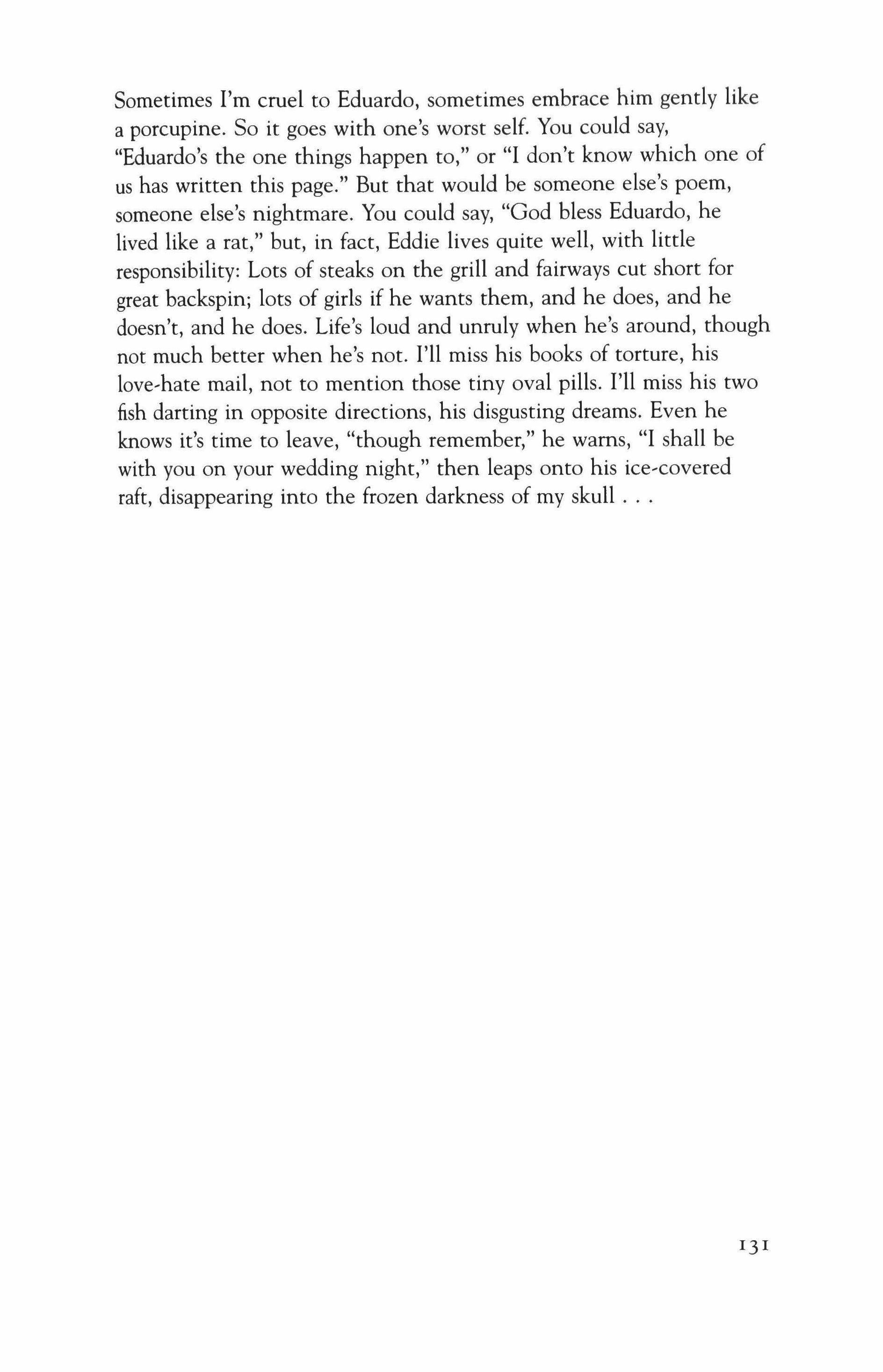
Sometimes I'm cruel to Eduardo, sometimes embrace him gently like a porcupine. So it goes with one's worst self. You could say, "Eduardo's the one things happen to," or "I don't know which one of us has written this page." But that would be someone else's poem, someone else's nightmare. You could say, "God bless Eduardo, he lived like a rat," but, in fact, Eddie lives quite well, with little responsibility: Lots of steaks on the grill and fairways cut short for great backspin; lots of girls if he wants them, and he does, and he doesn't, and he does. Life's loud and unruly when he's around, though not much better when he's not. I'll miss his books of torture, his love-hate mail, not to mention those tiny oval pills. I'll miss his two fish darting in opposite directions, his disgusting dreams. Even he knows it's time to leave, "though remember," he warns, "I shall be with you on your wedding night," then leaps onto his ice-covered raft, disappearing into the frozen darkness of my skull
131
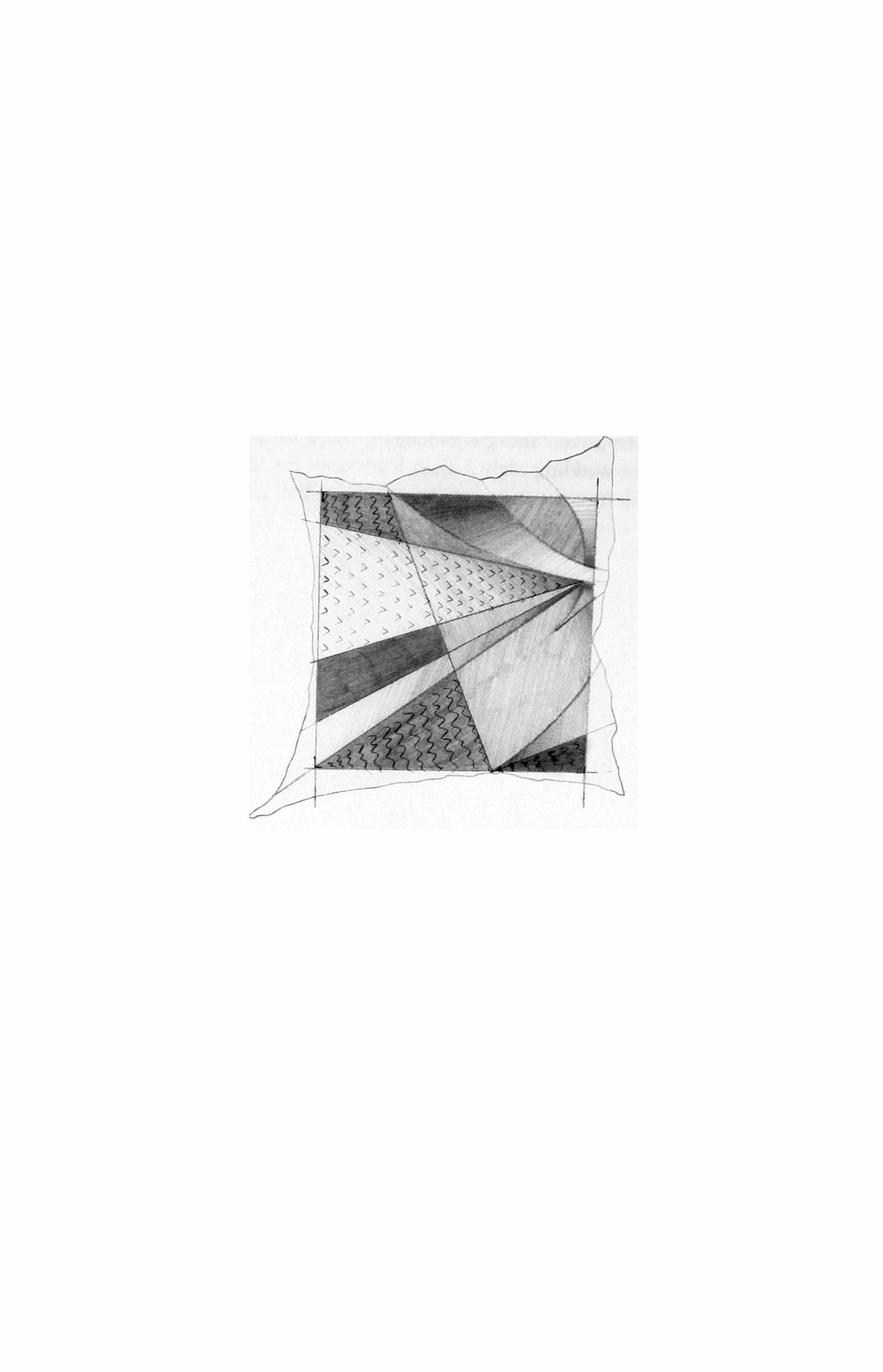
Michael Chitwood
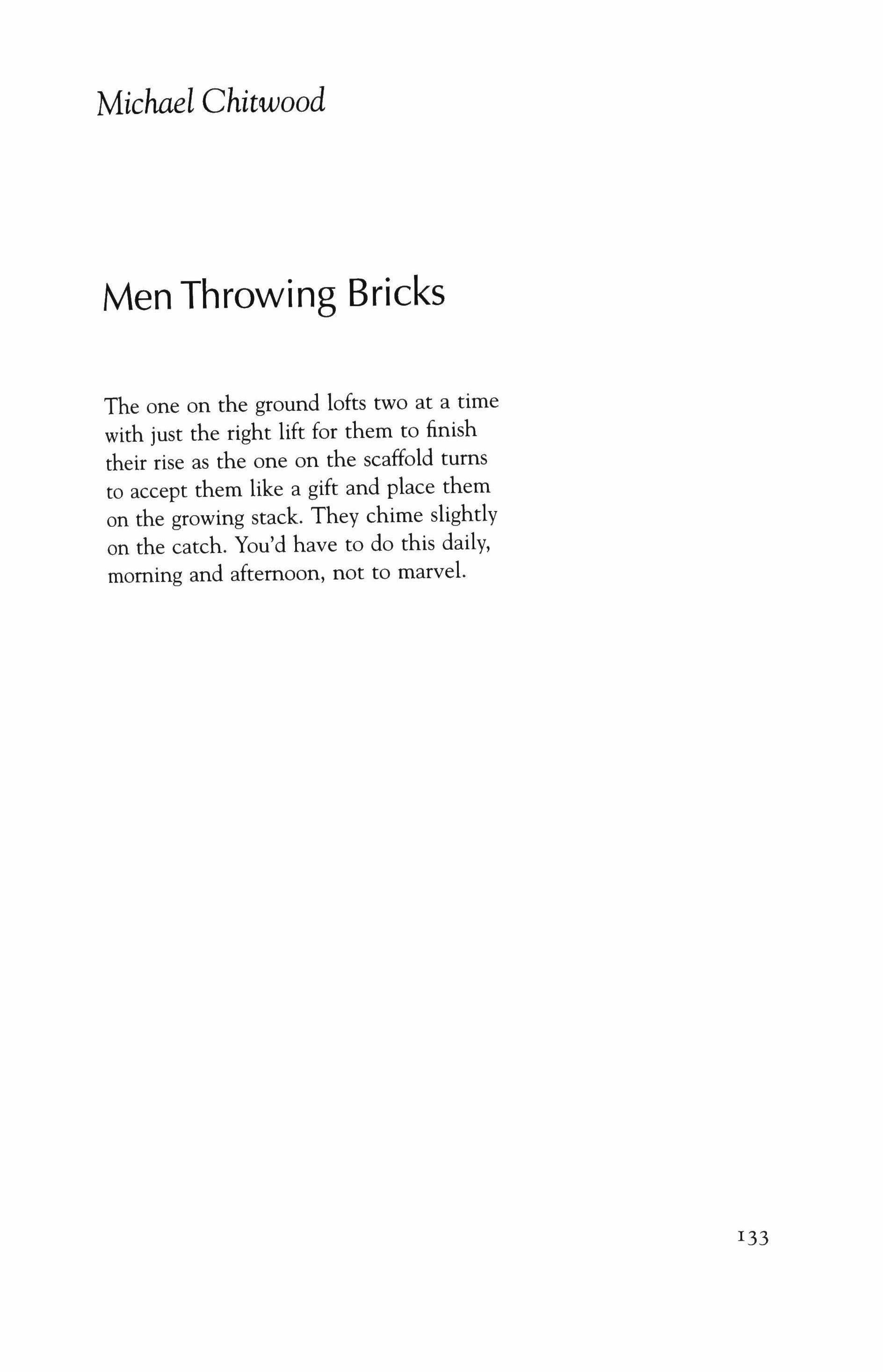
Men Throwing Bricks
The one on the ground lofts two at a time with just the right lift for them to finish their rise as the one on the scaffold turns to accept them like a gift and place them on the growing stack. They chime slightly on the catch. You'd have to do this daily, morning and afternoon, not to marvel.
133
The One Day
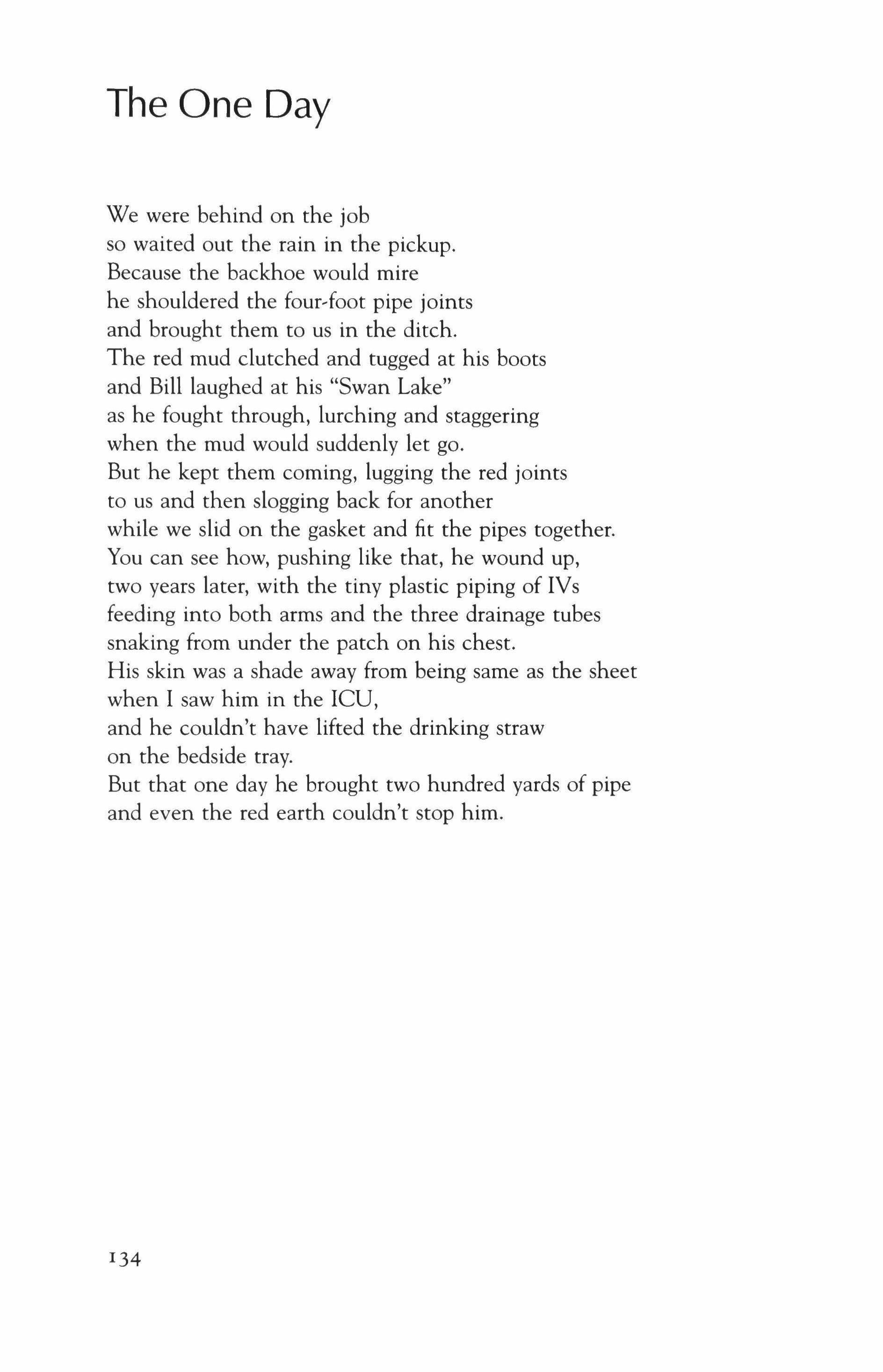
We were behind on the job so waited out the rain in the pickup. Because the backhoe would mire he shouldered the four-foot pipe joints and brought them to us in the ditch. The red mud clutched and tugged at his boots and Bill laughed at his "Swan Lake" as he fought through, lurching and staggering when the mud would suddenly let go. But he kept them coming, lugging the red joints to us and then slogging back for another while we slid on the gasket and fit the pipes together. You can see how, pushing like that, he wound up, two years later, with the tiny plastic piping of IVs feeding into both arms and the three drainage tubes snaking from under the patch on his chest. His skin was a shade away from being same as the sheet when I saw him in the ICU, and he couldn't have lifted the drinking straw on the bedside tray. But that one day he brought two hundred yards of pipe and even the red earth couldn't stop him.
134
Sandra M. Gilbert
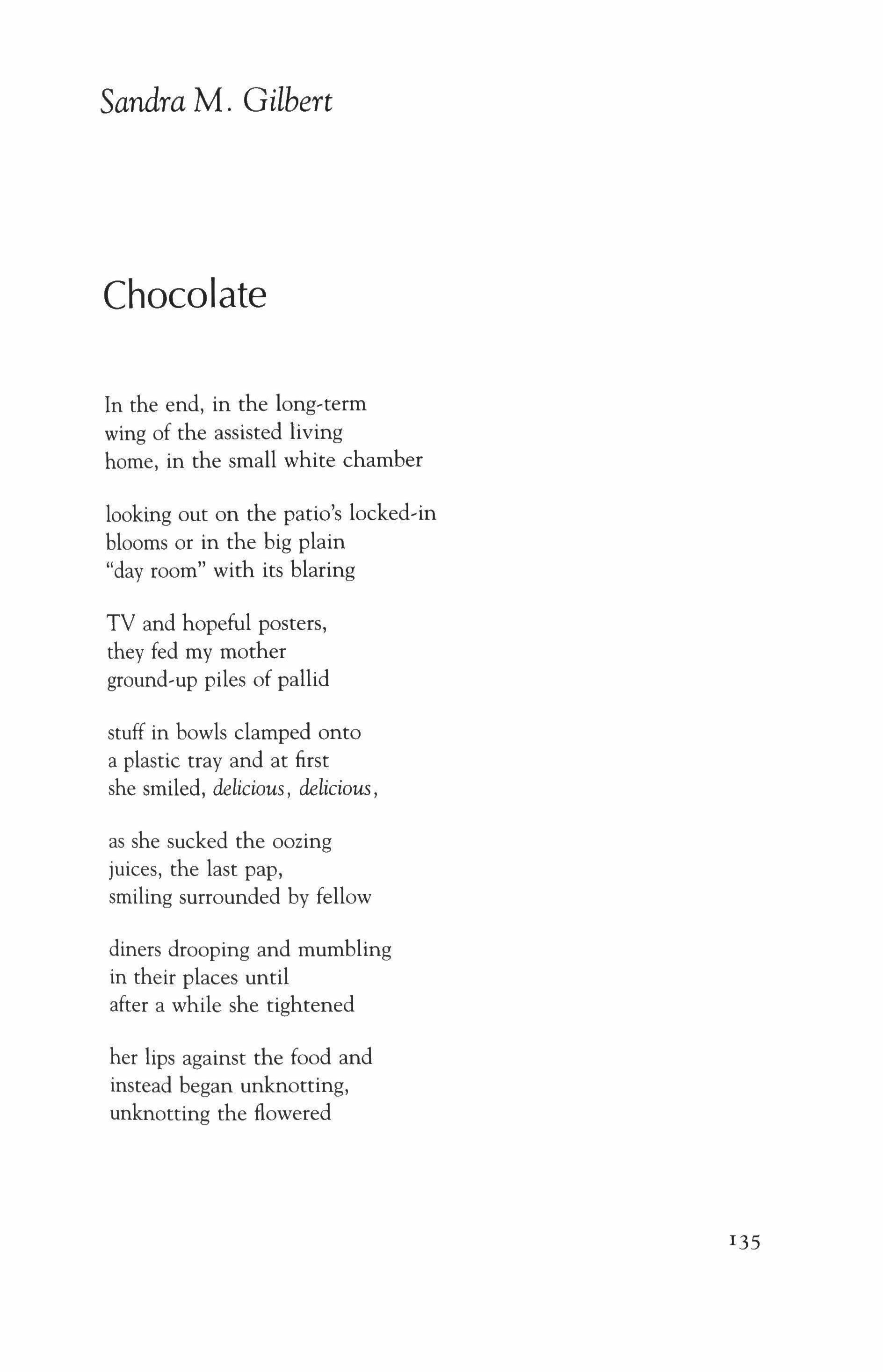
Chocolate
In the end, in the long-term wing of the assisted living home, in the small white chamber
looking out on the patio's locked-in blooms or in the big plain "day room" with its blaring
TV and hopeful posters, they fed my mother ground-up piles of pallid stuff in bowls clamped onto a plastic tray and at first she smiled, delicious, delicious, as she sucked the oozing juices, the last pap, smiling surrounded by fellow diners drooping and mumbling in their places until after a while she tightened her lips against the food and instead began unknotting, unknotting the flowered
I35
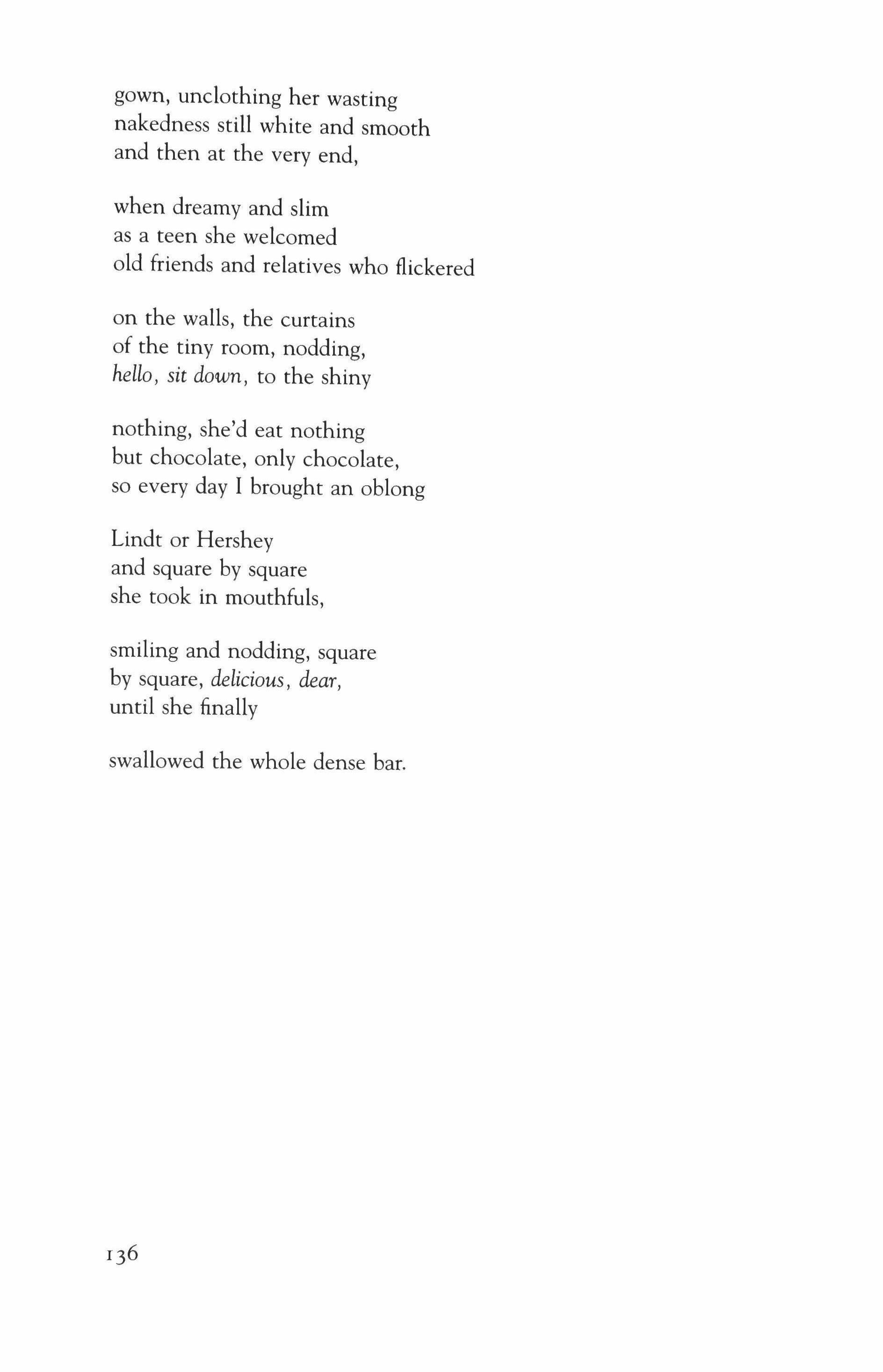
gown, unclothing her wasting nakedness still white and smooth and then at the very end, when dreamy and slim as a teen she welcomed old friends and relatives who flickered
on the walls, the curtains of the tiny room, nodding, hello, sit down, to the shiny nothing, she'd eat nothing but chocolate, only chocolate, so every day I brought an oblong Lindt or Hershey and square by square she took in mouthfuls, smiling and nodding, square by square, delicious, dear, until she finally swallowed the whole dense bar.
Remnant
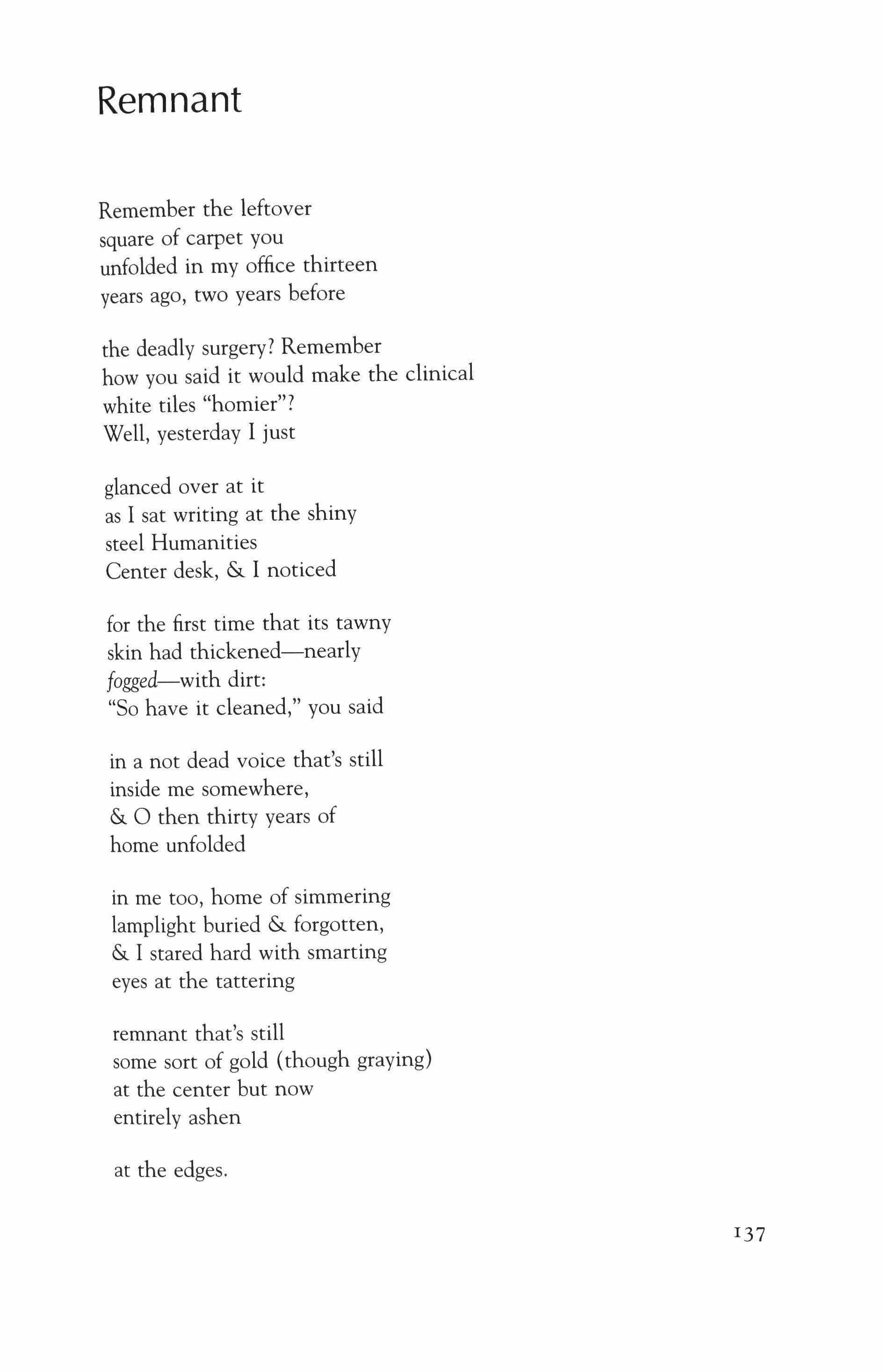
Remember the leftover square of carpet you unfolded in my office thirteen years ago, two years before the deadly surgery? Remember how you said it would make the clinical white tiles "homier"? Well, yesterday I just glanced over at it as I sat writing at the shiny steel Humanities Center desk, & I noticed for the first time that its tawny skin had thickened-nearly fogged-with dirt: "So have it cleaned," you said in a not dead voice that's still inside me somewhere, & 0 then thirty years of home unfolded in me too, home of simmering lamplight buried & forgotten, & I stared hard with smarting eyes at the tattering remnant that's still some sort of gold (though graying) at the center but now entirely ashen at the edges.
137
No One Argued about What to Call the Birds

A night sky with pain in it poured its dark over the back door where we stood in the cold losing each other and all I could think of were things of no use, which was everythingthe snow squalid at our feet, in the yard the deserted garden and the deracinated clouds obscuring the stars, even time mocking our stillness, its hands sweeping away from each other reluctantly, then crossing paths, again and again, and us forfeiting that kind of perennial dilly-dallying, that contact. What if I had said, please, Come back?
Who will bless the slaughterhouse? Who will mince jalapefios into a mass of perfect emeralds to toss into the food? Who will call the flamingoes? What if I had said, Stay?
Let me tell you about the photograph of a brain remembering that looked like the white faces of monkeys we saw together on a coast. Let me tell you about the sea ducks at Limantour, a pair diving at the surf,line, under and over, always in tandem. About the small harp I saw in the window of a music store, how the strings were strung between a straight edge and a curl of wood, and I thought how small the step between rapture and rupture. And let me read you this line from Herbert, who wrote"The wind understands that to really suffer, one has to be faithful" -so that we can sit together again and go on and on about grief until it becomes as bearable and orderly as a row of pigeons taking up every inch of a roof ridge all looking the same way in the rain.
Barbara Ras
Deborah Cummins
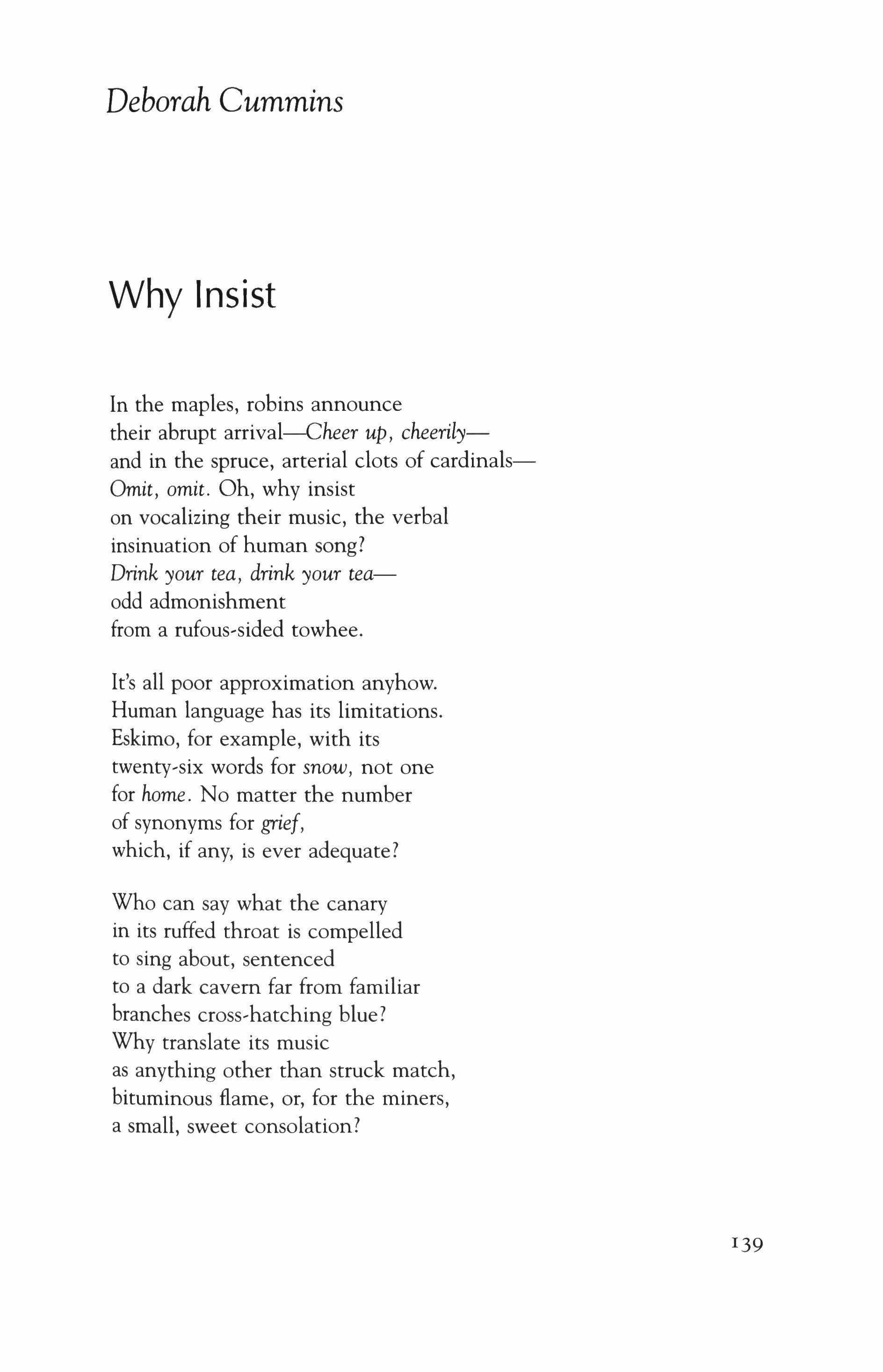
Why Insist
In the maples, robins announce their abrupt arrival-Cheer up, cheerilyand in the spruce, arterial clots of cardinalsOmit, omit. Oh, why insist on vocalizing their music, the verbal insinuation of human song? Drink your tea, drink your teaodd admonishment from a rufous-sided towhee.
It's all poor approximation anyhow. Human language has its limitations. Eskimo, for example, with its twenty-six words for snow, not one for home. No matter the number of synonyms for grief, which, if any, is ever adequate?
Who can say what the canary in its ruffed throat is compelled to sing about, sentenced to a dark cavern far from familiar branches cross-hatching blue? Why translate its music as anything other than struck match, bituminous flame, or, for the miners, a small, sweet consolation?
139
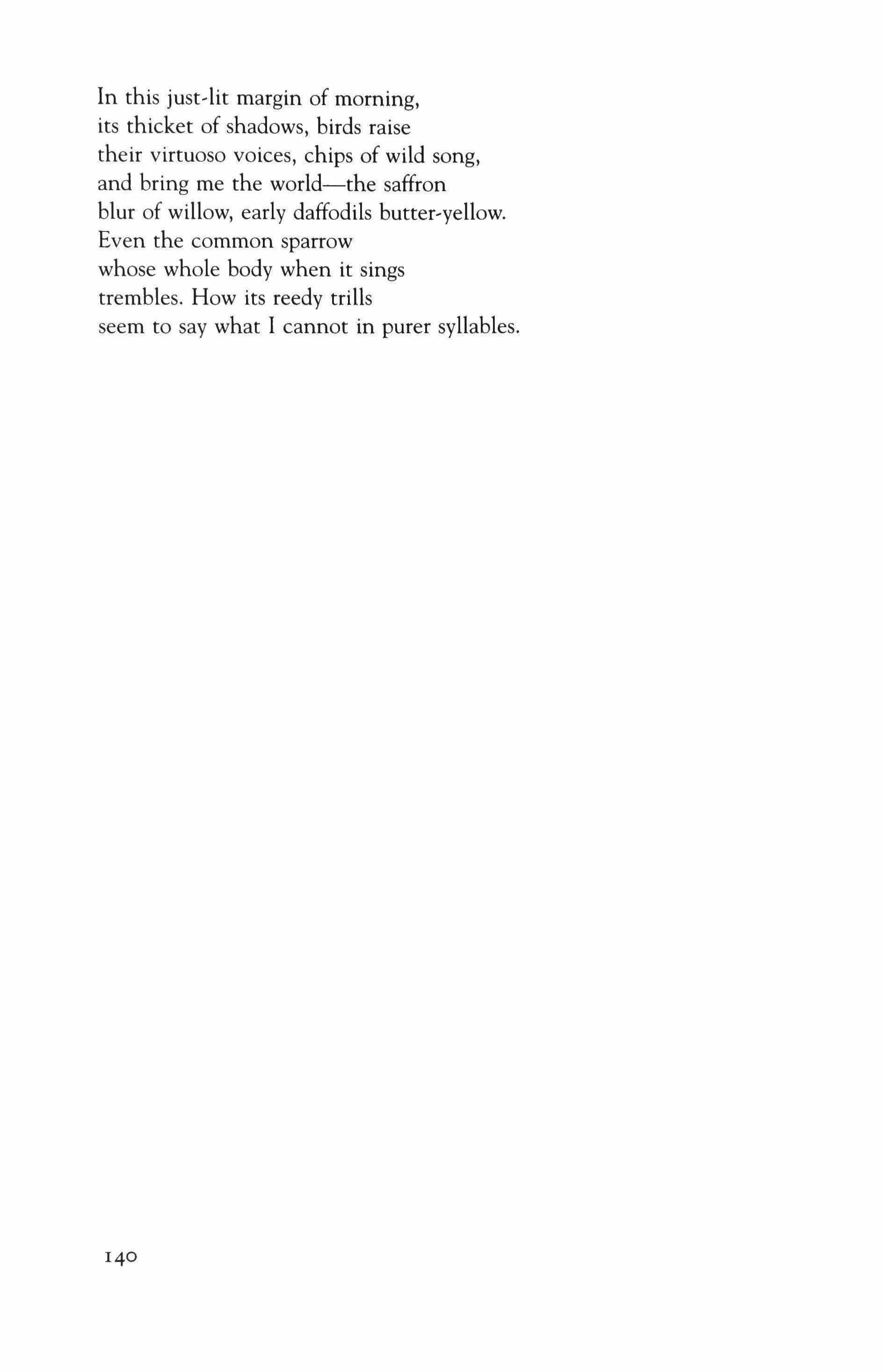
In this just-lit margin of morning, its thicket of shadows, birds raise their virtuoso voices, chips of wild song, and bring me the world-the saffron blur of willow, early daffodils butter-yellow. Even the common sparrow whose whole body when it sings trembles. How its reedy trills seem to say what I cannot in purer syllables.
Sharon Olds
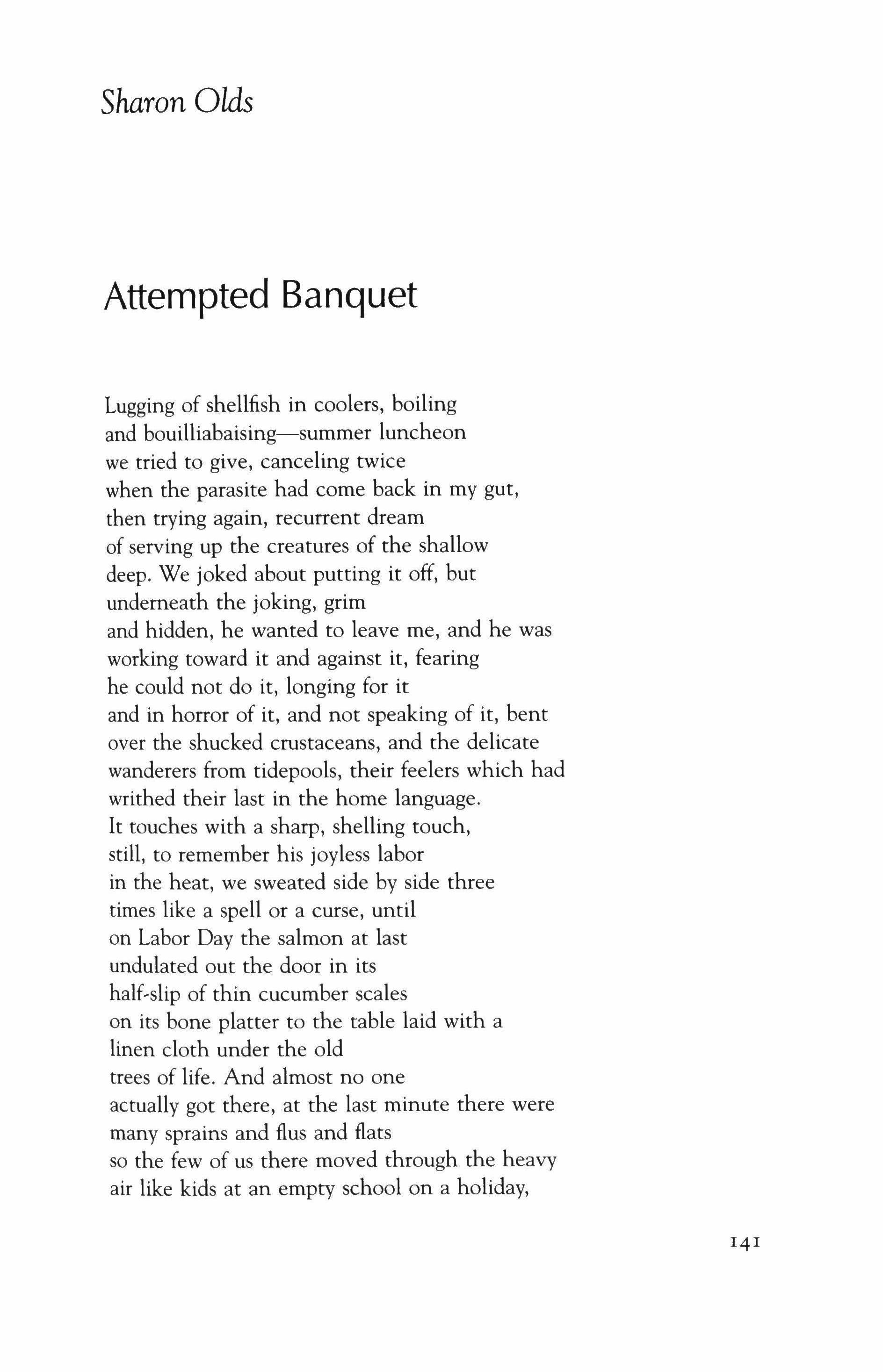
Attempted Banquet
Lugging of shellfish in coolers, boiling and bouilliabaising-summer luncheon we tried to give, canceling twice when the parasite had come back in my gut, then trying again, recurrent dream of serving up the creatures of the shallow deep. We joked about putting it off, but underneath the joking, grim and hidden, he wanted to leave me, and he was working toward it and against it, fearing he could not do it, longing for it and in horror of it, and not speaking of it, bent over the shucked crustaceans, and the delicate wanderers from tidepools, their feelers which had writhed their last in the home language. It touches with a sharp, shelling touch, still, to remember his joyless labor in the heat, we sweated side by side three times like a spell or a curse, until on Labor Day the salmon at last undulated out the door in its half-slip of thin cucumber scales on its bone platter to the table laid with a linen cloth under the old trees of life. And almost no one actually got there, at the last minute there were many sprains and flus and flats so the few of us there moved through the heavy air like kids at an empty school on a holiday,
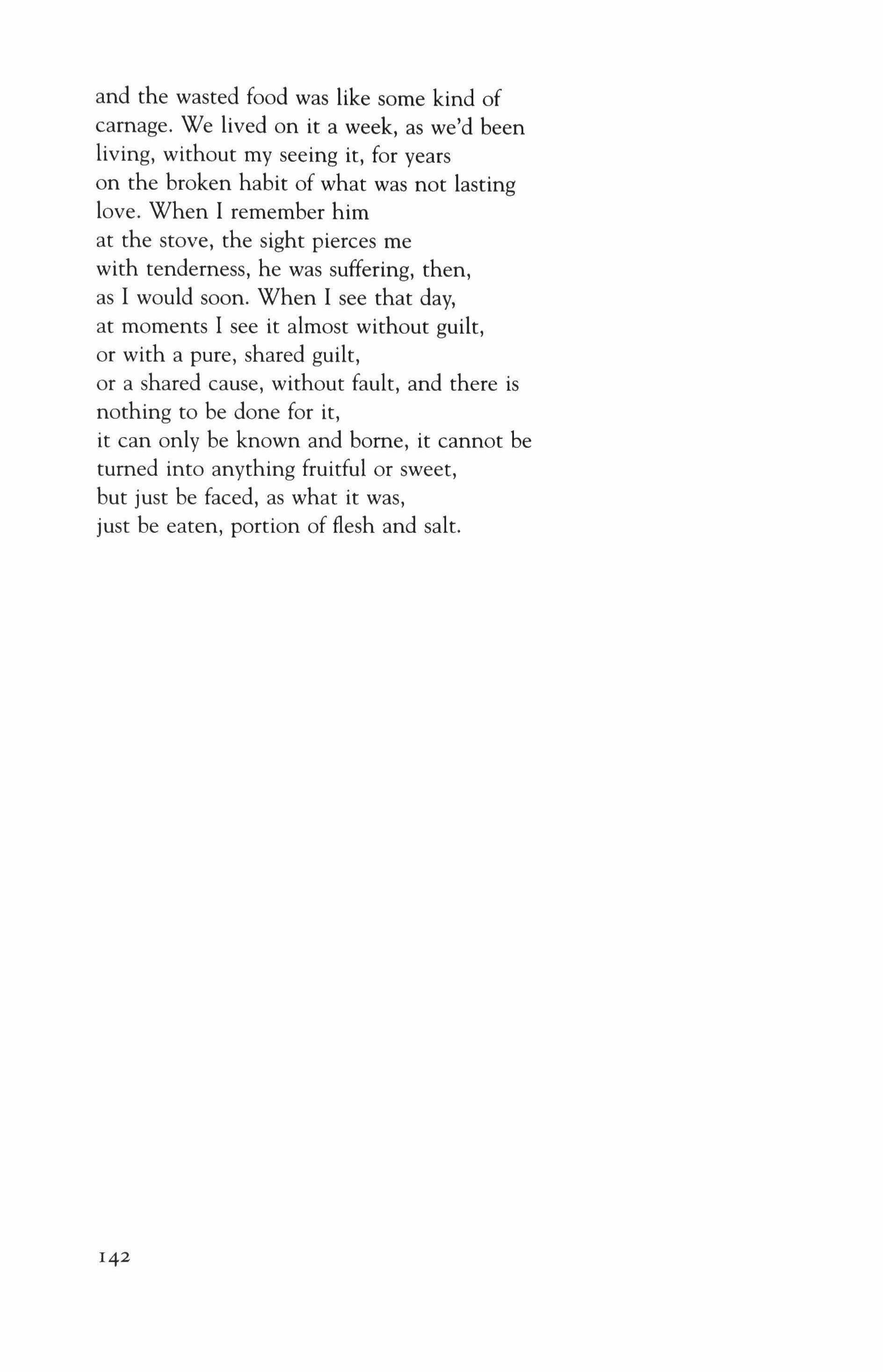
and the wasted food was like some kind of carnage. We lived on it a week, as we'd been living, without my seeing it, for years on the broken habit of what was not lasting love. When I remember him at the stove, the sight pierces me with tenderness, he was suffering, then, as I would soon. When I see that day, at moments I see it almost without guilt, or with a pure, shared guilt, or a shared cause, without fault, and there is nothing to be done for it, it can only be known and borne, it cannot be turned into anything fruitful or sweet, but just be faced, as what it was, just be eaten, portion of flesh and salt.
To Our Miscarried One,
AgeThirty Now
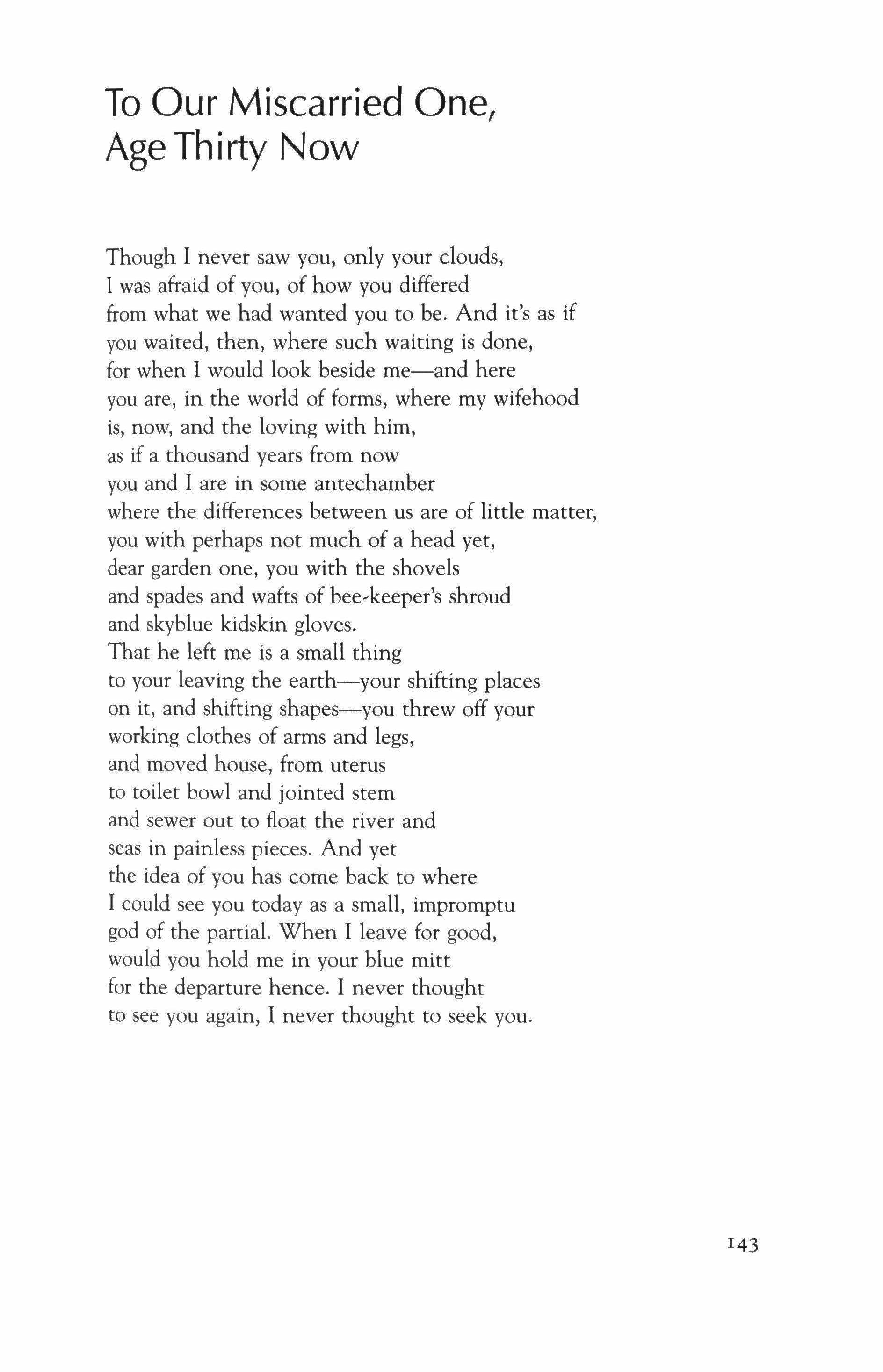
Though I never saw you, only your clouds, I was afraid of you, of how you differed from what we had wanted you to be. And it's as if you waited, then, where such waiting is done, for when I would look beside me-and here you are, in the world of forms, where my wifehood is, now, and the loving with him, as if a thousand years from now you and I are in some antechamber where the differences between us are of little matter, you with perhaps not much of a head yet, dear garden one, you with the shovels and spades and wafts of bee-keeper's shroud and skyblue kidskin gloves. That he left me is a small thing to your leaving the earth-your shifting places on it, and shifting shapes-you threw off your working clothes of arms and legs, and moved house, from uterus to toilet bowl and jointed stem and sewer out to float the river and seas in painless pieces. And yet the idea of you has come back to where I could see you today as a small, impromptu god of the partial. When I leave for good, would you hold me in your blue mitt for the departure hence. I never thought to see you again, I never thought to seek you.
143
Western Wind
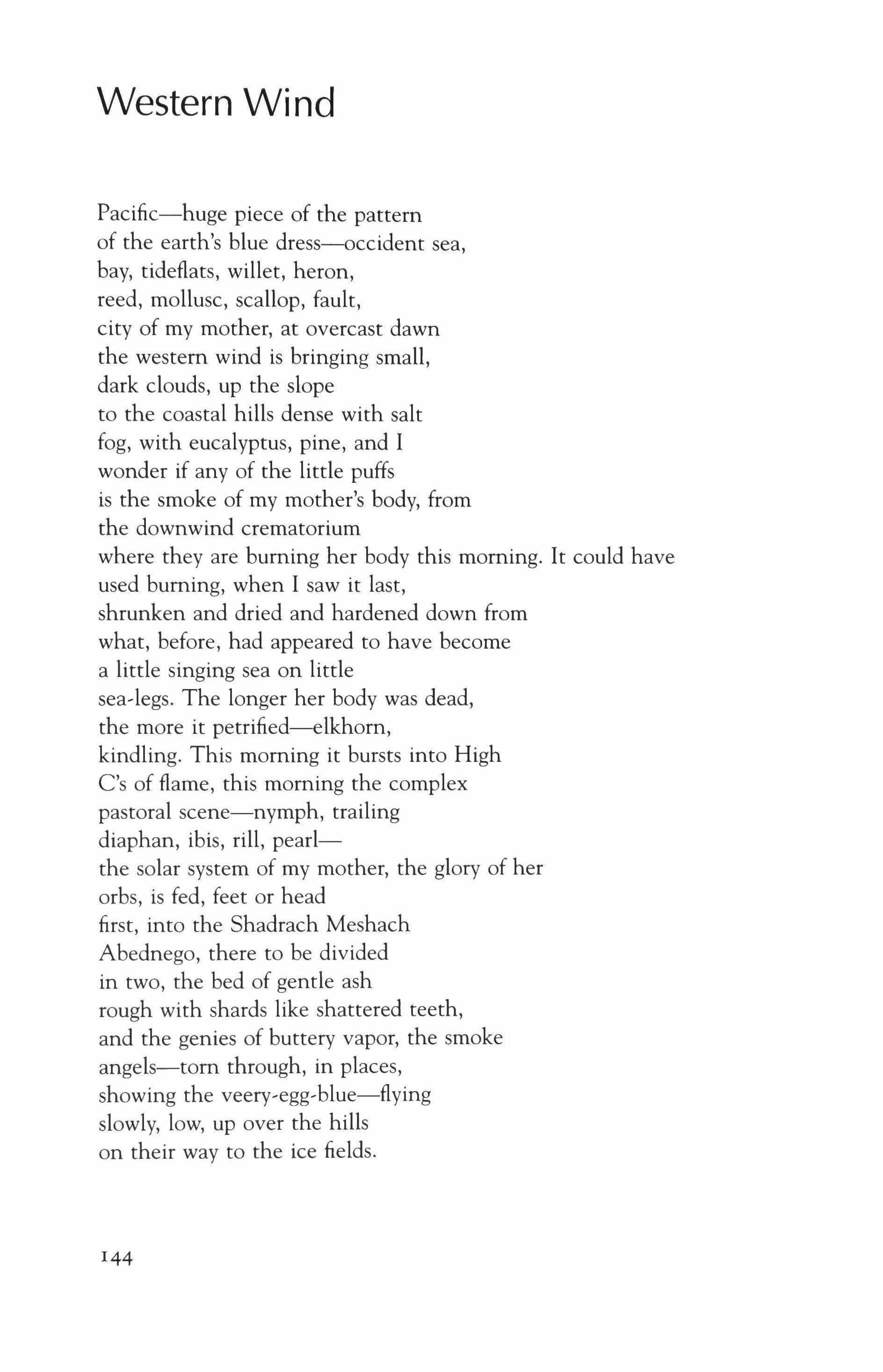
Pacific-huge piece of the pattern of the earth's blue dress-occident sea, bay, tideflats, willet, heron, reed, mollusc, scallop, fault, city of my mother, at overcast dawn the western wind is bringing small, dark clouds, up the slope to the coastal hills dense with salt fog, with eucalyptus, pine, and I wonder if any of the little puffs is the smoke of my mother's body, from the downwind crematorium where they are burning her body this morning. It could have used burning, when I saw it last, shrunken and dried and hardened down from what, before, had appeared to have become a little singing sea on little sea-legs. The longer her body was dead, the more it petrified-elkhorn, kindling. This morning it bursts into High C's of flame, this morning the complex pastoral scene-nymph, trailing diaphan, ibis, rill, pearlthe solar system of my mother, the glory of her orbs, is fed, feet or head first, into the Shadrach Meshach Abednego, there to be divided in two, the bed of gentle ash rough with shards like shattered teeth, and the genies of buttery vapor, the smoke angels-torn through, in places, showing the veery-egg-blue-e-flving slowly, low, up over the hills on their way to the ice fields.
144
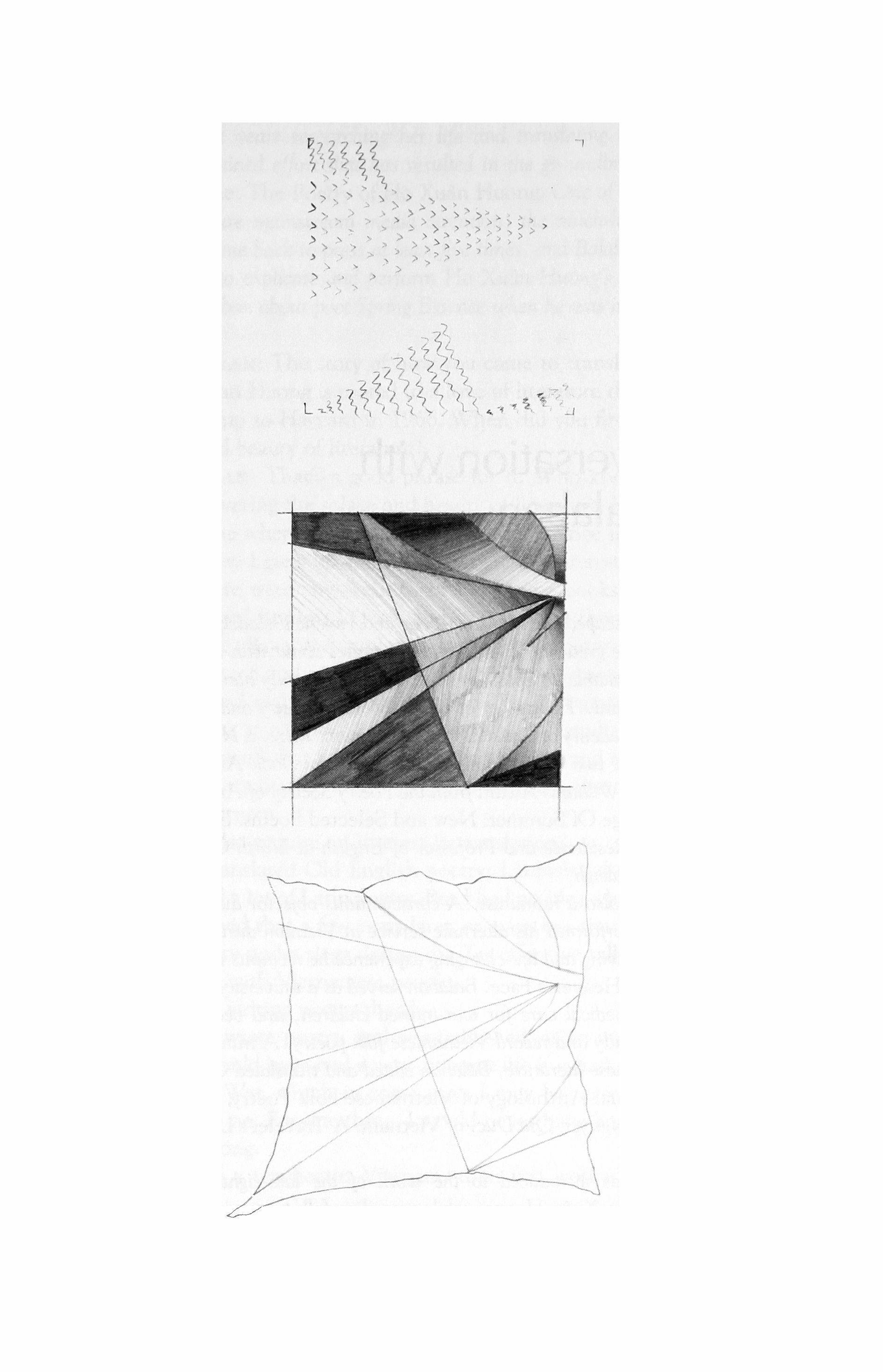
�1 j \ <, ) ---�(
Donna Seaman
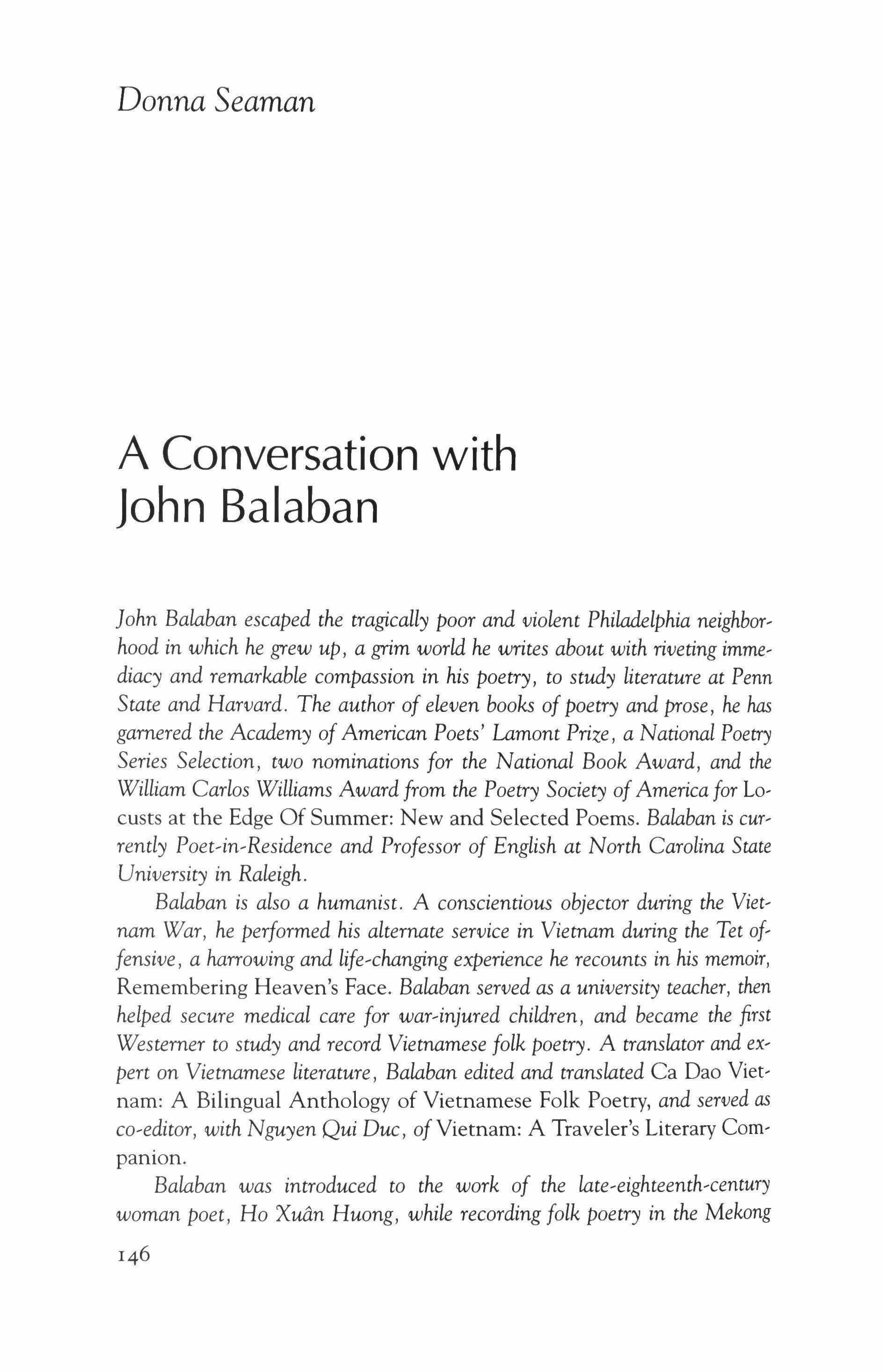
A Conversation with John Balaban
John Balaban escaped the tragically poor and violent Philadelphia neighbor, hood in which he grew up, a grim world he writes about with riveting immediacy and remarkable compassion in his poetry, to study literature at Penn State and Harvard. The author of eleven books of poetry and prose, he has garnered the Academy of American Poets' Lamont Prize, a National Poetry Series Selection, two nominations for the National Book Award, and the William Carlos Williams Award from the Poetry Society of America for La, custs at the Edge Of Summer: New and Selected Poems. Balaban is cur, rently Poet,in,Residence and Professor of English at North Carolina State University in Raleigh.
Balaban is also a humanist. A conscientious objector during the Viet' nam War, he performed his alternate service in Vietnam during the Tet offensive, a harrowing and life,changing experience he recounts in his memoir, Remembering Heaven's Face. Balaban served as a university teacher, then helped secure medical care for war,injured children, and became the first Westerner to study and record Vietnamese folk poetry. A translator and ex, pert on Vietnamese literature, Balaban edited and translated Ca Dao Viet' nam: A Bilingual Anthology of Vietnamese Folk Poetry, and served as co-eduor, with Nguyen Qui Due, of Vietnam: A Traveler's Literary Com' panion.
Balaban was introduced to the work of the late,eighteenth,century woman poet, Ho Xuan Huong, while recording folk poetry in the Mekong
146
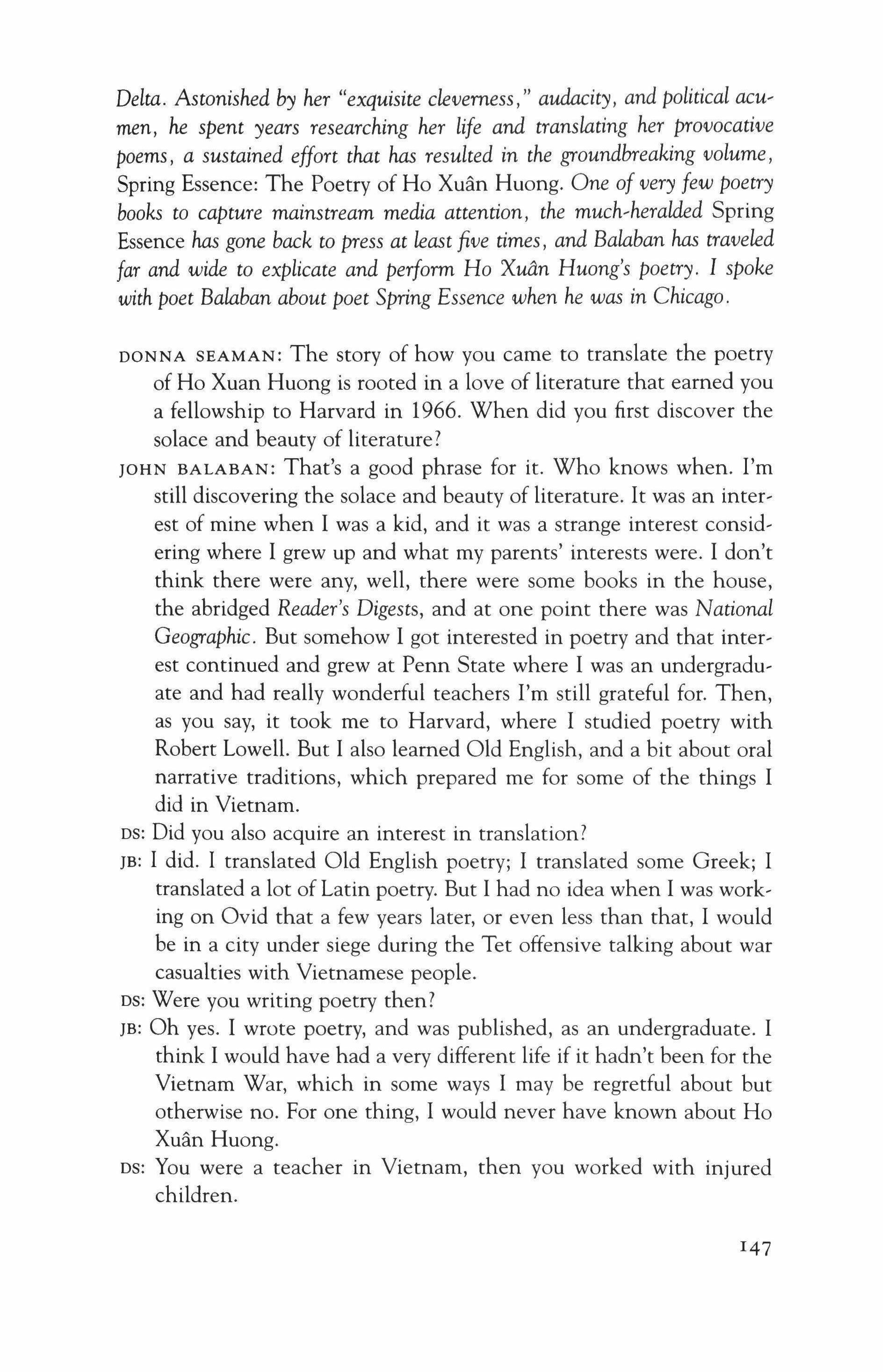
Delta. Astonished by her "exquisite cleverness," audacity, and political acu� men, he spent years researching her life and translating her provocative poems, a sustained effort that has resulted in the groundbreaking volume, Spring Essence: The Poetry of Ho Xuan Huong. One of very few poetry books to capture mainstream media attention, the much�heralded Spring Essence has gone back to press at least five times, and Balaban has traveled far and wide to explicate and perform Ho xuan Huong's poetry. I spoke with poet Balaban about poet Spring Essence when he was in Chicago.
DONNA SEAMAN: The story of how you came to translate the poetry of Ho Xuan Huong is rooted in a love of literature that earned you a fellowship to Harvard in 1966. When did you first discover the solace and beauty of literature?
JOHN BALABAN: That's a good phrase for it. Who knows when. I'm still discovering the solace and beauty of literature. It was an interest of mine when I was a kid, and it was a strange interest considering where I grew up and what my parents' interests were. I don't think there were any, well, there were some books in the house, the abridged Reader's Digests, and at one point there was National Geographic. But somehow I got interested in poetry and that interest continued and grew at Penn State where I was an undergraduate and had really wonderful teachers I'm still grateful for. Then, as you say, it took me to Harvard, where I studied poetry with Robert Lowell. But I also learned Old English, and a bit about oral narrative traditions, which prepared me for some of the things I did in Vietnam.
DS: Did you also acquire an interest in translation?
JB: I did. I translated Old English poetry; I translated some Greek; I translated a lot of Latin poetry. But I had no idea when I was working on Ovid that a few years later, or even less than that, I would be in a city under siege during the Tet offensive talking about war casualties with Vietnamese people.
DS: Were you writing poetry then?
JB: Oh yes. I wrote poetry, and was published, as an undergraduate. I think I would have had a very different life if it hadn't been for the Vietnam War, which in some ways I may be regretful about but otherwise no. For one thing, I would never have known about Ho Xuan Huong.
DS: You were a teacher in Vietnam, then you worked with injured children.
147
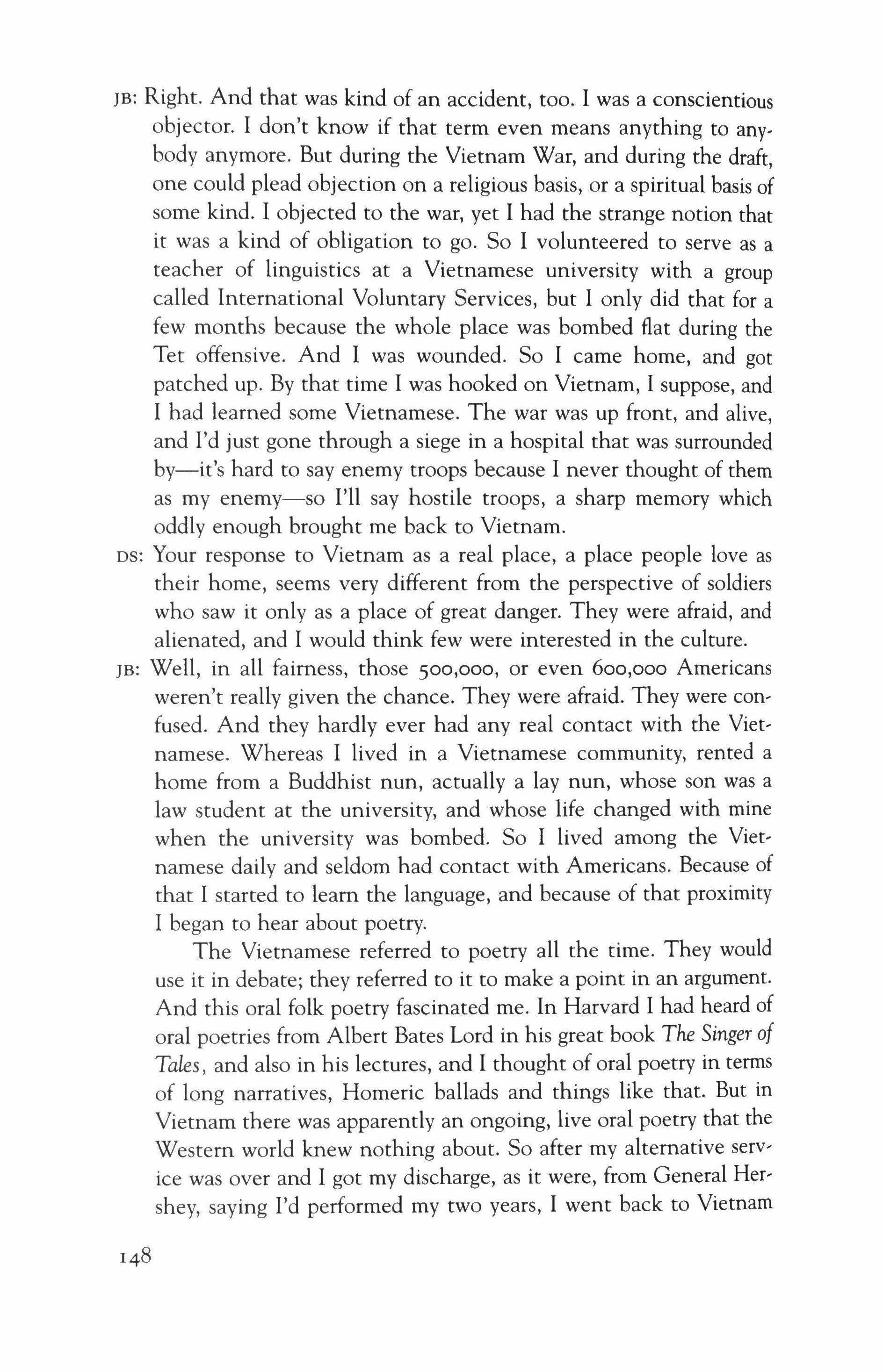
JB: Right. And that was kind of an accident, too. I was a conscientious objector. I don't know if that term even means anything to anybody anymore. But during the Vietnam War, and during the draft, one could plead objection on a religious basis, or a spiritual basis of some kind. I objected to the war, yet I had the strange notion that it was a kind of obligation to go. So I volunteered to serve as a teacher of linguistics at a Vietnamese university with a group called International Voluntary Services, but I only did that for a few months because the whole place was bombed flat during the Tet offensive. And I was wounded. So I came home, and got patched up. By that time I was hooked on Vietnam, I suppose, and I had learned some Vietnamese. The war was up front, and alive, and I'd just gone through a siege in a hospital that was surrounded by-it's hard to say enemy troops because I never thought of them as my enemy-so I'll say hostile troops, a sharp memory which oddly enough brought me back to Vietnam.
DS: Your response to Vietnam as a real place, a place people love as their home, seems very different from the perspective of soldiers who saw it only as a place of great danger. They were afraid, and alienated, and I would think few were interested in the culture.
JB: Well, in all fairness, those 500,000, or even 600,000 Americans weren't really given the chance. They were afraid. They were confused. And they hardly ever had any real contact with the Vietnamese. Whereas I lived in a Vietnamese community, rented a home from a Buddhist nun, actually a lay nun, whose son was a law student at the university, and whose life changed with mine when the university was bombed. So I lived among the Vietnamese daily and seldom had contact with Americans. Because of that I started to learn the language, and because of that proximity I began to hear about poetry.
The Vietnamese referred to poetry all the time. They would use it in debate; they referred to it to make a point in an argument. And this oral folk poetry fascinated me. In Harvard I had heard of oral poetries from Albert Bates Lord in his great book The Singer of Tales, and also in his lectures, and I thought of oral poetry in terms of long narratives, Homeric ballads and things like that. But in Vietnam there was apparently an ongoing, live oral poetry that the Western world knew nothing about. So after my alternative service was over and I got my discharge, as it were, from General Hershey, saying I'd performed my two years, I went back to Vietnam
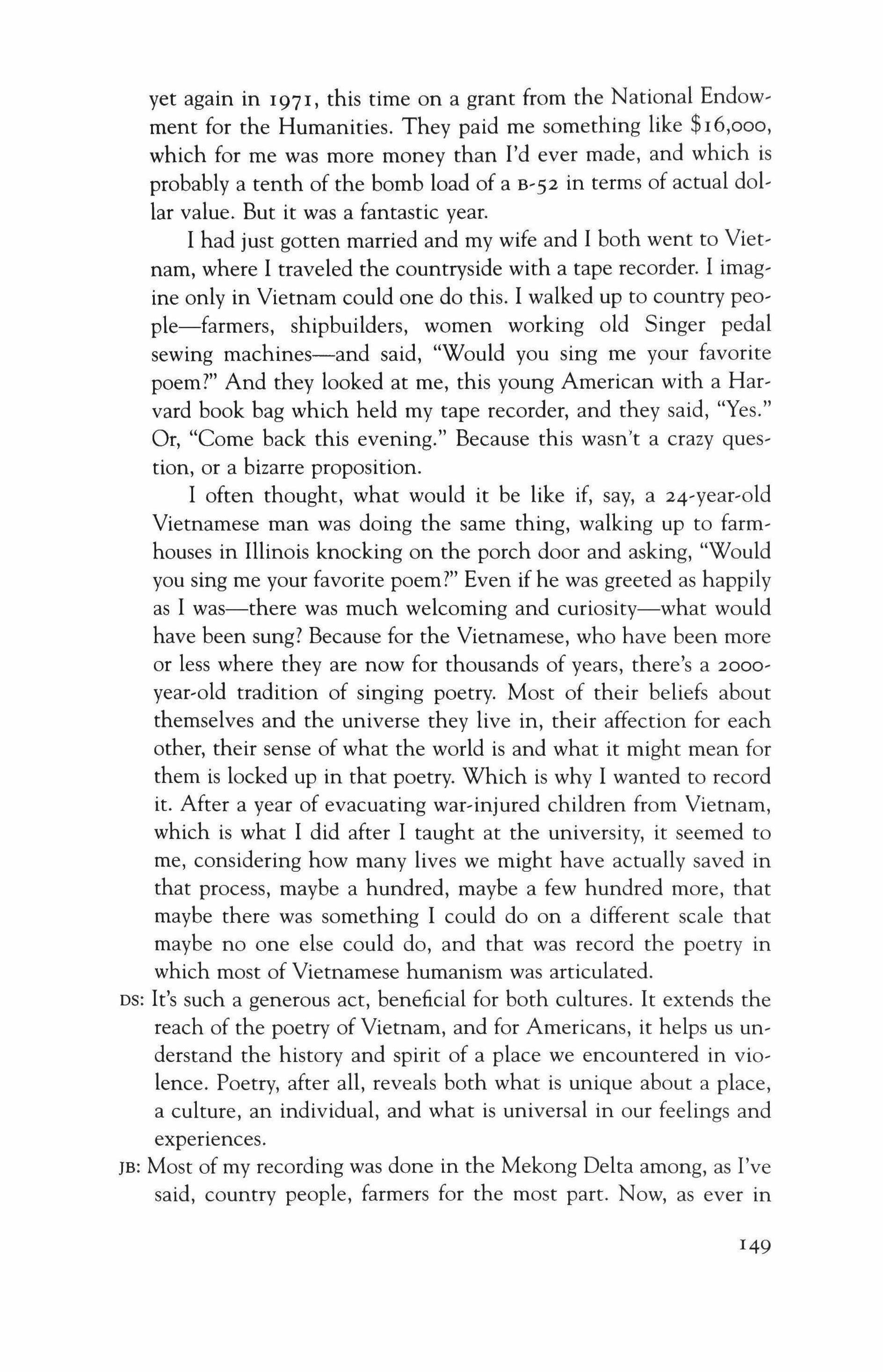
yet again in 1971, this time on a grant from the National Endowment for the Humanities. They paid me something like $ I 6,000, which for me was more money than I'd ever made, and which is probably a tenth of the bomb load of a B-52 in terms of actual dollar value. But it was a fantastic year.
I had just gotten married and my wife and I both went to Vietnam, where I traveled the countryside with a tape recorder. I imagine only in Vietnam could one do this. I walked up to country people-farmers, shipbuilders, women working old Singer pedal sewing machines-and said, "Would you sing me your favorite poem?" And they looked at me, this young American with a Harvard book bag which held my tape recorder, and they said, "Yes." Or, "Come back this evening." Because this wasn't a crazy question, or a bizarre proposition.
I often thought, what would it be like if, say, a 24-year-old Vietnamese man was doing the same thing, walking up to farmhouses in Illinois knocking on the porch door and asking, "Would you sing me your favorite poem?" Even if he was greeted as happily as I was-there was much welcoming and curiosity-what would have been sung? Because for the Vietnamese, who have been more or less where they are now for thousands of years, there's a 2000year-old tradition of singing poetry. Most of their beliefs about themselves and the universe they live in, their affection for each other, their sense of what the world is and what it might mean for them is locked up in that poetry. Which is why I wanted to record it. After a year of evacuating war-injured children from Vietnam, which is what I did after I taught at the university, it seemed to me, considering how many lives we might have actually saved in that process, maybe a hundred, maybe a few hundred more, that maybe there was something I could do on a different scale that maybe no one else could do, and that was record the poetry in which most of Vietnamese humanism was articulated.
DS: It's such a generous act, beneficial for both cultures. It extends the reach of the poetry of Vietnam, and for Americans, it helps us understand the history and spirit of a place we encountered in violence. Poetry, after all, reveals both what is unique about a place, a culture, an individual, and what is universal in our feelings and experiences.
JB: Most of my recording was done in the Mekong Delta among, as I've said, country people, farmers for the most part. Now, as ever in
149
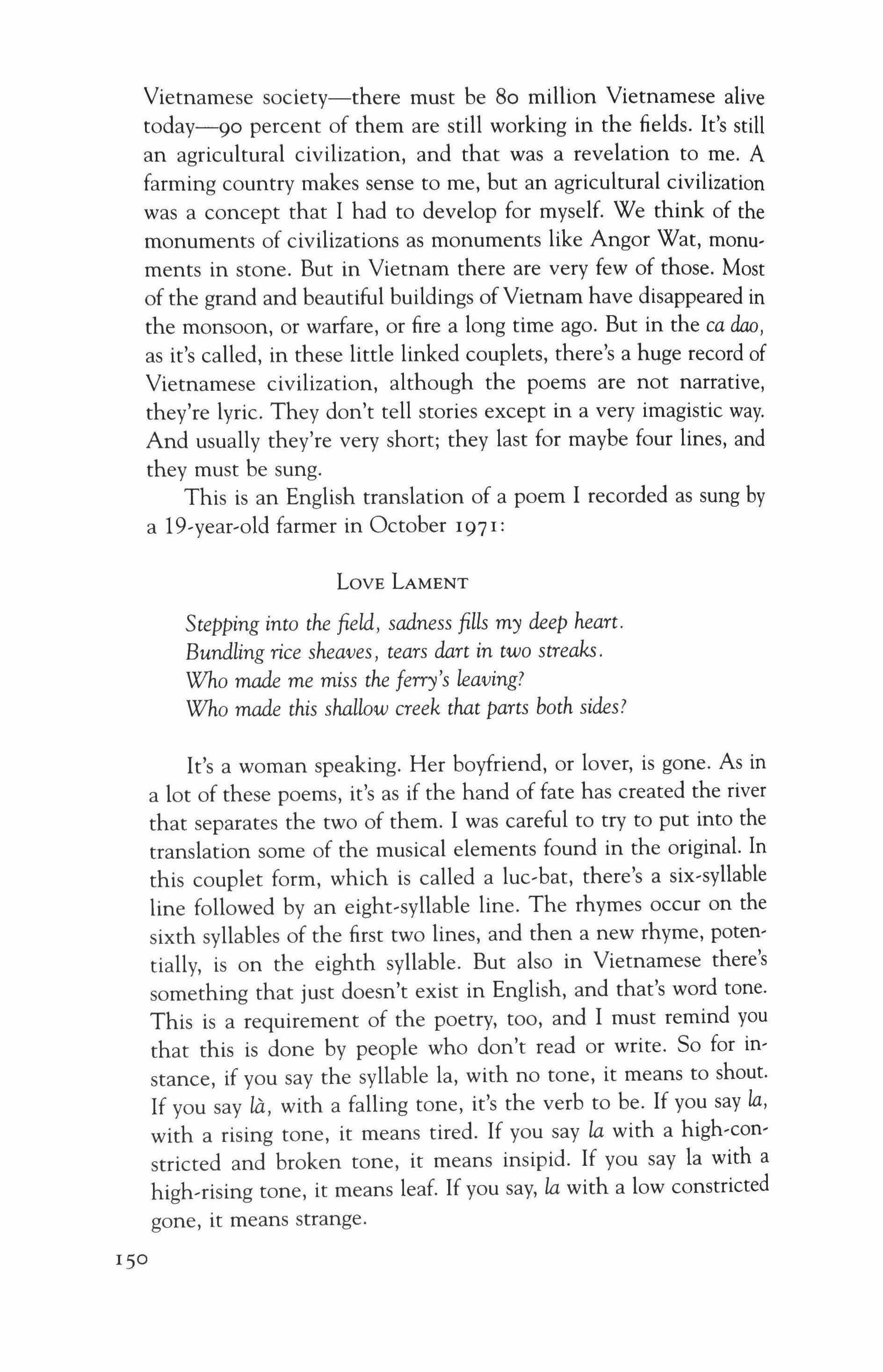
Vietnamese society-there must be 80 million Vietnamese alive today-c-oo percent of them are still working in the fields. It's still an agricultural civilization, and that was a revelation to me. A farming country makes sense to me, but an agricultural civilization was a concept that I had to develop for myself. We think of the monuments of civilizations as monuments like Angor Wat, monuments in stone. But in Vietnam there are very few of those. Most of the grand and beautiful buildings of Vietnam have disappeared in the monsoon, or warfare, or fire a long time ago. But in the ca dao, as it's called, in these little linked couplets, there's a huge record of Vietnamese civilization, although the poems are not narrative, they're lyric. They don't tell stories except in a very imagistic way. And usually they're very short; they last for maybe four lines, and they must be sung.
This is an English translation of a poem I recorded as sung by a 19-year-old farmer in October 197 I:
LOVE LAMENT
Stepping into the field, sadness fills my deep heart. Bundling rice sheaves, tears dart in two streaks. Who made me miss the ferry's leaving?
Who made this shallow creek that parts both sides?
It's a woman speaking. Her boyfriend, or lover, is gone. As in a lot of these poems, it's as if the hand of fate has created the river that separates the two of them. I was careful to try to put into the translation some of the musical elements found in the original. In this couplet form, which is called a luc-bat, there's a six-syllable line followed by an eight-syllable line. The rhymes occur on the sixth syllables of the first two lines, and then a new rhyme, potentially, is on the eighth syllable. But also in Vietnamese there's something that just doesn't exist in English, and that's word tone. This is a requirement of the poetry, too, and I must remind you that this is done by people who don't read or write. So for instance, if you say the syllable la, with no tone, it means to shout. If you say la, with a falling tone, it's the verb to be. If you say la, with a rising tone, it means tired. If you say la with a high-constricted and broken tone, it means insipid. If you say la with a high-rising tone, it means leaf. If you say, la with a low constricted gone, it means strange.
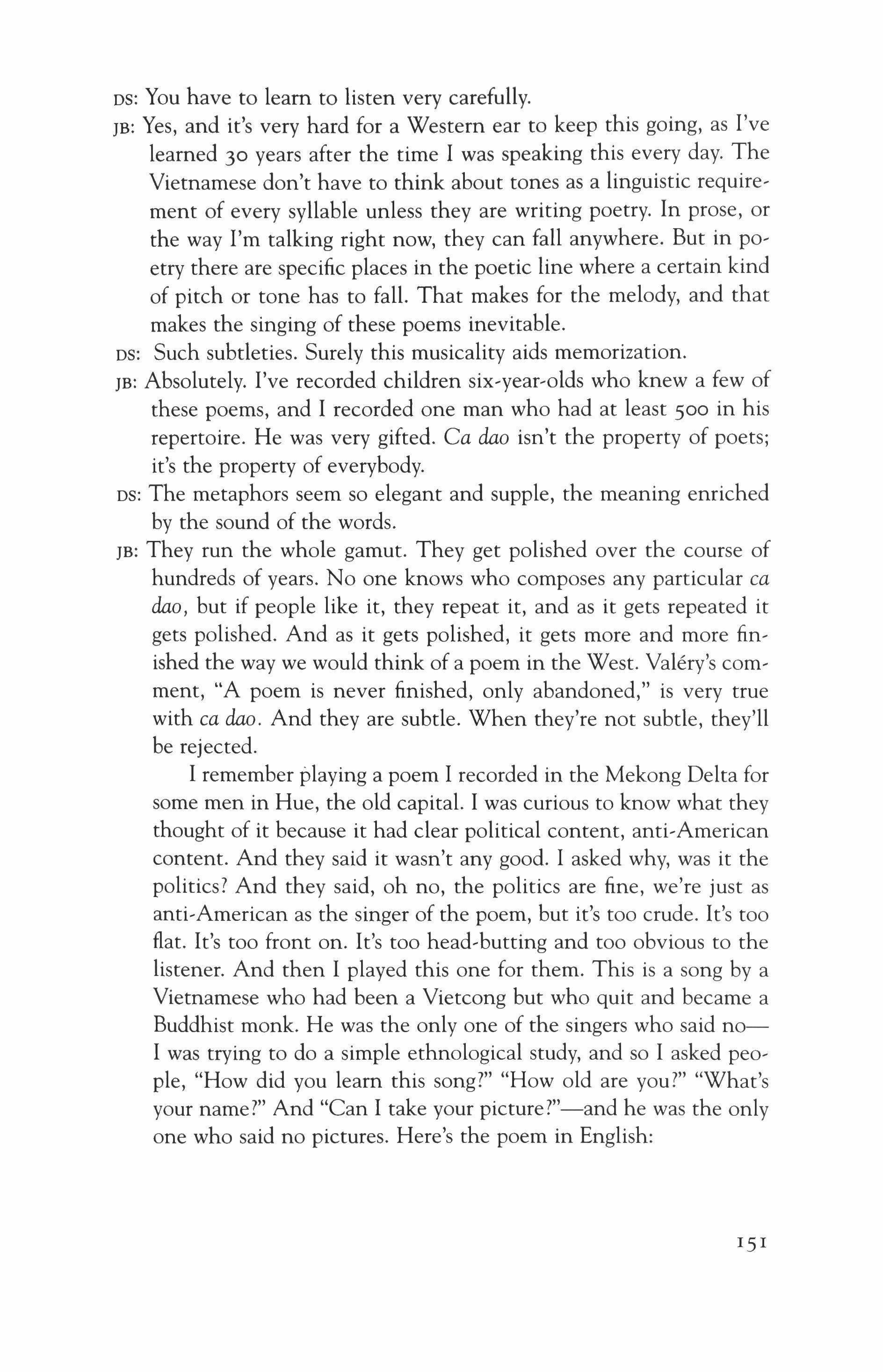
DS: You have to learn to listen very carefully.
JB: Yes, and it's very hard for a Western ear to keep this going, as I've learned 30 years after the time I was speaking this every day. The Vietnamese don't have to think about tones as a linguistic requirement of every syllable unless they are writing poetry. In prose, or the way I'm talking right now, they can fall anywhere. But in poetry there are specific places in the poetic line where a certain kind of pitch or tone has to fall. That makes for the melody, and that makes the singing of these poems inevitable.
DS: Such subtleties. Surely this musicality aids memorization.
JB: Absolutely. I've recorded children six-year-olds who knew a few of these poems, and I recorded one man who had at least 500 in his repertoire. He was very gifted. Ca daD isn't the property of poets; it's the property of everybody.
DS: The metaphors seem so elegant and supple, the meaning enriched by the sound of the words.
JB: They run the whole gamut. They get polished over the course of hundreds of years. No one knows who composes any particular ca daD, but if people like it, they repeat it, and as it gets repeated it gets polished. And as it gets polished, it gets more and more finished the way we would think of a poem in the West. Valery's comment, "A poem is never finished, only abandoned," is very true with ca dao. And they are subtle. When they're not subtle, they'll be rejected.
I remember playing a poem I recorded in the Mekong Delta for some men in Hue, the old capital. I was curious to know what they thought of it because it had clear political content, anti-American content. And they said it wasn't any good. I asked why, was it the politics? And they said, oh no, the politics are fine, we're just as anti-American as the singer of the poem, but it's too crude. It's too flat. It's too front on. It's too head-butting and too obvious to the listener. And then I played this one for them. This is a song by a Vietnamese who had been a Vietcong but who quit and became a Buddhist monk. He was the only one of the singers who said noI was trying to do a simple ethnological study, and so I asked people, "How did you learn this song?" "How old are you?" "What's your name?" And "Can I take your picture?"-and he was the only one who said no pictures. Here's the poem in English:
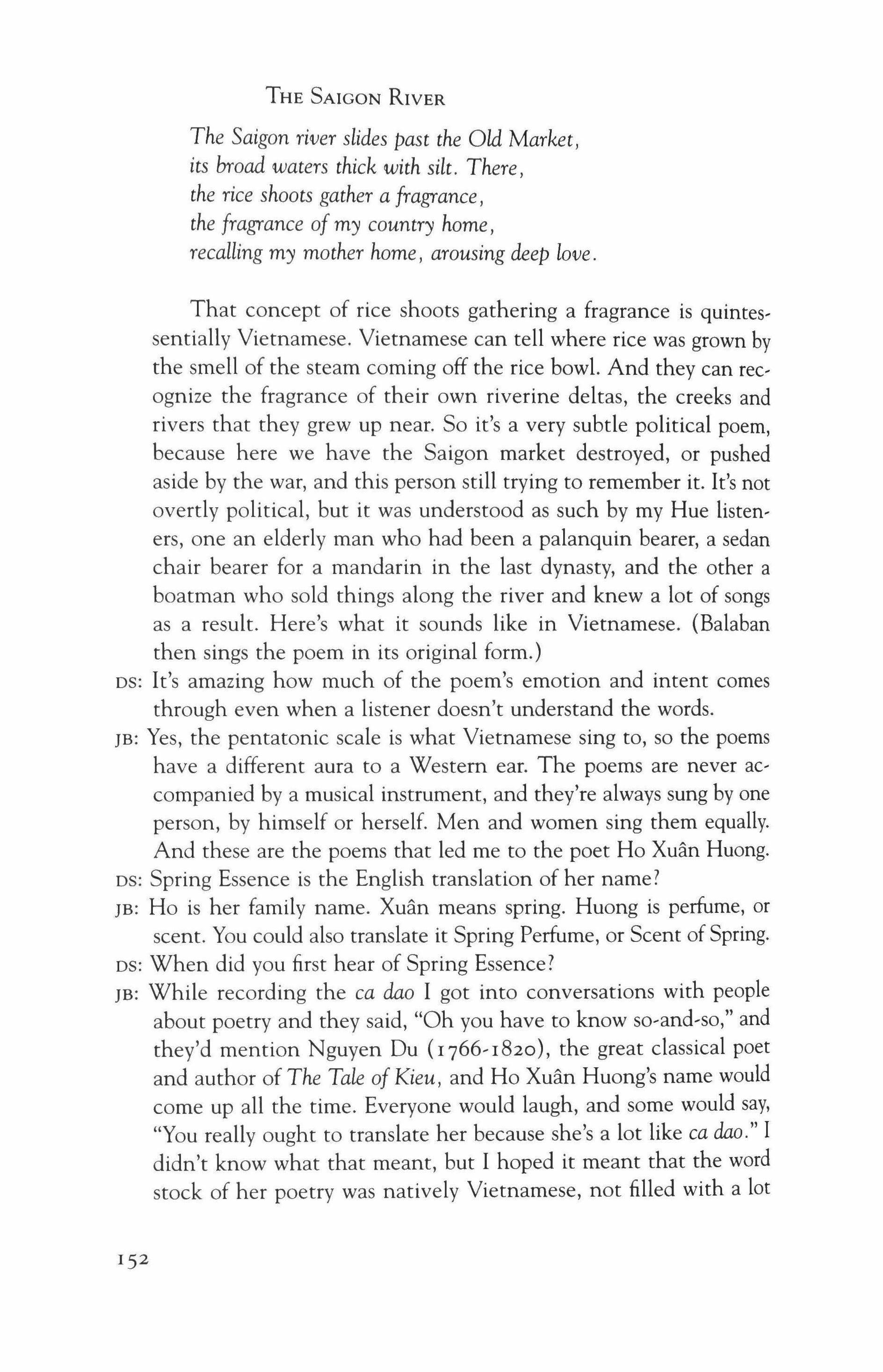
THE SAIGON RIVER
The Saigon river slides past the Old Market, its broad waters thick with silt. There, the rice shoots gather a fragrance, the fragrance of my country home, recalling my mother home, arousing deep love.
That concept of rice shoots gathering a fragrance is quintessentially Vietnamese. Vietnamese can tell where rice was grown by the smell of the steam coming off the rice bowl. And they can recognize the fragrance of their own riverine deltas, the creeks and rivers that they grew up near. So it's a very subtle political poem, because here we have the Saigon market destroyed, or pushed aside by the war, and this person still trying to remember it. It's not overtly political, but it was understood as such by my Hue listeners, one an elderly man who had been a palanquin bearer, a sedan chair bearer for a mandarin in the last dynasty, and the other a boatman who sold things along the river and knew a lot of songs as a result. Here's what it sounds like in Vietnamese. (Balaban then sings the poem in its original form.)
os: It's amazing how much of the poem's emotion and intent comes through even when a listener doesn't understand the words.
JB: Yes, the pentatonic scale is what Vietnamese sing to, so the poems have a different aura to a Western ear. The poems are never accompanied by a musical instrument, and they're always sung by one person, by himself or herself. Men and women sing them equally. And these are the poems that led me to the poet Ho Xuan Huong.
os: Spring Essence is the English translation of her name?
JB: Ho is her family name. Xuan means spring. Huong is perfume, or scent. You could also translate it Spring Perfume, or Scent of Spring.
os: When did you first hear of Spring Essence?
JB: While recording the ca dao I got into conversations with people about poetry and they said, "Oh you have to know so-and-so," and they'd mention Nguyen Du (1766- I 820), the great classical poet and author of The Tale of Kieu, and Ho Xuan Huang's name would come up all the time. Everyone would laugh, and some would say, "You really ought to translate her because she's a lot like ca dao." I didn't know what that meant, but I hoped it meant that the word stock of her poetry was natively Vietnamese, not filled with a lot

of Chinese loan words, which for me were forbidding and too difficult. I just don't have that kind of training. And in fact it's true, she was deliberately chauvinistic, you could say in one sense, because even though the form was that of the literary elite, the words themselves belonged to common people.
DS: You've said that women sang ca dao, but was it unusual for women of her time to be composing poetry, and to be known as poets?
JB: There are two strains of poetry. There's the folk stream, in which women work and offer poems up equally. Then there's the high literary poetry, with its traditions rooted in China and the classical form the Chinese know as lu�shih, brought to its highest level during the T'ang dynasty, which the Vietnamese, Vietnamese men, have been using as a vehicle for literary thought, much the same way we use the sonnet, which we have borrowed from the Italian renaissance.
DS: Even though the Chinese had invaded
JB: Right, and that doesn't necessarily make you embrace the aggressor's literary practices (laughing)
DS: But art forms are contagious.
JB: It's true; there is this curious love-hate relationship, culturally speaking, between the Chinese and the Vietnamese. In 939, when the Vietnamese finally, after about 1000 years of Chinese domination, threw them out by military force, they immediately set up a system of government that was a direct mirror-image of the Chinese court. But you're right about Spring Essence. In that literary tradition women were really an uncommon phenomenon. It was mostly a male writing tradition, a Confucian tradition, a mandarinic tradition. But she, with her extreme cleverness and wit, was simply so much better at it than almost all of her conternporaries, she could not be ignored.
DS: SO she was definitely a real person.
JB: She absolutely was real. There are legends about her that probably aren't true. One of them, for instance, is that she ran a tea shop in Hanoi.
DS: What years are we talking about?
JB: She was probably born around 1775, so she was in her twenties by 1800. An aristocrat, she was married, and we know this from the historical record, as the second wife of a high-ranking official. But since she wasn't able to find a husband as the first wife, which is something she complains about considerably, she is legended to
153
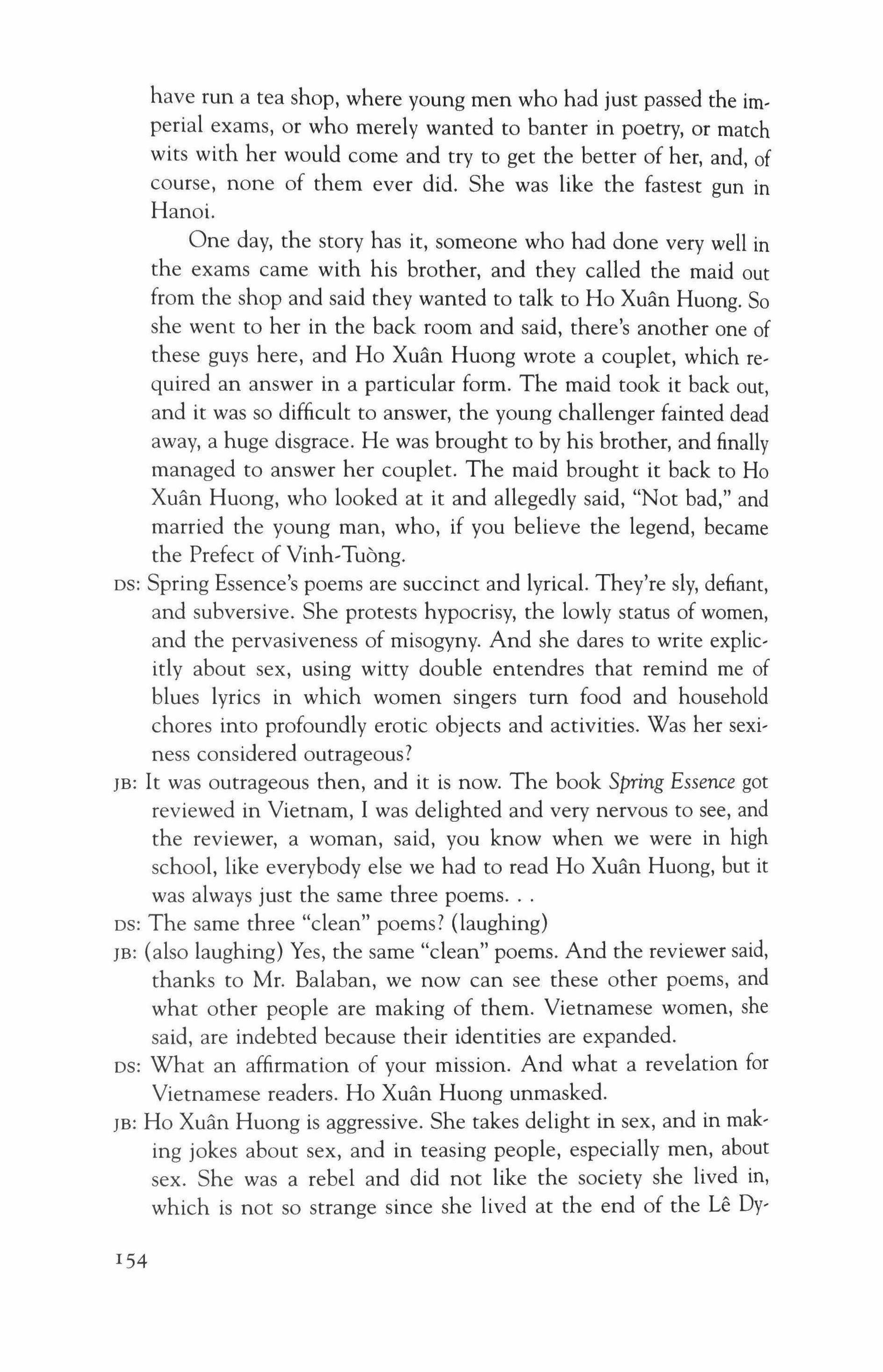
have run a tea shop, where young men who had just passed the imperial exams, or who merely wanted to banter in poetry, or match wits with her would come and try to get the better of her, and, of course, none of them ever did. She was like the fastest gun in Hanoi.
One day, the story has it, someone who had done very well in the exams came with his brother, and they called the maid out from the shop and said they wanted to talk to Ho Xuan Huang. So she went to her in the back room and said, there's another one of these guys here, and Ho Xuan Huong wrote a couplet, which required an answer in a particular form. The maid took it back out, and it was so difficult to answer, the young challenger fainted dead away, a huge disgrace. He was brought to by his brother, and finally managed to answer her couplet. The maid brought it back to Ho Xuan Huong, who looked at it and allegedly said, "Not bad," and married the young man, who, if you believe the legend, became the Prefect of Vinh-Tuong.
os: Spring Essence's poems are succinct and lyrical. They're sly, defiant, and subversive. She protests hypocrisy, the lowly status of women, and the pervasiveness of misogyny. And she dares to write explicitly about sex, using witty double entendres that remind me of blues lyrics in which women singers tum food and household chores into profoundly erotic objects and activities. Was her sexiness considered outrageous?
JB: It was outrageous then, and it is now. The book Spring Essence got reviewed in Vietnam, I was delighted and very nervous to see, and the reviewer, a woman, said, you know when we were in high school, like everybody else we had to read Ho Xuan Huang, but it was always just the same three poems
os: The same three "clean" poems? (laughing)
JB: (also laughing) Yes, the same "clean" poems. And the reviewer said, thanks to Mr. Balaban, we now can see these other poems, and what other people are making of them. Vietnamese women, she said, are indebted because their identities are expanded.
os: What an affirmation of your mission. And what a revelation for Vietnamese readers. Ho Xuan Huong unmasked.
JB: Ho Xuan Huong is aggressive. She takes delight in sex, and in making jokes about sex, and in teasing people, especially men, about sex. She was a rebel and did not like the society she lived in, which is not so strange since she lived at the end of the Le Dy-
154
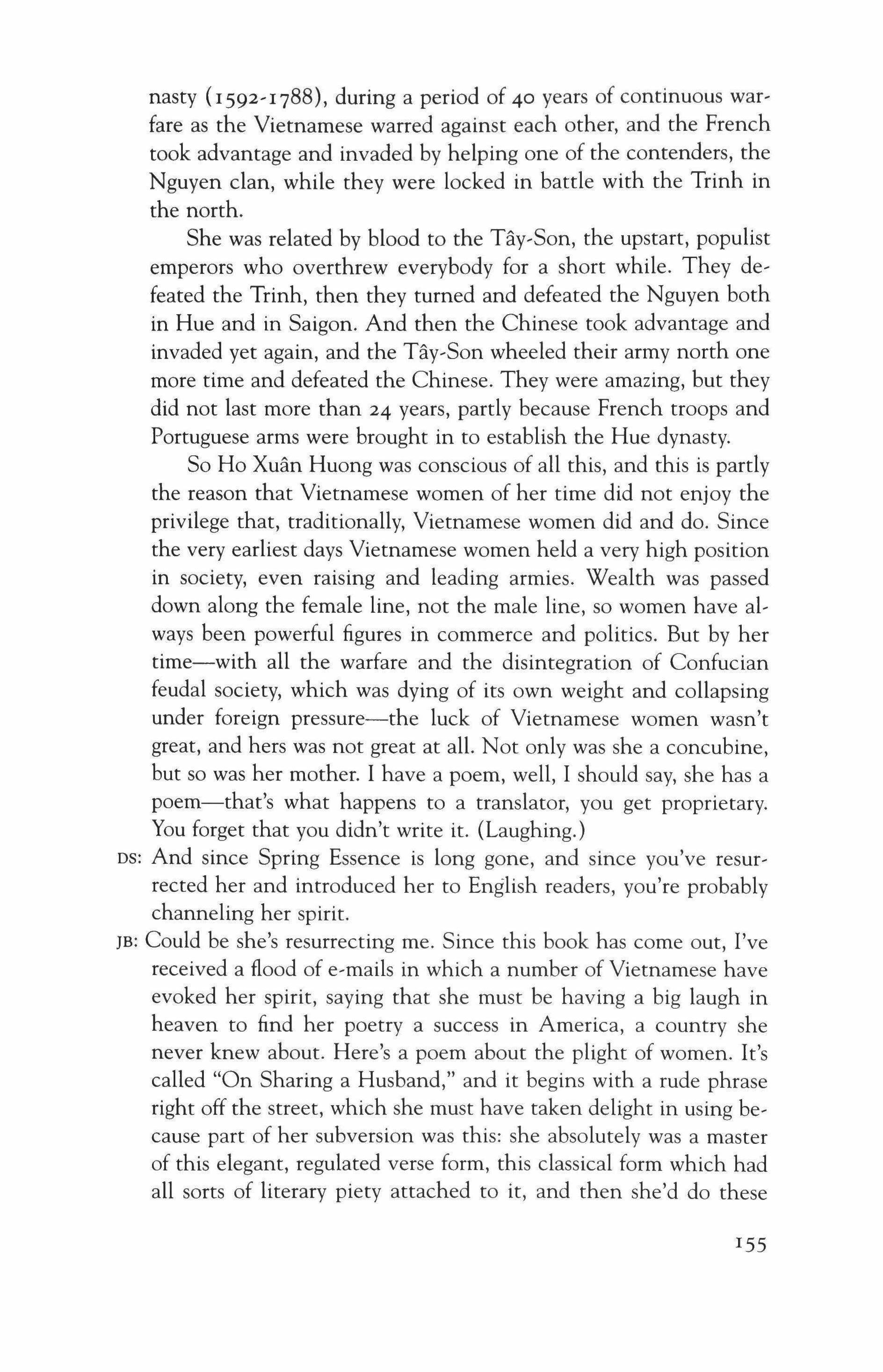
nasty (1592�I788), during a period of 40 years of continuous warfare as the Vietnamese warred against each other, and the French took advantage and invaded by helping one of the contenders, the Nguyen clan, while they were locked in battle with the Trinh in the north.
She was related by blood to the Tay-Son, the upstart, populist emperors who overthrew everybody for a short while. They defeated the Trinh, then they turned and defeated the Nguyen both in Hue and in Saigon. And then the Chinese took advantage and invaded yet again, and the Tay-Son wheeled their army north one more time and defeated the Chinese. They were amazing, but they did not last more than 24 years, partly because French troops and Portuguese arms were brought in to establish the Hue dynasty.
So Ho Xuan Huong was conscious of all this, and this is partly the reason that Vietnamese women of her time did not enjoy the privilege that, traditionally, Vietnamese women did and do. Since the very earliest days Vietnamese women held a very high position in society, even raising and leading armies. Wealth was passed down along the female line, not the male line, so women have always been powerful figures in commerce and politics. But by her time-with all the warfare and the disintegration of Confucian feudal society, which was dying of its own weight and collapsing under foreign pressure-the luck of Vietnamese women wasn't great, and hers was not great at all. Not only was she a concubine, but so was her mother. I have a poem, well, I should say, she has a poem-that's what happens to a translator, you get proprietary. You forget that you didn't write it. (Laughing.)
DS: And since Spring Essence is long gone, and since you've resurrected her and introduced her to English readers, you're probably channeling her spirit.
J8: Could be she's resurrecting me. Since this book has corne out, I've received a flood of e-rnails in which a number of Vietnamese have evoked her spirit, saying that she must be having a big laugh in heaven to find her poetry a success in America, a country she never knew about. Here's a poem about the plight of women. It's called "On Sharing a Husband," and it begins with a rude phrase right off the street, which she must have taken delight in using because part of her subversion was this: she absolutely was a master of this elegant, regulated verse form, this classical form which had all sorts of literary piety attached to it, and then she'd do these
155
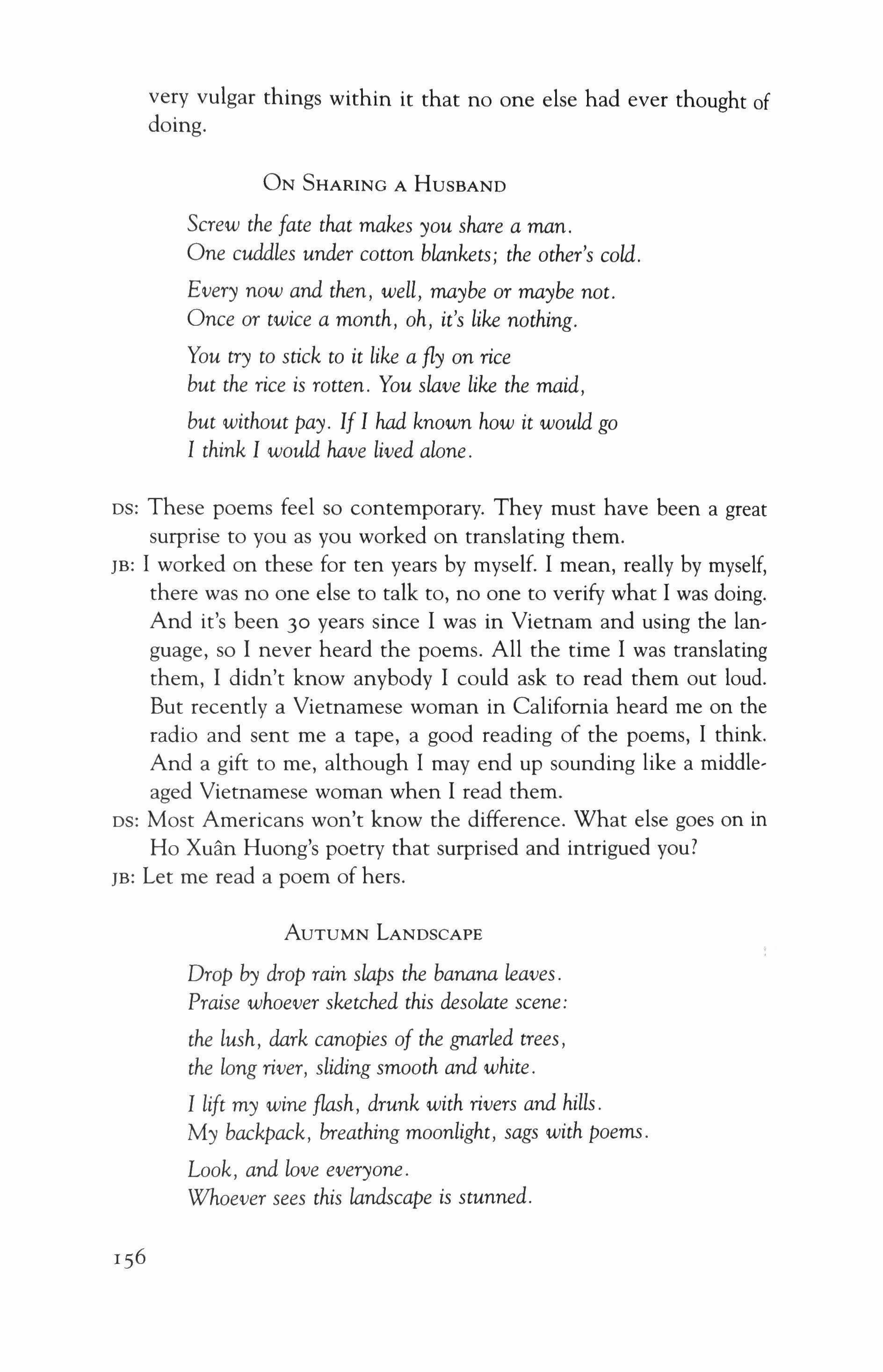
very vulgar things within it that no one else had ever thought of doing.
ON SHARING A HUSBAND
Screw the fate that makes you share a man. One cuddles under cotton blankets; the other's cold. Every now and then, well, maybe or maybe not. Once or twice a month, oh, it's like nothing.
You try to stick to it like a fly on rice but the rice is rotten. You slave like the maid, but without pay. If I had known how it would go I think I would have lived alone.
DS: These poems feel so contemporary. They must have been a great surprise to you as you worked on translating them.
JB: I worked on these for ten years by myself. I mean, really by myself, there was no one else to talk to, no one to verify what I was doing. And it's been 30 years since I was in Vietnam and using the language, so I never heard the poems. All the time I was translating them, I didn't know anybody I could ask to read them out loud. But recently a Vietnamese woman in California heard me on the radio and sent me a tape, a good reading of the poems, I think. And a gift to me, although I may end up sounding like a middleaged Vietnamese woman when I read them.
DS: Most Americans won't know the difference. What else goes on in Ho Xuan Huong's poetry that surprised and intrigued you?
JB: Let me read a poem of hers.
AUTUMN LANDSCAPE
Drop by drop rain slaps the banana leaves. Praise whoever sketched this desolate scene: the lush, dark canopies of the gnarled trees, the long river, sliding smooth and white. I lift my wine flash, drunk with rivers and hills. My backpack, breathing moonlight, sags with poems. Look, and love everyone. Whoever sees this landscape is stunned.
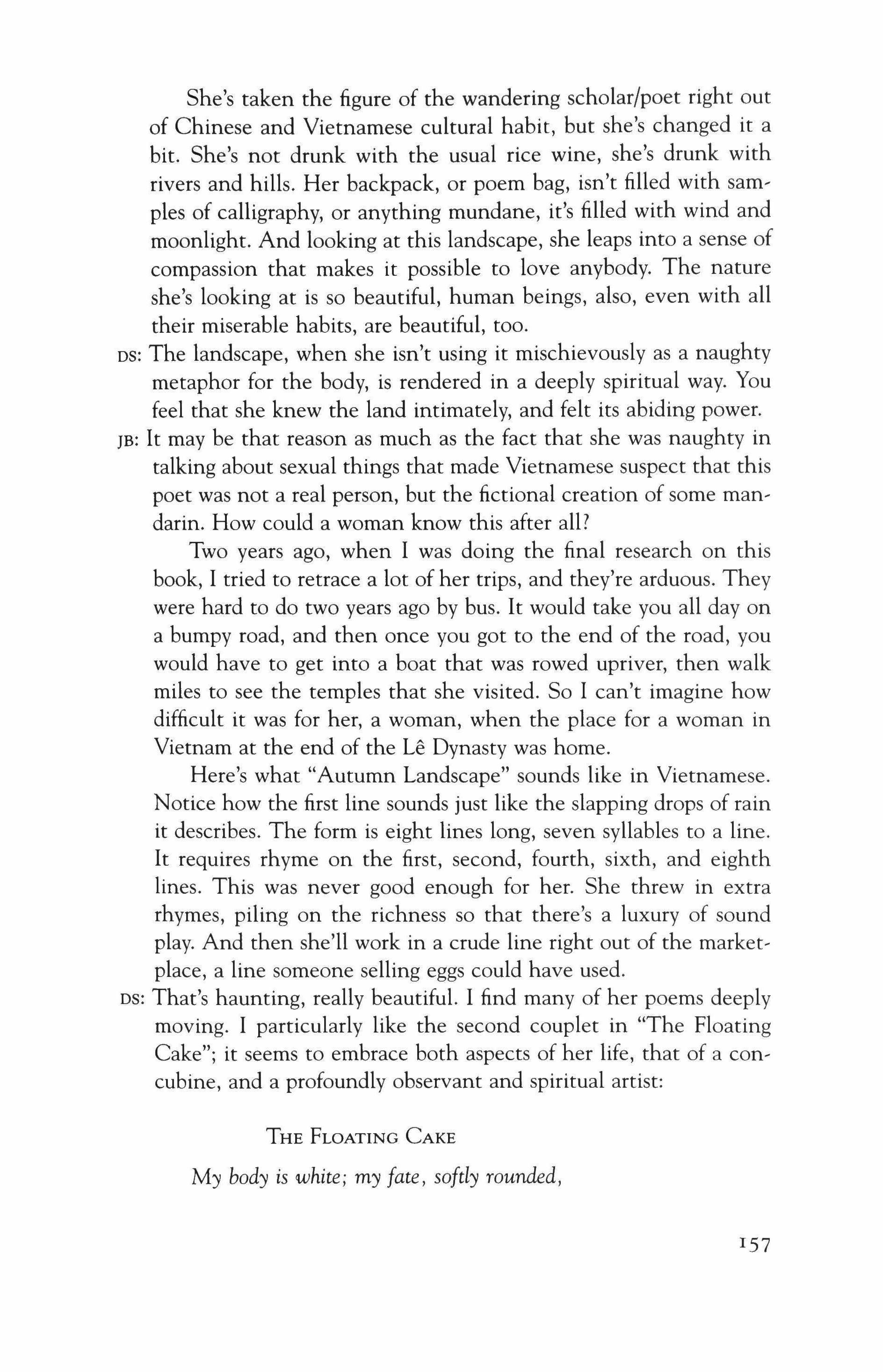
She's taken the figure of the wandering scholar/poet right out of Chinese and Vietnamese cultural habit, but she's changed it a bit. She's not drunk with the usual rice wine, she's drunk with rivers and hills. Her backpack, or poem bag, isn't filled with samples of calligraphy, or anything mundane, it's filled with wind and moonlight. And looking at this landscape, she leaps into a sense of compassion that makes it possible to love anybody. The nature she's looking at is so beautiful, human beings, also, even with all their miserable habits, are beautiful, too.
DS: The landscape, when she isn't using it mischievously as a naughty metaphor for the body, is rendered in a deeply spiritual way. You feel that she knew the land intimately, and felt its abiding power.
]B: It may be that reason as much as the fact that she was naughty in talking about sexual things that made Vietnamese suspect that this poet was not a real person, but the fictional creation of some mandarin. How could a woman know this after all?
Two years ago, when I was doing the final research on this book, I tried to retrace a lot of her trips, and they're arduous. They were hard to do two years ago by bus. It would take you all day on a bumpy road, and then once you got to the end of the road, you would have to get into a boat that was rowed upriver, then walk miles to see the temples that she visited. So I can't imagine how difficult it was for her, a woman, when the place for a woman in Vietnam at the end of the Le Dynasty was home.
Here's what "Autumn Landscape" sounds like in Vietnamese. Notice how the first line sounds just like the slapping drops of rain it describes. The form is eight lines long, seven syllables to a line. It requires rhyme on the first, second, fourth, sixth, and eighth lines. This was never good enough for her. She threw in extra rhymes, piling on the richness so that there's a luxury of sound play. And then she'll work in a crude line right out of the marketplace, a line someone selling eggs could have used.
DS: That's haunting, really beautiful. I find many of her poems deeply moving. I particularly like the second couplet in "The Floating Cake"; it seems to embrace both aspects of her life, that of a concubine, and a profoundly observant and spiritual artist:
THE
FLOATING CAKE
My body is white; my fate, softly rounded,
157
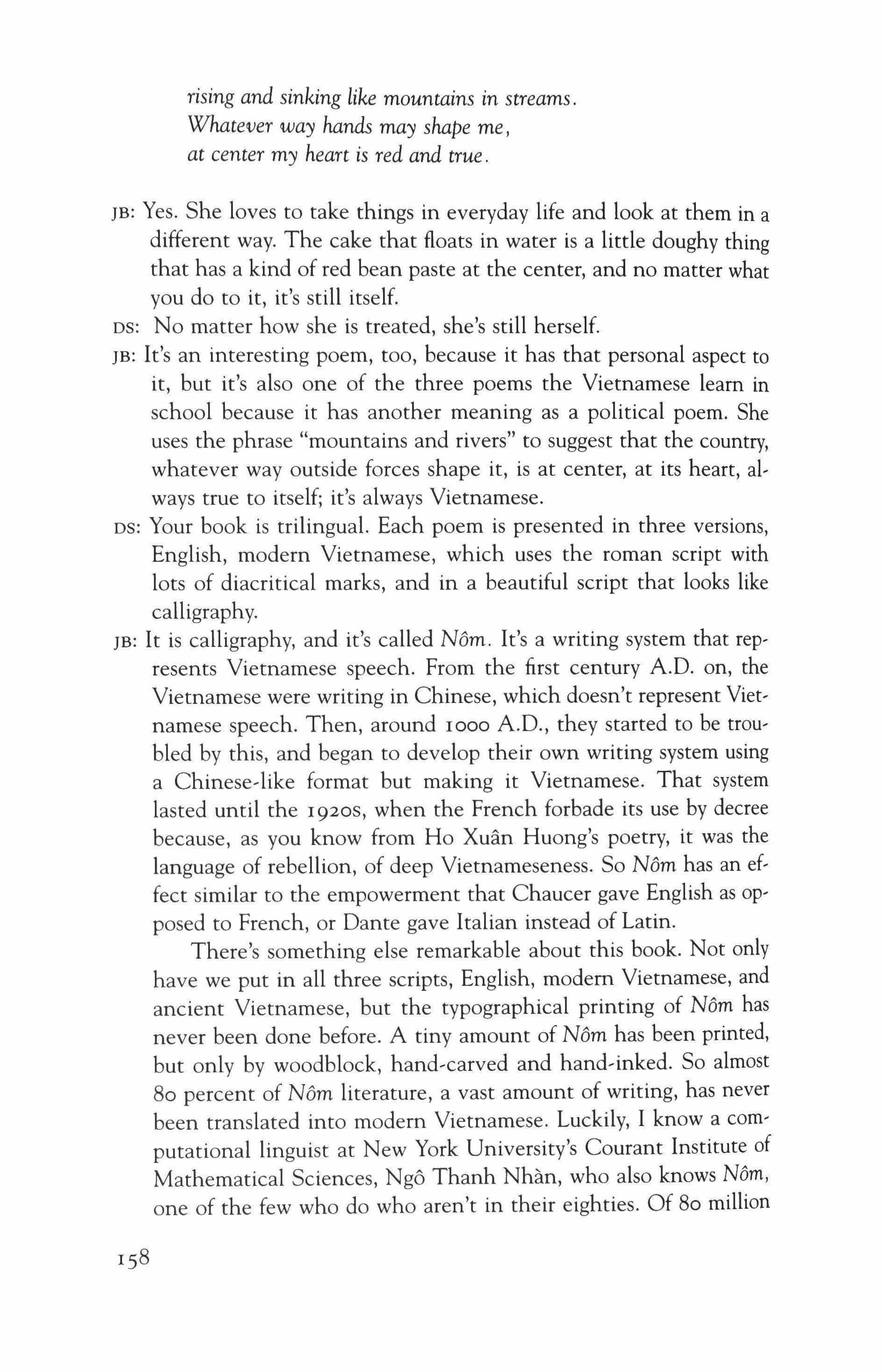
rising and sinking like mountains in streams. Whatever way hands may shape me, at center my heart is red and true.
JB: Yes. She loves to take things in everyday life and look at them in a different way. The cake that floats in water is a little doughy thing that has a kind of red bean paste at the center, and no matter what you do to it, it's still itself.
DS: No matter how she is treated, she's still herself.
JB: It's an interesting poem, too, because it has that personal aspect to it, but it's also one of the three poems the Vietnamese learn in school because it has another meaning as a political poem. She uses the phrase "mountains and rivers" to suggest that the country, whatever way outside forces shape it, is at center, at its heart, always true to itself; it's always Vietnamese.
DS: Your book is trilingual. Each poem is presented in three versions, English, modern Vietnamese, which uses the roman script with lots of diacritical marks, and in a beautiful script that looks like calligraphy.
JB: It is calligraphy, and it's called Nom. It's a writing system that represents Vietnamese speech. From the first century A.D. on, the Vietnamese were writing in Chinese, which doesn't represent Vietnamese speech. Then, around 1000 A.D., they started to be troubled by this, and began to develop their own writing system using a Chinese-like format but making it Vietnamese. That system lasted until the 1920S, when the French forbade its use by decree because, as you know from Ho Xuan Huong's poetry, it was the language of rebellion, of deep Vietnameseness. So Nom has an effect similar to the empowerment that Chaucer gave English as opposed to French, or Dante gave Italian instead of Latin. There's something else remarkable about this book. Not only have we put in all three scripts, English, modern Vietnamese, and ancient Vietnamese, but the typographical printing of Nom has never been done before. A tiny amount of Nom has been printed, but only by woodblock, hand-carved and hand-inked. So almost 80 percent of Nom literature, a vast amount of writing, has never been translated into modern Vietnamese. Luckily, I know a computational linguist at New York University's Courant Institute of Mathematical Sciences, Ng6 Thanh Nhan, who also knows Nom, one of the few who do who aren't in their eighties. Of 80 million
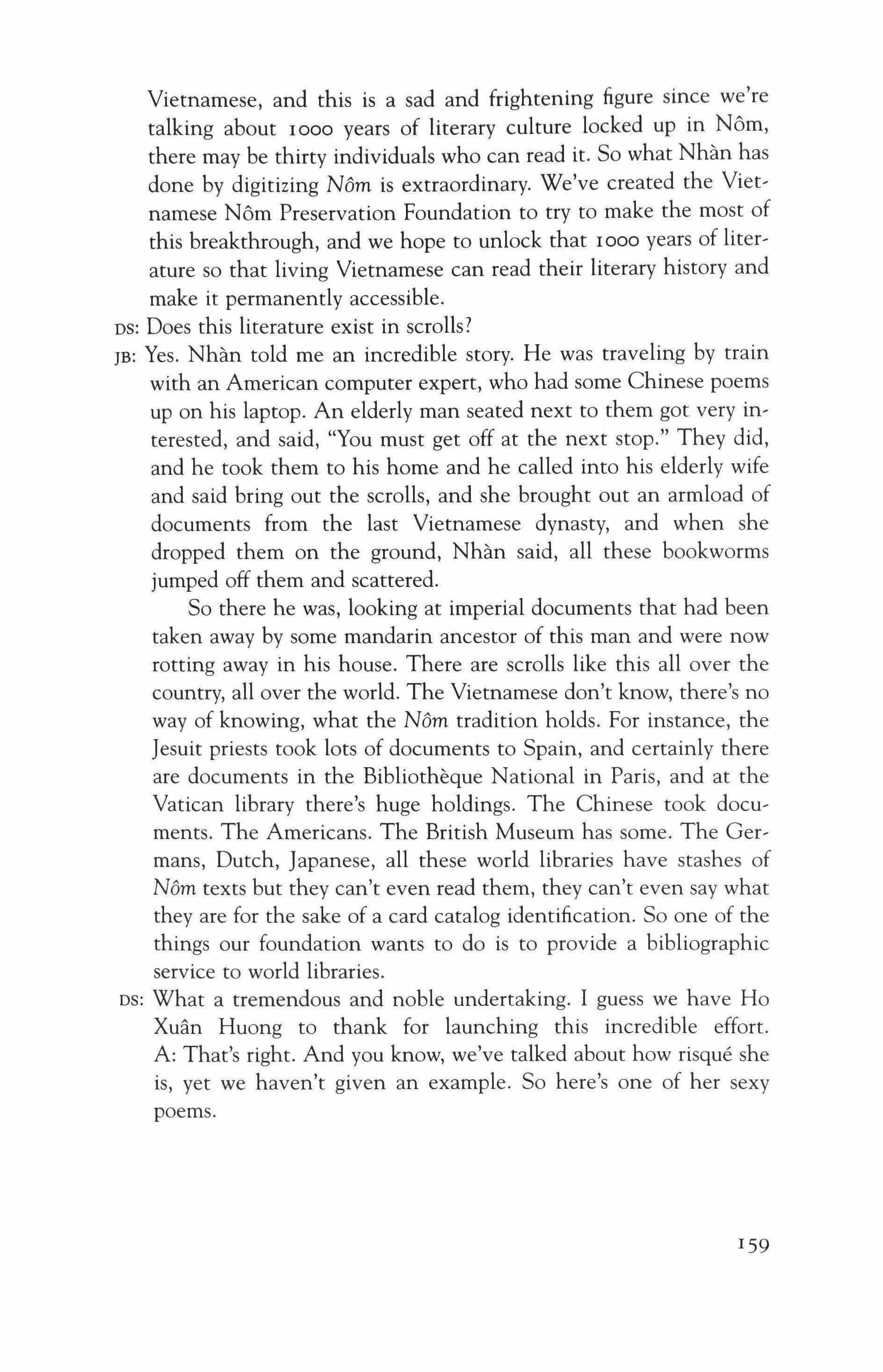
Vietnamese, and this is a sad and frightening figure since we're talking about 1000 years of literary culture locked up in Nom, there may be thirty individuals who can read it. So what Nhan has done by digitizing Nom is extraordinary. We've created the Vietnamese Nom Preservation Foundation to try to make the most of this breakthrough, and we hope to unlock that 1000 years of literature so that living Vietnamese can read their literary history and make it permanently accessible.
DS: Does this literature exist in scrolls?
]B: Yes. Nhan told me an incredible story. He was traveling by train with an American computer expert, who had some Chinese poems up on his laptop. An elderly man seated next to them got very interested, and said, "You must get off at the next stop." They did, and he took them to his home and he called into his elderly wife and said bring out the scrolls, and she brought out an armload of documents from the last Vietnamese dynasty, and when she dropped them on the ground, Nhan said, all these bookworms jumped off them and scattered.
So there he was, looking at imperial documents that had been taken away by some mandarin ancestor of this man and were now rotting away in his house. There are scrolls like this all over the country, all over the world. The Vietnamese don't know, there's no way of knowing, what the Nom tradition holds. For instance, the Jesuit priests took lots of documents to Spain, and certainly there are documents in the Bibliotheque National in Paris, and at the Vatican library there's huge holdings. The Chinese took documents. The Americans. The British Museum has some. The Germans, Dutch, Japanese, all these world libraries have stashes of Nom texts but they can't even read them, they can't even say what they are for the sake of a card catalog identification. So one of the things our foundation wants to do is to provide a bibliographic service to world libraries.
DS: What a tremendous and noble undertaking. I guess we have Ho Xuan Huong to thank for launching this incredible effort.
A: That's right. And you know, we've talked about how risque she is, yet we haven't given an example. So here's one of her sexy poems.
159
THREE MOUNTAIN PASS
A cliffface. Another. And still a third. Who was so skilled to carve this craggy scene: the cavern's red door, the ridge's narrow cleft, the black knoll bearded with little mosses?
A twisting pine bough plunges in the wind, showering a willow's leaves with glistening drops. Gentlemen, lords, who could refuse, though weary and shaky in his knees, to mount once more?
Beo Ba D9i
Mot deo, mot deo, lai m(_)t deo, ):k ):k
Khen ai kheo tac canh cheo leo.
Cira son d6 loet tum hum noc,
Him di xanh ri hin phun reu,
Lat leo canh thong can gio thOc,
Dam dia Ii li�u giot strong gieo.
Hien nhan, quan tit ai rna ching
M6i goi, chon chan van muon treo,
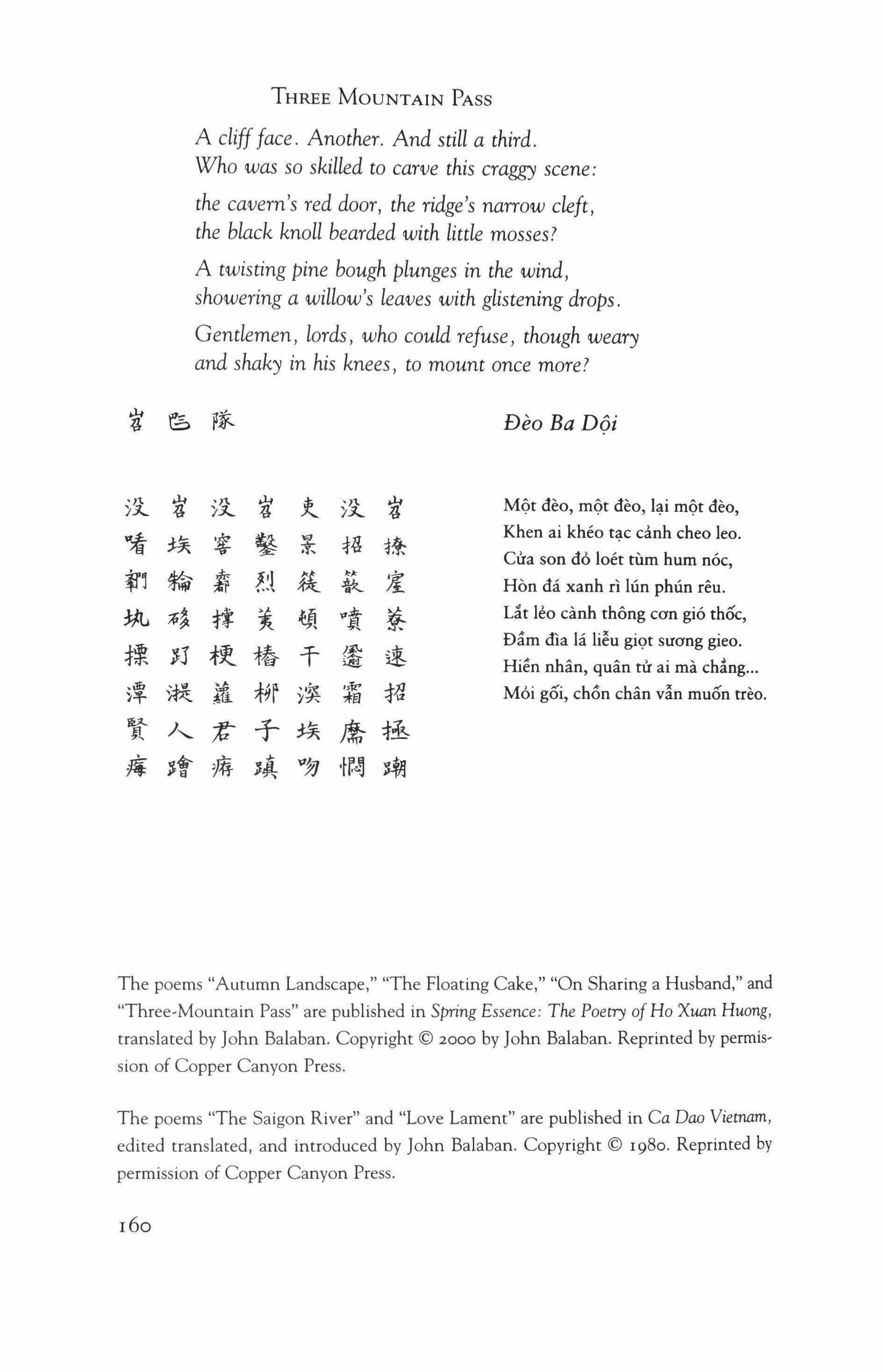
The poems "Autumn Landscape," "The Floating Cake," "On Sharing a Husband," and "Three-Mountain Pass" are published in Spring Essence: The Poetry of Ho Xuan Huang, translated by John Balaban. Copyright © 2000 by John Balaban. Reprinted by permission of Copper Canyon Press.
The poems "The Saigon River" and "Love Lament" are published in Ca Dao Vietnam, edited translated, and introduced by John Balaban. Copyright © 1980. Reprinted by permission of Copper Canyon Press.
I60
* � p�
')1.
*
* .)1. * .t }i.
"t
� � � t� �t
�
�1
t �
� If !.:! Jk_
�
�
if� tf � � "t
�l
� �
$3 t� rt- +
� it #f }�
t�
.1&
.,r..
� )......_ :t T � Jl :t� � ,t :J# '" "}!1 +r., �
}+ "'iii
John Balaban
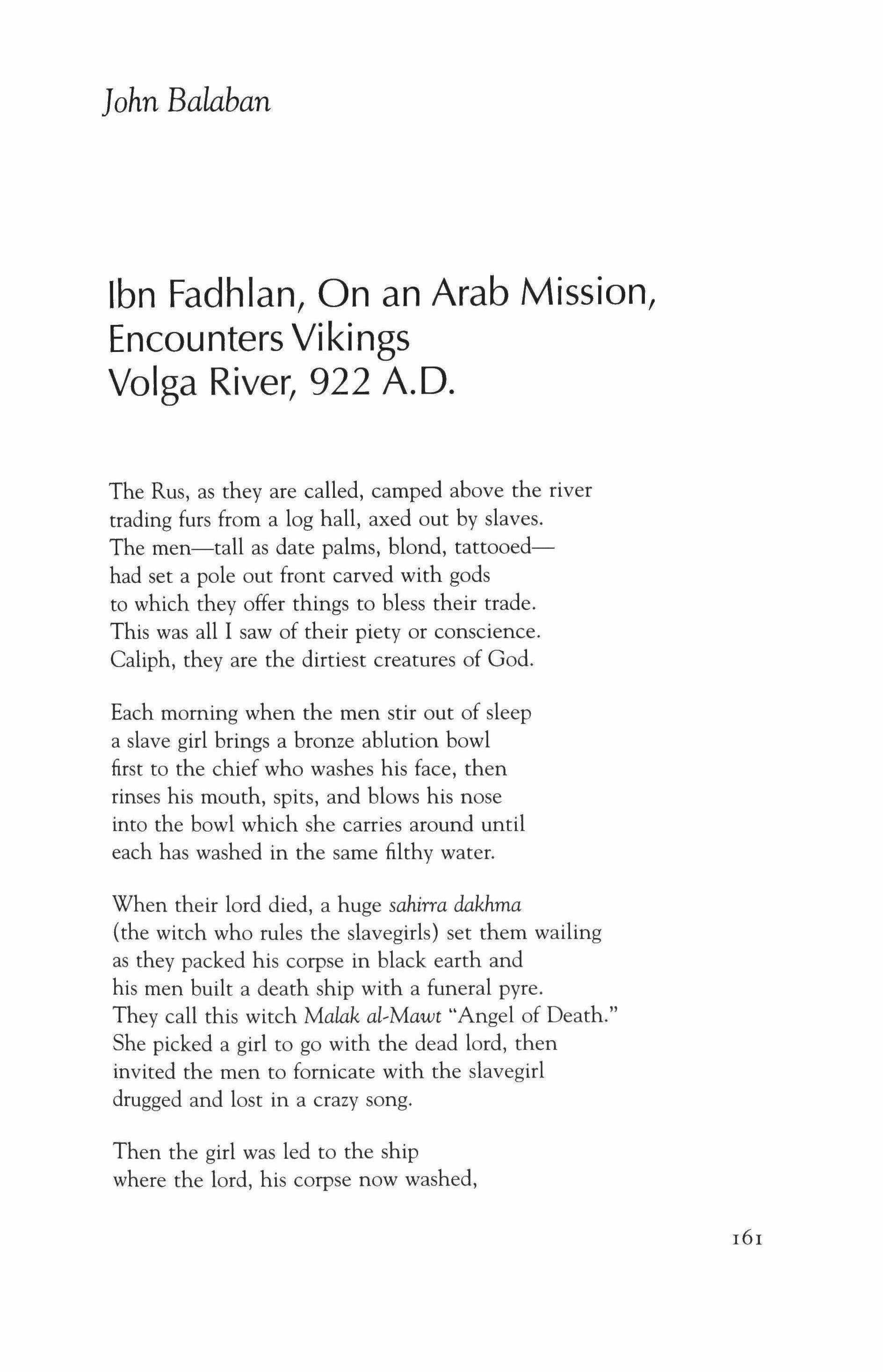
Ibn Fadhlan, On an Arab Mission, Encounters Vikings
Volga River, 922 A.D.
The Rus, as they are called, camped above the river trading furs from a log hall, axed out by slaves. The men-tall as date palms, blond, tattooedhad set a pole out front carved with gods to which they offer things to bless their trade. This was all I saw of their piety or conscience. Caliph, they are the dirtiest creatures of God.
Each morning when the men stir out of sleep a slave girl brings a bronze ablution bowl first to the chief who washes his face, then rinses his mouth, spits, and blows his nose into the bowl which she carries around until each has washed in the same filthy water.
When their lord died, a huge sahirra dakhma (the witch who rules the slavegirls) set them wailing as they packed his corpse in black earth and his men built a death ship with a funeral pyre. They call this witch Malak al�Mawt "Angel of Death." She picked a girl to go with the dead lord, then invited the men to fornicate with the slavegirl drugged and lost in a crazy song.
Then the girl was led to the ship where the lord, his corpse now washed,
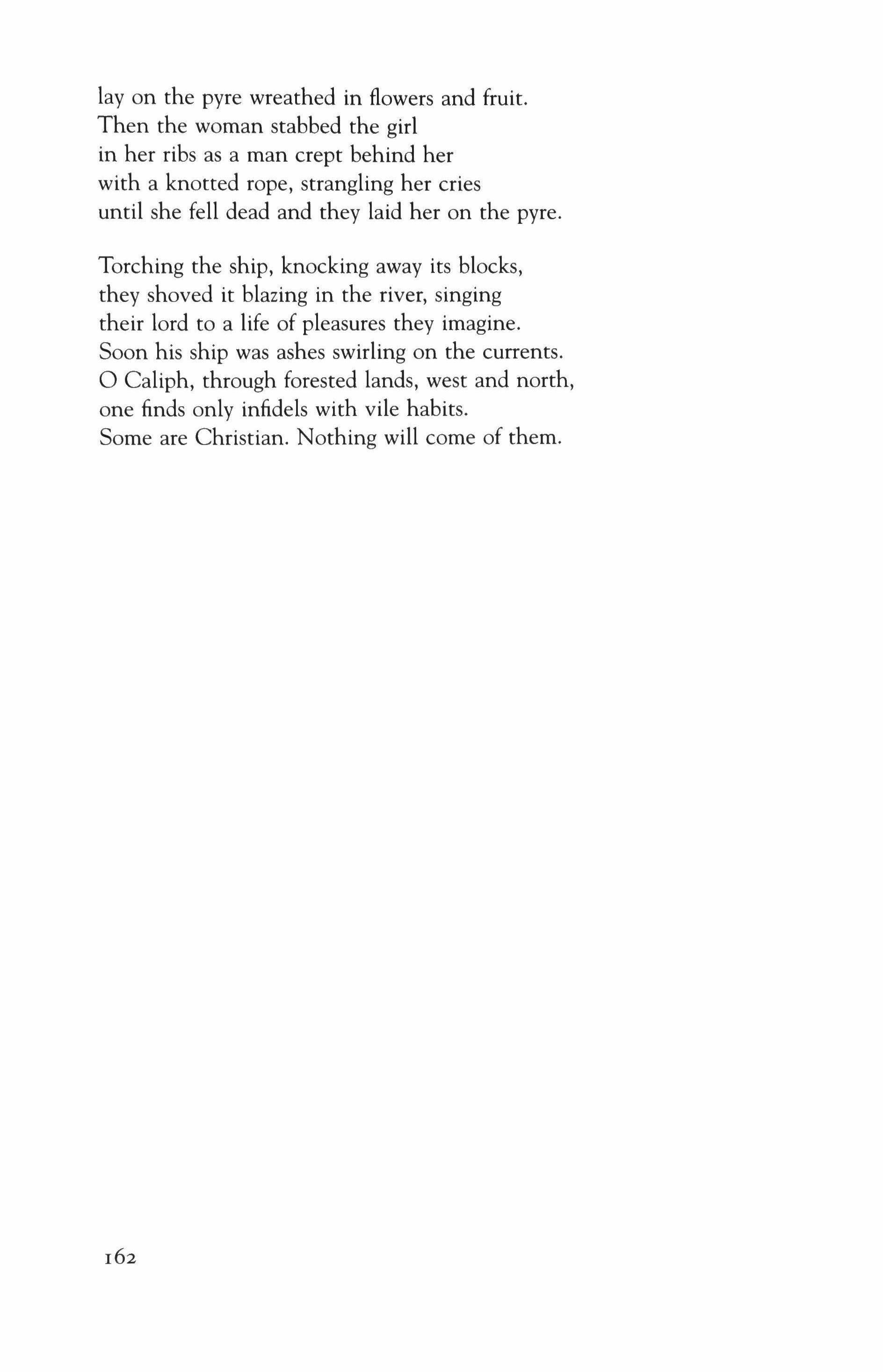
lay on the pyre wreathed in flowers and fruit. Then the woman stabbed the girl in her ribs as a man crept behind her with a knotted rope, strangling her cries until she fell dead and they laid her on the pyre.
Torching the ship, knocking away its blocks, they shoved it blazing in the river, singing their lord to a life of pleasures they imagine. Soon his ship was ashes swirling on the currents.
o Caliph, through forested lands, west and north, one finds only infidels with vile habits. Some are Christian. Nothing will come of them.
Virgil:
Translated from the Latin (lines 47�82) by David Ferry
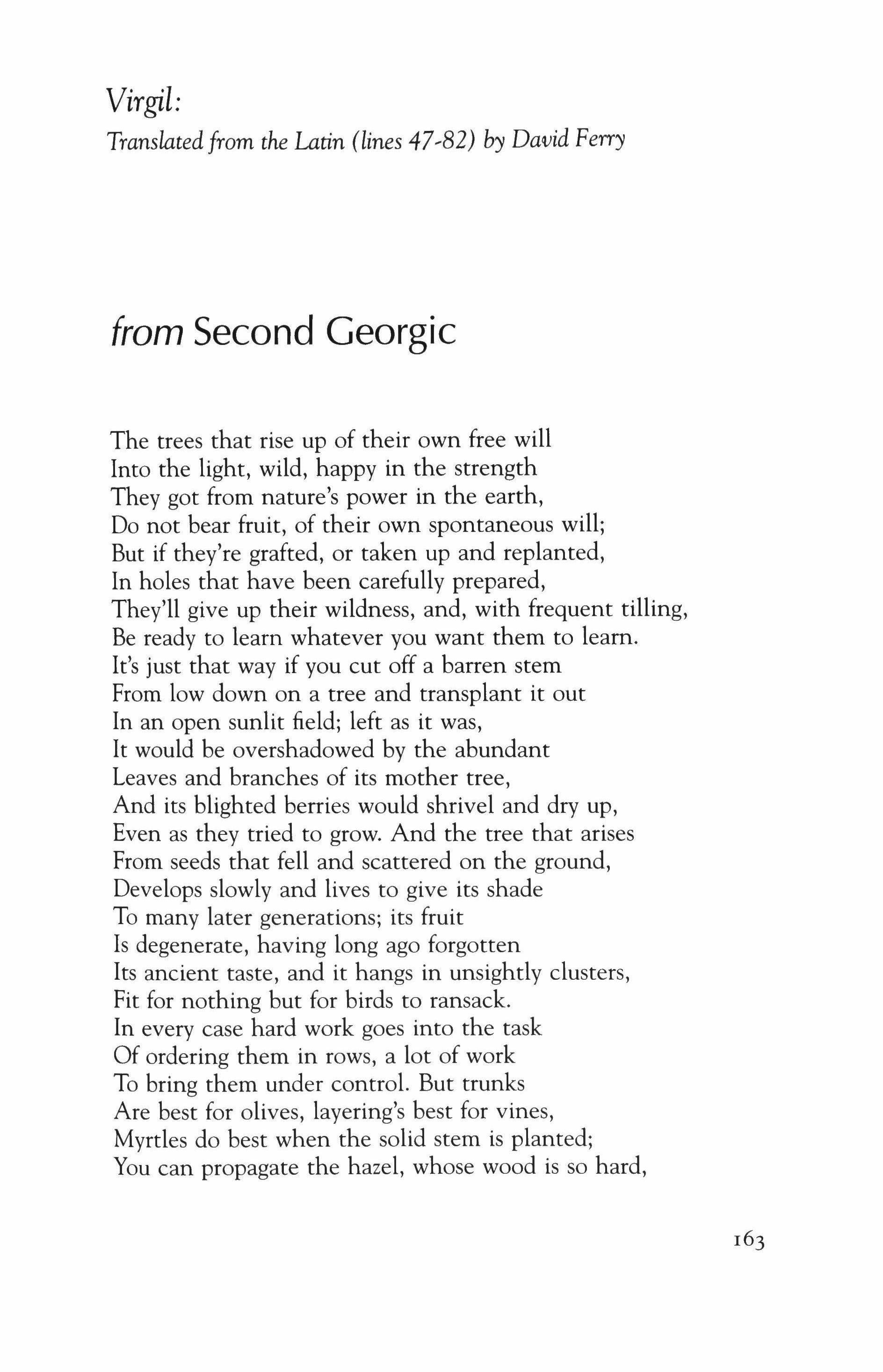
from Second Georgic
The trees that rise up of their own free will Into the light, wild, happy in the strength They got from nature's power in the earth, Do not bear fruit, of their own spontaneous will; But if they're grafted, or taken up and replanted, In holes that have been carefully prepared, They'll give up their wildness, and, with frequent tilling, Be ready to learn whatever you want them to learn. It's just that way if you cut off a barren stem From low down on a tree and transplant it out In an open sunlit field; left as it was, It would be overshadowed by the abundant Leaves and branches of its mother tree, And its blighted berries would shrivel and dry up, Even as they tried to grow. And the tree that arises From seeds that fell and scattered on the ground, Develops slowly and lives to give its shade To many later generations; its fruit Is degenerate, having long ago forgotten Its ancient taste, and it hangs in unsightly clusters, Fit for nothing but for birds to ransack. In every case hard work goes into the task Of ordering them in rows, a lot of work To bring them under control. But trunks Are best for olives, layering's best for vines, Myrtles do best when the solid stem is planted; You can propagate the hazel, whose wood is so hard,
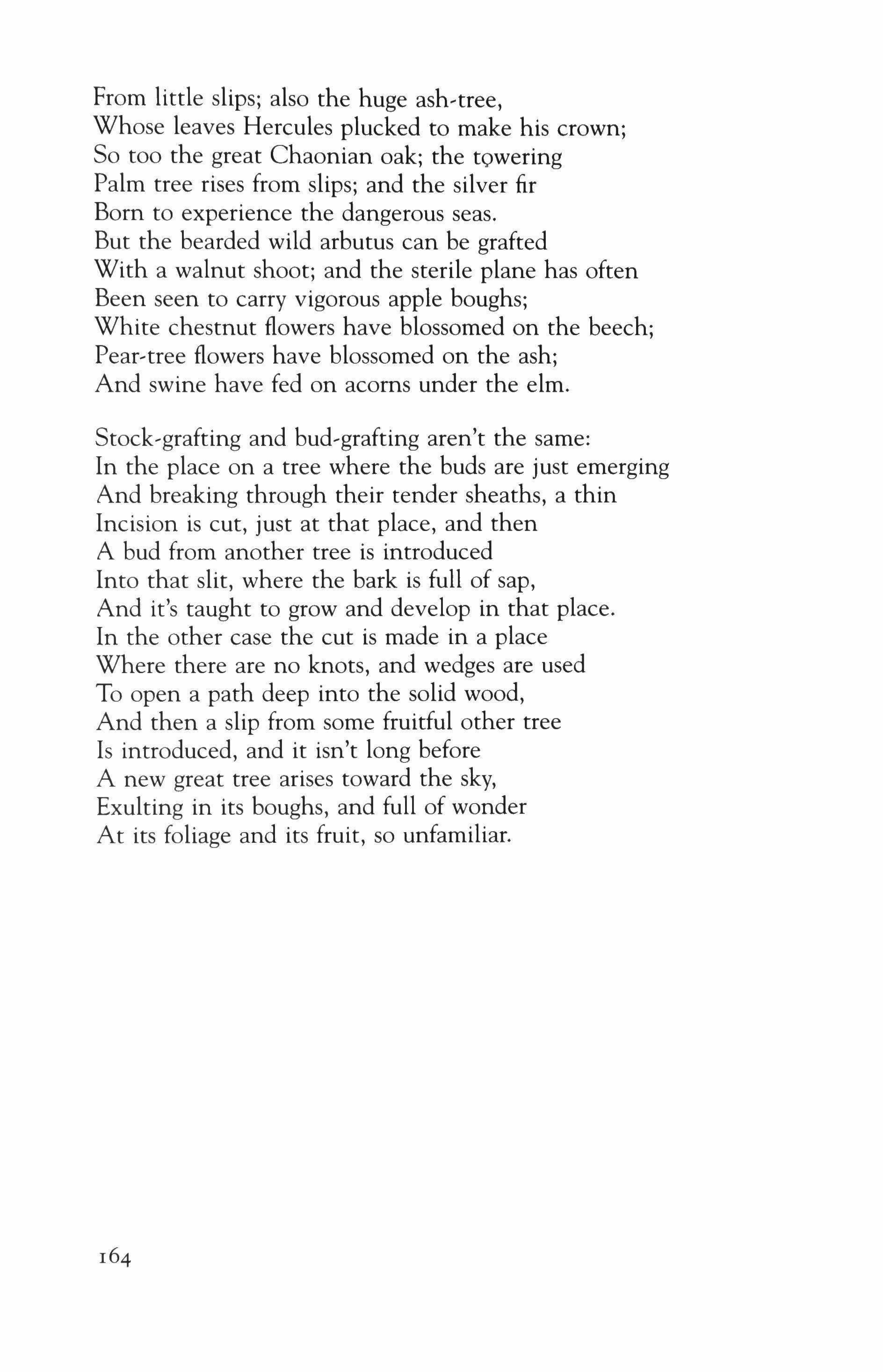
From little slips; also the huge ash-tree, Whose leaves Hercules plucked to make his crown; So too the great Chaonian oak; the towering Palm tree rises from slips; and the silver fir Born to experience the dangerous seas. But the bearded wild arbutus can be grafted With a walnut shoot; and the sterile plane has often Been seen to carry vigorous apple boughs; White chestnut flowers have blossomed on the beech; Pear-tree flowers have blossomed on the ash; And swine have fed on acorns under the elm.
Stock,grafting and bud,grafting aren't the same: In the place on a tree where the buds are just emerging And breaking through their tender sheaths, a thin Incision is cut, just at that place, and then A bud from another tree is introduced Into that slit, where the bark is full of sap, And it's taught to grow and develop in that place. In the other case the cut is made in a place Where there are no knots, and wedges are used To open a path deep into the solid wood, And then a slip from some fruitful other tree Is introduced, and it isn't long before A new great tree arises toward the sky, Exulting in its boughs, and full of wonder At its foliage and its fruit, so unfamiliar.
Eugenio Montale:
Translated from the Italian by Harry
Thomas

Xenia I
Dear little insect whom we called Mosca-I don't know why-, this evening just before dark as I was reading Deutero-Isaiah you reappeared at my side, but not having your glasses you couldn't see me, and without their glinting I couldn't be sure it was you in the dusk.
2
Without glasses or antennae, a poor insect who had wings only in imagination, a Bible coming unbound and largely unreliable, the black of night, a lightning flash, a thunderclap, and then no storm. Can it be you were gone so quickly without saying a word?
But it's ridiculous to think you still had lips.
165
3
At the Saint James in Paris I'll have to ask for a single room (they don't like the odd guest). And also at your faux Byzantium hotel in Venice; and then immediately go down to find the switchboard operators' cubbyholethose girls who were always your friends; only to give up againthe telephone connection lostthe desire of having you back, if only in one habit or gesture.
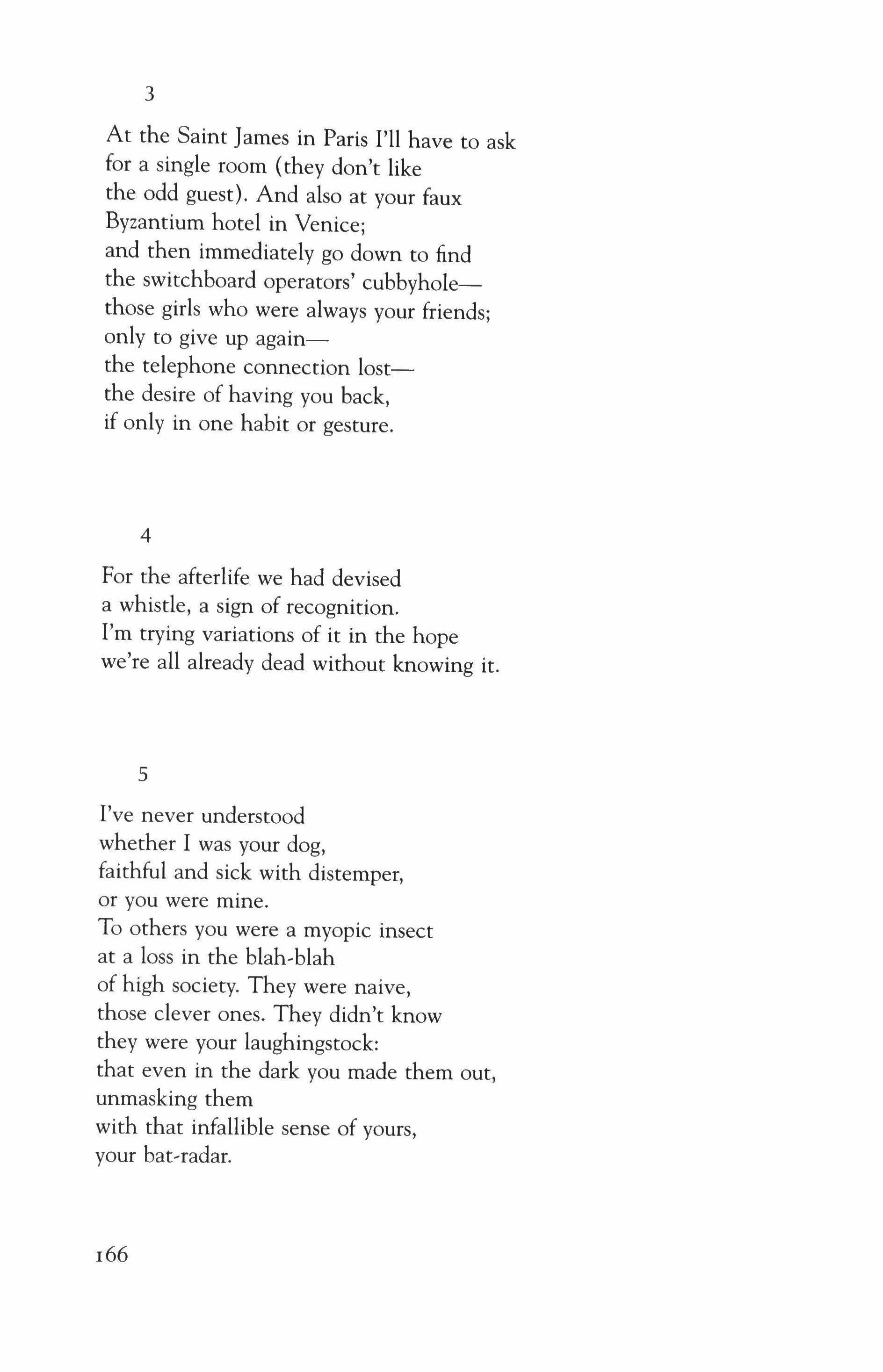
4
For the afterlife we had devised a whistle, a sign of recognition. I'm trying variations of it in the hope we're all already dead without knowing it.
5
I've never understood whether I was your dog, faithful and sick with distemper, or you were mine. To others you were a myopic insect at a loss in the blah-blah of high society. They were naive, those clever ones. They didn't know they were your laughingstock: that even in the dark you made them out, unmasking them with that infallible sense of yours, your bat-radar, 166
It never crossed your mind to write prose or verse and so leave behind you traces of yourself. That was your charm and then my self-disgust. It was also my fearthat you'd drive me back into the croaking mire of the neoteroi.
7
The self-pity, endless pain and anguish of one who worships this world and hopes without hope for another (Who dares to speak of another world!).
"Strange
piety (Azucena, Act II).
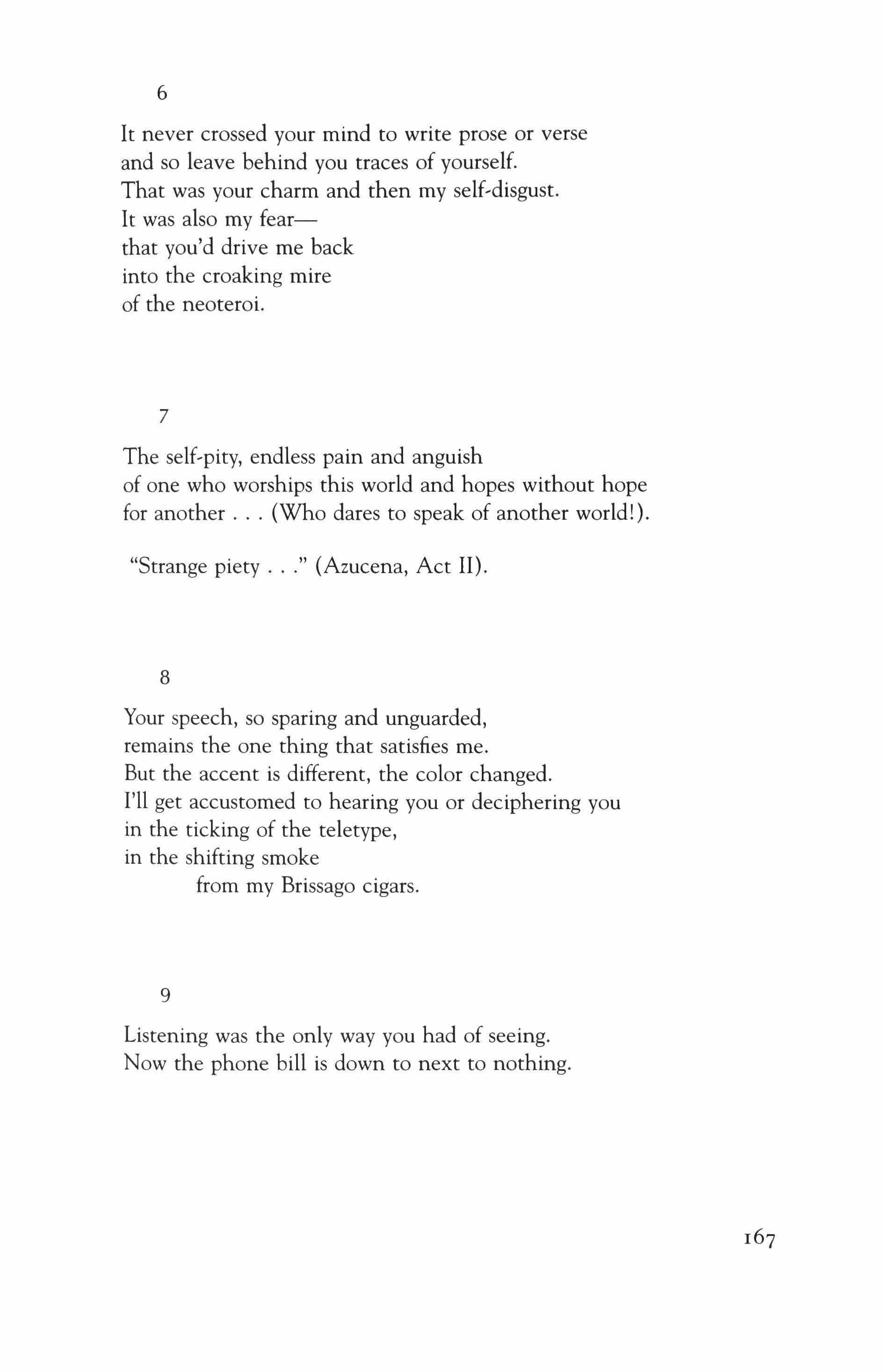
8
Your speech, so sparing and unguarded, remains the one thing that satisfies me. But the accent is different, the color changed. I'll get accustomed to hearing you or deciphering you in the ticking of the teletype, in the shifting smoke from my Brissago cigars.
9
Listening was the only way you had of seeing. Now the phone bill is down to next to nothing.
6
"Did she pray?" "Yes, she prayed to St Anthony because he helps to find lost umbrellas and other things from St Hermes' closet."
"Only for that?" "Also for her dead and for me."
"That's enough," said the priest.
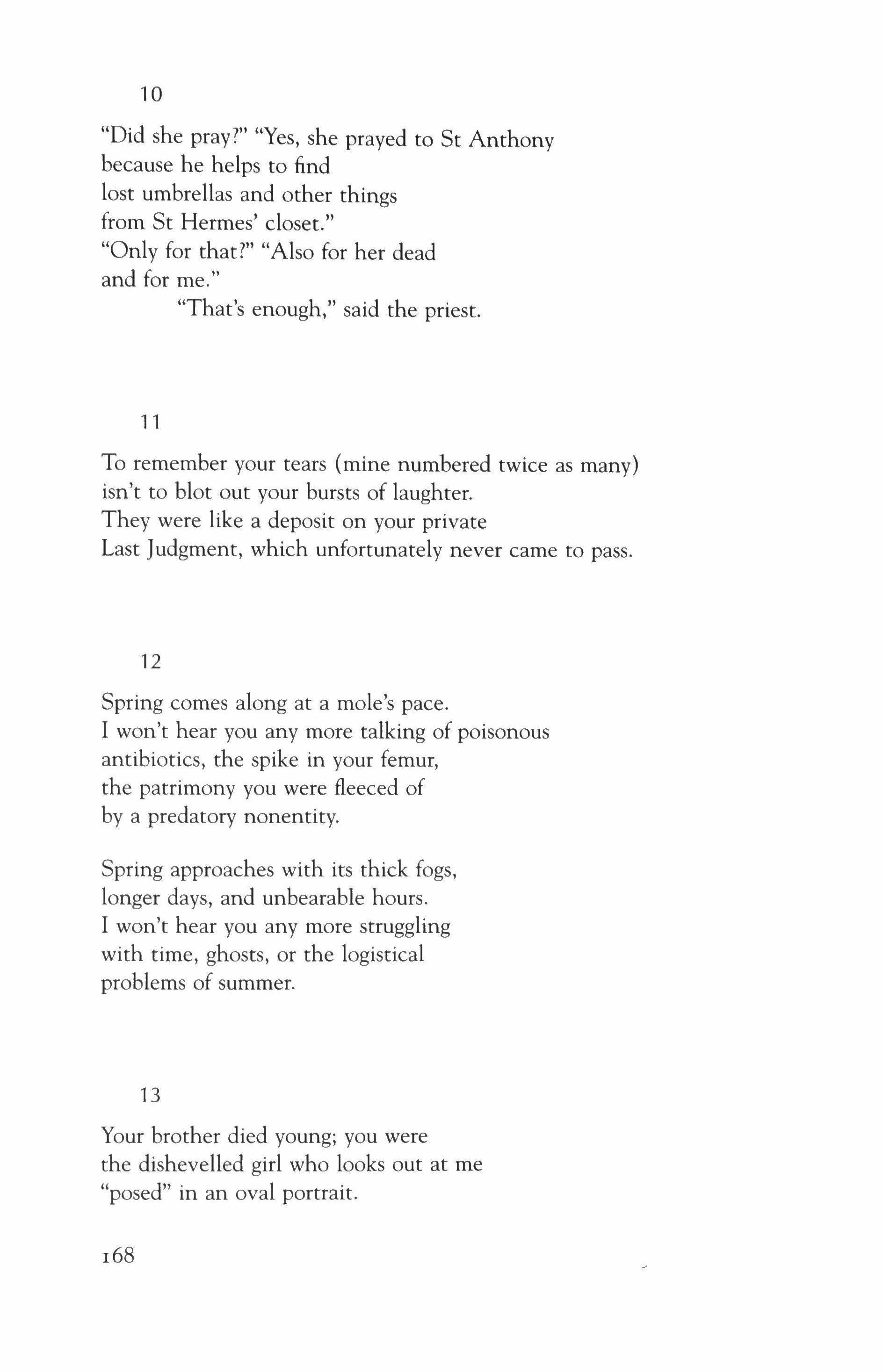
11
To remember your tears (mine numbered twice as many) isn't to blot out your bursts of laughter. They were like a deposit on your private Last Judgment, which unfortunately never came to pass.
12
Spring comes along at a mole's pace.
I won't hear you any more talking of poisonous antibiotics, the spike in your femur, the patrimony you were fleeced of by a predatory nonentity.
Spring approaches with its thick fogs, longer days, and unbearable hours.
I won't hear you any more struggling with time, ghosts, or the logistical problems of summer.
13
Your brother died young; you were the dishevelled girl who looks out at me "posed" in an oval portrait.
10
He wrote music, unpublished, unheard, now buried in a trunk or rotted away. Perhaps someone's reinventing it unwittingly, if what's written is written. I loved him without having known him. Except for you, no one remembered him. I made no inquiries; now there's no point. After you I'm the only one left for whom he existed. But it's possible, you know, to love a shade, being shades ourselves.
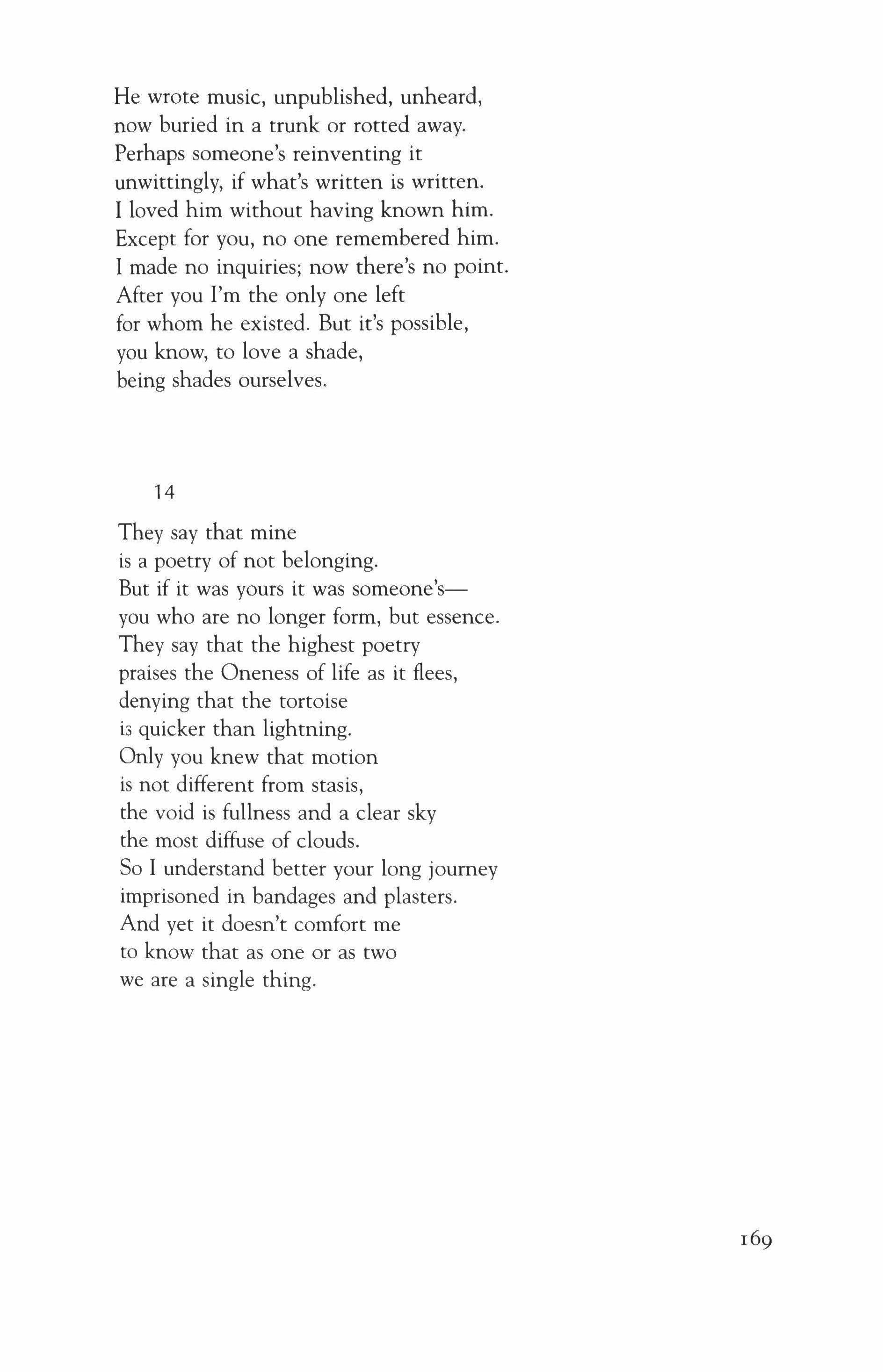
14
They say that mine is a poetry of not belonging. But if it was yours it was someone'syou who are no longer form, but essence. They say that the highest poetry praises the Oneness of life as it flees, denying that the tortoise is quicker than lightning. Only you knew that motion is not different from stasis, the void is fullness and a clear sky the most diffuse of clouds. So I understand better your long journey imprisoned in bandages and plasters. And yet it doesn't comfort me to know that as one or as two we are a single thing.
Xenia II
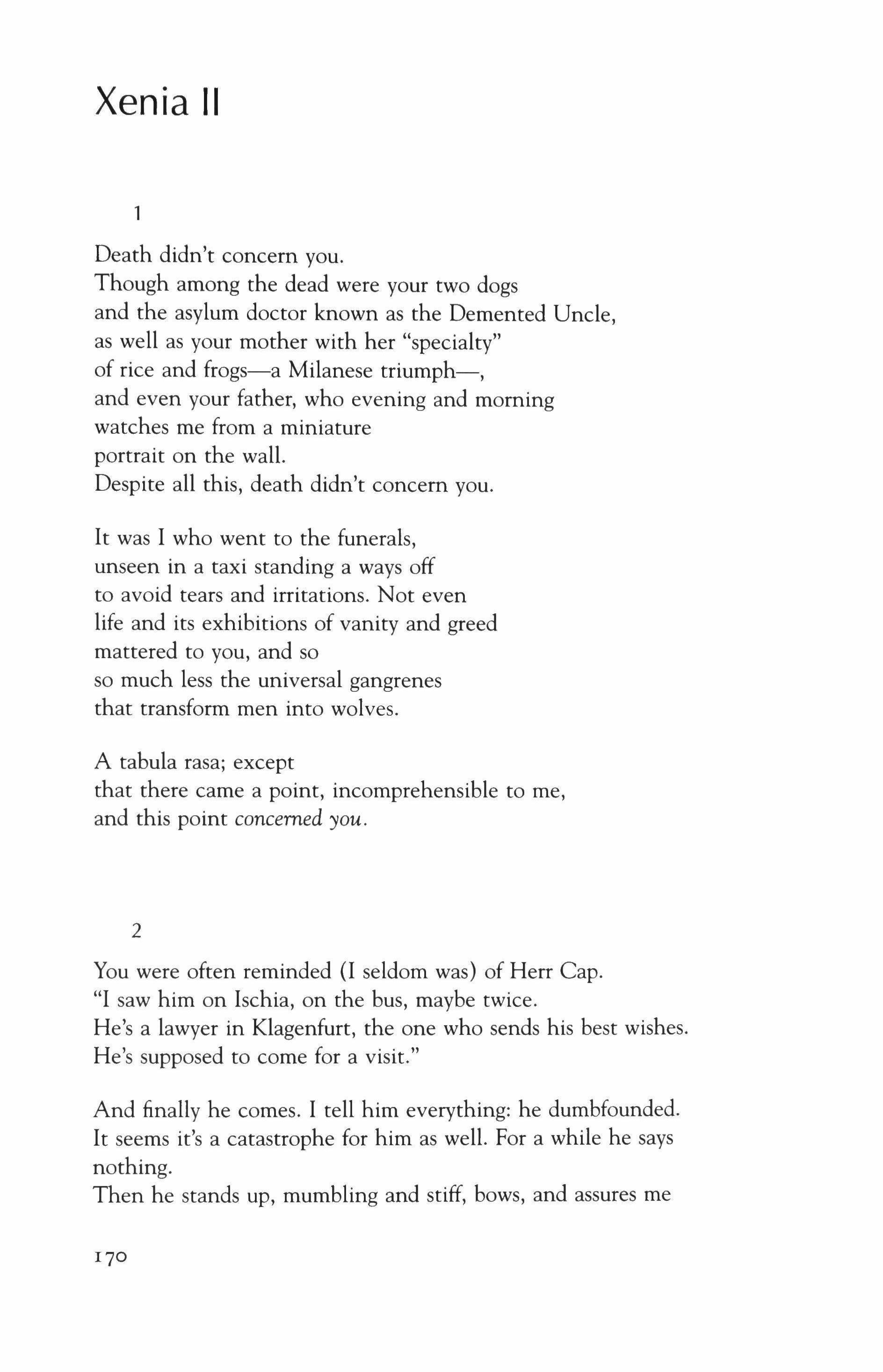
Death didn't concern you. Though among the dead were your two dogs and the asylum doctor known as the Demented Uncle, as well as your mother with her "specialty" of rice and frogs-a Milanese triumph-, and even your father, who evening and morning watches me from a miniature portrait on the wall. Despite all this, death didn't concern you.
It was I who went to the funerals, unseen in a taxi standing a ways off to avoid tears and irritations. Not even life and its exhibitions of vanity and greed mattered to you, and so so much less the universal gangrenes that transform men into wolves.
A tabula rasa; except that there came a point, incomprehensible to me, and this point concerned you. 2
You were often reminded (I seldom was) of Herr Cap. "I saw him on Ischia, on the bus, maybe twice. He's a lawyer in Klagenfurt, the one who sends his best wishes. He's supposed to come for a visit."
And finally he comes. I tell him everything: he dumbfounded. It seems it's a catastrophe for him as well. For a while he says nothing. Then he stands up, mumbling and stiff, bows, and assures me
170
he'll send his best wishes. It's strange how the most unlikely people turned out to understand you. Counsellor Cap. What a name! And Celia. What became of her?
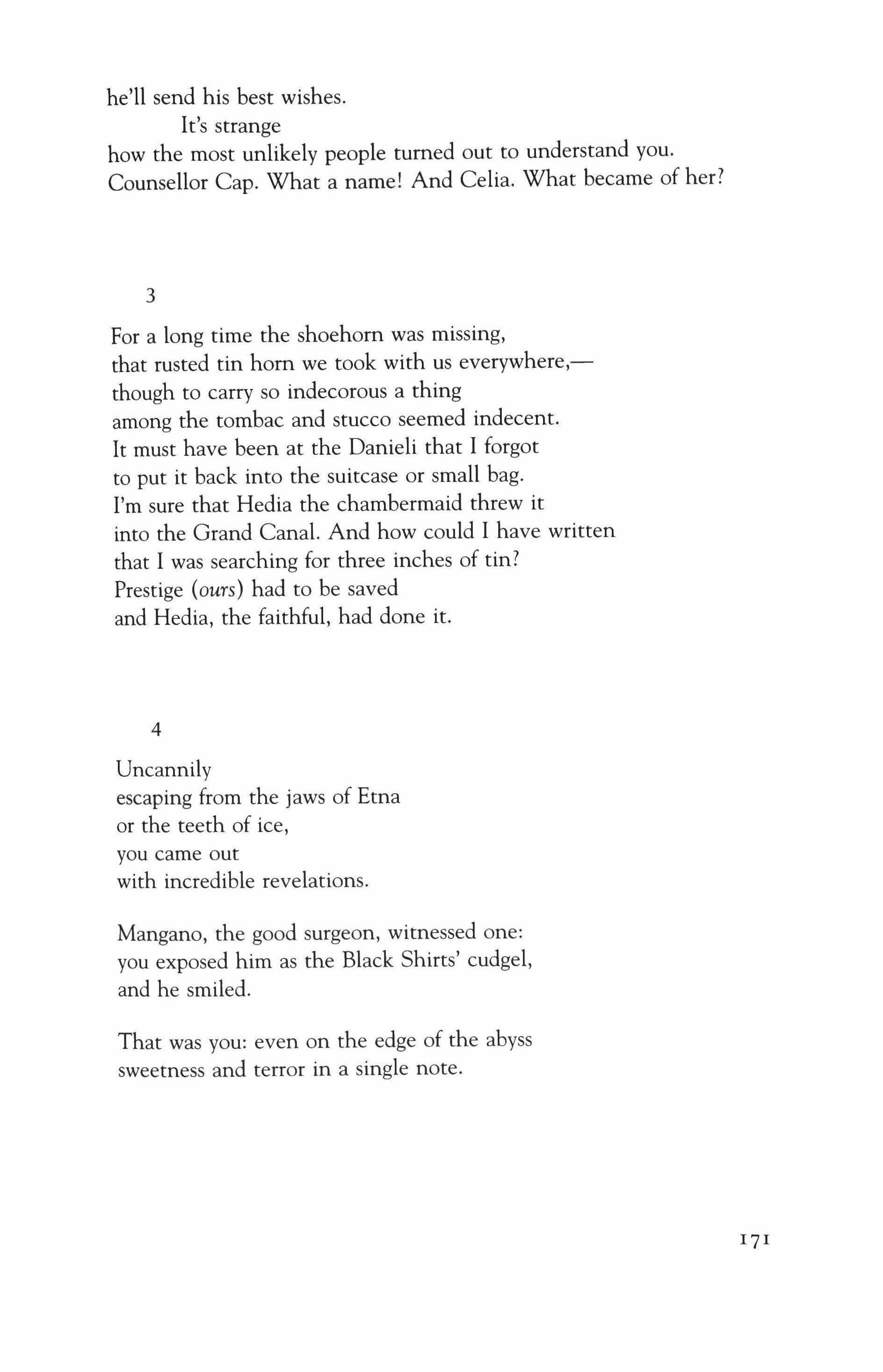
3
For a long time the shoehorn was missing, that rusted tin hom we took with us everywhere,though to carry so indecorous a thing among the tombac and stucco seemed indecent. It must have been at the Daniell that I forgot to put it back into the suitcase or small bag. I'm sure that Hedia the chambermaid threw it into the Grand Canal. And how could I have written that I was searching for three inches of tin?
Prestige {ours} had to be saved and Hedia, the faithful, had done it.
4
Uncannily
escaping from the jaws of Etna or the teeth of ice, you came out with incredible revelations.
Mangano, the good surgeon, witnessed one: you exposed him as the Black Shirts' cudgel, and he smiled.
That was you: even on the edge of the abyss sweetness and terror in a single note.
I've descended, your arm in mine, almost a million stairs and now that you're not here a void opens at every step. Even so, our long journey was brief. Mine still goes on, though I no longer feel the need for connections, reservations, mix-ups, the scorn of those who believe that reality is what one sees.
I've descended millions of stairs, your arm in mine, not, of course, because four eyes see better than two. I descended them with you because I knew that between us the only true pupils, however clouded over, were yours.
6
The wine steward poured you a little Inferno. And you, frightened: "Must I drink it? Isn't it enough to be there slowly burning?"
7
"I've never been sure of being in the world." "How clever," you responded, "and me?" "Oh, you've nibbled at the world's edges, if only in homeopathic doses. But I "
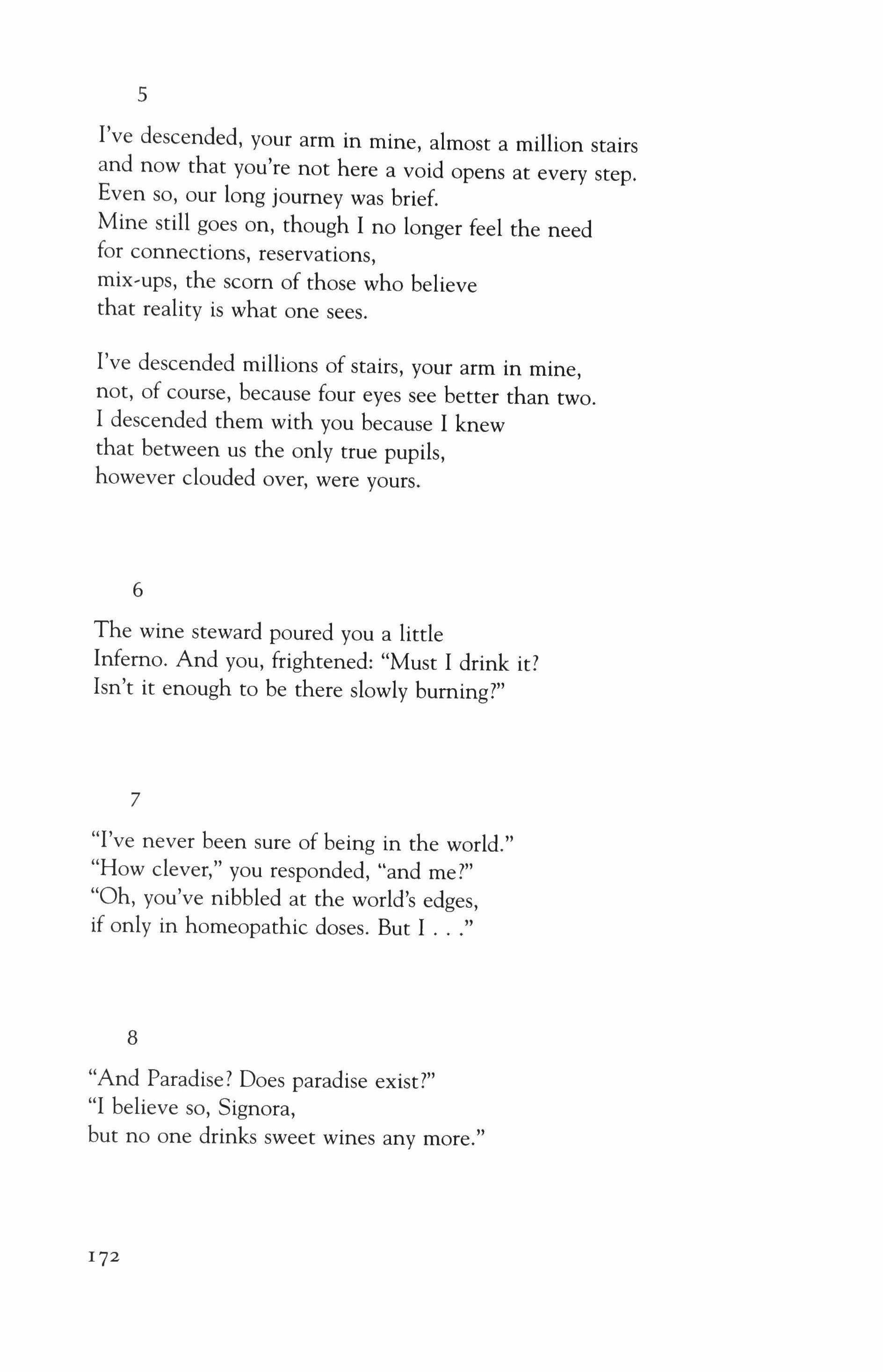
8
"And Paradise? Does paradise exist?"
"I believe so, Signora, but no one drinks sweet wines any more."
5
Nuns and widows, those deadly, malodorous, professional mourners, you wouldn't let yourself look at them. You were sure that even he who has a thousand eyes turns away from them. The all-seeing, him judicious, you didn't call him god, not even with a small g.
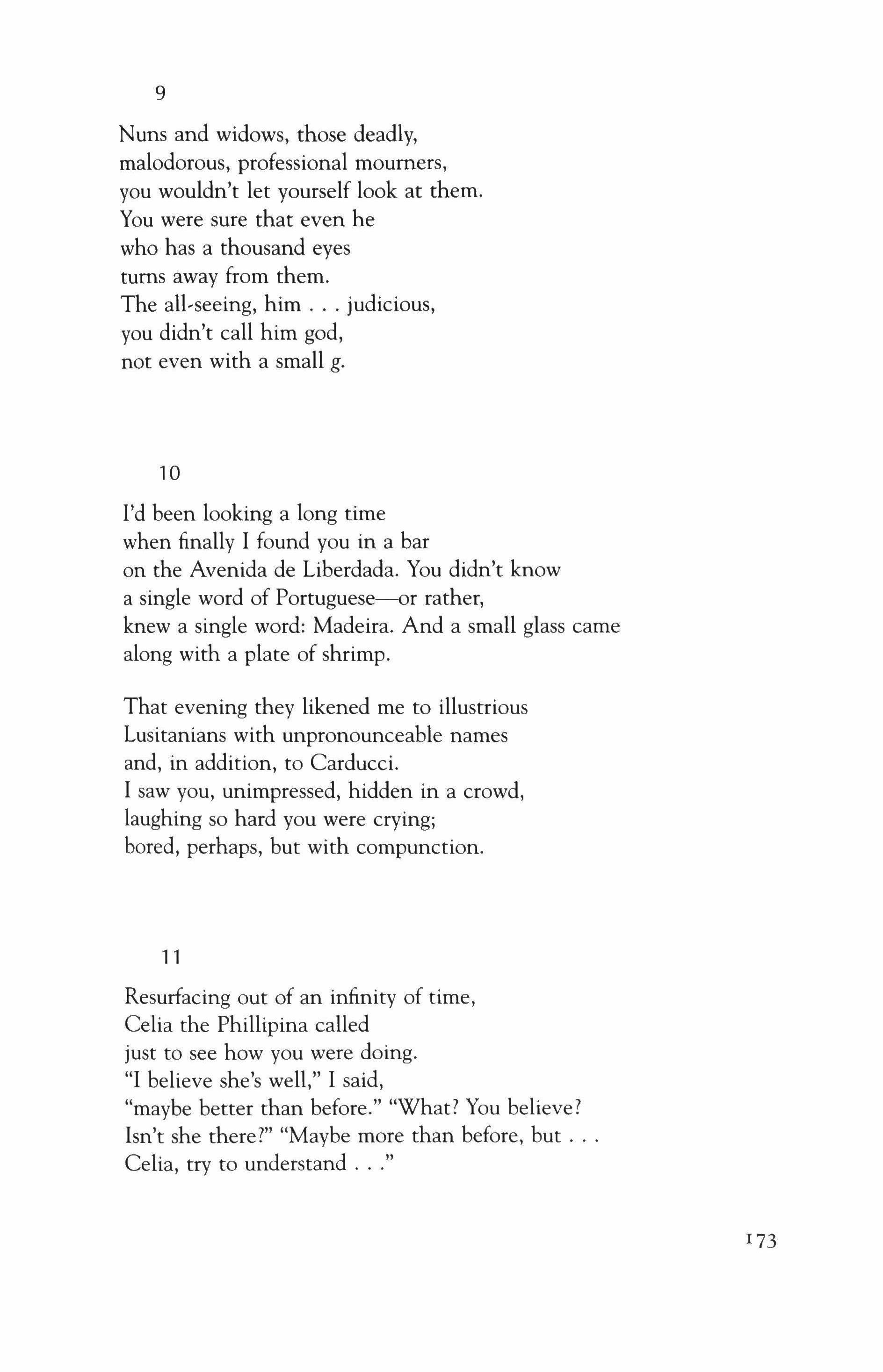
10
l'd been looking a long time when finally I found you in a bar on the Avenida de Liberdada. You didn't know a single word of Portuguese--or rather, knew a single word: Madeira. And a small glass came along with a plate of shrimp.
That evening they likened me to illustrious Lusitanians with unpronounceable names and, in addition, to Carducci.
I saw you, unimpressed, hidden in a crowd, laughing so hard you were crying; bored, perhaps, but with compunction. 11
Resurfacing out of an infinity of time, Celia the Phillipina called just to see how you were doing. "I believe she's well," I said, "maybe better than before." "What? You believe? Isn't she there?" "Maybe more than before, but Celia, try to understand
9
173
On the other end of the line, in Manila or some other name on the atlas, stammering stymied even here. And she slammed down the phone.
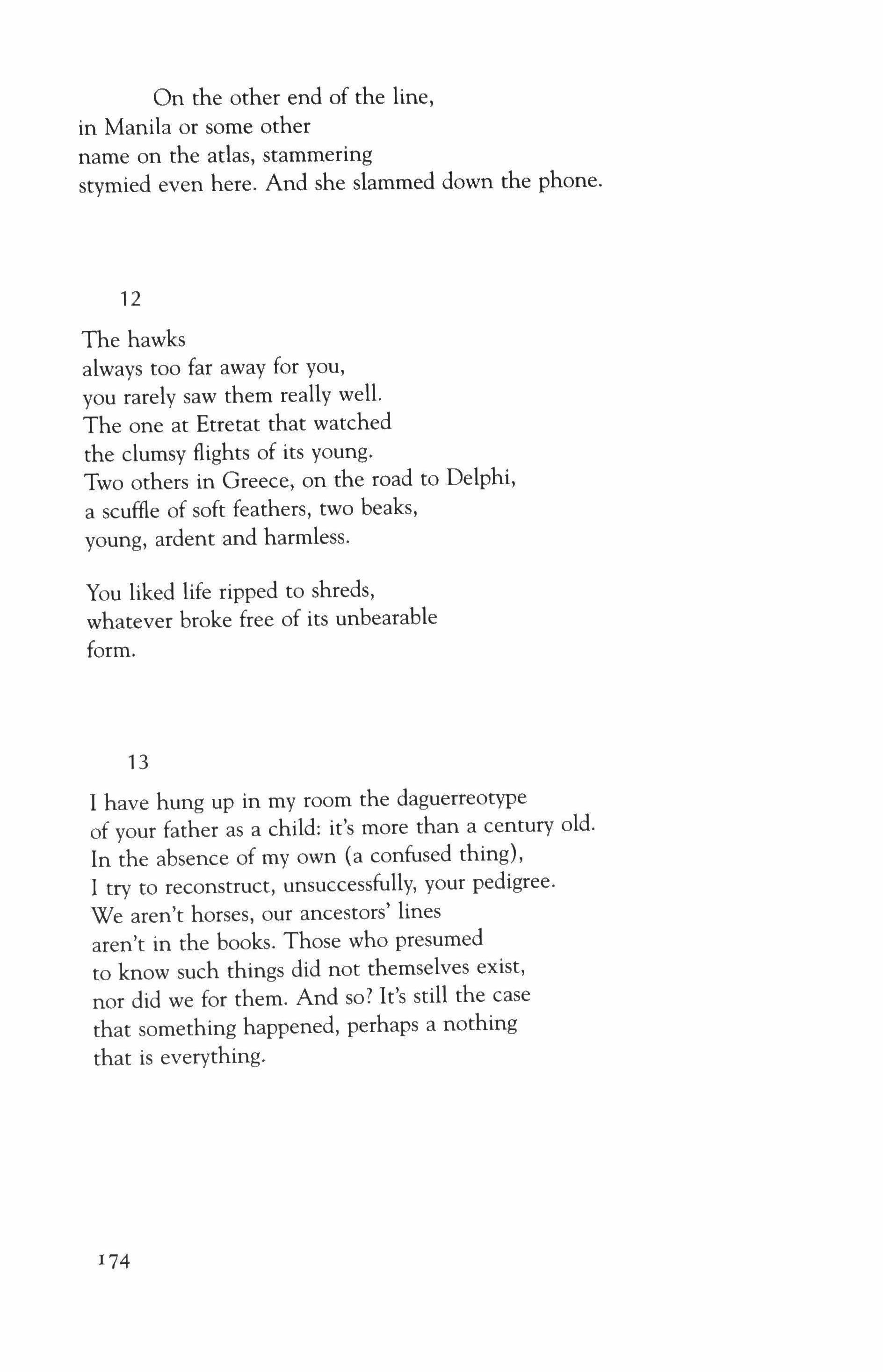
12
The hawks always too far away for you, you rarely saw them really well. The one at Etretat that watched the clumsy flights of its young. Two others in Greece, on the road to Delphi, a scuffle of soft feathers, two beaks, young, ardent and harmless.
You liked life ripped to shreds, whatever broke free of its unbearable form.
13
I have hung up in my room the daguerreotype of your father as a child: it's more than a century old. In the absence of my own (a confused thing), I try to reconstruct, unsuccessfully, your pedigree. We aren't horses, our ancestors' lines aren't in the books. Those who presumed to know such things did not themselves exist, nor did we for them. And so? It's still the case that something happened, perhaps a nothing that is everything.
174
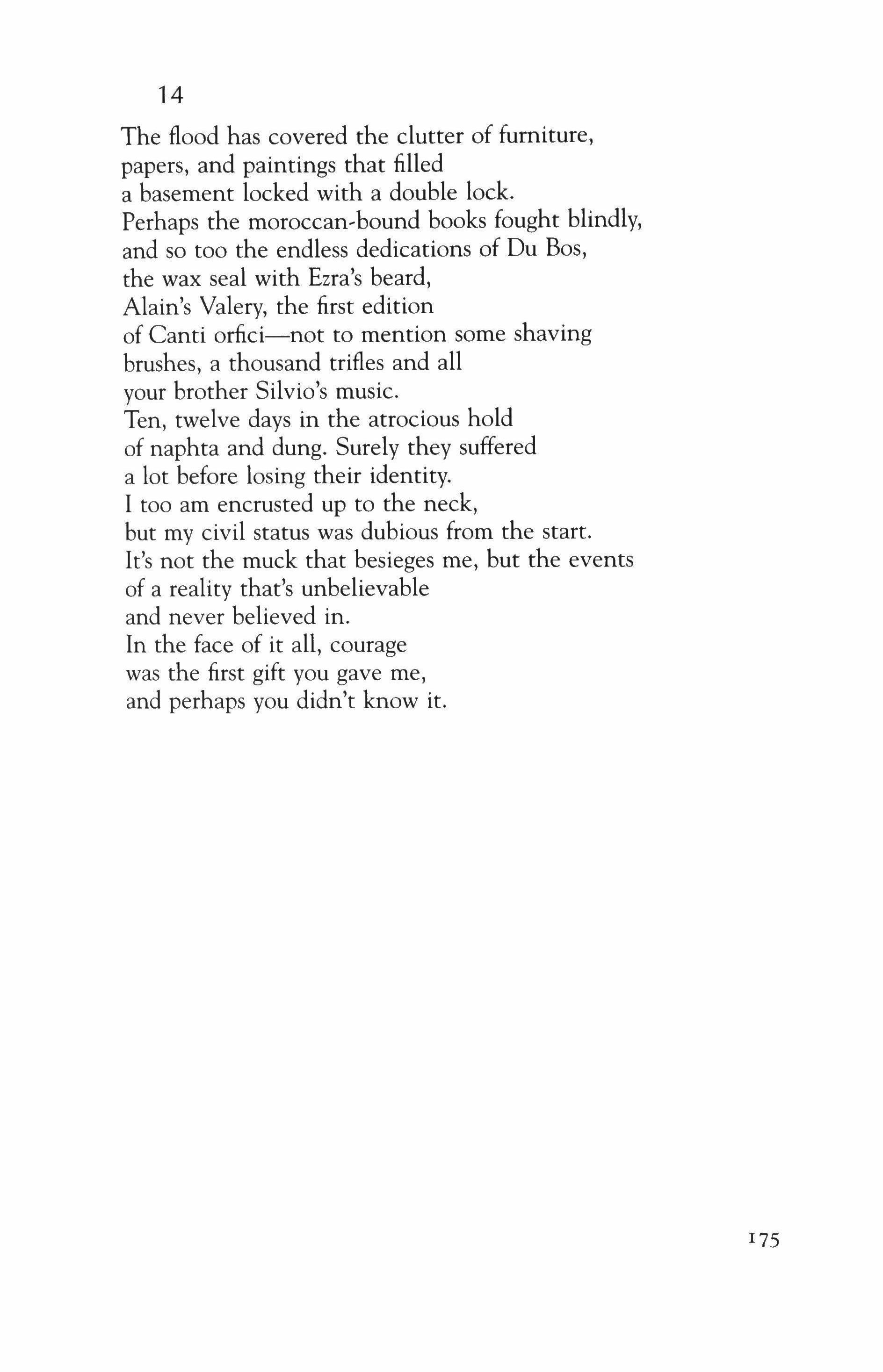
The flood has covered the clutter of furniture, papers, and paintings that filled a basement locked with a double lock. Perhaps the moroccan-bound books fought blindly, and so too the endless dedications of Du Bos, the wax seal with Ezra's beard, Alain's Valery, the first edition of Canti offici-not to mention some shaving brushes, a thousand trifles and all your brother Silvio's music. Ten, twelve days in the atrocious hold of naphta and dung. Surely they suffered a lot before losing their identity. I too am encrusted up to the neck, but my civil status was dubious from the start. It's not the muck that besieges me, but the events of a reality that's unbelievable and never believed in. In the face of it all, courage was the first gift you gave me, and perhaps you didn't know it.
14
175
C. P. Cavafy:
Translated from the Greek by
Aliki Bamstone
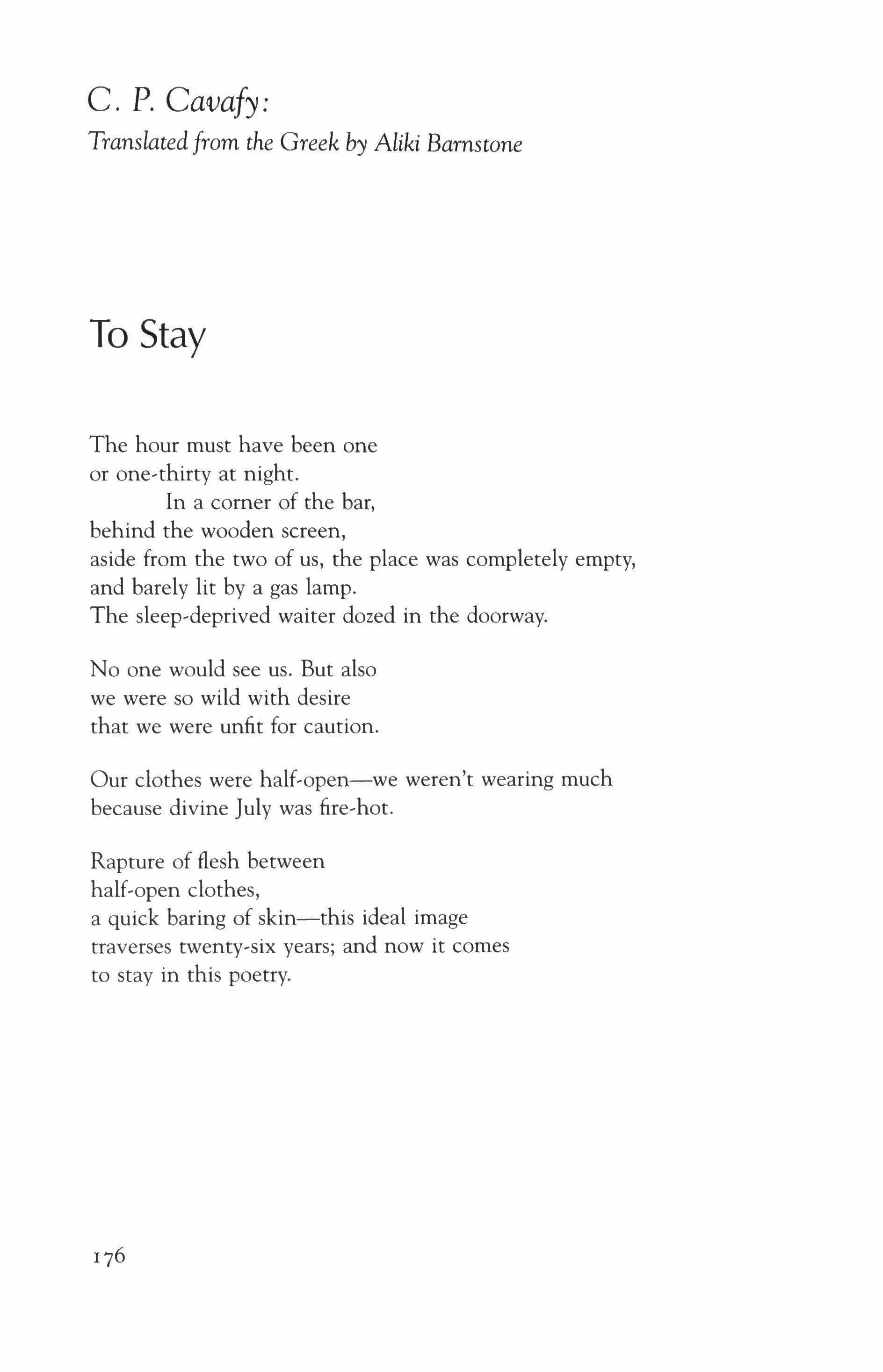
To Stay
The hour must have been one or one-thirty at night. In a comer of the bar, behind the wooden screen, aside from the two of us, the place was completely empty, and barely lit by a gas lamp. The sleep-deprived waiter dozed in the doorway.
No one would see us. But also we were so wild with desire that we were unfit for caution.
Our clothes were half-open-e-we weren't wearing much because divine July was fire-hot.
Rapture of flesh between half-open clothes, a quick baring of skin-this ideal image traverses twenty-six years; and now it comes to stay in this poetry.
176
Candles
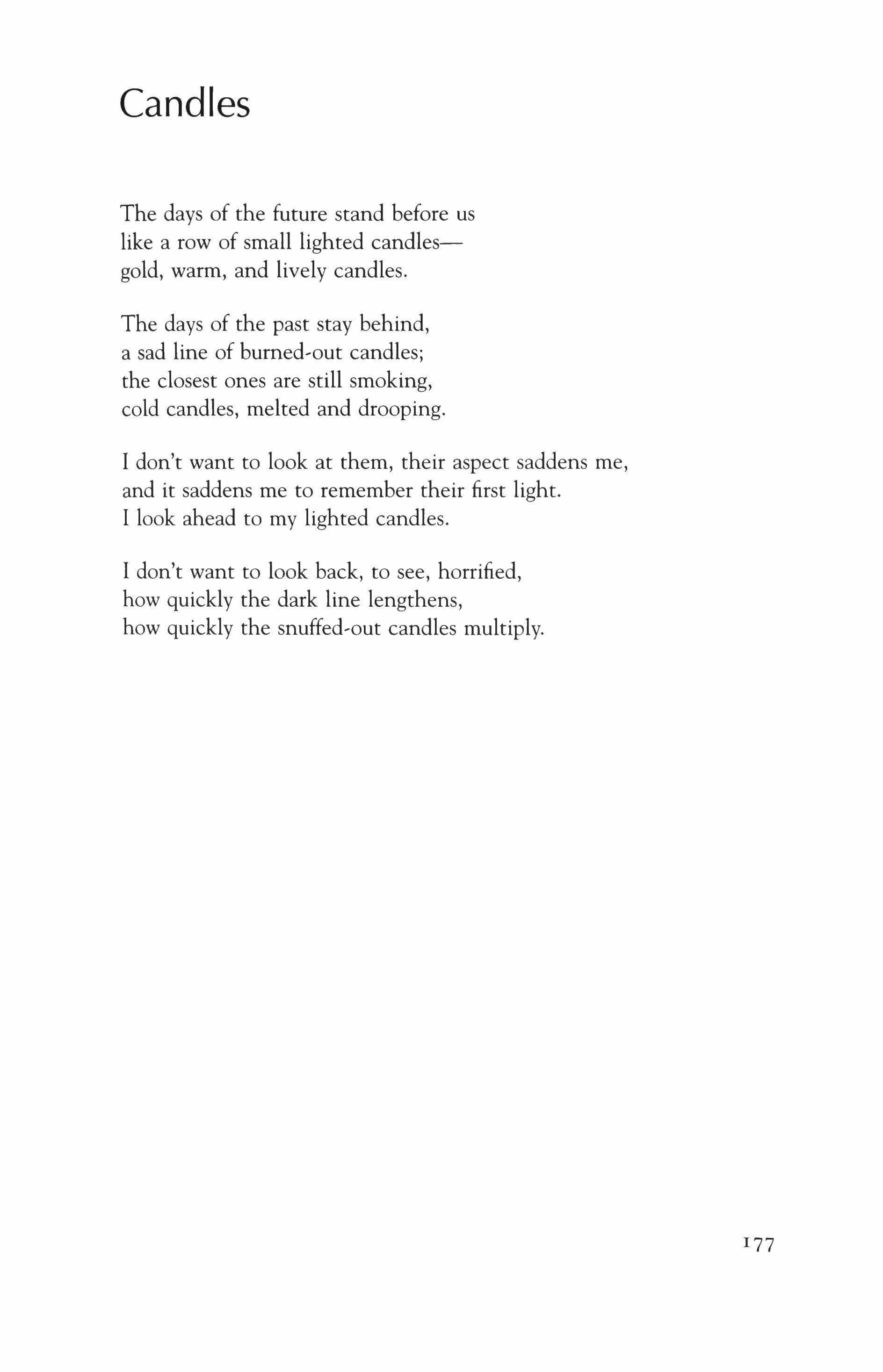
The days of the future stand before us like a row of small lighted candlesgold, warm, and lively candles.
The days of the past stay behind, a sad line of burned,out candles; the closest ones are still smoking, cold candles, melted and drooping.
I don't want to look at them, their aspect saddens me, and it saddens me to remember their first light. I look ahead to my lighted candles.
I don't want to look back, to see, horrified, how quickly the dark line lengthens, how quickly the snuffed-out candles multiply.
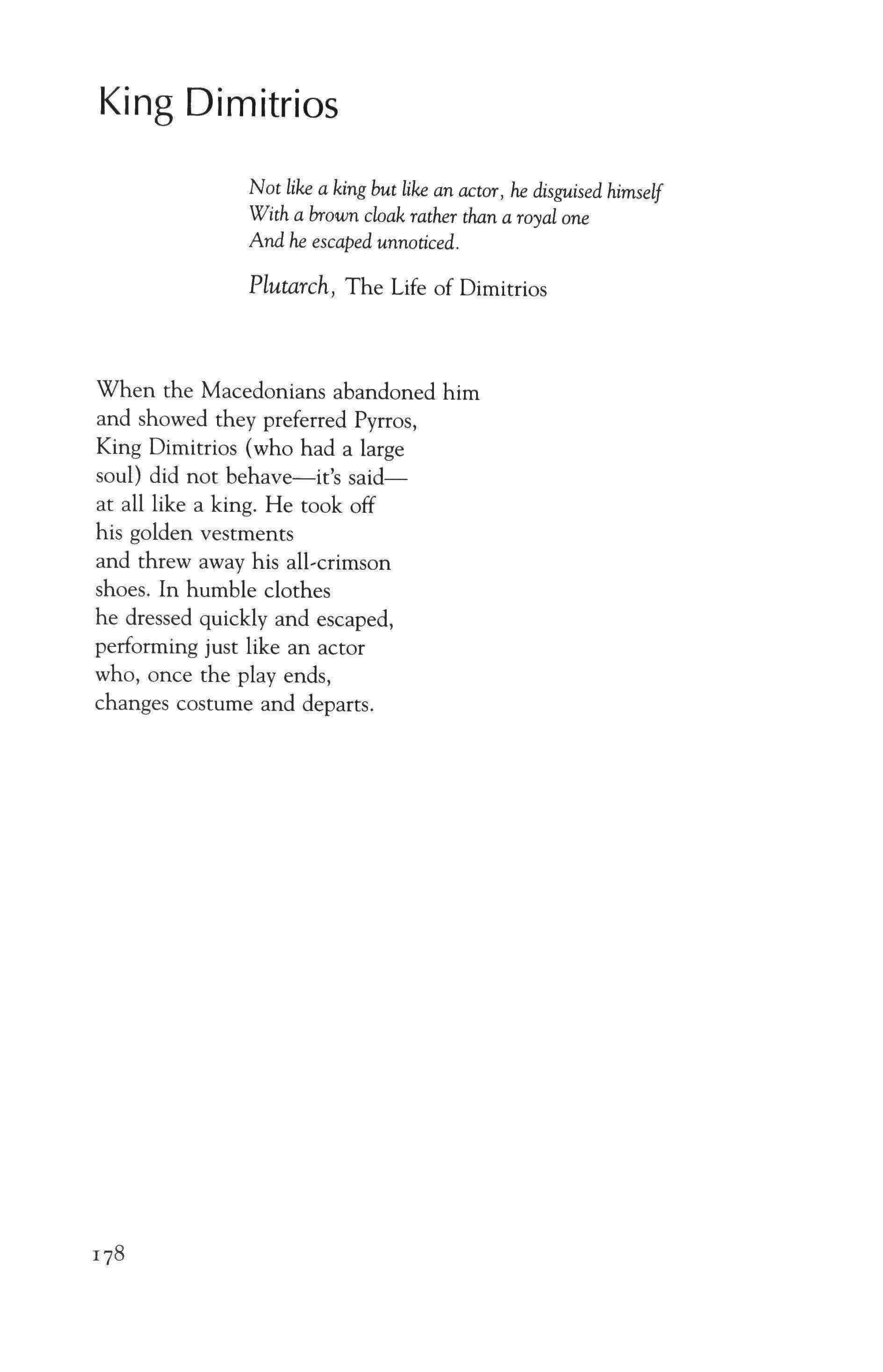
King Dimitrios
Not like a king but like an actor, he disguised himself With a brown cloak rather than a royal one And he escaped unnoticed.
Plutarch, The Life of Dimitrios
When the Macedonians abandoned him and showed they preferred Pyrros, King Dimitrios (who had a large soul) did not behave-it's saidat all like a king. He took off his golden vestments and threw away his all-crimson shoes. In humble clothes he dressed quickly and escaped, performing just like an actor who, once the play ends, changes costume and departs.
178
The Horses of Achilles
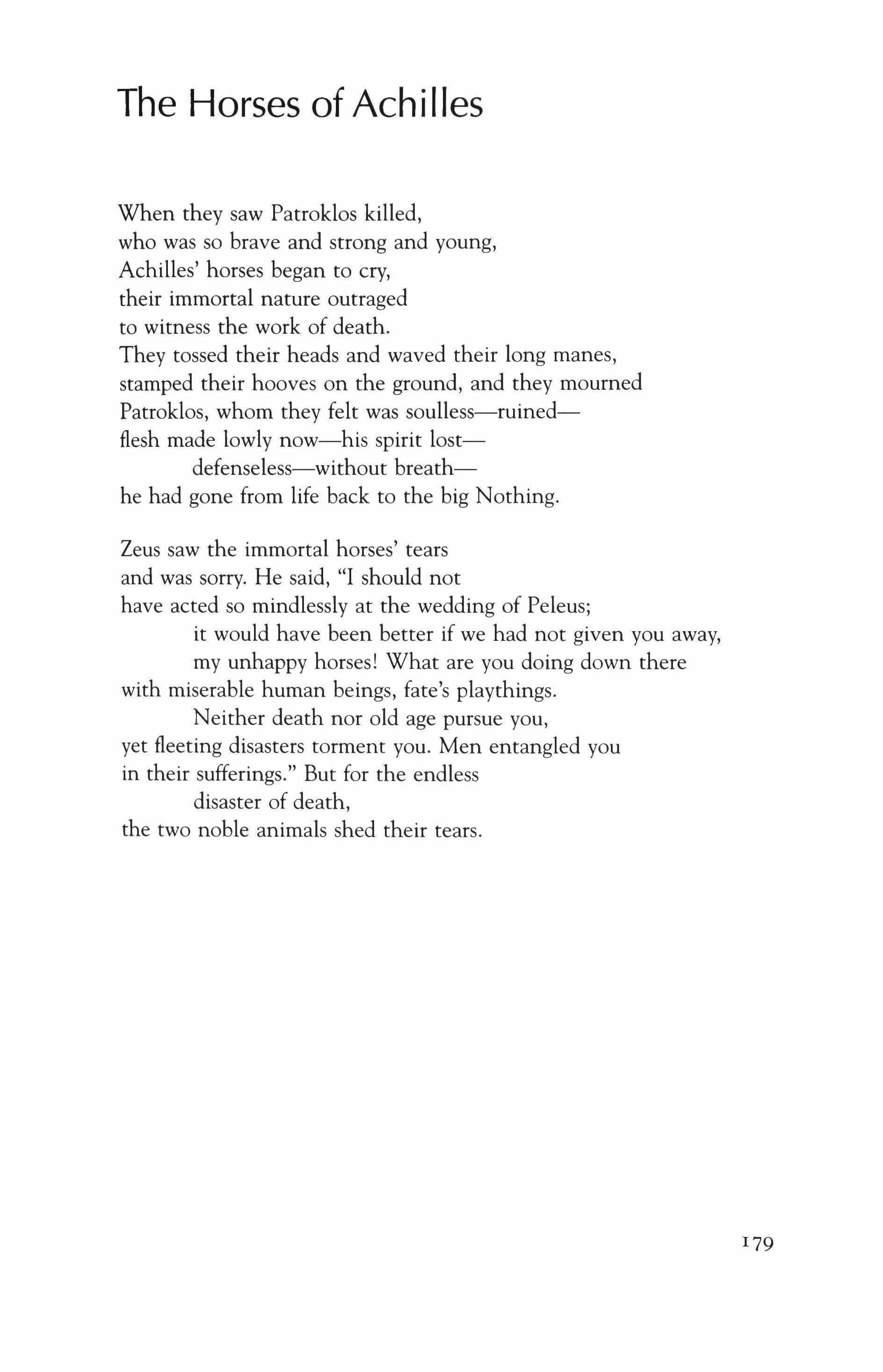
When they saw Patroklos killed, who was so brave and strong and young, Achilles' horses began to cry, their immortal nature outraged to witness the work of death. They tossed their heads and waved their long manes, stamped their hooves on the ground, and they mourned Patroklos, whom they felt was soulless-ruinedflesh made lowly now-his spirit lostdefenseless-without breathhe had gone from life back to the big Nothing.
Zeus saw the immortal horses' tears and was sorry. He said, "I should not have acted so mindlessly at the wedding of Peleus; it would have been better if we had not given you away, my unhappy horses! What are you doing down there with miserable human beings, fate's playthings. Neither death nor old age pursue you, yet fleeting disasters torment you. Men entangled you in their sufferings." But for the endless disaster of death, the two noble animals shed their tears.
179
Guy Goffette:
Translated from the French by Marilyn Hacker
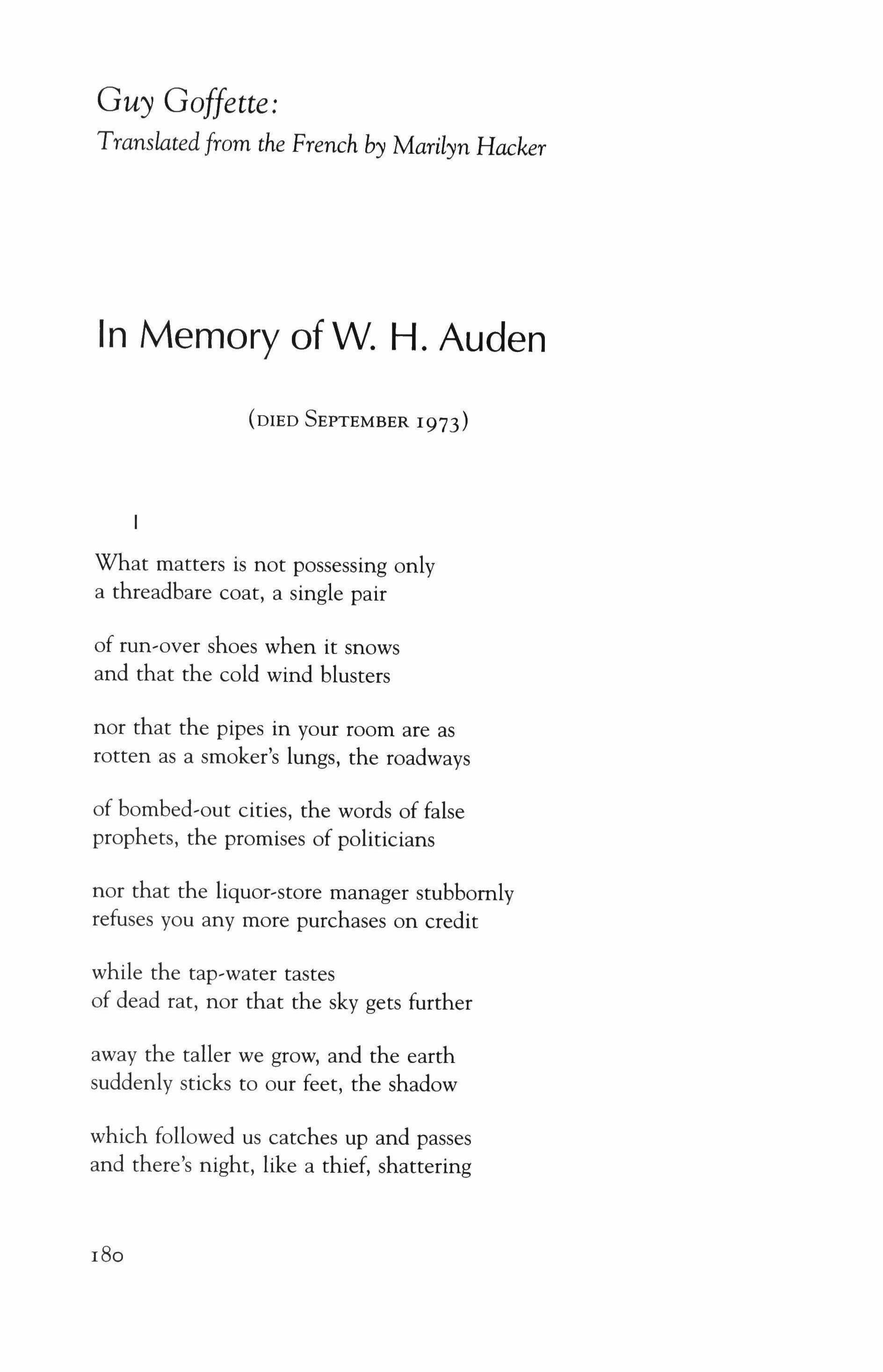
I n Memory of W. H.
Auden
(DIED SEPTEMBER 1973)
What matters is not possessing only a threadbare coat, a single pair of run-over shoes when it snows and that the cold wind blusters
nor that the pipes in your room are as rotten as a smoker's lungs, the roadways of bombed-out cities, the words of false prophets, the promises of politicians
nor that the liquor-store manager stubbornly refuses you any more purchases on credit
while the tap-water tastes of dead rat, nor that the sky gets further
away the taller we grow, and the earth suddenly sticks to our feet, the shadow which followed us catches up and passes and there's night, like a thief, shattering
180
the stare of the traveler stopped short amidst his suitcases, which carries off along with the key to the landscape the road and the thirst and the spice of life. What matters he said, is to have forgotten that man, shaken by the blasts of sundry distresses and anguish, is vaster and deeper than the sea and nonetheless more fragile than a fallen leaf if, propped up against himself within the beaten body's prison, he no longer can pay homage to the present, for life which flowers on a face or flames up like a rose.
II
We must love one another or die.
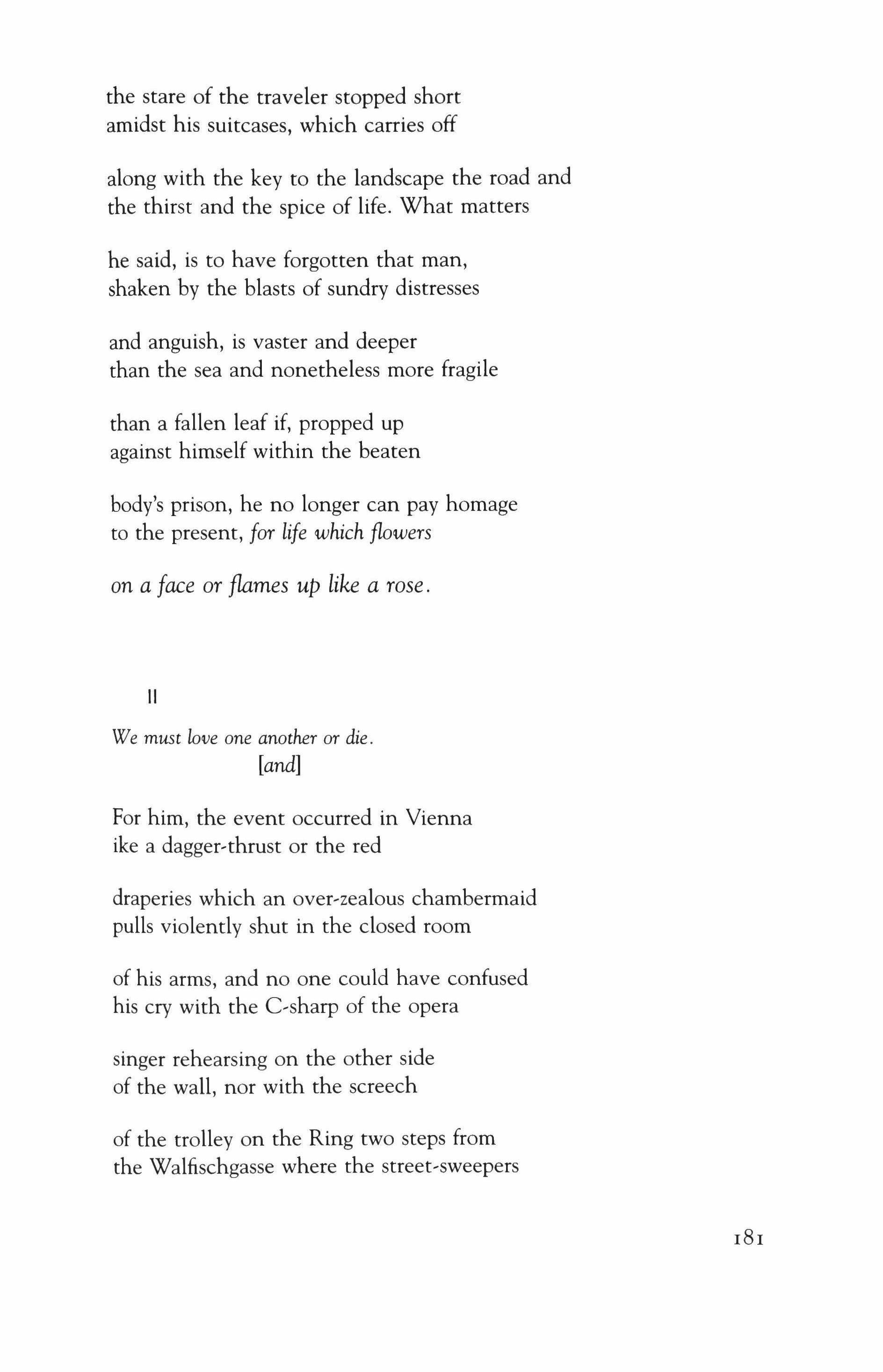
For him, the event occurred in Vienna ike a dagger-thrust or the red draperies which an over-zealous chambermaid pulls violently shut in the closed room of his arms, and no one could have confused his cry with the C-sharp of the opera singer rehearsing on the other side of the wall, nor with the screech of the trolley on the Ring two steps from the Walfischgasse where the street-sweepers
[and]
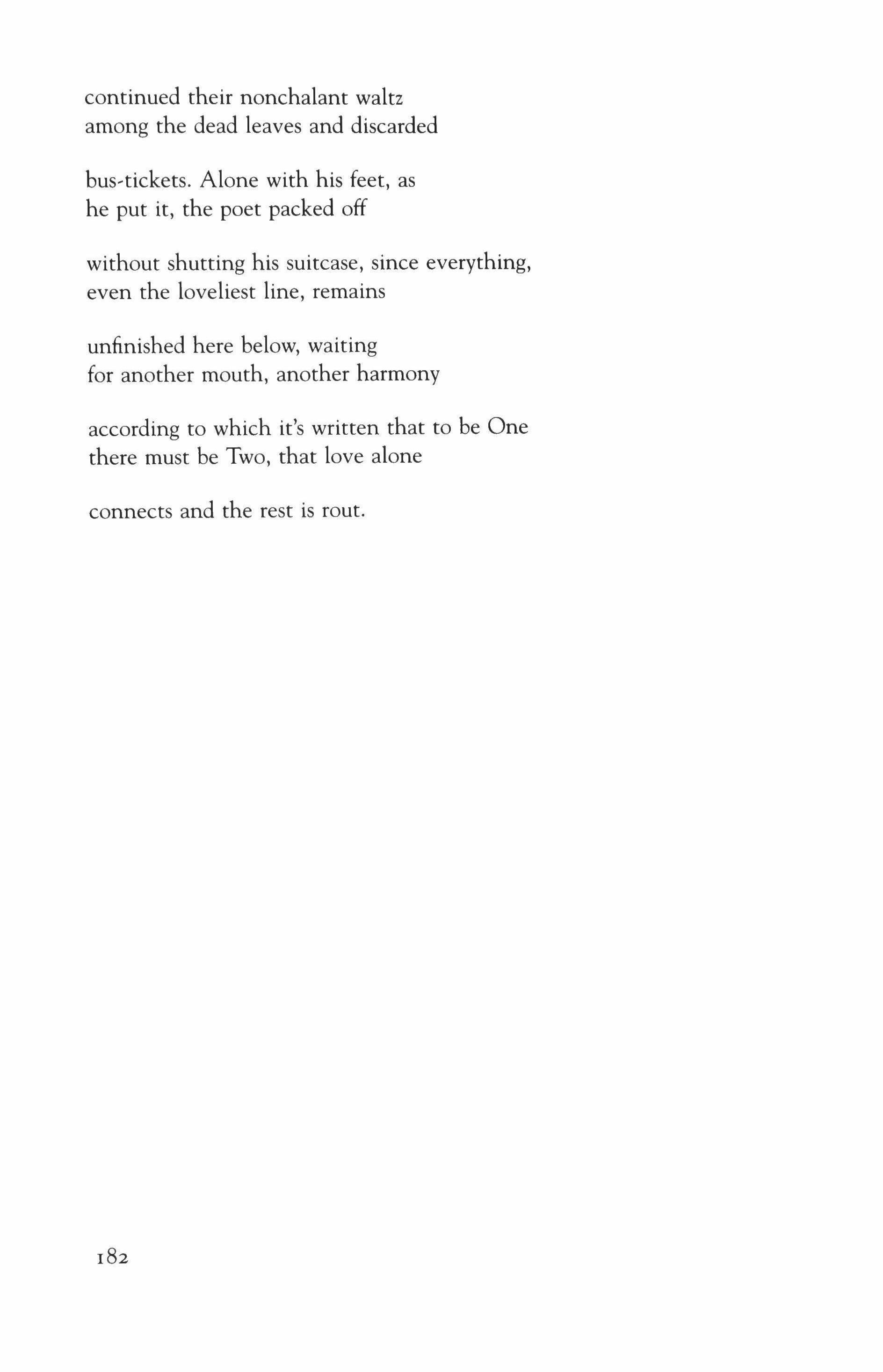
continued their nonchalant waltz among the dead leaves and discarded bus-tickets. Alone with his feet, as he put it, the poet packed off without shutting his suitcase, since everything, even the loveliest line, remains unfinished here below, waiting for another mouth, another harmony according to which it's written that to be One there must be Two, that love alone connects and the rest is rout.
Poet in Groningen
FOR RUTGER KOPLAND
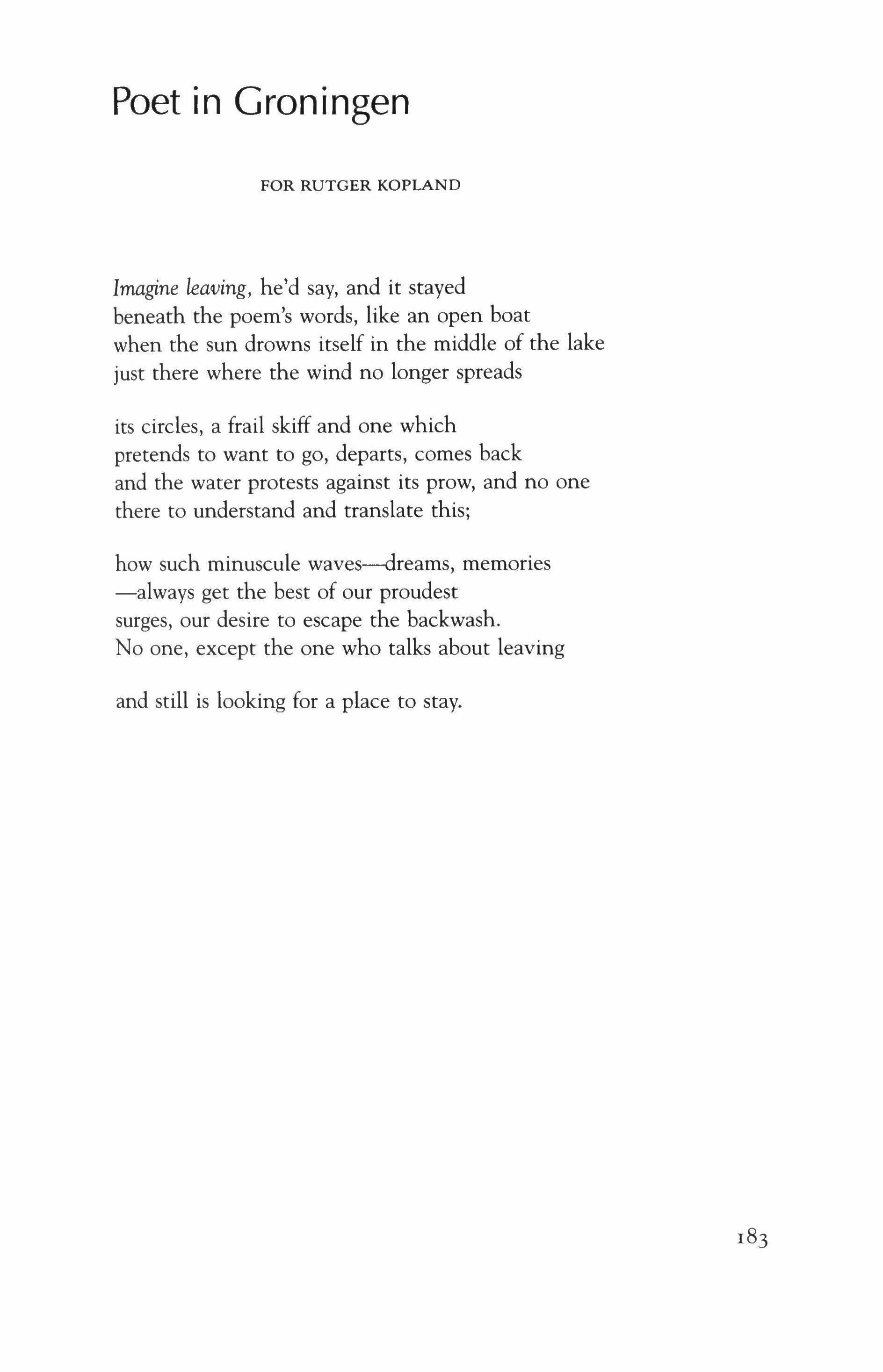
Imagine leaving, he'd say, and it stayed beneath the poem's words, like an open boat when the sun drowns itself in the middle of the lake just there where the wind no longer spreads its circles, a frail skiff and one which pretends to want to go, departs, comes back and the water protests against its prow, and no one there to understand and translate this; how such minuscule waves--dreams, memories -always get the best of our proudest surges, our desire to escape the backwash. No one, except the one who talks about leaving and still is looking for a place to stay.
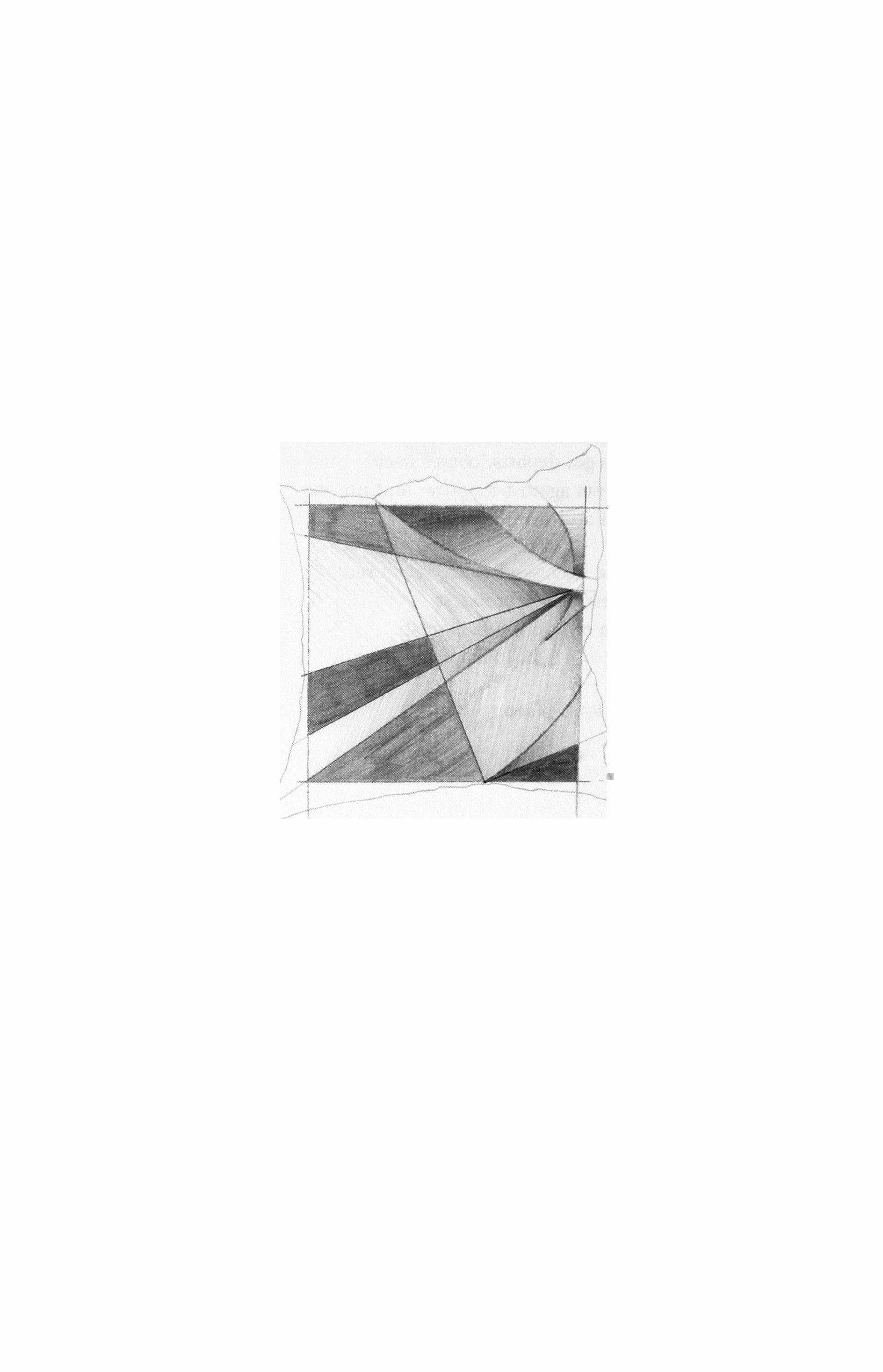
Edward Hirsch

Whitman Leaves the Boardwalk
I am so small walking on the beach at night under the widening sky. The wet sand quickens beneath my feet and the waves thunder against the shore.
I am moving away from the boardwalk with its colorful streamers ofpeople and the hotels with their blinking lights. The wind sighs for hundreds of miles.
I am disappearing so far into the dark I have vanished from sight.
I am a tiny seashell that has secretly drifted ashore and carries the sound of the ocean surging through its body I am so small now no one can see me. How can I be filled by such a vast love?
185
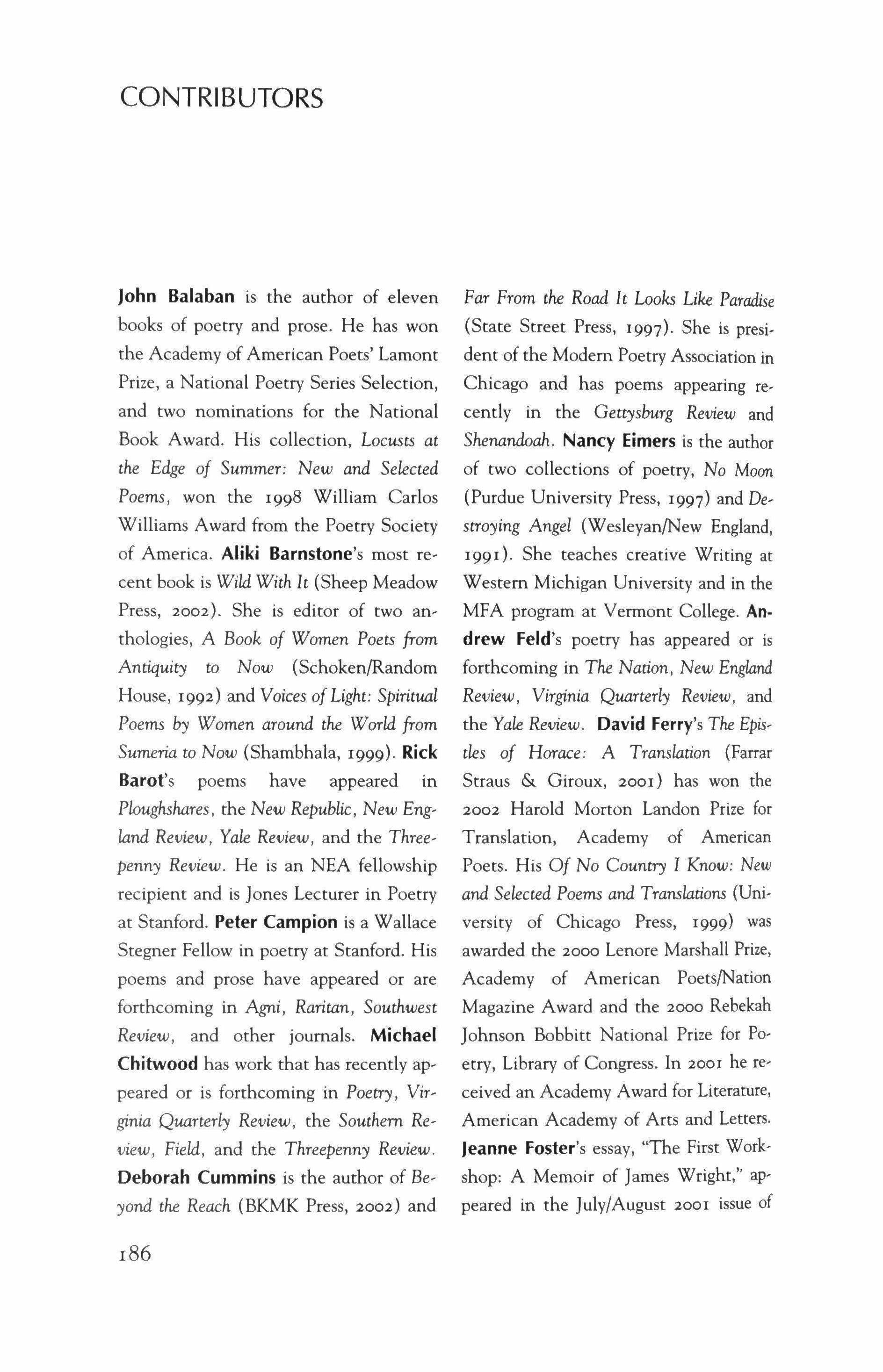
John Balaban is the author of eleven books of poetry and prose. He has won the Academy of American Poets' Lamont Prize, a National Poetry Series Selection, and two nominations for the National Book Award. His collection, Locusts at the Edge of Summer: New and Selected Poems, won the 1998 William Carlos Williams Award from the Poetry Society of America. Aliki Barnstone's most recent book is Wild With It (Sheep Meadow Press, 2002). She is editor of two anthologies, A Book of Women Poets from Antiquity to Now (Schoken/Random House, 1992) and Voices ofLight: Spiritual Poems by Women around the World from Sumeria to Now (Shambhala, 1999)' Rick Barot's poems have appeared in Ploughshares, the New Republic, New England Review, Yale Review, and the Threepenny Review. He is an NEA fellowship recipient and is Jones Lecturer in Poetry at Stanford. Peter Campion is a Wallace Stegner Fellow in poetry at Stanford. His poems and prose have appeared or are forthcoming in Agni, Raritan, Southwest Review, and other journals. Michael Chitwood has work that has recently appeared or is forthcoming in Poetry, Virginia Quarterly Review, the Southern Review, Field, and the Threepenny Review. Deborah Cummins is the author of Beyond the Reach (BKMK Press, 2002) and
Far From the Road It Looks Like Paradise (State Street Press, 1997)' She is president of the Modern Poetry Association in Chicago and has poems appearing recently in the Gettysburg Review and Shenandoah. Nancy Eimers is the author of two collections of poetry, No Moon (Purdue University Press, 1997) and Destroying Angel (Wesleyan/New England, 1991). She teaches creative Writing at Western Michigan University and in the MFA program at Vermont College. Andrew Feld's poetry has appeared or is forthcoming in The Nation, New England Review, Virginia Quarterly Review, and the Yale Review. David Ferry's The Epistles of Horace: A Translation (Farrar Straus & Giroux, 2001) has won the 2002 Harold Morton Landon Prize for Translation, Academy of American Poets. His Of No Country I Know: New and Selected Poems and Translations (University of Chicago Press, 1999) was awarded the 2000 Lenore Marshall Prize, Academy of American Poets/Nation Magazine Award and the 2000 Rebekah Johnson Bobbitt National Prize for Poetry, Library of Congress. In 2001 he received an Academy Award for Literature, American Academy of Arts and Letters. Jeanne Foster's essay, "The First Workshop: A Memoir of James Wright," appeared in the July/August 2001 issue of
CONTRIBUTORS
186
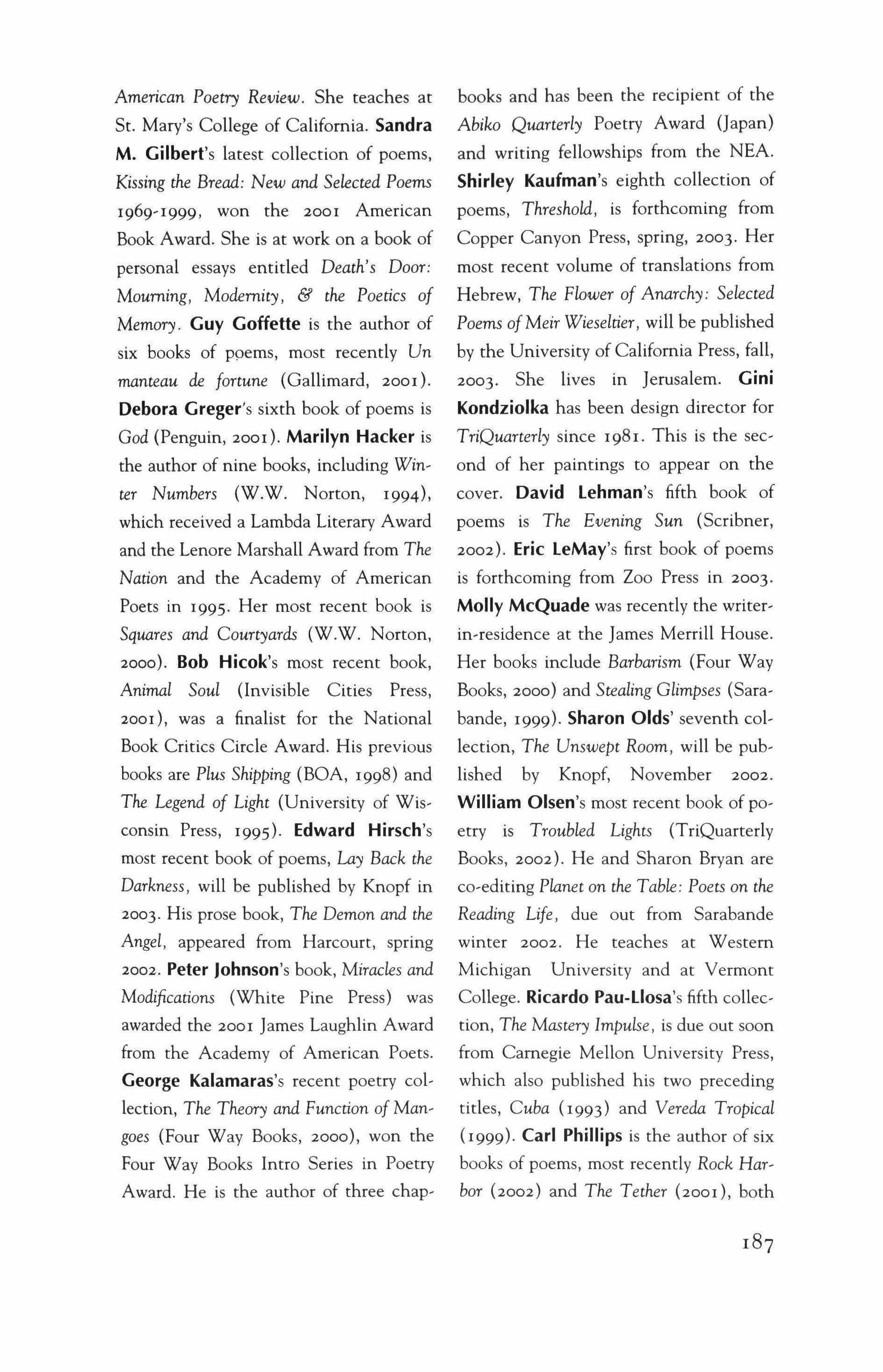
American Poetry Review. She teaches at St. Mary's College of California. Sandra M. Gilbert's latest collection of poems, Kissing the Bread: New and Selected Poems 1969- 1 999 won the 2001 American Book Award. She is at work on a book of personal essays entitled Deatb's Door: Mourning, Modernity, & the Poetics of Memory. Guy GoffeUe is the author of six books of poems, most recently Un manteau de fortune (Gallimard, 2001).
Debora Greger's sixth book of poems is God (Penguin, 2001). Marilyn Hacker is the author of nine books, including Winter Numbers (W.W. Norton, 1994), which received a Lambda Literary Award and the Lenore Marshall Award from The Nation and the Academy of American Poets in 1995. Her most recent book is Squares and Courtyards (W.W. Norton, 2000). Bob Hicok's most recent book, Animal Soul (Invisible Cities Press, 2001), was a finalist for the National Book Critics Circle Award. His previous books are Plus Shipping (BOA, 1998) and The Legend of Light (University of Wisconsin Press, 1995). Edward Hirsch's most recent book of poems, Lay Back the Darkness, will be published by Knopf in 2003. His prose book, The Demon and the Angel, appeared from Harcourt, spring 2002. Peter Johnson's book, Miracles and Modifications (White Pine Press) was awarded the 2001 James Laughlin Award from the Academy of American Poets.
George Kalamaras's recent poetry collection, The Theory and Function of Mangoes (Four Way Books, 2000), won the Four Way Books Intro Series in Poetry Award. He is the author of three chap-
books and has been the recipient of the Abiko Quarterly Poetry Award (Japan) and writing fellowships from the NEA.
Shirley Kaufman's eighth collection of poems, Threshold, is forthcoming from Copper Canyon Press, spring, 2003. Her most recent volume of translations from Hebrew, The Flower of Anarchy: Selected Poems of Meir Wieseltier, will be published by the University of California Press, fall, 2003. She lives in Jerusalem. Gini Kondziolka has been design director for TriQuarterly since 1981. This is the second of her paintings to appear on the cover. David Lehman's fifth book of poems is The Evening Sun (Scribner, 2002). Eric LeMay's first book of poems is forthcoming from Zoo Press in 2003. Molly McQuade was recently the writerin-residence at the James Merrill House. Her books include Barbarism (Four Way Books, 2000) and Stealing Glimpses (Sarabande, 1999). Sharon Olds' seventh collection, The Unswept Room, will be published by Knopf, November 2002. William Olsen's most recent book of poetry is Troubled Lights (TriQuarterly Books, 2002). He and Sharon Bryan are co-editing Planet on the Table: Poets on the Reading Life, due out from Sarabande winter 2002. He teaches at Western Michigan University and at Vermont College. Ricardo Pau-L1osa's fifth collection, The Mastery Impulse, is due out soon from Carnegie Mellon University Press, which also published his two preceding titles, Cuba (1993) and Vereda Tropical (1999). Carl Phillips is the author of six books of poems, most recently Rock Harbor (2002) and The Tether (2001), both
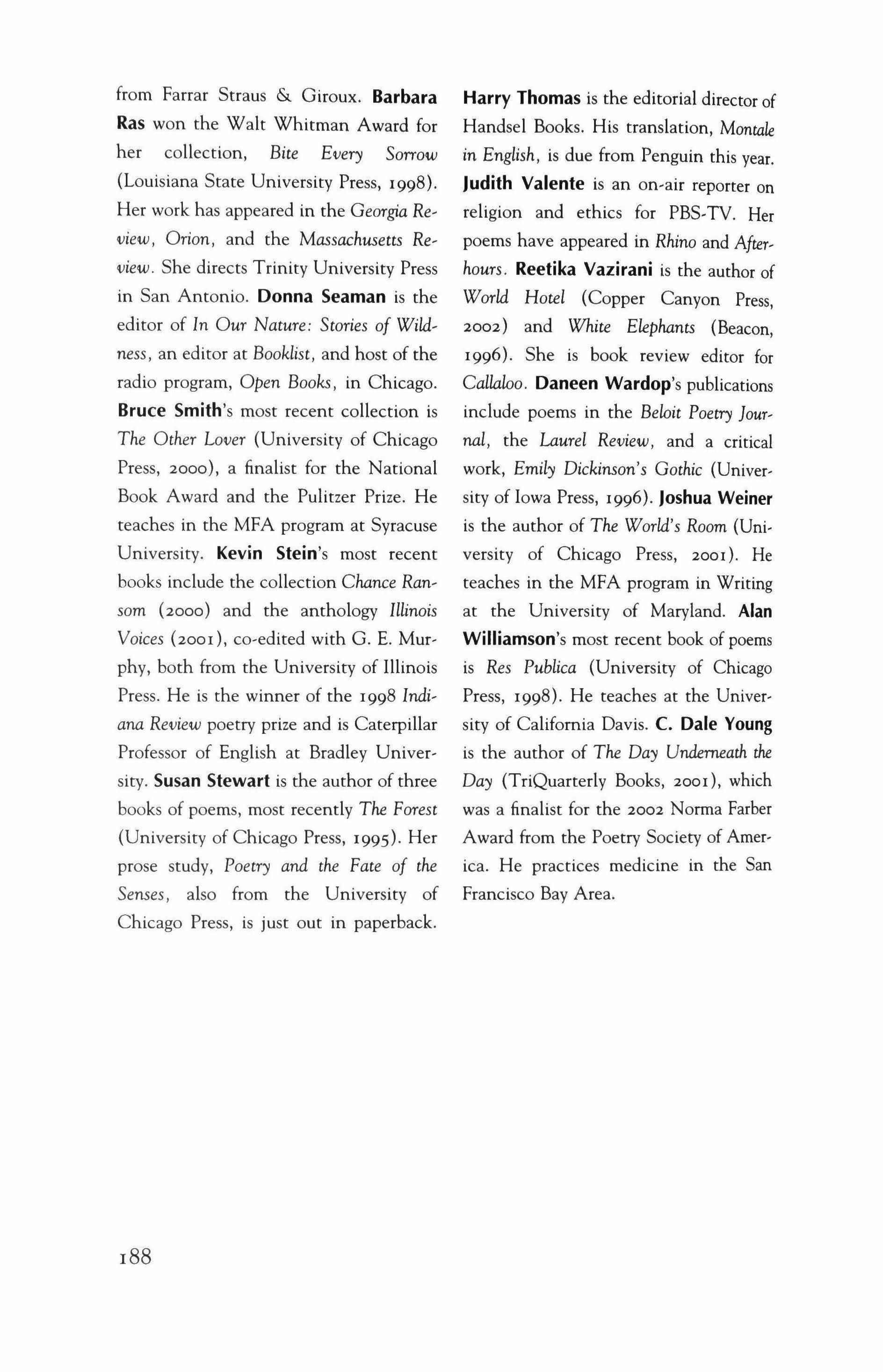
from Farrar Straus & Giroux. Barbara Ras won the Walt Whitman Award for her collection, Bite Every Sorrow (Louisiana State University Press, 1998). Her work has appeared in the Georgia Review, Orion, and the Massachusetts Review. She directs Trinity University Press in San Antonio. Donna Seaman is the editor of In Our Nature: Stories of Wildness, an editor at Booklist, and host of the radio program, Open Books, in Chicago. Bruce Smith's most recent collection is The Other Lover (University of Chicago Press, 2000), a finalist for the National Book Award and the Pulitzer Prize. He teaches in the MFA program at Syracuse University. Kevin Stein's most recent books include the collection Chance Ransom (2000) and the anthology Illinois Voices (2001), co-edited with G. E. Murphy, both from the University of Illinois Press. He is the winner of the 1998 Indiana Review poetry prize and is Caterpillar Professor of English at Bradley University. Susan Stewart is the author of three books of poems, most recently The Forest (University of Chicago Press, 1995). Her prose study, Poetry and the Fate of the Senses, also from the University of Chicago Press, is just out in paperback.
Harry Thomas is the editorial director of Handsel Books. His translation, Montale in English, is due from Penguin this year. Judith Valente is an on-air reporter on religion and ethics for PBS-TV. Her poems have appeared in Rhino and Afterhours. Reetika Vazirani is the author of World Hotel (Copper Canyon Press, 2002) and White Elephants (Beacon, 1996). She is book review editor for Callaloo. Daneen Wardop's publications include poems in the Beloit Poetry Journal, the Laurel Review, and a critical work, Emily Dickinson's Gothic (University of Iowa Press, 1996). Joshua Weiner is the author of The WorUl's Room (University of Chicago Press, 2001). He teaches in the MFA program in Writing at the University of Maryland. Alan Williamson's most recent book of poems is Res Publica (University of Chicago Press, 1998). He teaches at the University of California Davis. C. Dale Young is the author of The Day Underneath the Day (TriQuarterly Books, 2001), which was a finalist for the 2002 Norma Farber Award from the Poetry Society of America. He practices medicine in the San Francisco Bay Area.
188
Washington and Lee University
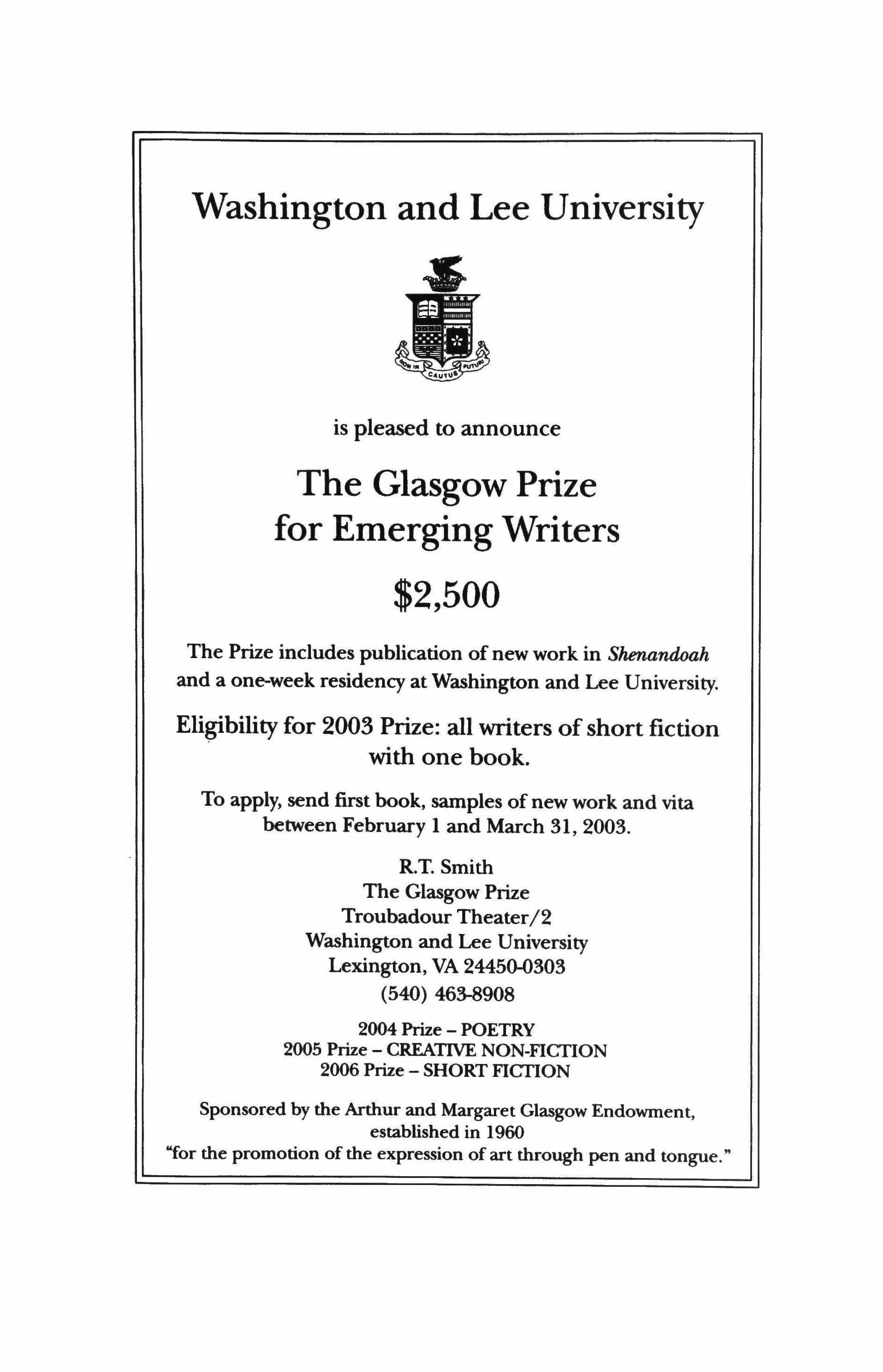
is pleased to announce
The Glasgow Prize for Emerging Writers
$2,500
The Prize includes publication of new work in Shenandoah and a one-week residency at Washington and Lee University.
Eligibility for 2003 Prize: all writers of short fiction with one book.
To apply, send first book, samples of new work and vita between February 1 and March 31, 2003.
RT. Smith
The Glasgow Prize Troubadour Theater/2 Washington and Lee University Lexington, VA 24450-0303 (540) 463-8908
2004 Prize - POETRY 2005 Prize - CREATIVE NON-FlCTION 2006 Prize - SHORT FlCTION
Sponsored by the Arthur and Margaret Glasgow Endowment, established in 1960 "for the promotion of the expression of art through pen and tongue."
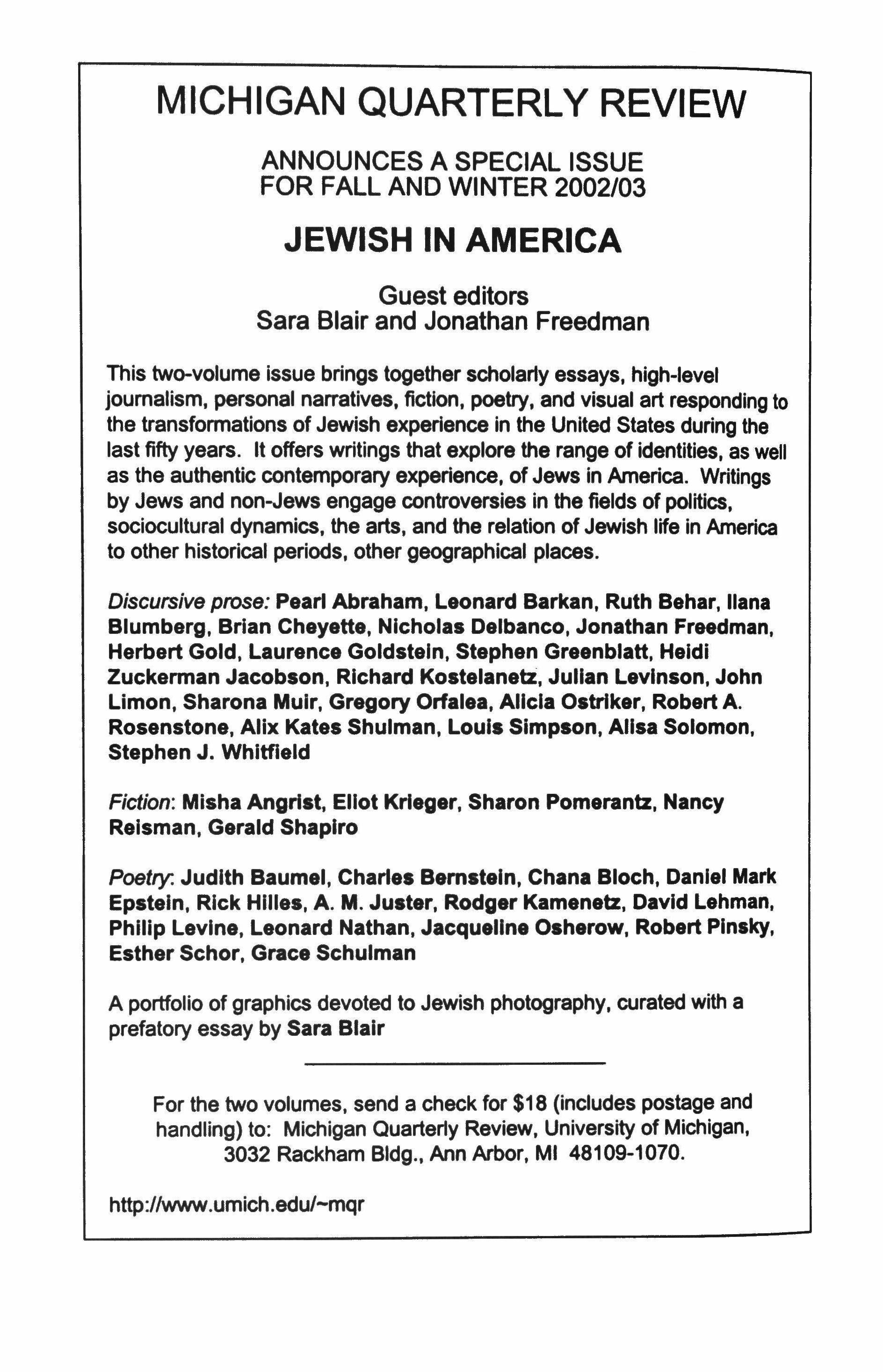
MICHIGAN QUARTERLY REVIEW
ANNOUNCES A SPECIAL ISSUE FOR FALL AND WINTER 2002103
JEWISH IN AMERICA
Guest editors
Sara Blair and Jonathan Freedman
This two-volume issue brings together scholarly essays, high-level journalism, personal narratives, fiction, poetry, and visual art responding to the transformations of Jewish experience in the United States during the last fifty years. It offers writings that explore the range of identities, as well as the authentic contemporary experience, of Jews in America. Writings by Jews and non-Jews engage controversies in the fields of politics, sociocultural dynamics, the arts, and the relation of Jewish life in America to other historical periods, other geographical places.
Discursive prose: Pearl Abraham, Leonard Barkan, Ruth Behar, lIana Blumberg, Brian Cheyette, Nicholas Delbanco, Jonathan Freedman, Herbert Gold, Laurence Goldstein, Stephen Greenblatt, Heidi Zuckerman Jacobson, Richard Kostelanett, Julian Levinson, John Limon, Sharona Muir, Gregory Orfalea, Alicia Ostrlker, Robert A. Rosenstone, Allx Kates Shulman, Louis Simpson, Ailsa Solomon, Stephen J. Whitfield
Fiction: Misha Angrlst, Eliot Krieger, Sharon Pomerantz, Nancy Reisman, Gerald Shapiro
Poetry: Judith Baumel, Charles Bernstein, Chana Bloch, Daniel Mark Epstein, Rick Hllles, A. M. Juster, Rodger Kamenetz, David Lehman, Philip Levine, Leonard Nathan, Jacqueline Osherow, Robert Pinsky, Esther Schor, Grace Schulman
A portfolio of graphics devoted to Jewish photography, curated with a prefatory essay by Sara Blair
For the two volumes, send a check for $18 (includes postage and handling) to: Michigan Quarterly Review, University of Michigan, 3032 Rackham Bldg., Ann Arbor, MI 48109-1070.
http://www.umich.edu/-mqr
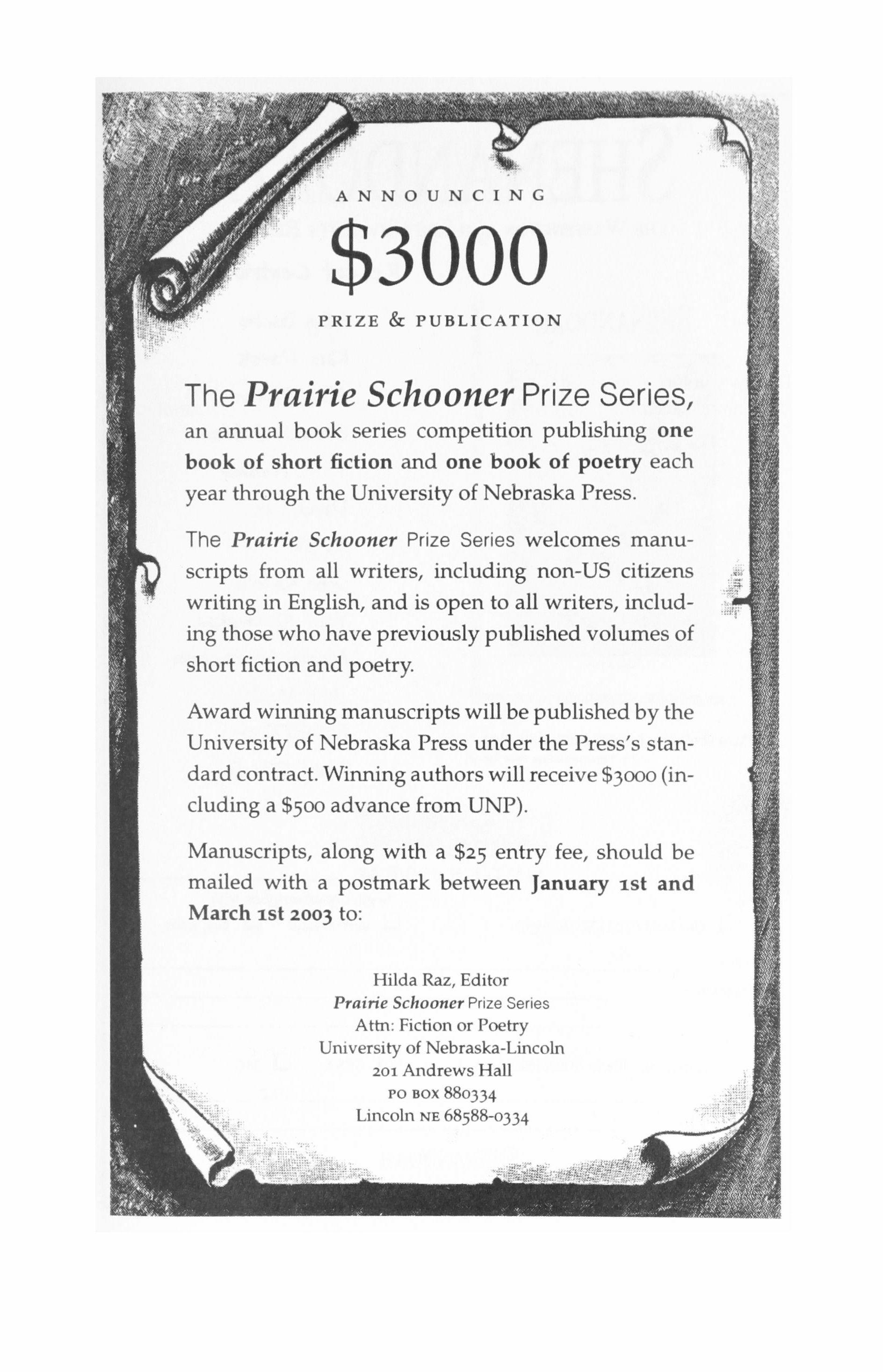
$3000
PRIZE & PUBLICATION
The Prairie Schooner Prize Series,
an annual book series competition publishing one book of short fiction and one book of poetry each year through the University of Nebraska Press.
The Prairie Schooner Prize Series welcomes manuscripts from all writers, including non-US citizens writing in English, and is open to all writers, including those who have previously published volumes of short fiction and poetry.
Award winning manuscripts will be published by the University of Nebraska Press under the Press's standard contract. Winning authors will receive $)000 (including a $500 advance from UNP).
Manuscripts, along with a $25 entry fee, should be mailed with a postmark between January ast and March ast 2003 to:
Hilda Raz, Editor
Prairie Schooner Prize Series
Attn: Fiction or Poetry
University of Nebraska-Lincoln
201 Andrews Hall
ro BOX 880334 Lincoln NE 68588-0334
ANNOUNCING
SHENANDOAH
THE WASHLNGTON AND LEE UNVERSITY REVIEW R.�.,t c..o.,fyibvtoY"�
SHENANDOAH
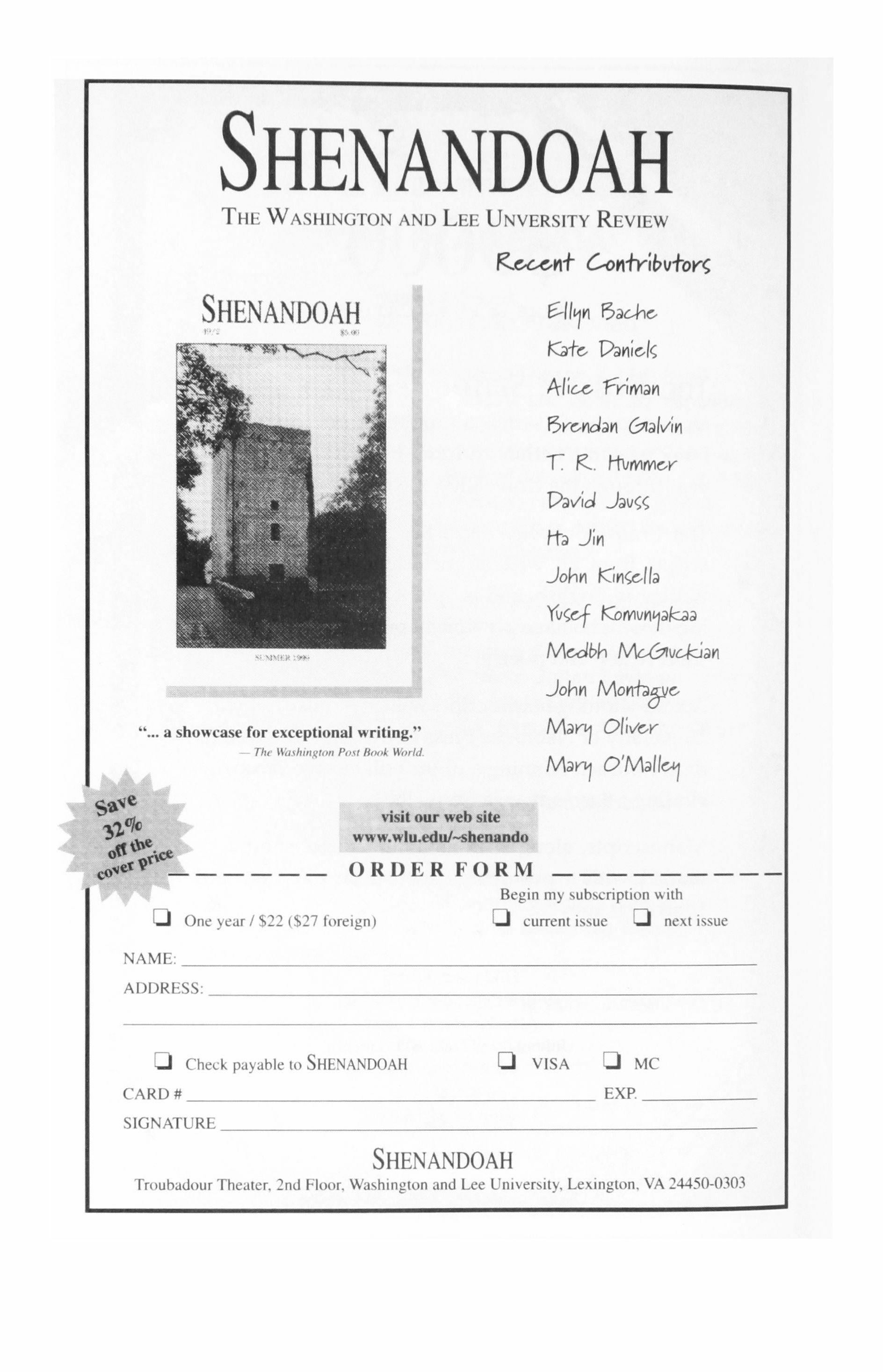
a showcase for exceptional writing." - The washingto» Post Book World. visit our web site www.wlu.edul-shenando
6-1I�n 5dU,eKate- "Ddnie-/i,; A/iu,. rviMdn 5ve-nddn brd/vin T R. HvMMe-V
Ddvid JdVi,;i,; /-td Jin
John Klni,;c-//d Yvi,;0 KoMvn�dbd Mc-dbh f'v1.c.hrvc...kidn
John Monn8'eMd� O/ivu Md� O'Mdll�
o One year / $22 ($27 foreign) Begin my subscription with o current issue 0 next issue
NAME:
ADDRESS: o Check payable to SHENANDOAH 0 VISA 0 MC CARD # EXP.
SIGNATURE
SHENANDOAH
Troubadour Theater. 2nd Floor, Washington and Lee University. Lexington. VA 24450·0303
ORDERFORM

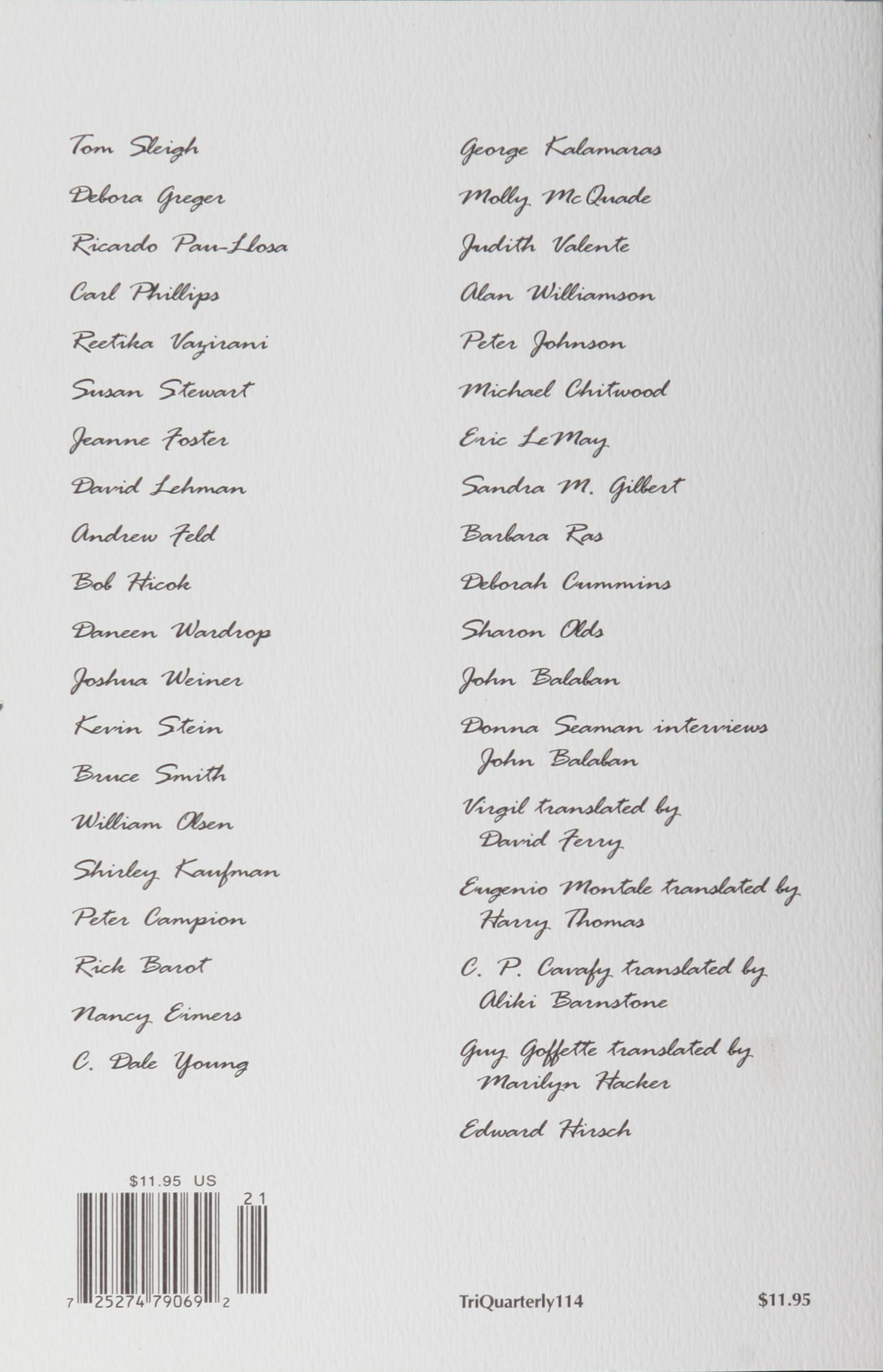
��
�r�� �� �reld
�� �� Pe«1--� fJe"d� �eJ�Y� �S'-f�
7J;,d JI� �W� �w� � S'-f�
e.��
21 7 25274 79069 2 he� mcl7mC�
�W� PJ�� m��� 6-tAc
�m.� 7J;,�
�� �au., � 7J;,� ��-Wv(� � 7J;,�
�r�
h�-f�ul7
�JI� TriQuarterlyl14 $11.95
7J;,� � PJ�e� �-ick 7J;,� �6�
$11.95 US
�Y�
km7
��
Y�-f�ul7
�m�-f�ul7 JI�� e. p. e� -f�ul7 tuiIU 7J;,��
m��JI�



































































































































































































